DiRelrg
Which
1 politicians do you trust?
100-word story winners and Kate: the fut
Adam Ant: the return
Britain's best trees

HOW TO Listen to birds
Have

Which
1 politicians do you trust?
100-word story winners and Kate: the fut
Adam Ant: the return
Britain's best trees

HOW TO Listen to birds
Have

The lowered sports chassis and upgraded suspension settings of the S60 R-Design allow you to take back control. While its unique styling including dual tailpipes and 18" alloys make it as good to look at as it is to drive. And all available in a choice of petrol and diesel engines, including DRIVe. To arrange a test drive visit your local Volvo dealer or call 0800 400 430.

"Professor Brian Cox has taken on one of the world's hardest jobs," says Danny Scott. "He's trying to make science sexy."
Shappi Khorsandi is an Iranian-born comedienne based in London. This month, she paints the future life of the young royal couple.
"Most museums in Britain have artifacts beyond price," says E Jane Dickson "But I was struck by the personal resonance these objects have."
30 Reasons to be Cheerful, Part 6: James Brown has discovered a whole new way of enjoying himself...
34 Let's Get Physicsal Professor Brian Cox on why he's bringing science to the stage as well as screen
40 Wills & Kate: The Future? Comedienne Shappi Khorsandi takes a look at what might lie ahead for the happy couple
48 Here's Looking at You The clues that broadcast the state of your health
54 Who Do We Trust? Our exclusive survey reveals who's been winning the nation's confidence
60 This Woman Can Save Your Life You too can live for ever—thanks to an innovative digital scrapbook
66 Best of British: Trees Our pick of the most fascinating and beautiful trees in the country
76 The Maverick: "Abolish the EU"Our lives are already enriched by our European neighbours, so why do we still need this huge bureaucracy?
80 100-Word-Story Competition: The Winners Thousands of you entered our very-short-story competition. Now find out who won...
87 Is Your Voice Ageing You? How your voice could be the biggest age giveaway of them all
94 Adam Ant: "I Remember..." The Prince Charming of punk talks music, mental health and Muhammad Ali
100 What I'd Save in a Fire Which one item do some of Britain's top curators and trustees value the most?

If I Ruled the World: Richard Branson
...at
110 1,001 Things Everyone Should Know
116 Medicine: Max Pemberton 118 Health: Susannah Hickling 122 Beauty: Jan Masters
124 Consumer: Donal Maclntyre 126 Money: Victoria Bischoff
130 Food: Marco Pierre White 132 Drink: Nigel Barden
135 Gardening: Bob Flowerdew
138 Wildlife: Martin Hughes-Games
Digital: Martha Lane Fox
142 Motoring: Conor McNicholas
144 Travel: Kate Pettifer
155 The Reader's Digest—Our new section for people who love books! 163 Books That Changed My Life: Richard Herring
Beat the Puzzler!
Laugh!
176 Beat the Cartoonist
At my school you were pretty quickly labelled either as "arts" or "science". (I was actively dissuaded from studying English, Maths and Biology at A level because they "didn't go together"—although I did them anyway.) So all hail Professor Brian Cox, our cover star, who's proved that science can, and should, be of interest to everyone, no matter how arty—and is now embarking on a nationwide tour to spread the word. See p34. We've been busy making some changes at Reader's Digest Towers: a new look, new features, and a clutch of top new columnists: a big hello to Martha Lane Fox, Donal Maclntyre, 011y Mann, Nigel Barden, Conor McNicholas, Andy Zaitzman, Natalie Haynes, and David Ashton, as well as all your favourite regulars, of course. Let us know what you think!
Gill Hudson
theeditor@readersdigest.co.uk Efacebook.com/readersdigestuk readersdigest.co.uk/magazineblogs twitter.com/rdigest
SET FOR T-E DAY ALL DAY.
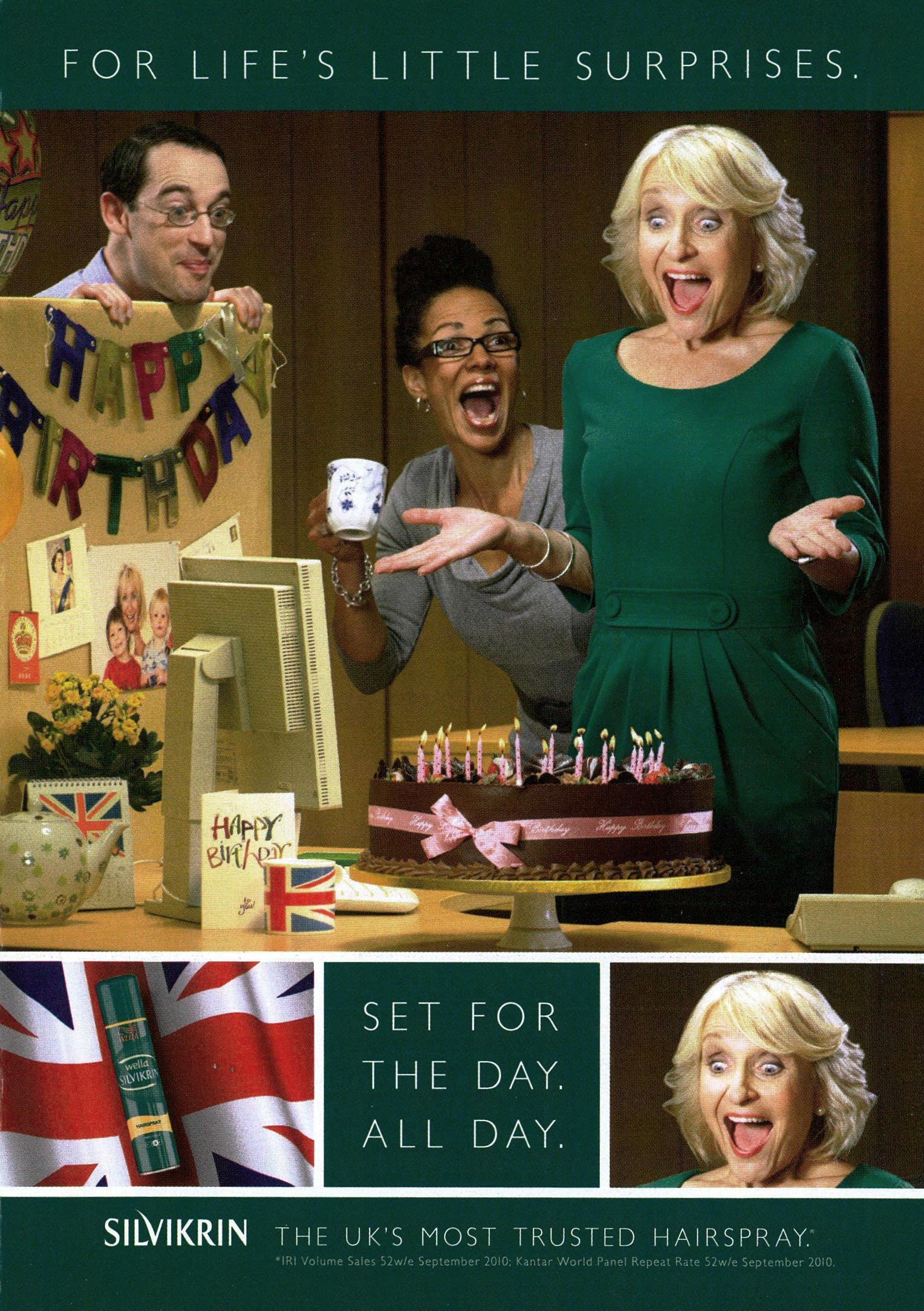
SINIKRIN THE UK'S MOST TRUSTED HAIRSPRAY

WE PAY £30 for all published letters and £50 for star letters. Email readersletters @readersdigest.co.uk or write to Readers' Letters, Reader's Digest, 157 Edgware Road, London W2 2HR.
WE ALSO PAY £70 for the true stories, anecdotes, jokes in Laugh! and You Couldn't Make It Up..., and contributions to endof-article fillers, Travel and Gardening. Email excerpts@ readersdigest.co.uk or write to Excerpts, Reader's Digest, 157 Edgware Road, London W2 2HR
Ensure submissions are not previously published. Include your name, email, address and daytime phone number with all correspondence. We may edit letters and use them in all print and electronic media. Contributions used become world copyright of Vivat Direct Ltd (t/a Reader's Digest).
SORRY! We cannot acknowledge or return unpublished items or unsolicited articlelength manuscripts. Do not send SAES. Article-length stories, poetry and cartoons are not requested.
Send us your stories, jokes and letters— if they're published, we'll pay SUBSCRIBE!
Go online at readersdigest. co.uk or write to Reader's Digest, Freepost, NAT3782, Leicester LE55 8BA.
UK: £42 a year. Republic of Ireland: €74.39 a year. Europe: £50 a year. Rest of the world: £60 a year. Prices include delivery.
Contact Customer Services for renewals, gifts, address changes, payments, account information and all other enquiries.
Phone: 0871 3511000
Email: cust_service
@readersdigest.co.uk
Minicom: 0870 600 1153
(and you thought no one won!)
"The reality only hit me after I'd put the phone down," says John Langan of Cheshire, recalling the moment he heard he'd won £5,000 in a monthly draw. "I was delighted—I hadn't even purchased anything when I returned the entry!" Ever practical, John claims the prize money will be spent on "a new roof and other improvements for the garage".
Visit readersdigest.co.uk/prizedraw or read more at readersdigest.co.uk/rdprizedrawblog.

Over
Get a sneak peek at next month's issue!
Find out all about our new Best of British series (see p66)—and discover how you can contribute online.
Read a new story from one of our readers every day. If you entered our recent story competition, it could be yours!
0 00 400
Watch the judges in action as they discuss the entries. (Turn to p80 to read the winning stories.)
Adam's Wildlife Watch—hear the dawn chorus without setting foot outdoors.
Brace yourself for a video of our Health Editor's vocal cords in glorious Technicolor (see p87 for feature).
PLUS: Word Power Online—play for fun or for cash!
DON'T FORGET TO CHECK OUT OUR FABULOUS iPAD APP! GO TO THE iTUNES MUSIC STORE TO DOWNLOAD YOURS.

EDITORIAL
Editor-in-Chief
GILL HUDSON
Managing Editor
CATHERINE HAUGHNEY
Design Director
MARTIN COLYER
Features Editor
SIMON HEMELRYK
Deputy Production Editor
TOM BROWNE
Assistant Features Editor
ELLIE ROSE
Art Editor
HUGH KYLE
Picture Researcher
ROBERTA MITCHELL
Contributing Editors
CAROLINE HUTTON, HARRY
MOUNT, JAMES WALTON
Health Editor
SUSANNAH HICKLING
Website Manager
IZABEL RAFFY
Website Assistant
JASMINE BEGOM
ADVERTISING
Account Directors
DOMINIC EDDON, PAUL EYERS, NICKY NOBLE, CHRIS SHEPPERSON
Trade Marketing Manager (Magazines and Books)
SIMON NICOLL
Production Controller
CHRIS TRIBE
Magazine Marketing Manager
JUSTINE BURROWS
Finance Business Partner—Magazine
ANJLI MEHTA
Magazine Executive
MARINA JOANNOU
Publishing Director
JAMES MALLINSON
CHIEF EXECUTIVE OFFICER
DAVID TITMUSS
THE READER'S DIGEST ASSOCIATION INC
President and Chief Executive Officer
MARY G. BERNER President, RD Europe
DAWN ZIER VP, Global Editor-in-Chief
Reader's Digest PEGGY NORTHROP

Is it still frowned upon?

Maybe.
Although there are plenty of occasions when chewing gum strikes me as a perfectly acceptable thing to do.
I find it a really handy way to give my mouth a quick once over when I'm on the move.
I may not do it quite so overtly In more formal settings, the same goes r'all sorts of things.
£30 FOR EACH PUBLISHED LETTER, £50 FOR THE LETTER OF THE MONTH!
SEE P4 FOR MORE DETAILS
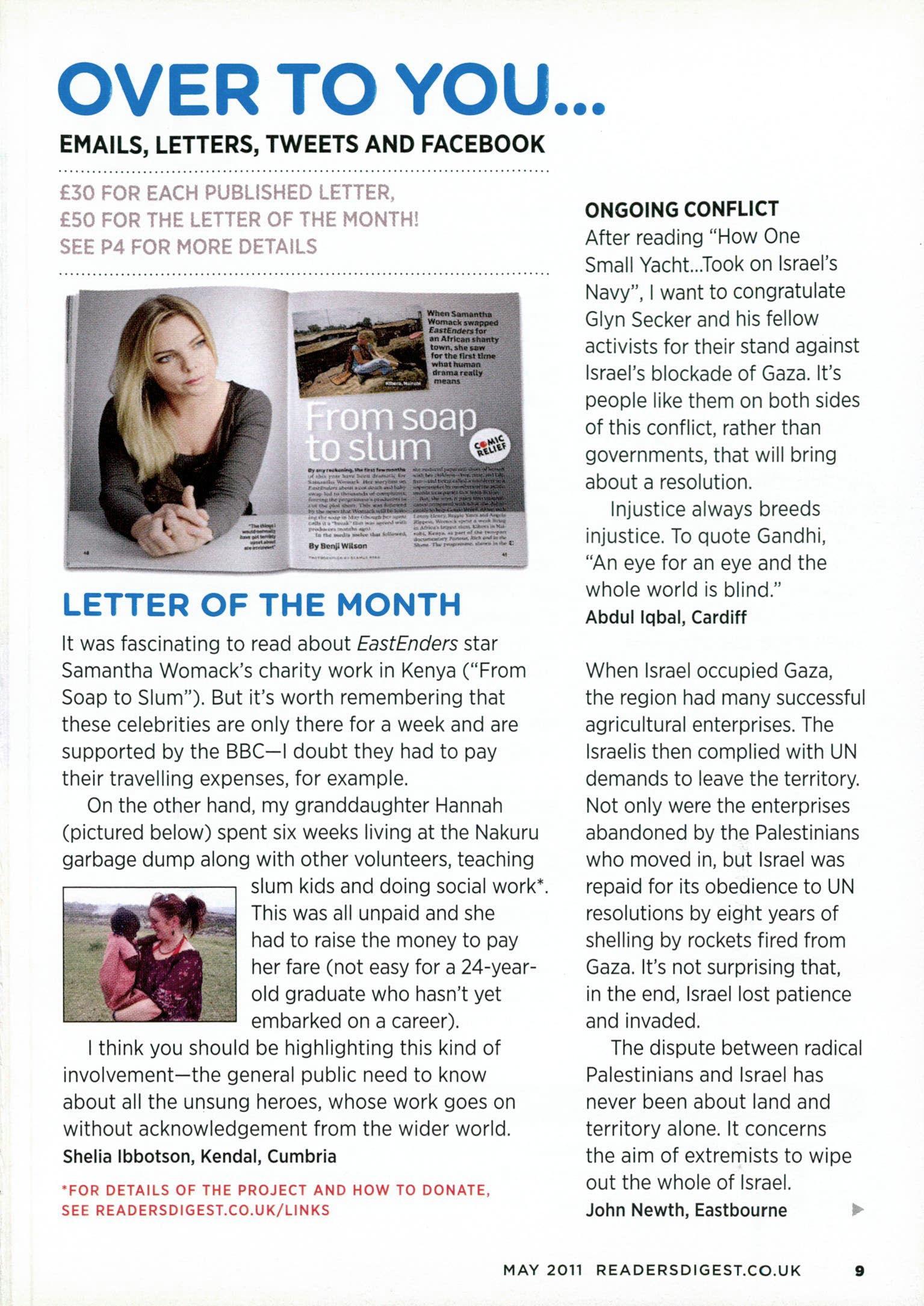
It was fascinating to read about EastEnders star Samantha Womack's charity work in Kenya ("From Soap to Slum"). But it's worth remembering that these celebrities are only there for a week and are supported by the BBC—I doubt they had to pay their travelling expenses, for example.
On the other hand, my granddaughter Hannah (pictured below) spent six weeks living at the Nakuru garbage dump along with other volunteers, teaching slum kids and doing social work*. This was all unpaid and she had to raise the money to pay her fare (not easy for a 24-yearold graduate who hasn't yet embarked on a career).
I think you should be highlighting this kind of involvement—the general public need to know about all the unsung heroes, whose work goes on without acknowledgement from the wider world. Shelia Ibbotson, Kendal, Cumbria
'FOR DETAILS OF THE PROJECT AND HOW TO DONATE, SEE READERSDIGEST.CO.UK/LINKS
After reading "How One Small Yacht...Took on Israel's Navy", I want to congratulate Glyn Secker and his fellow activists for their stand against Israel's blockade of Gaza. It's people like them on both sides of this conflict, rather than governments, that will bring about a resolution.
Injustice always breeds injustice. To quote Gandhi, "An eye for an eye and the whole world is blind."
Abdul lqbal, Cardiff
When Israel occupied Gaza, the region had many successful agricultural enterprises. The Israelis then complied with UN demands to leave the territory. Not only were the enterprises abandoned by the Palestinians who moved in, but Israel was repaid for its obedience to UN resolutions by eight years of shelling by rockets fired from Gaza. It's not surprising that, in the end, Israel lost patience and invaded.
The dispute between radical Palestinians and Israel has never been about land and territory alone. It concerns the aim of extremists to wipe out the whole of Israel.
John Newth, Eastbourne ►

Harry Mount is not quite right when he states in "Instant Expert" that there's been a census every decade since 1801; it was cancelled in 1941 because of the war. It's also interesting to note that the 1801 census contained just five questions, compared with over ten times that number in the current survey.
At a time of huge debt, when so much information is available from public sources, it's difficult to justify spending nearly £500 million on this increasingly intrusive exercise. Tim Coles, Bedfordshire
"Patent Genius" is proof that we allow great talent to go unrewarded in this country. Rather than being dismissed as a typical British eccentric, an inventor like Tony Cuthbert should be given unlimited support and encouragement for the good of the nation. I'm sure the US, for example,
would have him working on major projects.
Your article didn't go far enough in highlighting Tony's worth—he may well hold the key to many of the energy problems we face today.
Alan Boulton, Stoke-on-Trent
So Tony Cuthbert is trying to invent a cordless, bladeless lawnmower? Sorry, Tony, my dad beat you to it—he got my siblings and me a donkey when we were little. Not only was it bladeless and cordless, it was powered by the grass it cut.
Brian O'Callaghan, Glasgow
When doctors such as Max Pemberton say that fears about MMR are unfounded, it suggests they know all there is to know about medicine. Our son and daughter both had the MMR jab at 13 months; our son, now aged 18, has autism, while our daughter— although an early developer physically and mentally—lost
• "...this Christmas I received not one but two honey pots as presents. But I don't collect honey pots and I only like honey occasionally..."
• "...the burka is no worse than printed T-shirts. The latest chap to enter our post office wanted to be "covered in chocolate and thrown to the lesbians..."
• "...I've read that men become invisible to women after the age of 58 and they're no longer desirable. So why do I become visible whenever I sit down to watch sports or drink beer?..."
• "...I'm a left-handed walking stick, made in a care-and-mobility factory and then sent to a physiotherapy department to await an owner..."
her early vocabulary and has since been diagnosed with Asperger's syndrome.
Despite this, I would never suggest that MMR was the sole cause of these problems—but I do believe that it could be a contributory factor. All I ask is that these "experts" keep an open mind. I would love to be proved wrong by research that identifies why autism is on the increase. Our kids deserve it.
Jeff Rowntree, Wordsley, West Midlands

I agreed with much of Barbara Taylor Bradford's manifesto in "If I Ruled the World". In particular, her wish that all people should be able to enjoy libraries resounded strongly with me.
This point was driven home on a recent holiday to Turkey. A trip to Ephesus revealed the impressive remains of a library built in 135AD. I wonder if our libraries will have similar value
placed on them when they're excavated in 2,000 years.
Laura Tindle, Aylesbury, Buckinghamshire
I take exception to Barbara Taylor Bradford's remark that, "People who retire tend to fade away and die."
Since retiring, I've taught myself to read music, play the keyboard and use a computer. I grow fruit and vegetables in my garden, play rounds of golf with my grandson and enjoy going on walks. I'm a founder member of a support group for bowel-cancer sufferers at our local hospital and attend regular meetings. I'm also a full-time carer for my disabled wife.
Now, Barbara, do you think this is fading away and dying?
Rob Butler, Durham
Thank you for your money item "Cut That Credit Card Debt". I've taken your advice and transferred my monthly balance to a credit card with a lower interest rate, so more of my monthly repayments go towards reducing my debt. And after paying it off, I'll be cutting my card up!
Dannii Truby, Hertfordshire
Your letters keep pouring in for Matt Ridley's article "Cheer Up: It Will Never Happen" (January), about why we should be more optimistic.
• I agree with Matt —we're both overestimating our ability to destroy our planet and underestimating our ability to adapt.
William Cheung, London
• Matt views the world through the rose-tinted glasses of our rich society.
Kirsten Coulter, Berwick
• At last! Someone who has looked at the bigger picture and told us why we should look forward to the future.
Graham Dovey, Lincolnshire
• Matt may be a rational optimist, but, in the face of an ever-expanding population, I'm a realistic pessimist!
David King, Worcestershire ■

Taking lots of regular medication isn't the easiest thing to stay on top of when you're busy. Our range of FREE Prescription Solutions help you manage your regular medication without worry:
• FREE Medicines Check-up. We can answer any questions about your medicines, including how to take them properly and how to help control sideeffects. Leaving you confident you're getting the best from your medicines.
• FREE Express Repeat Prescription Service. Save time and hassle, we'll contact your GP when your prescription is duet and order your medication before you run out. It'll then be ready at a time that suits you. You can even manage your prescription online.
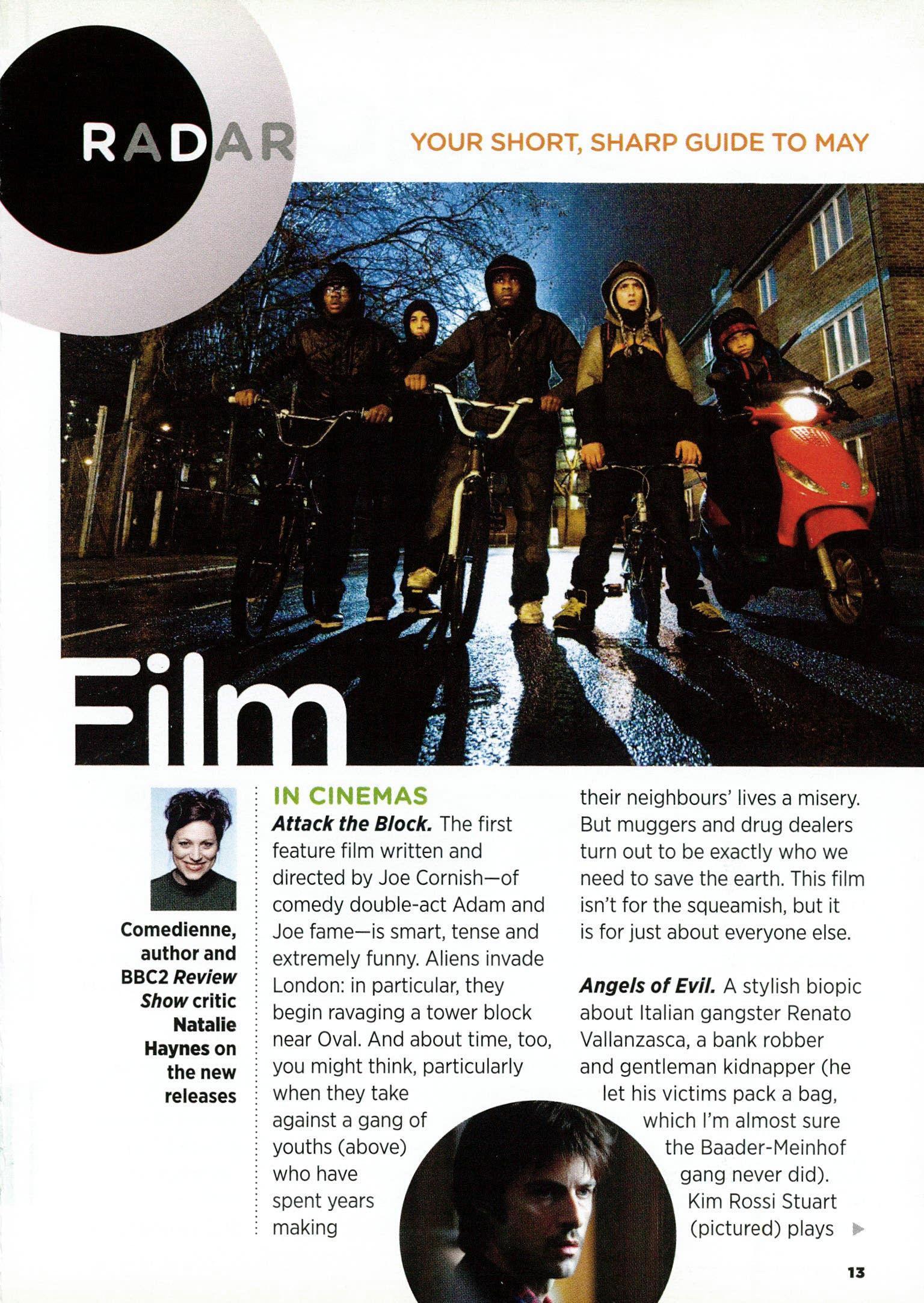
Comedienne, author and BBC2 Review Show critic Natalie Haynes on the new releases
Attack the Block. The first feature film written and directed by Joe Cornish—of comedy double-act Adam and Joe fame—is smart, tense and extremely funny. Aliens invade London: in particular, they begin ravaging a tower block near Oval. And about time, too, you might think, particularly when they take against a gang of youths (above) who have spent years
their neighbours' lives a misery. But muggers and drug dealers turn out to be exactly who we need to save the earth. This film isn't for the squeamish, but it is for just about everyone else.
Angels of Evil. A stylish biopic about Italian gangster Renato Vallanzasca, a bank robber and gentleman kidnapper (he let his victims pack a bag, which I'm almost sure the Baader-Meinhof gang never did).
Kim Rossi Stuart (pictured) plays 00
the career criminal with huge panache and sympathy, without the film ever glamorising or excusing him.
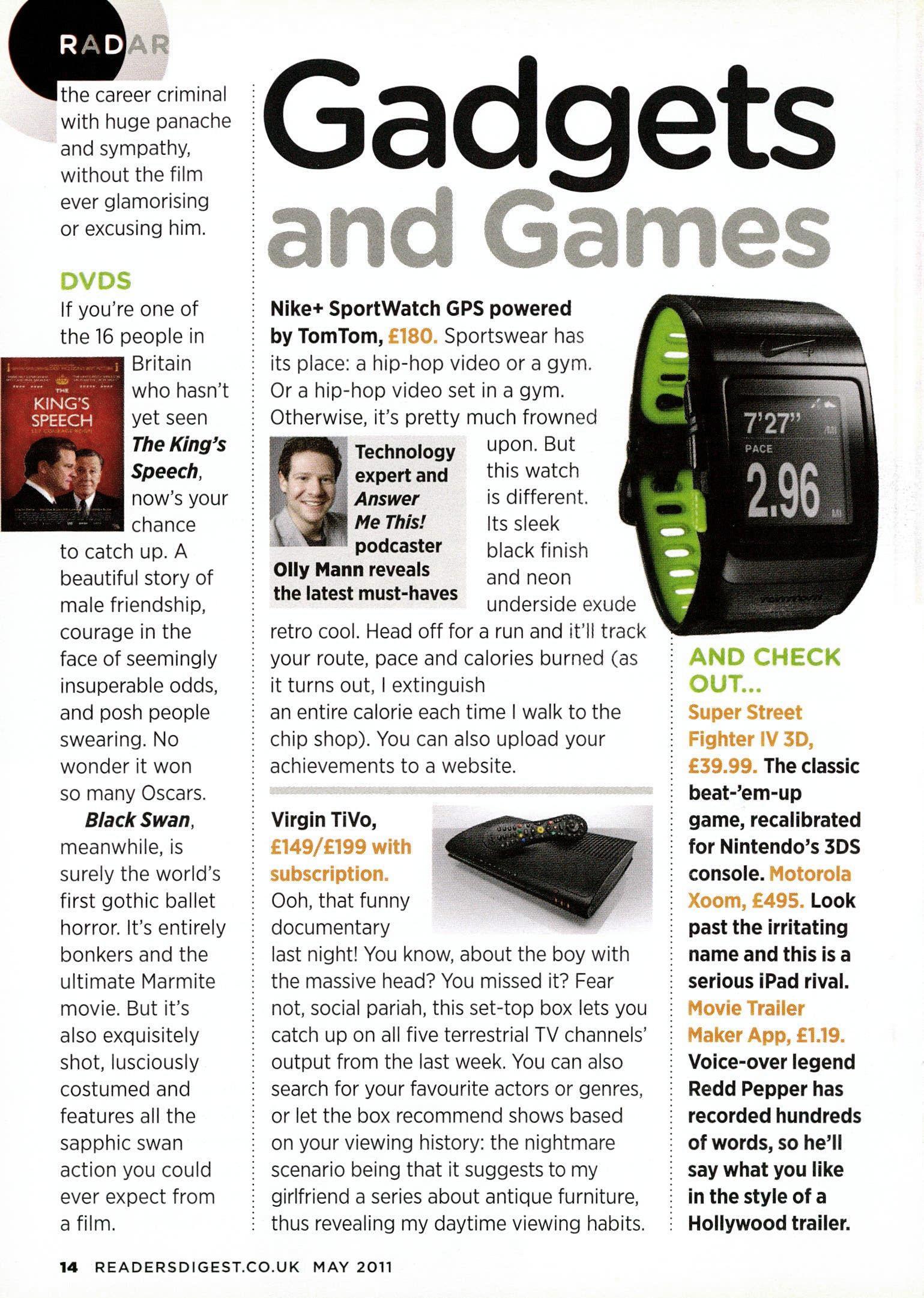
KING'S SPEECH
If you're one of the 16 people in Britain who hasn't yet seen The King's Speech, now's your chance to catch up. A beautiful story of male friendship, courage in the face of seemingly insuperable odds, and posh people swearing. No wonder it won so many Oscars. Black Swan, meanwhile, is surely the world's first gothic ballet horror. It's entirely bonkers and the ultimate Marmite movie. But it's also exquisitely shot, lusciously costumed and features all the sapphic swan action you could ever expect from a film.
Technology expert and lop Answer Me This! podcaster Oily Mann reveals the latest must-haves 1.
Nike+ Sport Watch GPS powered by TomTom, £180. Sportswear has its place: a hip-hop video or a gym. Or a hip-hop video set in a gym. Otherwise, it's pretty much frowned upon. But this watch is different. Its sleek black finish and neon underside exude retro cool. Head off for a run and it'll track your route, pace and calories burned (as it turns out, I extinguish an entire calorie each time I walk to the chip shop). You can also upload your achievements to a website.
Virgin TiVo, E149/£199 with subscription.
Ooh, that funny documentary last night! You know, about the boy with the massive head? You missed it? Fear not, social pariah, this set-top box lets you catch up on all five terrestrial TV channels' output from the last week. You can also search for your favourite actors or genres, or let the box recommend shows based on your viewing history: the nightmare scenario being that it suggests to my girlfriend a series about antique furniture, thus revealing my daytime viewing habits.
LCK OUT...
Super Street Fighter E, "1'10 The classic beat-'em-up game, recalibrated for Nintendo's 3DS console. lotornin Xoom, £495 Look past the irritating name and this is a serious iPad rival. Movie frailer Maker App, £1.19. Voice-over legend Redd Pepper has recorded hundreds of words, so he'll say what you like in the style of a Hollywood trailer.
BBC 6 Music's Stuart Maconie's pick of the recent releases
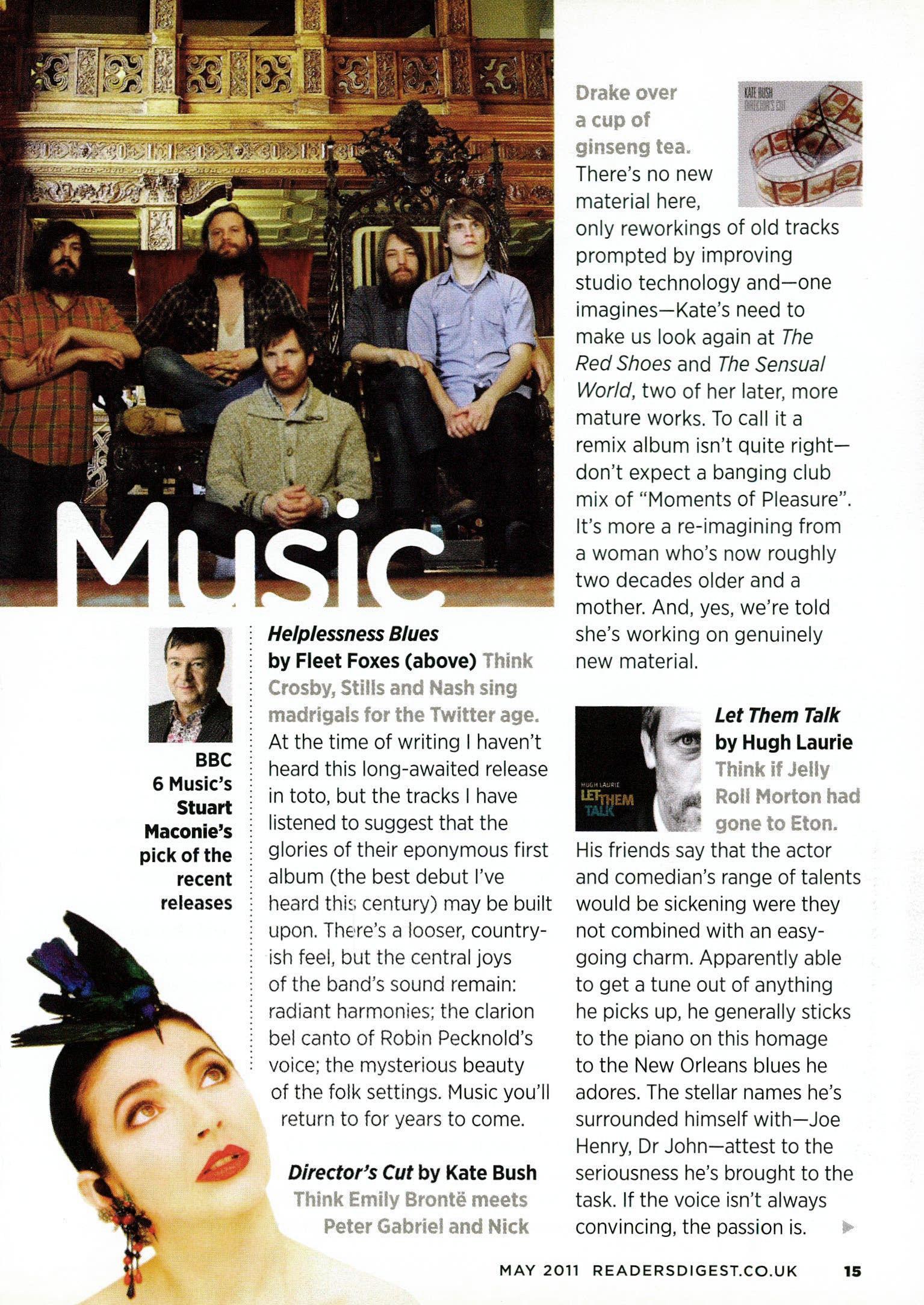
by Fleet Foxes (above) Think Crosby, Stills and Nash sing madrigals for the Twitter age. At the time of writing I haven't heard this long-awaited release in toto, but the tracks I have listened to suggest that the glories of their eponymous first album (the best debut I've heard this century) may be built upon. There's a looser, countryish feel, but the central joys of the band's sound remain: radiant harmonies; the clarion bel canto of Robin Pecknold's voice; the mysterious beauty of the folk settings. Music you'll return to for years to come.
Think Emily Brontë meets Peter Gabriel and Nick
Drake over a cup of ginseng tea. There's no new material here, only reworkings of old tracks prompted by improving studio technology and—one imagines—Kate's need to make us look again at The Red Shoes and The Sensual World, two of her later, more mature works. To call it a remix album isn't quite right— don't expect a banging club mix of "Moments of Pleasure". It's more a re-imagining from a woman who's now roughly two decades older and a mother. And, yes, we're told she's working on genuinely new material.
Let Them Talk AI by Hugh Laurie chink if Jelly )01 Roll Morton had gone to Eton. His friends say that the actor and comedian's range of talents would be sickening were they not combined with an easygoing charm. Apparently able to get a tune out of anything he picks up, he generally sticks to the piano on this homage to the New Orleans blues he adores. The stellar names he's surrounded himself with—Joe Henry, Dr John—attest to the seriousness he's brought to the task. If the voice isn't always convincing, the passion is. 0#
French Open Tennis, Paris. May 22-iune 5, Serbia's Novak Djokovic (pictured) has been Dr Tennis so far in 2011, but, as always, Rafael Nadal is the man to beat. Overhauling the Majorcan Magician on the Roland Garros clay is a task akin to persuading a hamster to swallow a coconut—almost certainly doomed to failure. He's won in five of the last six years.
The women's competition is more open (Justine Henin is one favourite), but will probably be won by someone standing on the baseline and whacking the ball until it weeps.
Aviva Premiership Rugby Final, Twickenham, a The conclusion to the competitive English rugby-union season
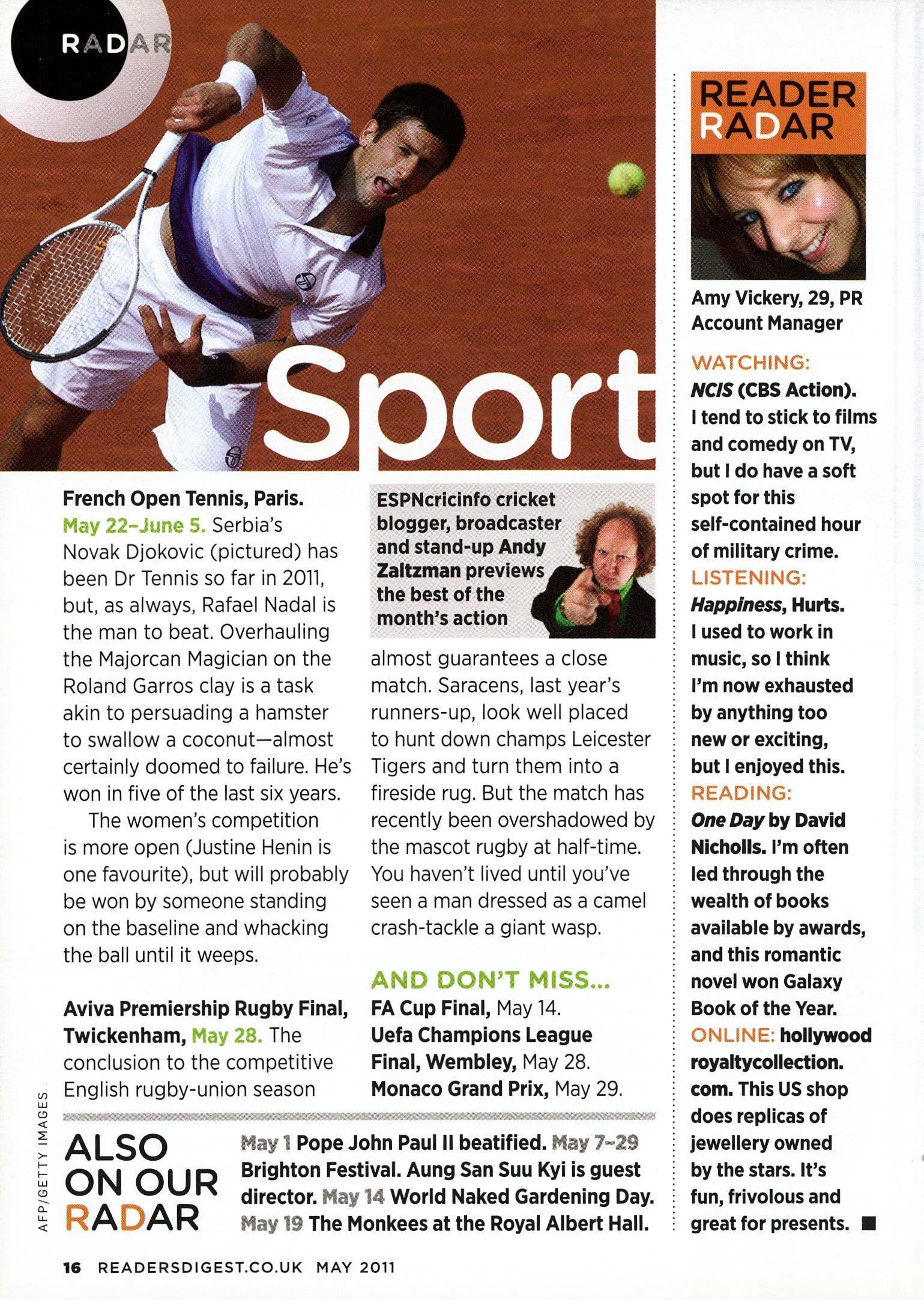
ESPNcricinfo cricket blogger, broadcaster and stand-up Andy Zaltzman previews the best of the month's action
almost guarantees a close match. Saracens, last year's runners-up, look well placed to hunt down champs Leicester Tigers and turn them into a fireside rug. But the match has recently been overshadowed by the mascot rugby at half-time. You haven't lived until you've seen a man dressed as a camel crash-tackle a giant wasp.
FA Cup Final, May 14. Uefa Champions League Final, Wembley, May 28. Monaco Grand Prix, May 29.
May 1 Pope John Paul II beatified. May 7-29
ON OUR Brighton Festival. Aung San Suu Kyi is guest director. May14 World Naked Gardening Day.
May 19 The Monkees at the Royal Albert Hall.
Amy Vickery, 29, PR Account Manager
NCIS (CBS Action).
I tend to stick to films and comedy on TV, but I do have a soft spot for this self-contained hour of military crime.
LISTENING: Happiness, Hurts. I used to work in music, so I think I'm now exhausted by anything too new or exciting, but I enjoyed this.
READING:
One Day by David Nicholls. I'm often led through the wealth of books available by awards, and this romantic novel won Galaxy Book of the Year.
ONLINE:hollywood royaltycollection. corn. This US shop does replicas of jewellery owned by the stars. It's fun, frivolous and great for presents. ■

• The Caribbean's most sumptuous suites; some with Butler Service
• Gourmet dining in up to 14 restaurants
• Premium brand drinks and exclusive Beringer' wines
• Every land sport, including unlimited championship golf'
• Water sports, including the most comprehensive scuba programme' in the Caribbean
• Nightly entertainment
• All airport transfers and tips
1 When my husband had a pacemaker fitted, our five-year-old granddaughter visited him in hospital and asked what he'd had done.
When told he'd had a device fitted that kept his heart from stopping, she looked at him and said, "How will you be able to die then?"
JoanCoplin, Leeds
1 The other day my friend came over, so I made some tea while she waited in the living room.
A few minutes later, she came into the kitchen and asked where I'd got the lovely crisps. "They tasted really unusual—quite fruity, in fact," she said.
"What crisps?" I asked, a bit puzzled.
"These ones," she said, holding up the bowl of pot pourri.
Paula Little, Hampshire
1 Returning from holiday, I was upset to find that my neighbour had severed my washing line while cutting down ivy on our adjoining wall. I told my husband

"I just know baby is getting as much out of this world trip as we are"
I MY HUSBAND AND I KNOW A M/.. =MHO'S NAMED
AFTER A FAMOUS FILM STAR. A few years ago, his brother suffered a minor breakdown and was committed to a psychiatric ward for a short time.
After a week or two, feeling much better, the brother asked to see his psychiatrist.
"I really feel that it's time for me to go home," he said.
The psychiatrist, agreeing, asked if there was anybody they could call to pick him up.
"Yes," he replied, "my brother."
"And what's his name?"
"Cary Grant."
He was promptly dragged back to the ward. It took him two more days and a lot of explaining until they let him go.
Charlotte Castle, Brighouse, West Yorkshire
SEND YOUR TRUE, FUNNY STORIES TO EXCERPTS@ READERSDIGEST.CO.UK OR GO TO FACEBOOK. COM/READERSDIGESTUK
confidently that I'd get my neighbour to fix it.
The next day, I spotted a man up a tall ladder next door and confronted him. He promised to fix the line once he'd finished his job, which he did.
Pleased that my assertiveness had worked, I relaxed and asked him how he'd cut down the ivy.
"I know nothing about the ivy. I'm from Sky TV," he replied.
Denise Buchanan, London E3
I My three-year-old daughter and I were strolling along when a crow flew overhead, cawing loudly. All of a sudden, it stopped making any noise.
"Mummy, do you think it needs new batteries?" said my daughter in a confused voice.
Liana Hodgson, Bournemouth
During the bad weather last year, my neighbour asked me if I needed anything from the shops. I said I wanted milk,
11 RECENTLY LOST MY WAY WHILE DRIVING IN WALES. Spotting an old farmer, I stopped and asked for directions.
"Never 'eard of it," he said, scratching his head.
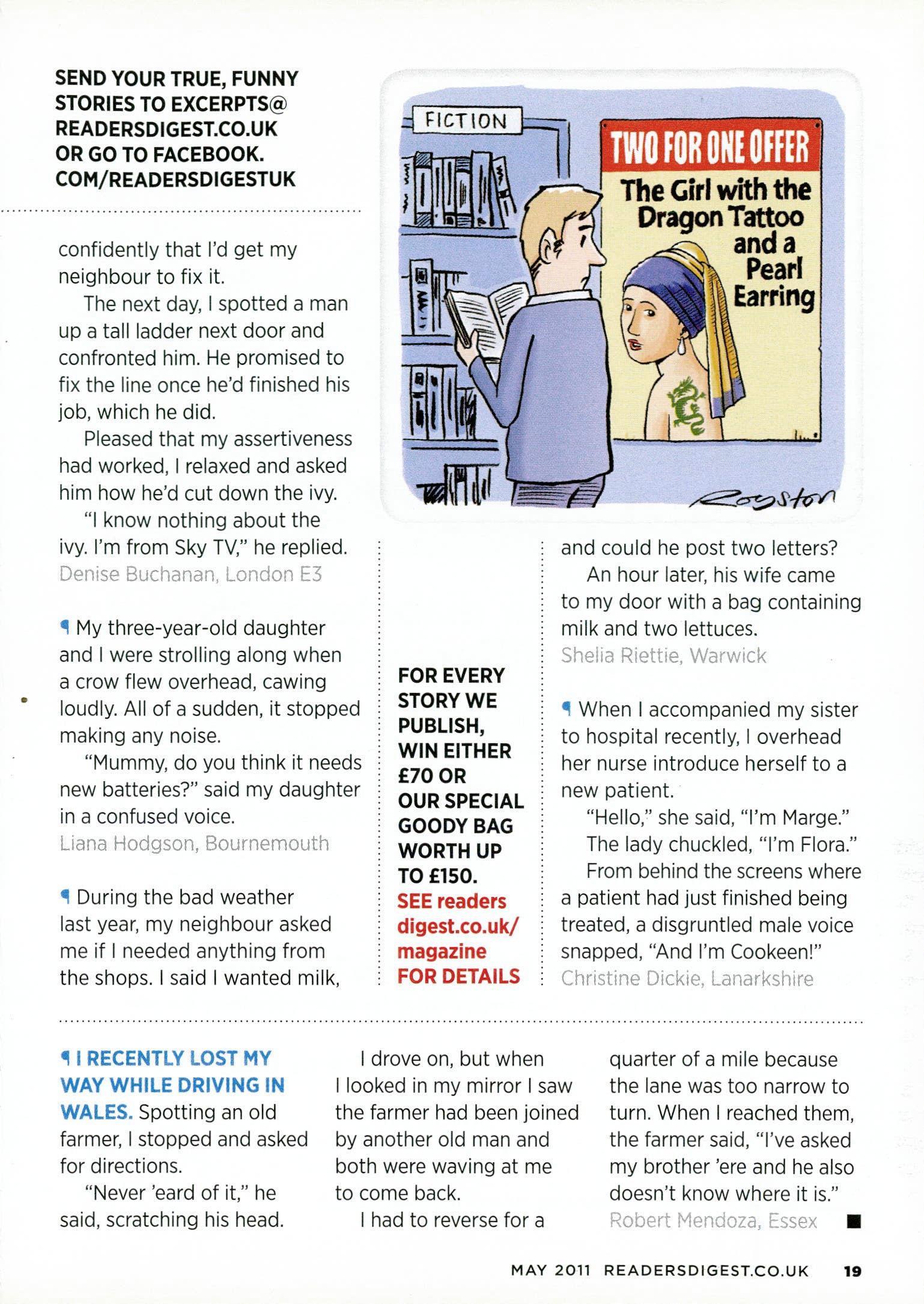
FOR EVERY STORY WE PUBLISH, WIN EITHER £70 OR OUR SPECIAL GOODY BAG WORTH UP TO £150. SEE readers digest.co.uk/ magazine FOR DETAILS
The Girl with the Dragon Tattoo and a Pearl Earring
and could he post two letters?
An hour later, his wife came to my door with a bag containing milk and two lettuces.
Shelia Riettie, Warwick
When I accompanied my sister to hospital recently, I overhead her nurse introduce herself to a new patient.
"Hello," she said, "I'm Marge."
The lady chuckled, "I'm Flora."
From behind the screens where a patient had just finished being treated, a disgruntled male voice snapped, "And I'm Cookeen!"
Christine Dickie, Lanarkshire
I drove on, but when I looked in my mirror I saw the farmer had been joined by another old man and both were waving at me to come back.
I had to reverse for a
quarter of a mile because the lane was too narrow to turn. When I reached them, the farmer said, "I've asked my brother 'ere and he also doesn't know where it is."
Men71072 Essex ■

Harry Mount on Dawn Chorus Day *
1 bimaculated
(bye-mackulated) adj
A severely damaged
B marked with two spots
C high-pitched
2 rufous (roo-fuhs) adj
A brownish-red B difficult to see C bee-eating
3 twitcher n A birdwatcher B delicate feather
C inner ear
4 shrike n A dangerously
low flight B piercing
scream C species with hooked, toothed beak
5 olivaceous adj
A dusky-green-coloured
B olive-eating C living around the Mediterranean
6 guillemot (gill-er-mott)
n A nest in the sand
B cave-dweller C seabird
7 genus (jean-uhs) n
A group of species
B species C flock of birds
8 plumage n A food
supply B colour of beak
C feathers

9 carrion (carry-uhn) n
A bird's weight B dead animal flesh C parasite living off bird
10 goldeneye n
A greedy bird B yelloweyed duck C sign of illness
11 moult v A to lose feathers B mourn for lost mate C flap wings
12 lanceolated (lanceoh-fated) adj A high-
* Dawn Chorus Day falls on May 1—all keen bird-watchers will be getting up early to hear the joys of British birds singing (read more about it on p111). But how many ornithological terms do you know? Answer A, B or C above.
flying B spear-shaped
C sweet-singing
13 grebe (greeb) n
A bird food B type of diving bird C crested lark
14 shearwater (sheerwater) n A cliff-top breeder B estuary bird
C water-skimming bird
15 lek v A to take part in a male breeding display B squawk C hibernate
COVER STAR
word? "Nobber! It's a word I use when I want to be rude about someone without actually using a proper swear word."
comes from the Japanese for the sound of conversation, a bit like "chitchat". In 2003, Pecha Kucha nights began in Tokyo, the idea being that people come along to a bar and give slide shows. But they're time-limited—you show 20 images, each for 20 seconds, leaving you only a maximum of six minutes and 40 seconds per talk. Pecha Kucha nights have now caught on across the world. In Britain, the 5x15 organisation offers evening talks, whereby five people (often writers, film directors or academics) have to abide by two rules only: no scripts and 15 minutes' talking each—perfect in an age of shrinking attention spans.
9-11 getting there 12-13 impressive 14-15 word-power wizard!
1 bimaculated—B marked with two spots. "The bimaculated lark is usually found in Asia." Latin bis (twice) and maculatus (spotted).
2 rufous—A brownish-red. "Rufous turtle-doves make a lovely cooing noise." Latin rufus.
3 twitcher—A birdwatcher. "The twitchers tried to see the rare lark." From the tendency to get "twitchy" at rare sightings.
4 shrike—C species with hooked, toothed beak. "Shrikes are from the Laniidae family." Old English scric (from the noise they made).
5 olivaceous—A dusky-green-coloured. "The olivaceous warbler is only seen every two years." Latin olivaceus (olive-coloured).
6 guillemot—C seabird. "Guillemots like to lay their eggs off the coast." French Guillaume (pet name for William).
7 genus—A group of species. Latin genus (type).
8 plumage—C feathers. "The goldfinch has dazzling plumage."

It may originally come from the Portuguese word barroco, meaning a misshapen pearl. It was then used to describe the highly ornate period of classical architecture, particularly of Catholic churches and cathedrals in southern Europe, from the late 16th to the early 18th century. We had our own baroque architects over here—notably Nicholas Hawksmoor and Sir John Vanbrugh—at the end of the 17th century and the beginning of the 18th. But we never reached the extremely decorative heights of Continental baroque; and now the word is often used in a critical way to mean over the top, or far too ornate. Paris Hilton anyone?
French plume (feather).
9 carrion—B dead animal flesh. "The carrion crow circled overhead." Latin caro (flesh).
10 goldeneye—B yellow-eyed duck. "Goldeneyes are quiet, but for the noise of their wings."
11 moult—A lose feathers. "Birds moult when old feathers are pushed out by new ones." Latin mutare (to change).
12 lanceolated—B spear-shaped. "I saw a lanceolated warbler in the tree." Latin lanceo/a (lance).
13 grebe—B type of diving bird. "The great-crested grebe is the biggest." French grebe.
14 shearwater—C water-skimming bird. "Shearwaters are from the Puffinus genus."
1E lek—A take part in a male breeding display. "Capercaillies carry out mock battles when they lek." Swedish leka (to play). ■
(4:30 nEw

Hyundai ix20, with air conditioning, electric front windows and remote central locking with alarm
model shown is the ix20 Fictive 1.6 for £199 advance payment.
YEAR TRIPLE CARE
MINIMMIRAGEWARBAIITY For mor
Fuel consumption in MPG (I/100km) for ix20 range: Urban
-
(4.7), Extra Urban 51.4 (5.5) - 67.3 (4.2), Combined 43.6 (6.5) - 65.7 (4.3), CO2 154 - 114g/km. Model featured is the Hyundai ix20 Active 1.6 auto in Ice Blue metallic paint with £199 advance payment. Offers are subject to availability. *To qualify for these offers you must be in receipt of the Higher rate Motability Component of the Disability Living Allowance or War Pensioners' Motability Supplement. Offers only valid where the application to Motability occurs between 1 April 2011 and 30 June 2011 and subject to acceptance of Motability application. The Motability Contract Hire Scheme is administered by Motability Operations Limited (Registered company No.1373876). City Gate House, 22 Southwark Bridge Road, London, SE1 9HB. Full written details, including terms and conditions of the Motability Scheme are available on request from Motability. Please note 20,000 miles per year are allowed on the Motability Contract Hire Scheme. 5Year Triple Care terms and exclusions apply. Please see www.hyundai.co.uk/owners/triple5 or ask your local dealer.
...we'll be car-crash free, says Gary Rimmer
It's the next big thing in motoring: accidentavoidance technology.
Volvo, Mercedes and Ford already make vehicles fitted with onboard radar. The latest Volvo system warns when a collision is imminent and will stop the car, if necessary.
But Ford are now testing an on-board traffic WiFi system that networks together every car on a particular stretch of road. If a car brakes or steers erratically, all the cars around it are warned.
Since the WiFi signal could cover an entire stretch of road, a crazy driver approaching from two miles behind need never take you by surprise again. A standard fitting should arrive by 2015.
If Star Trek didn't exist, would someone have to invent it? Regular readers will recall the recent real-world development of a light device, first imagined in Star Trek, that can heal a cut. Now comes theoretical proof of another Star Trek whimsy—a tractor beam.
In a recent paper, Chinese scientists have described how laser light could be used to drag objects backwards. But don't expect a new way to haul your car out of a ditch, or a dastardly method for the Borg to pull you onto their cube, yet.
For the foreseeable future, it's a technique unlikely to work on anything bigger than the nanoscopic. Think micro-tweezers made of light. By 2020 expect it to be standard In the nanotechnologist's toolkit.
New sources of energy are becoming increasingly ingenious. In Massachusetts, capped (filled) landfill sites are seen as a potential source of methane and geothermal heat, and as ideal sites for solar or wind farms, since planning regulations prohibit their further development.

Technologists have also harnessed energy from the surfaces we walk on, and even from the rise and fall of a breathing chest.
Now, scientists in Canada have crafted an engine driven by helium compressed by sound waves. Attach to a generator and it's noise pollution with a purpose! It could be supplementing grids by 2025. ■
hair growth & healthy hairfollicles
Contains exclusive: ,,onuiriens rii
Many factors can impact the strength and growth of women's hair. By understanding the nourishment that your hair follicles need, Vitabiotics have developed Weliwoman Tricologic®. Its advanced formulation of 26 micronutrients includes the exclusive Voluminblend of biomarine collagen and amino acids to help maintain hair growth, strength and condition.

Wellman® Tricologic® is an advanced combination of 29 bio-active nutrients designed to nourish hair follicles and support the healthy growth of male hair. Wellman® Tricologice delivers its benefits directly to the hair roots and has been formulated by leading scientists on the basis of the latest scientific research, to help maintain existing hair growth and healthy hair follicles.
When the Government performed its U-turn over the sell-off of Forestry Commission land in February, it cast a revealing light on land ownership in Britain.
So who is the biggest landowner in the country?
It's the Forestry Commission itself, founded in 1919, with a whopping 2,571,270 acres and 1.4 billion trees. Over the last two decades, the acreage of Britain's woodlands has grown by more than three times the size of Greater London.
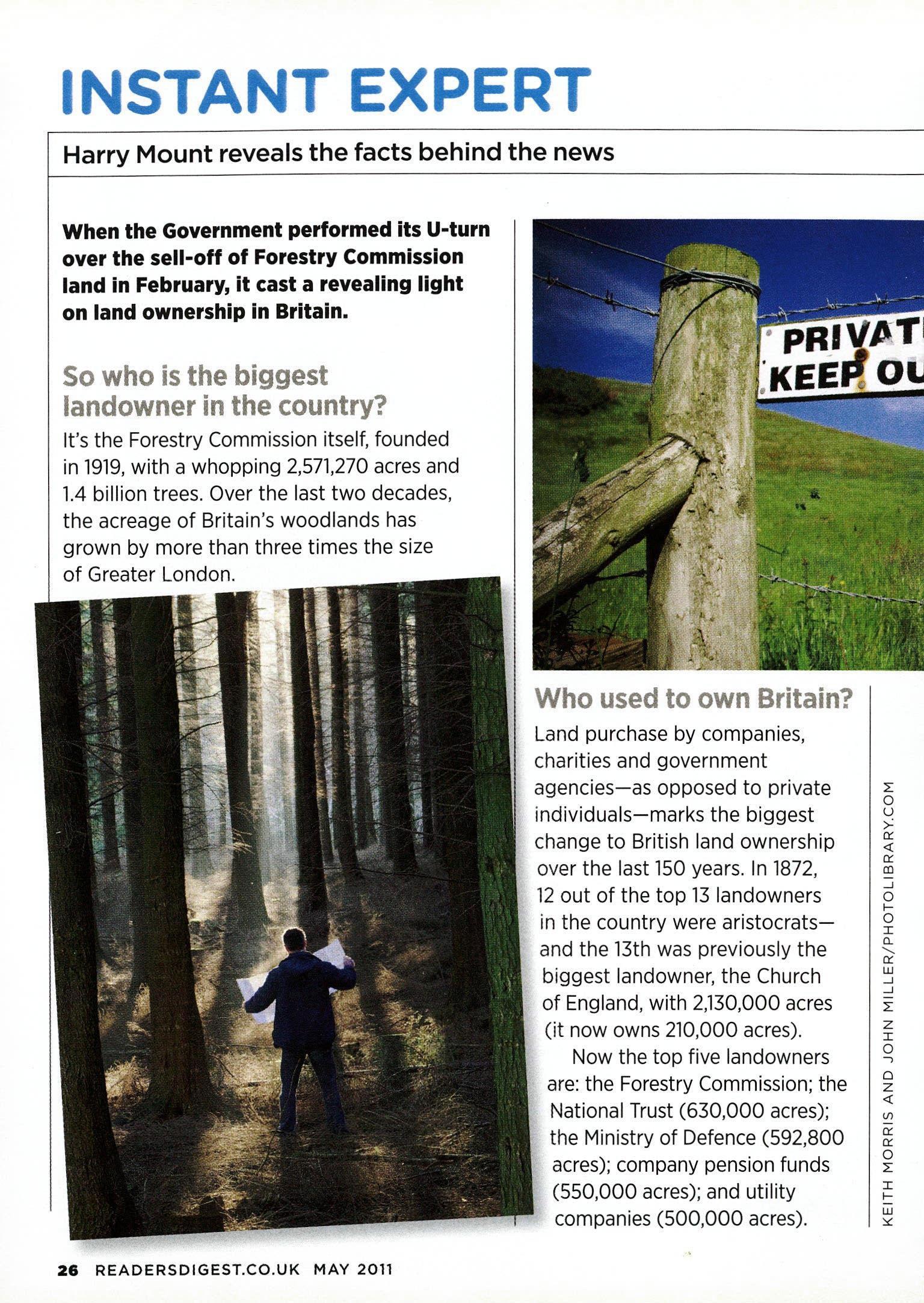
Land purchase by companies, charities and government agencies—as opposed to private individuals—marks the biggest change to British land ownership over the last 150 years. In 1872, 12 out of the top 13 landowners in the country were aristocrats— and the 13th was previously the biggest landowner, the Church of England, with 2,130,000 acres (it now owns 210,000 acres).
Now the top five landowners are: the Forestry Commission; the National Trust (630,000 acres); the Ministry of Defence (592,800 acres); company pension funds (550,000 acres); and utility companies (500,000 acres).
much
The Crown Estate controls 358,000 acres—a lot more if you added in the foreshore and seabed, officially owned by the Queen. "Officially", because although the Crown Estate is strictly owned by the Queen, it is not her private property to play around with—income from the Crown Estate goes to the Treasury and in return the Queen receives her Civil List payment.
How much land does the state own?
The Government owns six per cent of Britain. Nine per cent of England is covered by national parkland; 20 per cent of Wales; and seven per cent of Scotland (national parks aren't a feature of Northern Ireland). There are also two million acres of wasteland in the UK and 60 million acres of farmland.
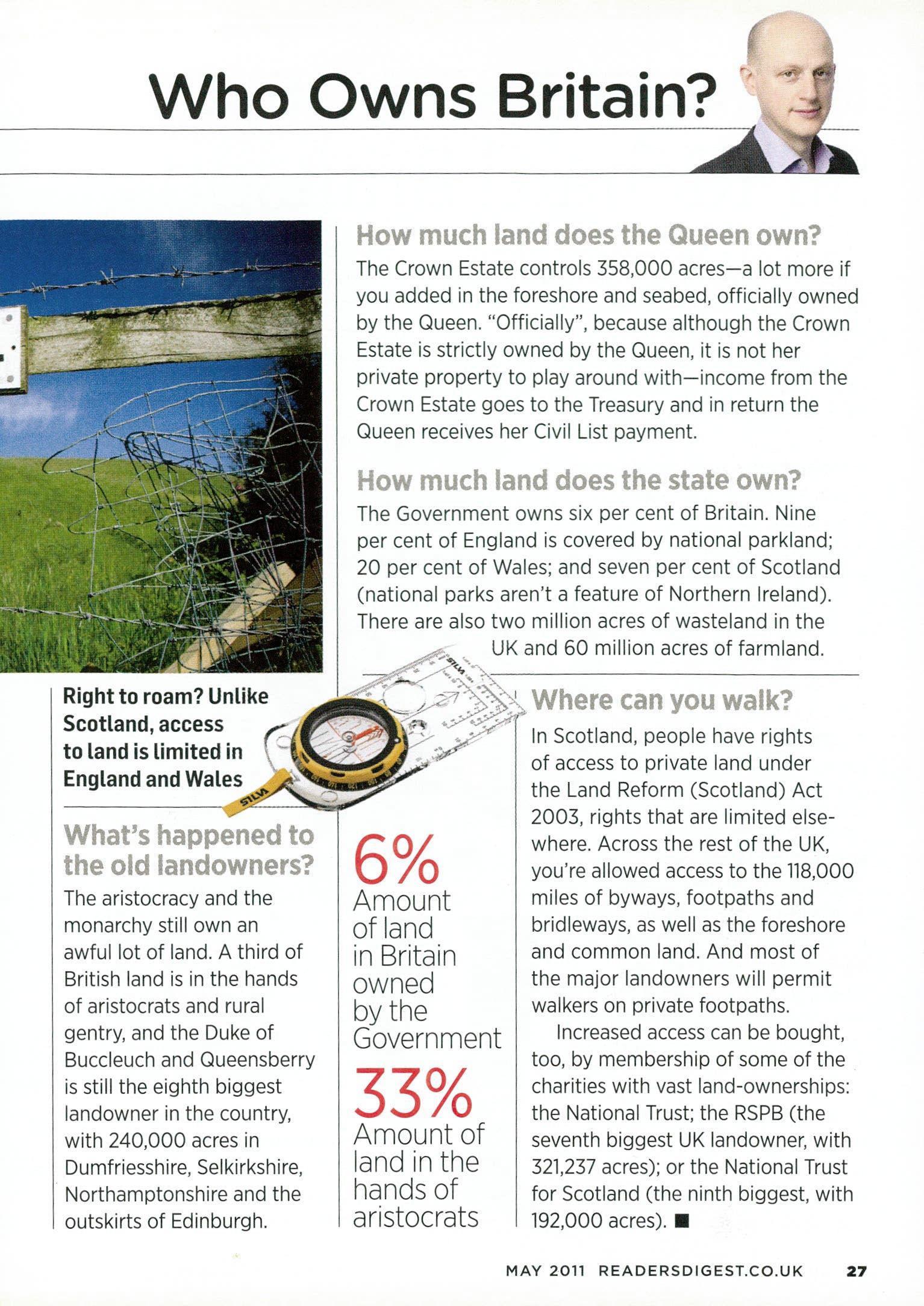
Right to roam? Unlike Scotland, access to land is limited in England and Wales
What's happened to the old landowners?
The aristocracy and the monarchy still own an awful lot of land. A third of British land is in the hands of aristocrats and rural gentry, and the Duke of Buccleuch and Queensberry is still the eighth biggest landowner in the country, with 240,000 acres in Dumfriesshire, Selkirkshire, Northamptonshire and the outskirts of Edinburgh.
6% Amount of land in Britain owned by the Government 33% Amount of land in the hands of aristocrats
In Scotland, people have rights of access to private land under the Land Reform (Scotland) Act 2003, rights that are limited elsewhere. Across the rest of the UK, you're allowed access to the118,000 miles of byways, footpaths and bridleways, as well as the foreshore and common land. And most of the major landowners will permit walkers on private footpaths. Increased access can be bought, too, by membership of some of the charities with vast land-ownerships: the National Trust; the RSPB (the seventh biggest UK landowner, with 321,237 acres); or the National Trust for Scotland (the ninth biggest, with 192,000 acres). ■
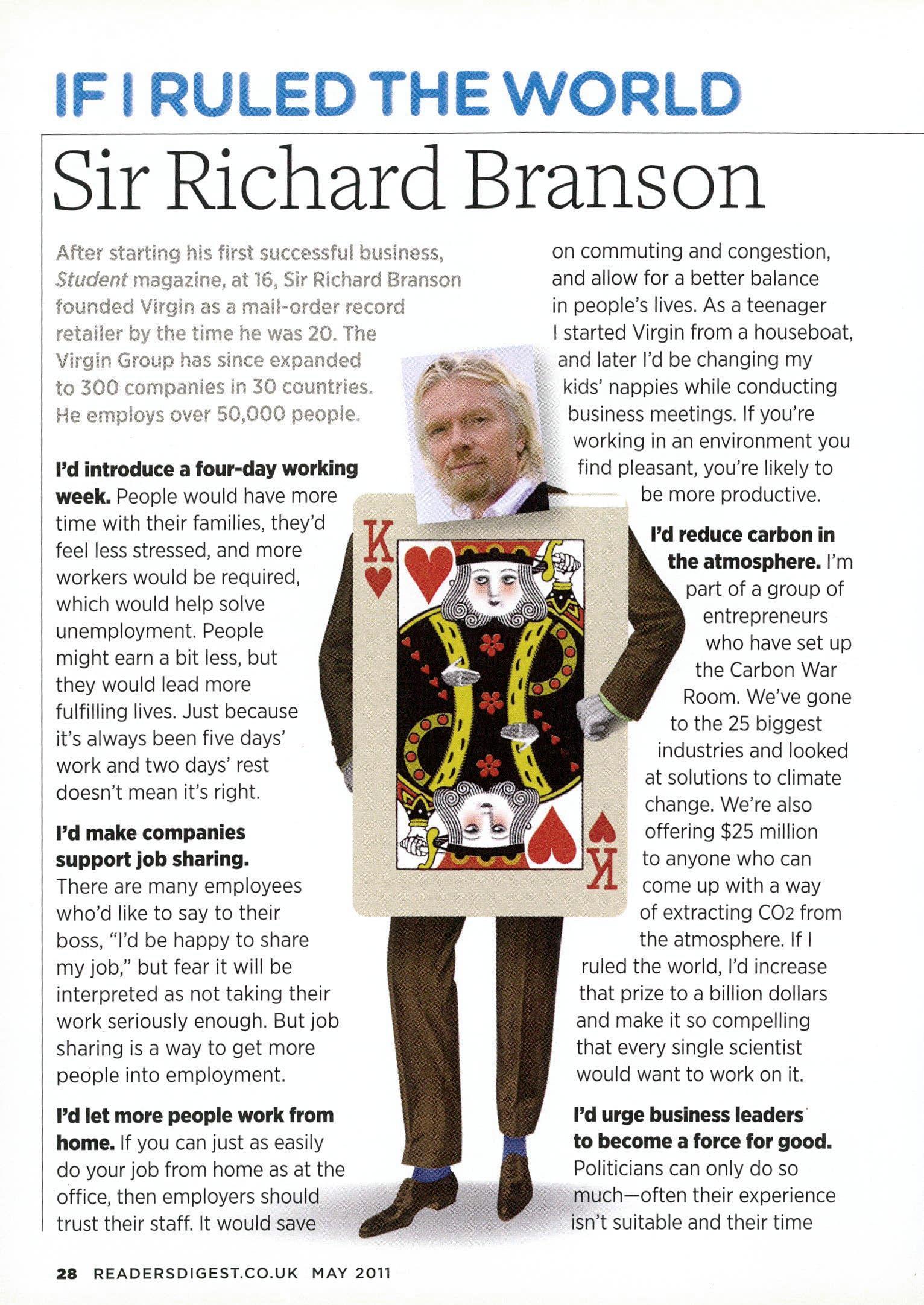
After starting his first successful business, Student magazine, at 16, Sir Richard Branson founded Virgin as a mail-order record retailer by the time he was 20. The Virgin Group has since expanded to 300 companies in 30 countries. He employs over 50,000 people.
I'd introduce a four-day working week. People would have more time with their families, they'd feel less stressed, and more workers would be required, which would help solve unemployment. People might earn a bit less, but they would lead more fulfilling lives. Just because it's always been five days' work and two days' rest doesn't mean it's right.
I'd make companies support job sharing. There are many employees who'd like to say to their boss, "I'd be happy to share my job," but fear it will be interpreted as not taking their work seriously enough. But job sharing is a way to get more people into employment.
I'd let more people work from home. If you can just as easily do your job from home as at the office, then employers should trust their staff. It would save
on commuting and congestion, and allow for a better balance in people's lives. As a teenager I started Virgin from a houseboat, and later I'd be changing my kids' nappies while conducting business meetings. If you're working in an environment you find pleasant, you're likely to be more productive.
I'd reduce carbon in the atmosphere. I'm part of a group of entrepreneurs who have set up the Carbon War Room. We've gone to the 25 biggest industries and looked at solutions to climate change. We're also offering $25 million to anyone who can come up with a way of extracting CO2 from the atmosphere. If I ruled the world, I'd increase that prize to a billion dollars and make it so compelling that every single scientist would want to work on it.
I'd urge business leaders to become a force for good. Politicians can only do so much—often their experience isn't suitable and their time
in office too brief to make a difference. So it falls to business leaders to measure their success not just in terms of profit, but also ethical responsibility. If companies set up ventures to tackle some of the global issues, we'd rapidly get on top of most of the world's problems. And the workforce would be highly motivated, knowing they were part of something much bigger than a shareholders' money-making machine.
I'd set up centres for disease control and prevention in Africa. We have them in the US and Europe, but not in Africa where diseases are still rampant. Africa needs help providing information on how to prevent disease and coordinate attacks on disease. For example, simple information such as knowing that bed nets can prevent the mosquito bites that spread malaria would reduce its onemillion annual death toll.
I'd ask the world to be more humane and less punishing. I'm a lad of the Sixties and grew up with an empathy for gay rights, women's rights and the freedom to choose how to live our lives. Take the war on drugs—it has patently failed.
tt grew up with an empathy for gay rights, women's rights and the freedom to choose how to live our Hves
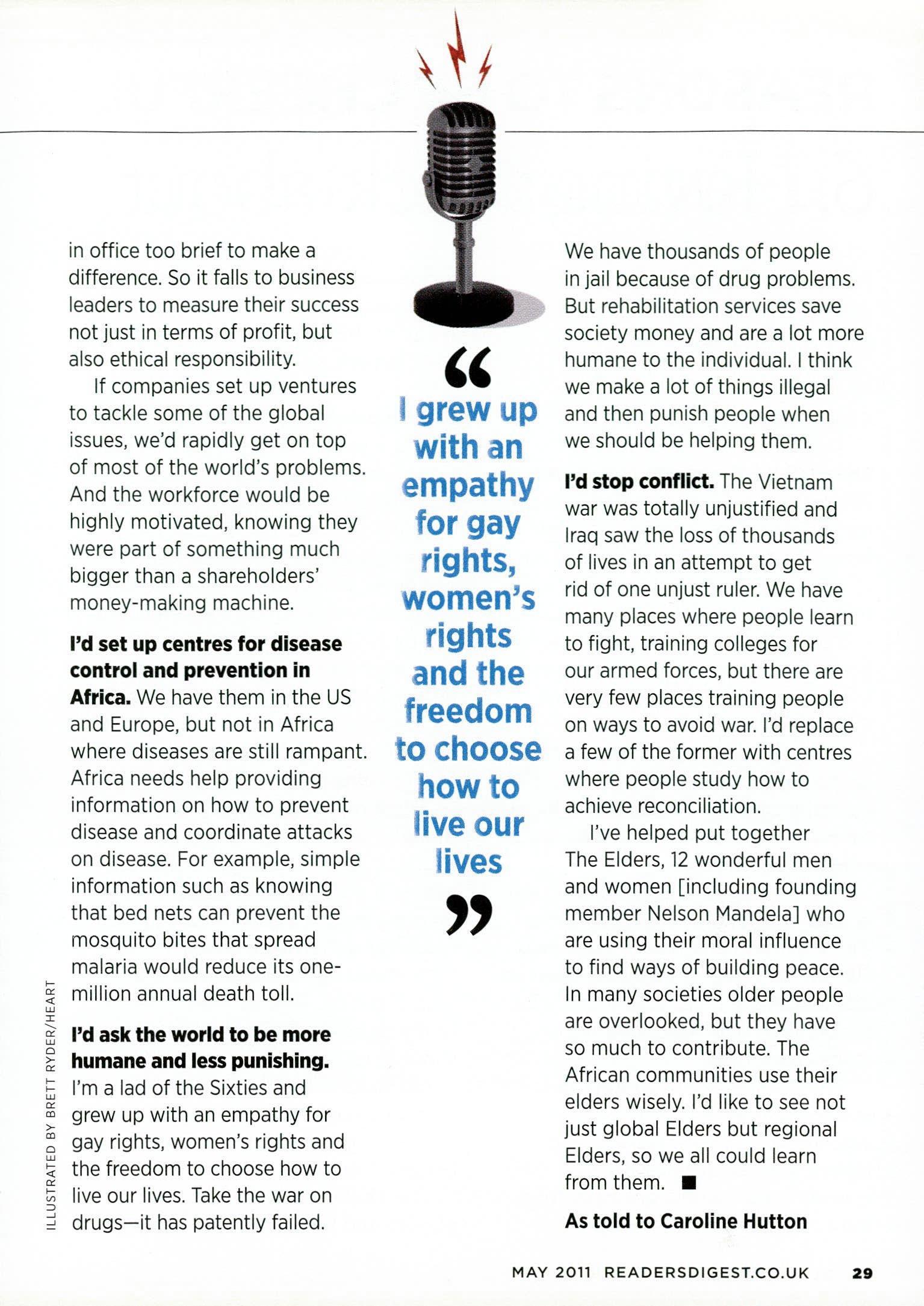
We have thousands of people in jail because of drug problems. But rehabilitation services save society money and are a lot more humane to the individual. I think we make a lot of things illegal and then punish people when we should be helping them.
I'd stop conflict. The Vietnam war was totally unjustified and Iraq saw the loss of thousands of lives in an attempt to get rid of one unjust ruler. We have many places where people learn to fight, training colleges for our armed forces, but there are very few places training people on ways to avoid war. I'd replace a few of the former with centres where people study how to achieve reconciliation.
I've helped put together
The Elders, 12 wonderful men and women [including founding member Nelson Mandela] who are using their moral influence to find ways of building peace. In many societies older people are overlooked, but they have so much to contribute. The African communities use their elders wisely. I'd like to see not just global Elders but regional Elders, so we all could learn from them. ■
As told to Caroline Hutton

My son's team aren't world-beaters (yet), but coaching them is a reward in itself, says James Brown
Think about the absolute best things you do regularly: the best nights; the most rewarding experiences; your favourite people. Now imagine if out of nowhere you had something new that you'd never done before, which you enjoy just as much. Well, that's how I feel about coaching my son Marlais's under-lOs football team Recreativo this year.
I should stress right now that this isn't a sophisticated sports club: it's basically two boys' teams and a lot of time and commitment from Jimmie, who runs the club.
We've a bag of balls, some portable goalposts and a lot of enthusiasm. The kids train in a muddy park on a Sunday morning: 14 of them in replica kits jostling to go first, and one who looks like Harpo Marx and never stops chattering.
The training is fun, muddy, noisy and often unbalanced. There are boys who are good young players, and others who come along because their parents want them to get away from the computer games. We have one
girl in our squad. She wears a leather jacket and a bandanna to train in. None of the boys have had the guts to comment on this yet.
From a practical perspective, our club is a million miles away from the professional game, but for those of us involved—the players, parents and coaches—it feels just as important.
As far as I know, Wayne Rooney has never lain crumpled on the floor because he's fallen on a gnarled and lumpy twig. I don't think Barcelona have ever had to change their team because Messi had been grounded by his mum. And I don't think Gazza ever missed training because he had to go to church.
What our team has in bundles, though—and it's something you cannot buy—is team spirit. It doesn't matter if a game has ended in tears, no one's scored a goal or (as happened recently) we've taken an almighty 8-1 hammering, these kids have never, ever, given up. Which, when you see how petulantly the professionals go about it, is genuinely inspiring. That's not to suggest they lack talent: we're currently halfway up the top division in their league and the team are getting better all the time.
The challenge of finding the right players and helping them believe in
themselves is totally rewarding. It's a cliché when football managers say "one or two good things came out of that" when they've lost, but it's true. You ask a player to tackle harder, run down the wing or shoot more often— his individual performance might not affect the outcome, but if they do as you ask and have a better game for it, it feels like you've succeeded.
Excitement aside, the real revelation is doing something for other people. Apart from working on a drugs helpline, I've never gone out of my way to do anything in the community before. I'm 45, and for most of my adult life— as many women have told me—it's all
been me, me, me. Now, on Sunday mornings, parents thank me for helping their children. Kids shake my hand. It's bizarre. All we're doing is playing two-touch football and taking penalties, but it means something when parents see their kid joining in or being praised for good teamwork.
Two matches ago, after 18 months in the team, my son scored his first- and second-ever goals in the same game. The first was a great long shot that looped over the keeper's head. Jimmie and I were bouncing around in total excitement. "It's great when your son scores his first goal," shouted Jimmie 0-
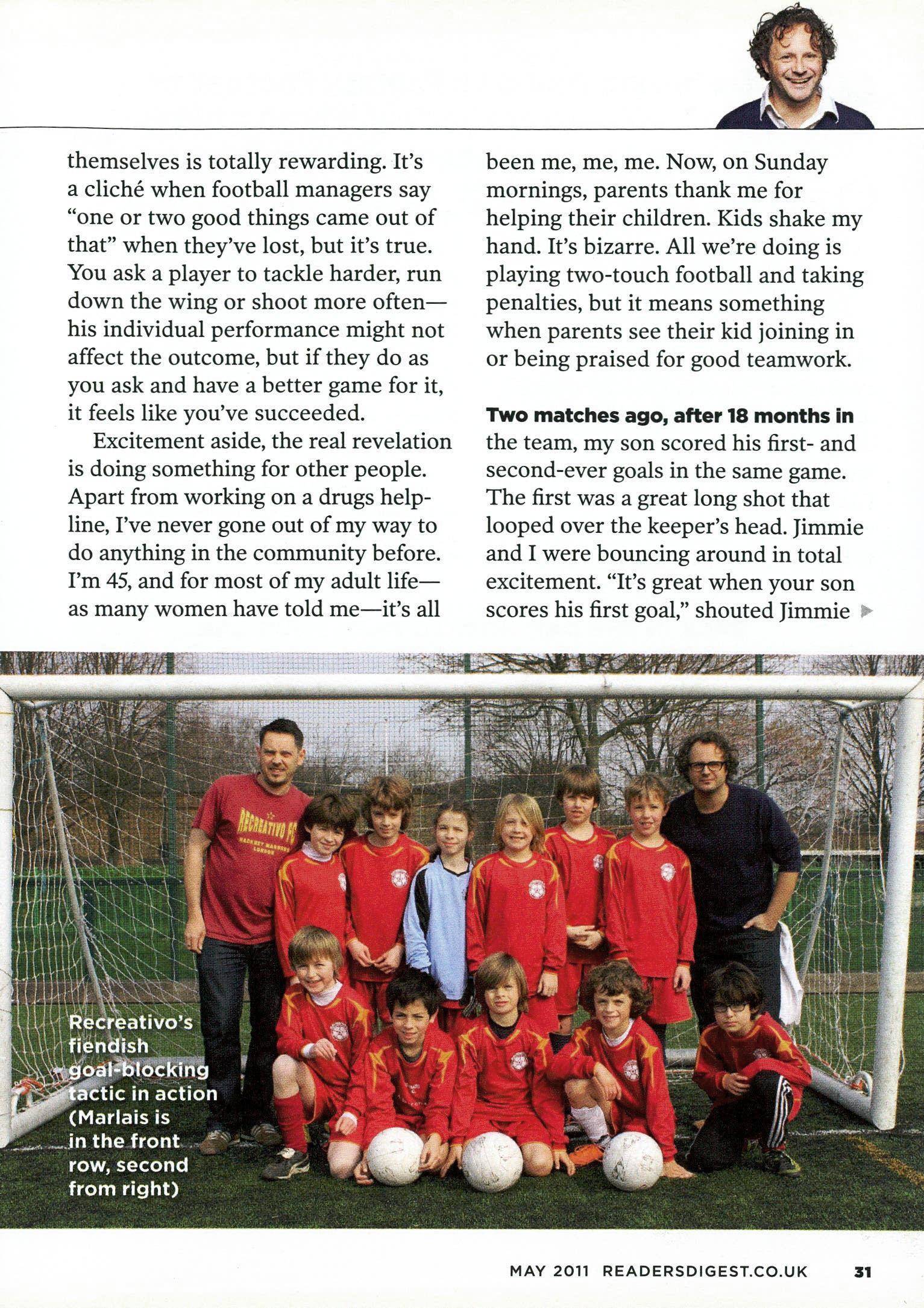
Recreativo's fiendish
bctic in action (Marlais is in the front row, second from right)
gg It's like having your own Fantasy Football or Fifa Pro team—except you can't push a button. to get them to shoot when you want them to 77
above the on-pitch celebrations. And, to be honest, it's pretty exciting when any of them do.
In our last game, in the final five minutes, we surrendered a 3-0 lead against the league leaders. Some of the dads asked, "How did you keep your temper?" But I never felt angry, just delighted we'd got to that lead in the first place, and concerned that the way I'd organised the substitutions meant we were weaker at the end than at the beginning. As my colleague Matt says,

"It's like having your own Fantasy Football or Fifa Pro team." And he's right. The big difference is you can't push a button to get them to shoot when you want them to.
I love it, though: it's the next best thing to playing yourself—and we'll address that subject in another column, when I've got back into shape. •
James, founder of Loaded magazine, now edits Sabotage Times—an online magazine with the motto: "We can't concentrate, why should you?"
It's still relevant today—even if the modern motorist would kill for that amount of space. "How to Park Your Car" by Irving Marsh is from our August 1961 issue and does exactly what it says on the tin...at great length:
1.Check traffic in your rear-view mirror, then signal that you are stopping. Drive alongside car 2, with about two feet of space in between.
2. Back slowly, steering sharply to the left, until your car is at nearly a 45-degree angle to the kerb. Your left front door should now be opposite the rear bumper of car 2.
3. Straighten the front wheels. Continue backing into the space until the left end of your front bumper is opposite the right end of the rear bumper of car 2.
4. Turn the steering wheel rapidly to the right as far as it will go while backing slowly into the parking space. Your left rear wheel should now be close to the kerb but not touching it.
5. Go forward slowly, turning the steering wheel to the left to bring the car parallel to the kerb. Stop the car after centring it at about an equal distance from cars 2 and 3.
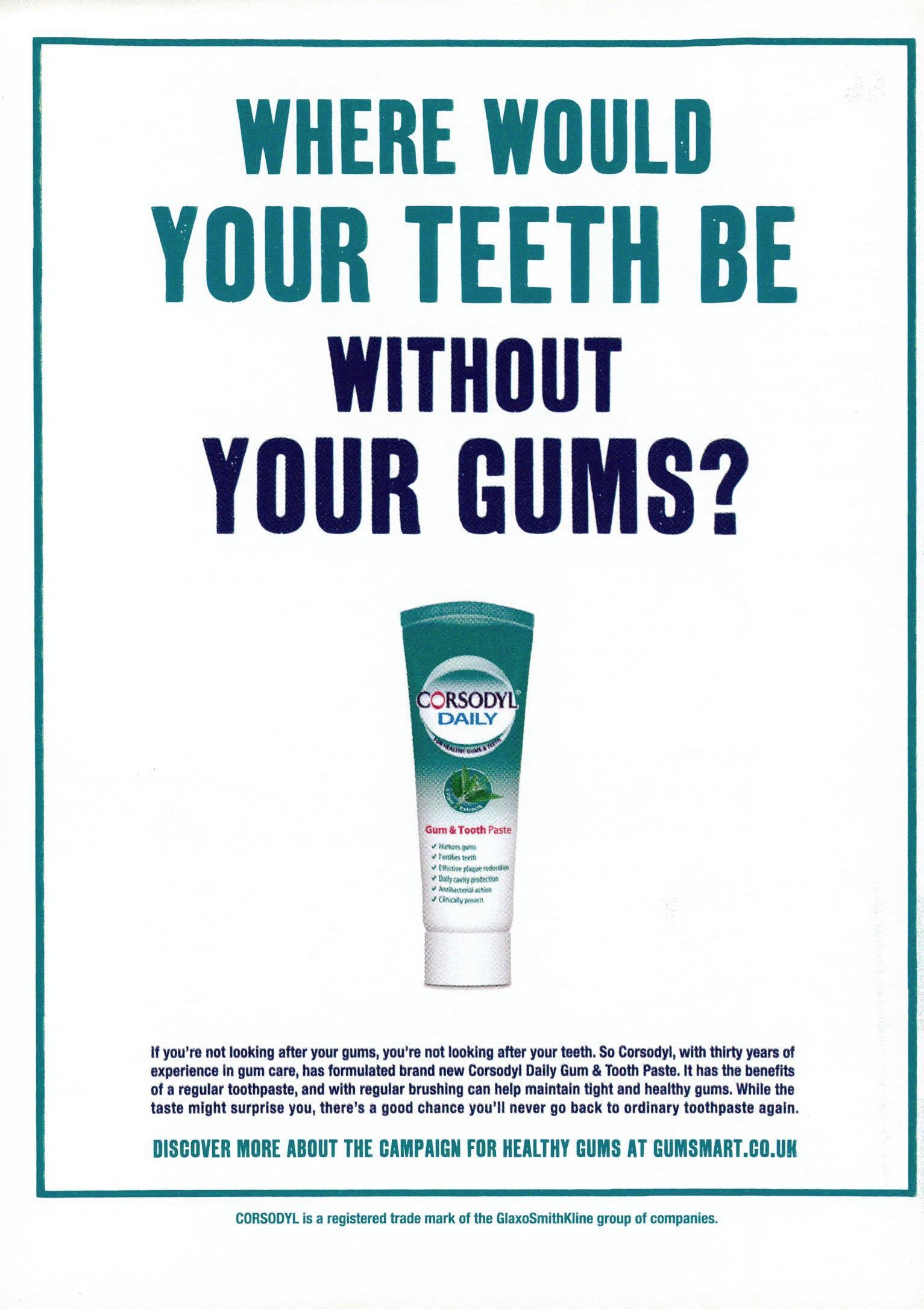
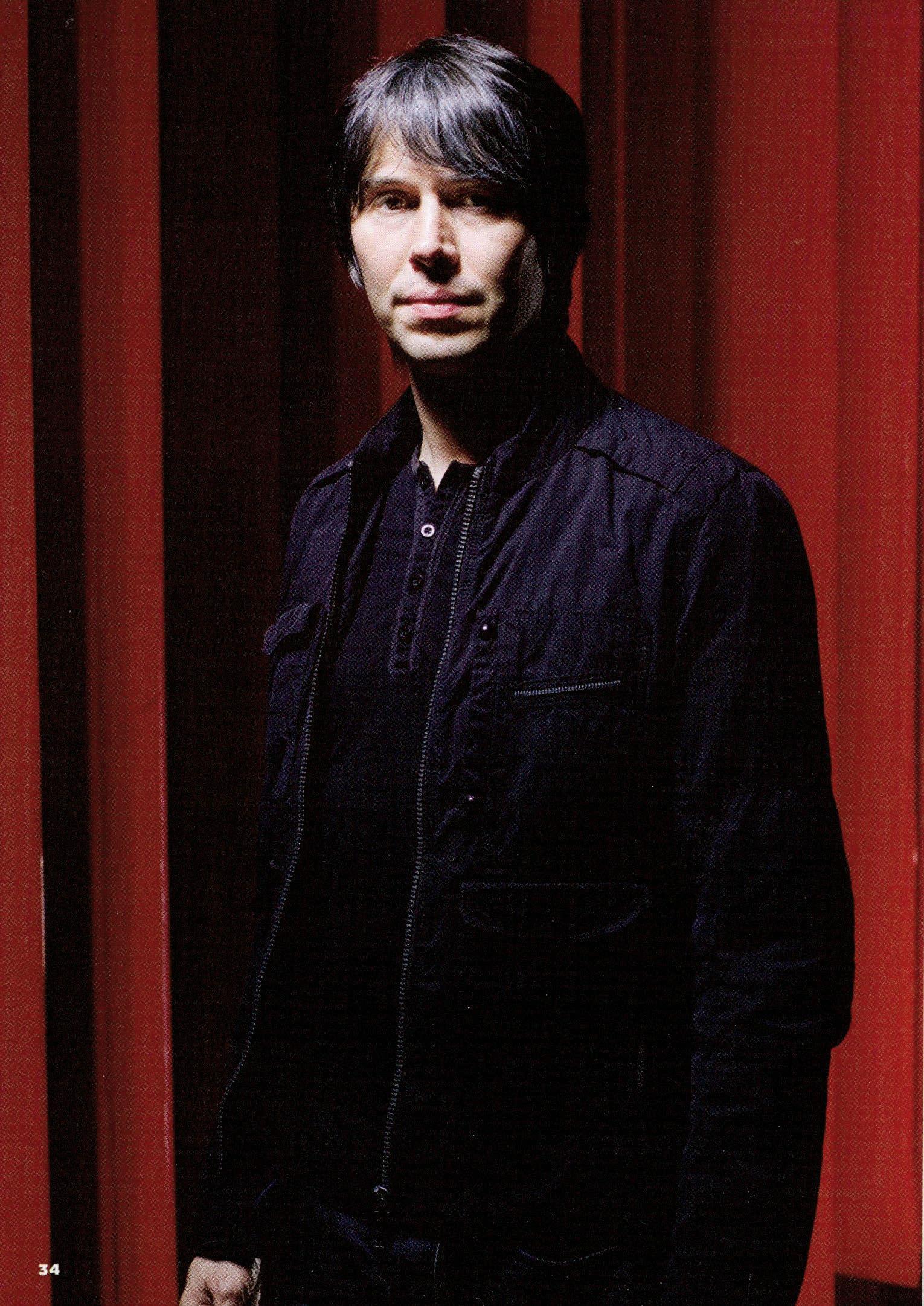
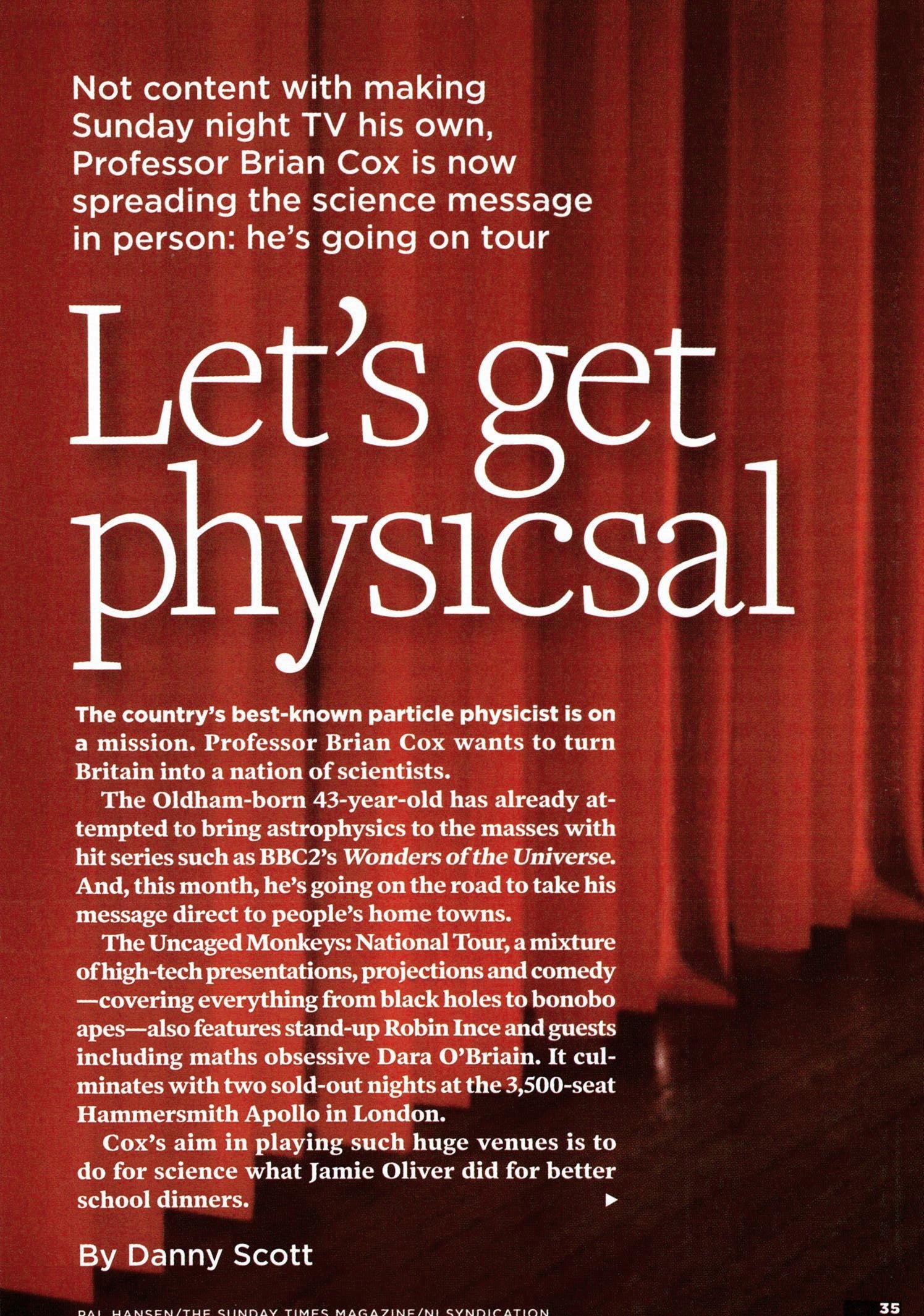
Not content with making Sunday night TV his own, Professor Brian Cox is now spreading the science message in person: he's going on tour
The country's best-known particle physicist is on a mission. Professor Brian Cox wants to turn Britain into a nation of scientists.
The Oldham-born 43-year-old has already attempted to bring astrophysics to the masses with hit series such as BBC2's Wonders of the Universe. And, this month, he's going on the road to take his message direct to people's home towns.
The Uncaged Monkeys: National Tour, a mixture of high-tech presentations, projections and comedy —covering everything from black holes to bonobo apes—also features stand-up Robin Ince and guests including maths obsessive Dara O'Briain. It culminates with two sold-out nights at the 3,500-seat Hammersmith Apollo in London.
Cox's aim in playing such huge venues is to do for science what Jamie Oliver did for better school dinners.
By Danny Scott4
"I want to make science so culturally important, with such widespread support, that the Government is forced to say, `Right, what do we need to do?' " says the Manchester University professor in his familiar Northern drawl. "It's about science and technology getting more funding, to benefit the economy and our future. For every dollar the Apollo space programme cost, for instance, it made $14 for American business.
"The foundations and infrastructure are already there. We're home to some of the biggest research and development companies, such as AstraZeneca and BAE Systems. And around 45 per cent of our economy is made up of knowledgeintensive services and industries.
"But Britain used to be the world leader; we used to be number one. We're still very proud of our universities— they're second only to the US—but, in terms of ambition, we're being overtaken by the likes of India and China. Let's get back on track. Let's aspire to be the best.
"Science is certainly beginning to break through into popular culture. Look
at the programmes you get on telly these days. Maths, history, natural history, astronomy, physics, geology, engineering... they're all out there, not just tucked away in some dark, dusty corner. I was telling some fellow scientists about the Hammersmith Apollo gigs. They couldn't believe it—Z000 people coming to see a science show! It's fantastic, isn't it?
"But what we all need to understand is that science and technology rely on public support. They rely on the taxpayer. Yes, there's a lot of privately funded research, but our scientific basis lies with our universities. If the Hubble telescope takes some beautiful pictures of distant galaxies, the public have a right to see them. They shouldn't just be available to the professionals."
It's not hard to understand why Cox —cheekily referred to by his friends as "the Peter Andre of particle physics"— has ruffled a few feathers in the scientific community. And he knows that Uncaged Monkeys—an offshoot of Ince and Cox's Radio 4 discussion series The Infinite Monkey Cage—is unlikely to silence some
The ancestors of the whale were land mammals. Evolution doesn't always mean moving out of the water.

Around 1% of the static on an untuned television is caused by background radiation from the Big Bang. Who says there's nothing on TV any more?
The Ph dippme tarsier is the only primate 'that can rotate its head through 180 degrees. Its eyes are bigger than its brain and stomach.
critics. Cox was, of course, the keyboard player in chart-topping Nineties band D:Ream. "Rest assured, this tour is going to be nothing like that," he says. "We won't be punching the air or stage-diving. But will we be accused of dumbing down science? Yes, of course we bloody will! They'll be sniping, especially the online lot [contributors to the BBC messageboards have accused him of stating the obvious too much]. It's just snobbery
"Maybe some people think that, because I'll be sharing a stage with comedians such as Robin and Dara, I'm making fun of science. Not at all! I think there's a very important connection between it and comedy. If a comedian hears someone talking rubbish, he'll tackle that person. If a scientist hears someone say that the world was created 6,000 years ago, he'll say, 'No, it wasn't. Shut the f*** up!' Comedians and scientists are often rational people...quite brutal with their intellect.
"Ultimately, we're just trying to engage people. I'm trying to advertise science, to say, 'This is what it does, and this is why it's so important to all of us.' "
WHY EVERYONE SHOULD KNOW MORE ABOUT SCIENCE. YES, INCLUDING YOU.
"The most important thing that everyone needs to know about science is that it's not an 'opinion'. It's got nothing to do with emotions, personal agendas or prejudices. Throw all that baggage away, because you don't need it.
"Take the design of an aeroplane's wing, for example. It's like that because of knowledge that's been accumulated over hundreds of years. And it's the same with something like climate change. If I want to know what effect it will have, I need to study the atmosphere, CO2 and fluid dynamics, using some of the same equations I'd use to design a plane's wing. Then I can put that information into a computer model and predict an answer.
"I'm not going to say, 'My climate model is correct.' Science never claims to be 'right'. But it's the most reliable ■
It's probably impossible to travel faster than the speed of light, so Star Trek's five-year mission might not boldly go so far after all.
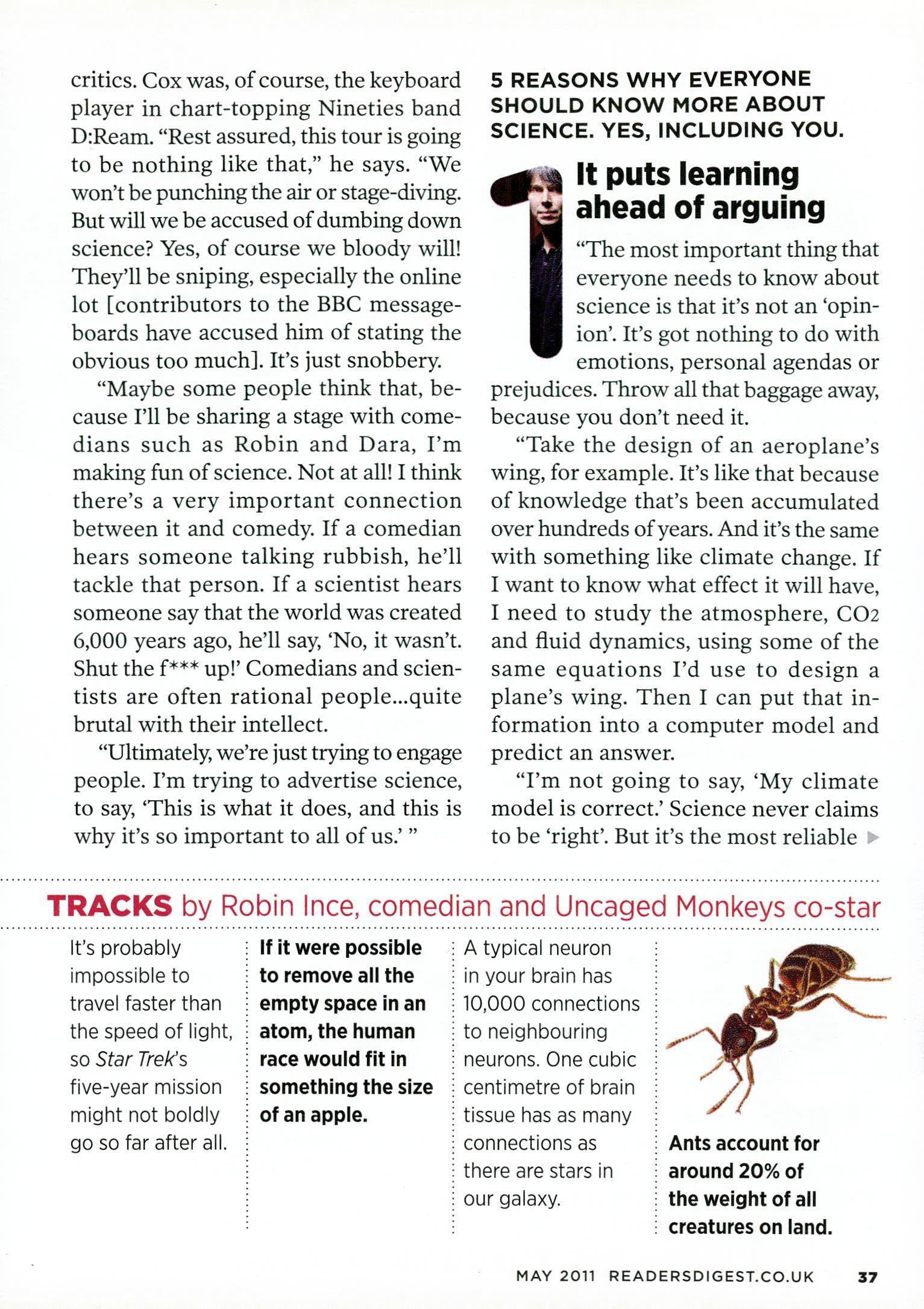
If it were possible to remove all the empty space in an atom, the human race would fit in something the size of an apple.
A typical neuron in your brain has 10,000 connections to neighbouring neurons. One cubic centimetre of brain tissue has as many connections as there are stars in our galaxy.
Ants account for around 20% of the weight of all creatures on land.
way we have of finding out what's going to happen. It's not my opinion —it's the best we can do!"
/11:44, Curiosity takes 4 41/ 71_ us forward
"Almost everything we see around us today— such as medicine, communications, your house, TV—is based on this technique called science. Now, some people might say, 'Yes, but it's also given us terrible inventions like guns and bombs.' Yet the thing about science is that it's completely amoral. Exploration is amoral. We have democracies to decide what we want to do with our acquired knowledge.
"Scientists are still human beings; they can march against wars and argue in favour of nuclear disarmament. But that doesn't curb their desire to investigate and experiment. When you set out to explore the world, you don't always know what you're going to find. But can you imagine living in a world where you wouldn't attempt anything unless you knew the outcome?"
"Smallpox killed around half a billion people in the 20th century. Half a billion! Then, around 1970, we started vaccinating everyone against it and, all of a sudden, it killed...nobody. That's one of the greatest human achievements of all time.
CARL SAGAN A pioneer in making science more popular inthe Eighties

"It's a slightly depressing fact, but diseases will kill most of us. And nature can wipe out entire civilisations. Entire planets! Impacts from space have almost destroyed the earth several times.
"Humanity's survival depends on us doing our best to eradicate pandemic disease and combat natural disasters. It depends on being able to understand microbes and manipulate those meteors flying around. Carl Sagan [the legendary US astronomer] once said that if the dinosaurs had developed a space programme, they would still be here!"
"There are some scientific achievements that have had such a huge cultural impact that it's useful to sit back and reflect on how astonishing they are.
"Sitting here on this tiny planet, we have managed to measure the age of the entire universe-13.7 billion years. Just as a simple time frame, that's an
incredible number, but it's dwarfed by the fact that we've been able to measure it. Do you know how long we've been around? The earliest hominid footprint—the first of our ancestors to walk upright—is just three million years old. That's not even one thousandth of the age of the earth! In that time, we've gone from those first steps in Tanzania to putting a footprint on the moon.
"Just knowing what we've already achieved is, I believe, actually powerful enough to move society forward; to inspire us to greater heights. In the next 50 years, I'm pretty sure we'll land a man on Mars."
b"It doesn't matter who you are, what your religion is, where you come from, or how famous you are.

People—especially kids—have the idea that you need to be a genius if you want to gain access to the scientific world. That's not true. If science, technology or engineering capture your imagination, then stick with them. The opportunities are there.
"The average 15-year-old probably dreams of winning The X Factor or playing for Manchester United. That's only going to happen to a tiny number of people, but society is crying out for scientists. And if you do choose the profession, the possibilities are literally endless. They stretch far beyond the pop-music chart—as far as your imagination. You might change the way we view life itself!" ■
» Uncaged Monkeys: National Tour, with regulars Brian Cox, Robin Ince, Simon Singh and Ben Goldacre, starts on May 1. See readersdigest.co.uk/links for more details. BBC Radio 4's The Infinite Monkey Cage also returns in May.
You'd think, being functionally blind, that the star-nosed mole would be an easy creature to evade. But potential prey—such as insects, worms and other small invertebrates—should think again. This mammal is the fastest in the world at detecting a tasty morsel, capturing it and consuming: it takes just 220 milliseconds. This ability is all down to its most prominent feature—the pink strands around the snout contain more than 25,000 sensory receptors, ideally adapted to the wetlands of Canada and North America where star-noses live.
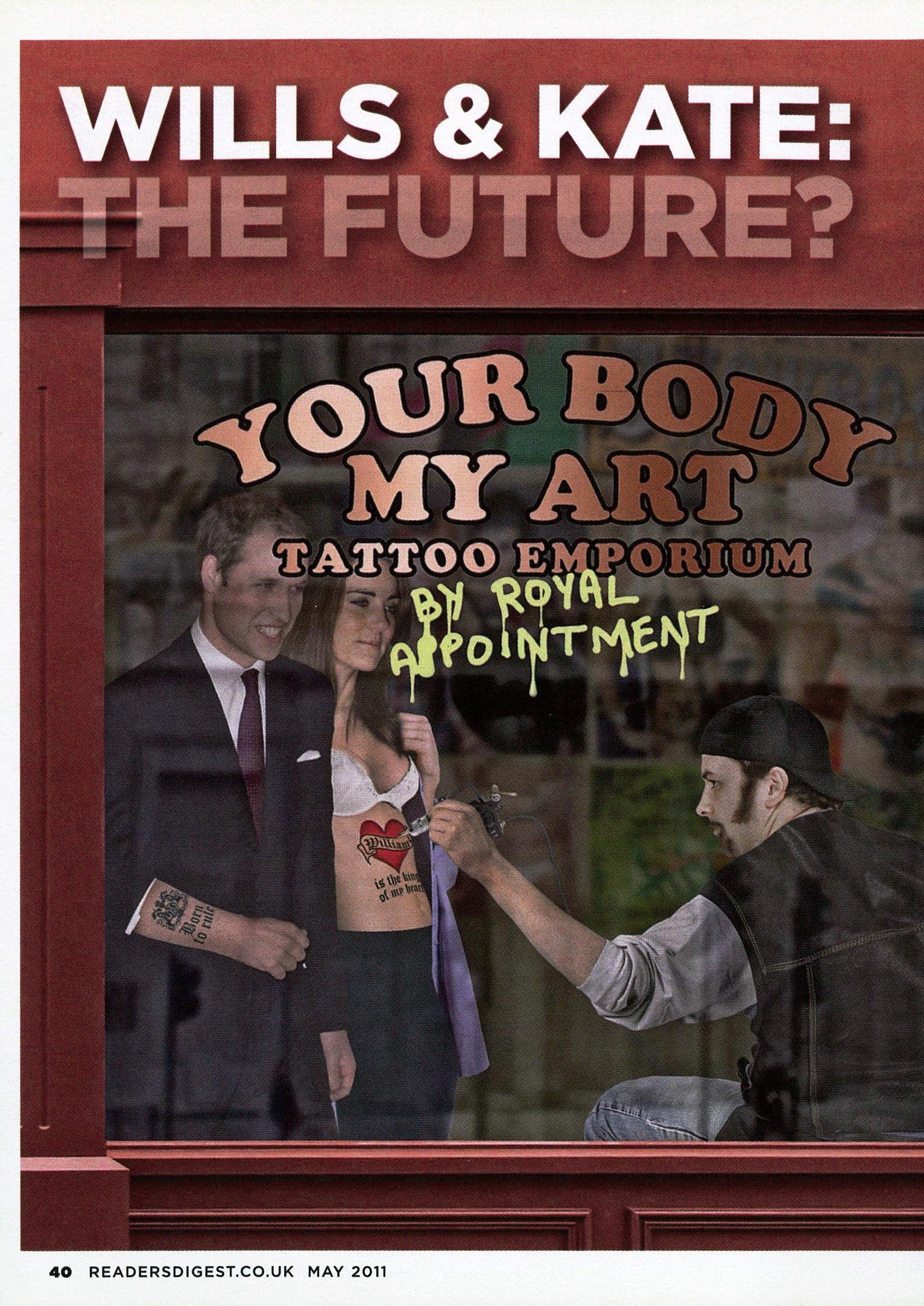
It's a tough call to predict what lies ahead for the royal couple. But we asked comedienne Shappi Khorsandi to have a go anyway...

THEIR "PRIVATE COMMITMENT"
William surveyed the boggling eyes of his advisers.
"What?" he asked sheepishly as he rolled down his sleeve and Kate tucked her blouse in.
"Well, I suppose the execution is undeniably immaculate, Your Majesty," stuttered Sir Percival Twyte-Thistledown.
Kate dimpled. "Thank you Percy! I chose William's motto 'Born To
Rule'. I think it combines very tastefully with the royal crest. And 'William is the King of My Heart' sums up my deepest feelings. To think people said I was common..."
Meanwhile, on Peckham High Street, Dave "Needles" McNulty of Your Body, My Art Tattoo Emporium stood back to admire the latest addition to his shop sign: "By Royal Appointment".
"One money-saving option would be a ceremony on the set of the Rovers Return. You get it... Coronation?" chuckled Prime Minister Ed Miliband. Wills "got it" only too well.
"Just an idea," the PM coughed nervously. "Your

father expressed a wish for you to travel to the Abbey by bicycle..." Kate screamed internally.
"And to save on security we'll put you up at the Holiday Inn Express, just across the bridge from the Abbey." William sighed. This New Old Labour
government was worse than the Coalition.
"Right, well, moving on to sponsorship," continued Miliband. "After your brother's marriage to Miss Winehouse, they will now officially be known as 'the Duke and Duchess of Kronenbourg'. OK?"
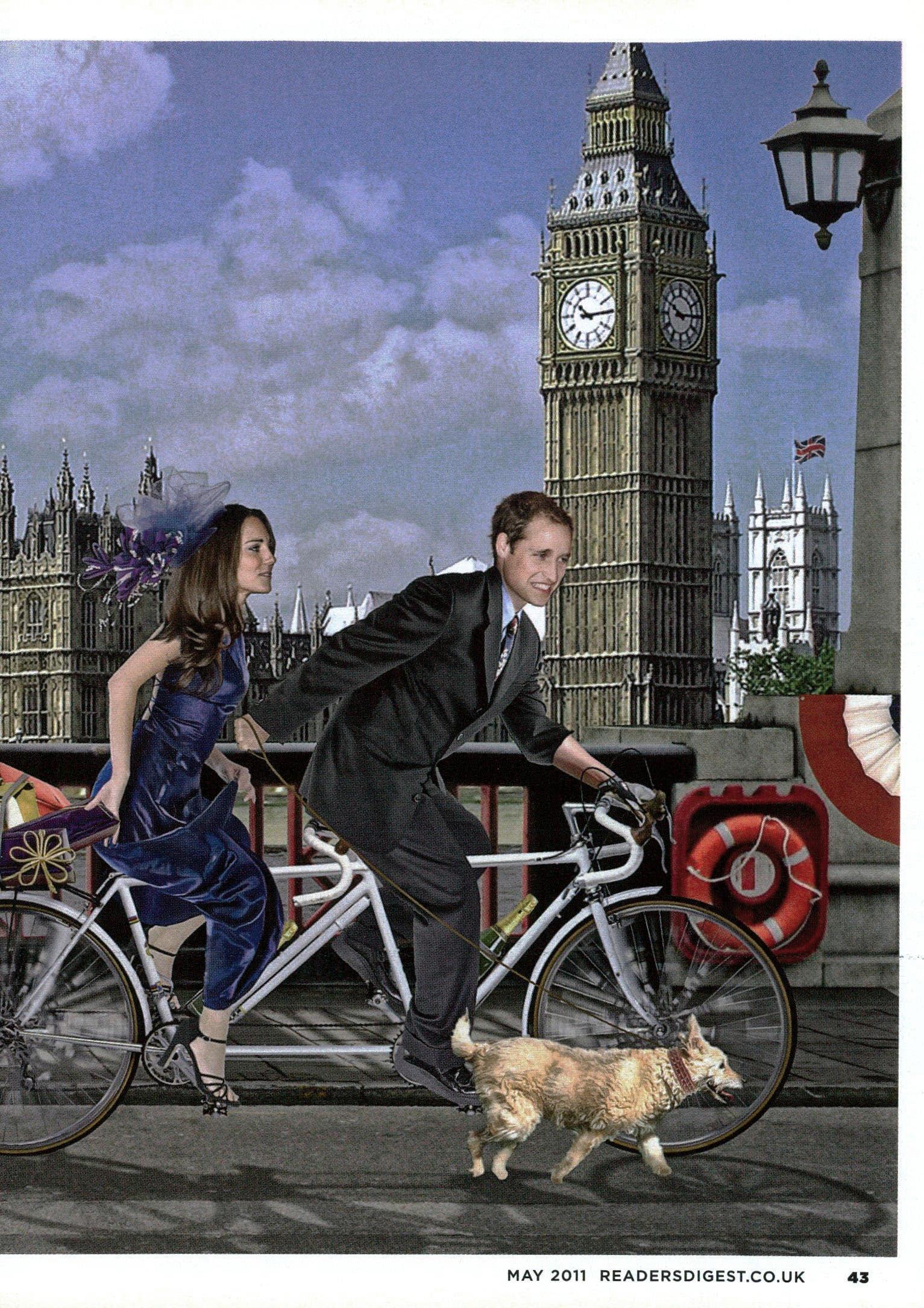

•••"..
i•L TEXT ROMEO to 55024
WHO WANTS TO BE KING
LORD FORSYTH
13,952,32t3
Live data feed [THAI

"And the results of the 2030 'King of the UK' election are..." Kate quivered as she waited. Had William made a terrible mistake by bowing to pressure to open the monarchy to a public vote?
"Lord Forsyth of
Wentworth: 13,952,326 votes." Brucie struck his sprightly Rodin's The Thinker pose. Kate admired his wiry frame.
"Take That: 7,426,923." Age had not been so kind to the poptastic quintet.
"Romeo Beckham: 3,203,456."
"William Windsor: 24,780,431!" They loved him! They loved him as much as she did! Should Kate, too, submit herself to the public ballot? She thought for a moment. Perhaps not. She didn't fancy her chances against Dame Cheryl Cole. ►
111 nand = NI.24ma
They hadn't seen their daughter Victoria for eight years. Of course they'd watched her on television singing her controversial brand of anarcho-folktechno-metal. Kate even sobbed secretly over Victoria's songs such
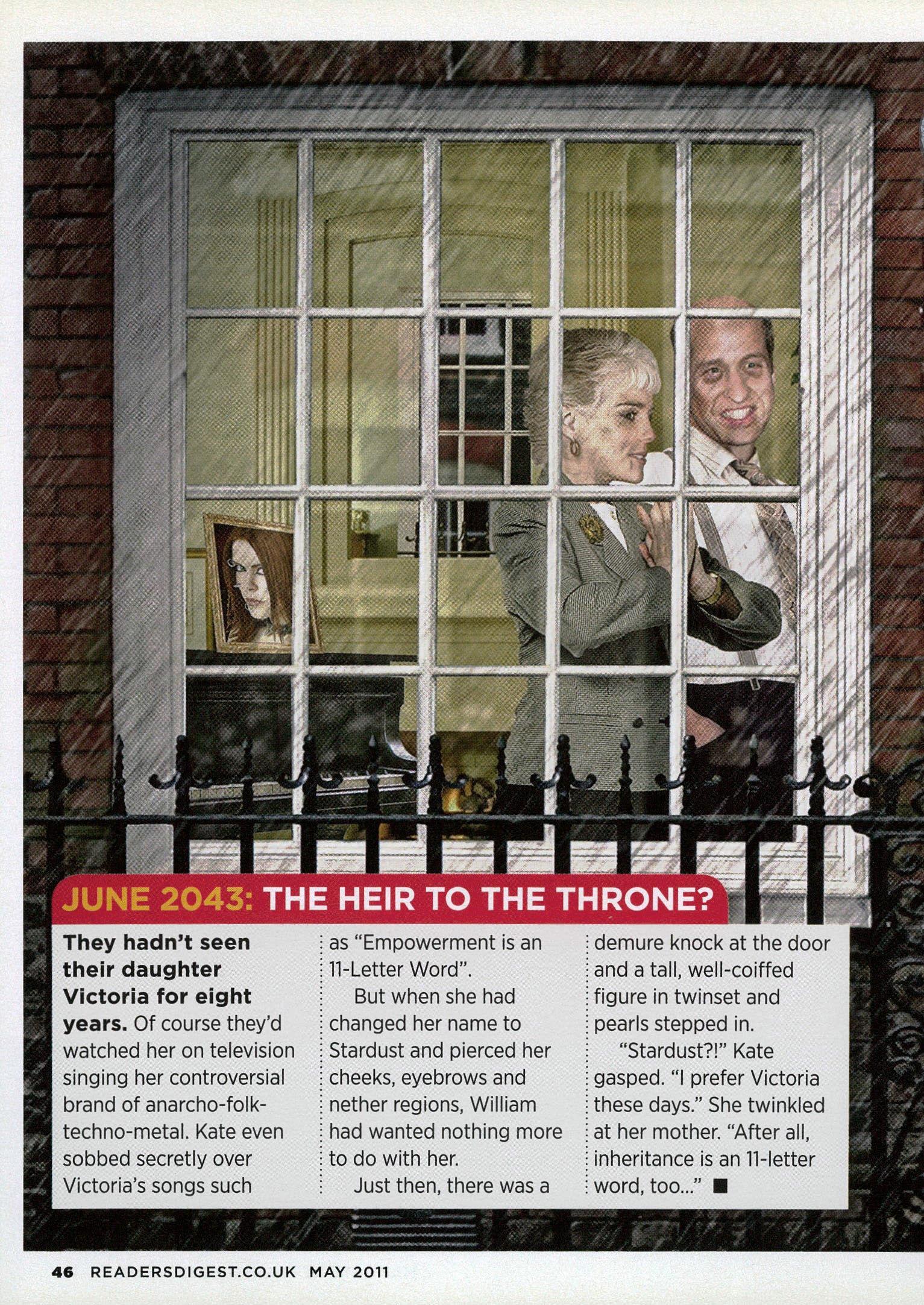
as "Empowerment is an 11-Letter Word".
But when she had changed her name to Stardust and pierced her cheeks, eyebrows and nether regions, William had wanted nothing more to do with her.
Just then, there was a
demure knock at the door and a tall, well-coiffed figure in twinset and pearls stepped in.
"Stardust?!" Kate gasped. "I prefer Victoria these days." She twinkled at her mother. "After all, inheritance is an 11-letter word, too..." ■

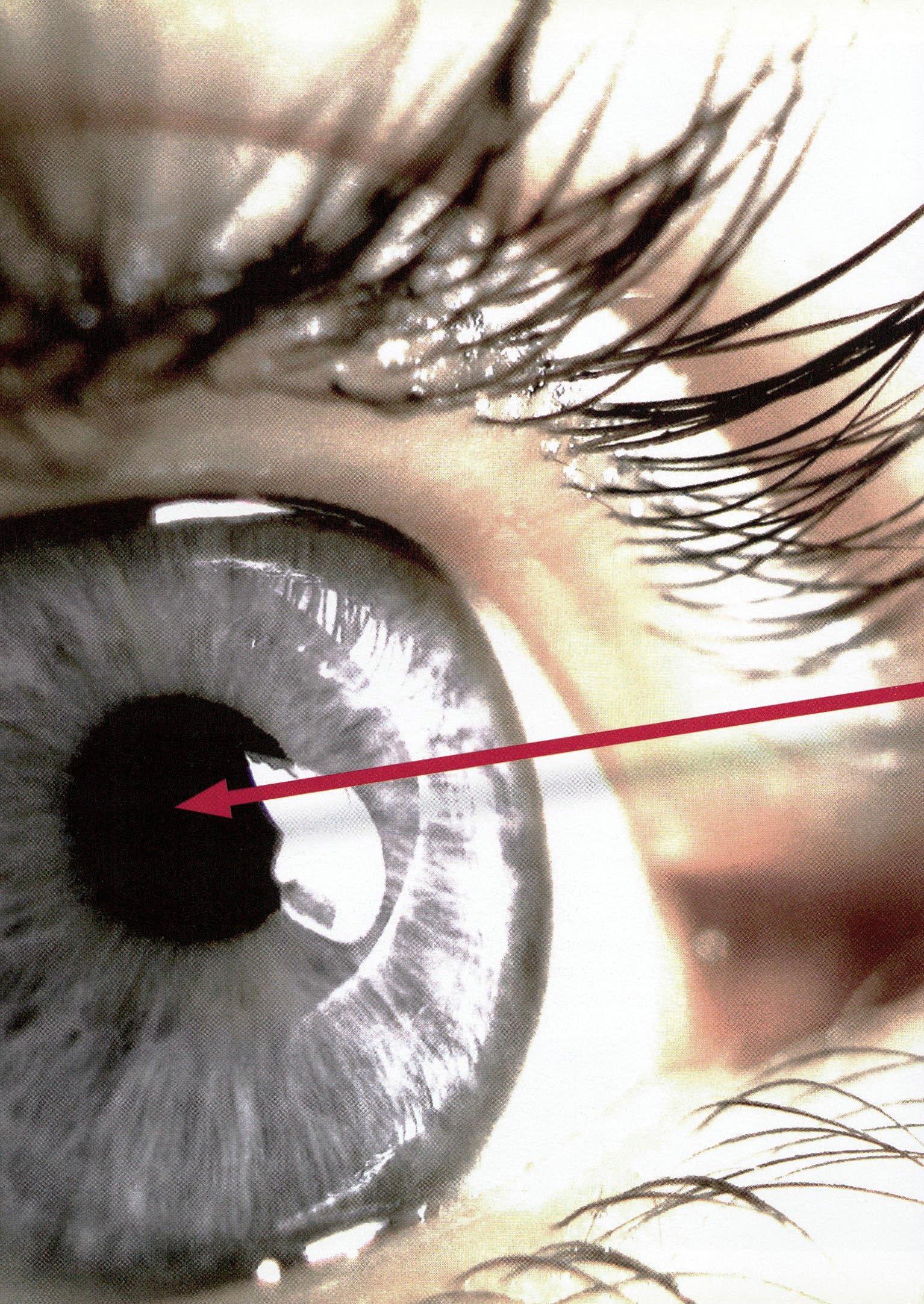
Dark circles under your eyes? Reddish lines under your nails? Your body is giving you clues. Time to turn health detective!
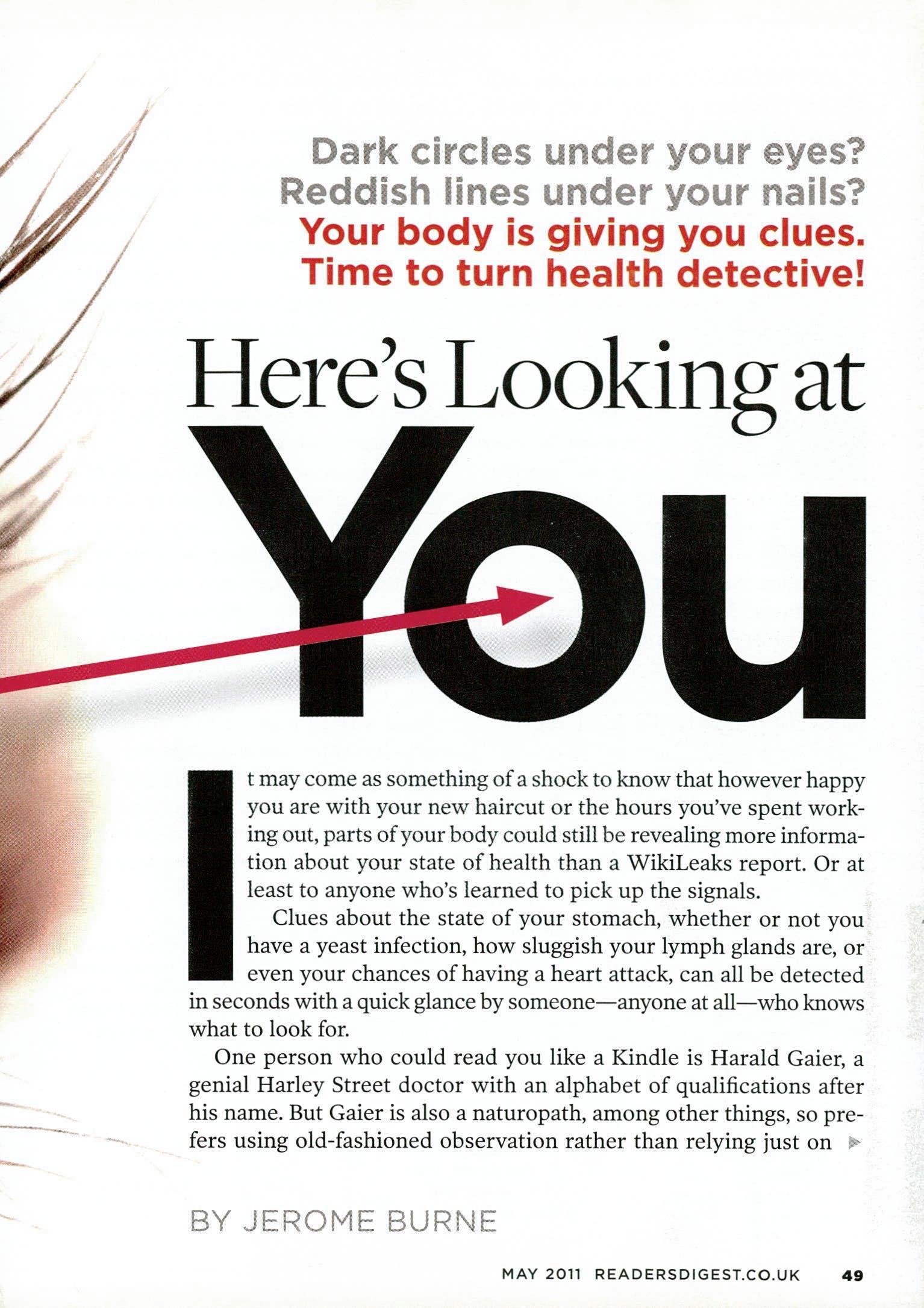
It may come as something of a shock to know that however happy you are with your new haircut or the hours you've spent working out, parts of your body could still be revealing more information about your state of health than a WikiLeaks report. Or at least to anyone who's learned to pick up the signals.
Clues about the state of your stomach, whether or not you have a yeast infection, how sluggish your lymph glands are, or even your chances of having a heart attack, can all be detected in seconds with a quick glance by someone—anyone at all—who knows what to look for.
One person who could read you like a Kindle is Harald Gaier, a genial Harley Street doctor with an alphabet of qualifications after his name. But Gaier is also a naturopath, among other things, so prefers using old-fashioned observation rather than relying just on t.
BY JEROME BURNE40 high-tech blood tests and scans to diagnose the state of your health. Fortunately, he has kind eyes.
Chinese and other Eastern medical systems still look out for all sorts of variations or changes in anything from colour and texture of the skin, nails and eyes to pulse rates. "But Western medicine has lost something in recent years," Gaier says.
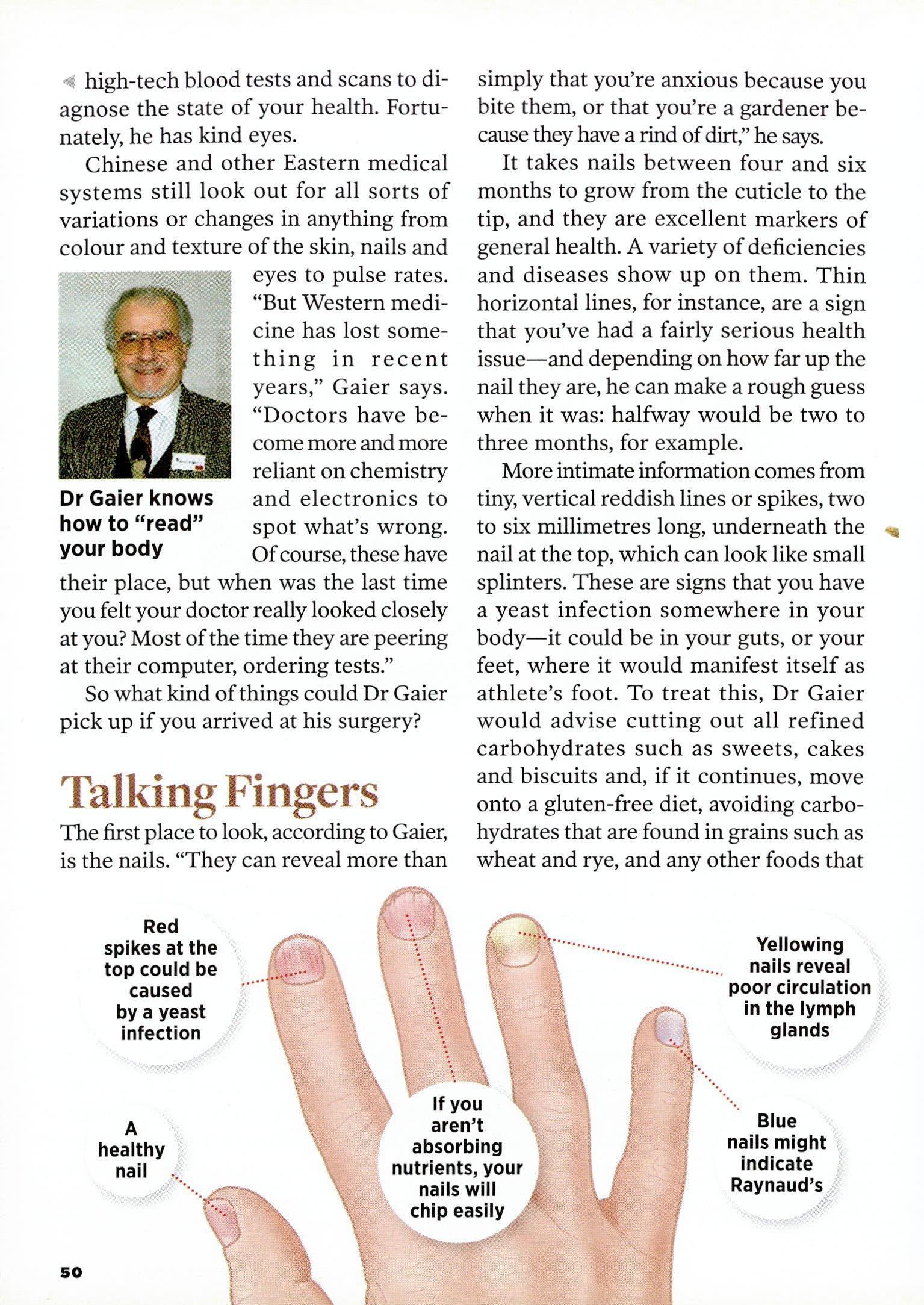
Dr Gaier knows how to "read" your body
"Doctors have become more and more reliant on chemistry and electronics to spot what's wrong. Of course, these have their place, but when was the last time you felt your doctor really looked closely at you? Most of the time they are peering at their computer, ordering tests."
So what kind of things could Dr Gaier pick up if you arrived at his surgery?
The first place to look, according to Gaier, is the nails. "They can reveal more than
Red spikes at the top could be caused by a yeast infection
A healthy nail
simply that you're anxious because you bite them, or that you're a gardener because they have a rind of dirt," he says.
It takes nails between four and six months to grow from the cuticle to the tip, and they are excellent markers of general health. A variety of deficiencies and diseases show up on them. Thin horizontal lines, for instance, are a sign that you've had a fairly serious health issue—and depending on how far up the nail they are, he can make a rough guess when it was: halfway would be two to three months, for example.
More intimate information comes from tiny, vertical reddish lines or spikes, two to six millimetres long, underneath the nail at the top, which can look like small splinters. These are signs that you have a yeast infection somewhere in your body—it could be in your guts, or your feet, where it would manifest itself as athlete's foot. To treat this, Dr Gaier would advise cutting out all refined carbohydrates such as sweets, cakes and biscuits and, if it continues, move onto a gluten-free diet, avoiding carbohydrates that are found in grains such as wheat and rye, and any other foods that
Yellowing
nails reveal poor circulation in the lymph glands
If you aren't absorbing nutrients, your nails will chip easily Blue nails might indicate Raynaud's
The rim of the outer ear
Small lumps here indicate a high chance of developing gout. Known as tophi, they contain sodium urate crystals—pesky little blighters that can cause agonising pain if they take up lodging in a big toe
The top of the head
Dandruff on the scalp is a sign of a yeast infection. Clear the infection and,hey presto, the dandruff will follow

contain yeast, such as beer—but discuss this with a nutritionist before making wholesale changes.
Nails that are brittle and chip easily reveal that you aren't absorbing nutrients from your gut as well as you should•. minerals and vitamins especially. Cracked nails can indicate an eating disorder such as anorexia (easy to spot, apparently) or bulimia (less obvious). Gaier would suggest supplements of vitamin D and calcium along with choline and inositol (both part of the B vitamin group) to start to deal with the condition.
Nails that are slightly yellowish and beginning to curve are a sign of poor circulation in the lymph glands—the drainage channels for the immune system. If these aren't functioning properly you'll feel sluggish and may look puffy around the face, hands and legs. Get the lymph glands moving properly again with exercise or massage, or a combination of both.
Blue fingernails are usually a sign of poor circulation in fingers and toes,
The ankles Puffy ankles, except after a sprain, can indicate a problem with the liver or kidneys.
Pressing the swelling gently with a finger will leave a dent in the skin if it's caused by a problem with the heart
known as Raynaud's syndrome. At the first hint of cold, fingers start to go white because very little blood is getting through, then nails turn blue as the blood there doesn't have enough of the oxygen that provides the usual reddishpink colour.
After giving nails the once-over, you might look at dark circles under the eyes. As with nails, the message could be mundane—too many late nights?—or it could be a loud and clear broadcast about activity in your intestines.
Ideally, gut bacteria are on your side, working tirelessly to extract nutrients from food, keeping out invaders and so on. But dark circles can be a sign that some less benign varieties have set up camp. The effects of these include insomnia, poorer memory and concentration and a drop in libido. A course of antibiotics or overuse of ibuprofen can also allow unhelpful bacteria to grow. 0.
Remember when going to the doctor meant sticking out your tongue and saying "Ahhh..."?
Changing your diet (fewer refined carbohydrates) and taking a course of probiotics can help. A yellowish tinge in the whites of the eye, for example, may suggest a liver problem. Other symptoms include being overcome with irresistible tiredness after meals.
Many older people develop a white, milky ring around the iris, known as an arcus, which is very rarely a problem. But if it shows up in those under 40, some naturopaths regard it as a sign of high levels of "bad" LDL cholesterol and could suggest a test for it.
Some of you may be old enough to remember when going to the doctor meant a request to stick out your tongue and say, "Ahhh". Dr Gaier still does this—and here's why.
A thick whitish coating can be a sign of a yeast infection (candida), possibly the result of a heavy dose of antibiotics to get rid of the stomach-ulcer bug H. pylori, or even overuse of mouthwashes, which can kill helpful bacteria. If the tongue looks larger than it should and is deep red without any coating, it could be a

sign of diabetes. It would be worth having your blood-sugar level checked by your GP.
One marker that you can clock easily is the earlobe crease, running at 45 degrees down towards the shoulders, which is a pretty reliable sign for a raised risk of heart disease. It sounds like an old wives' tale, but it was actually only identified around 1973. According to Dr Gaier, there have been more than 30 studies investigating this ear crease and they show that, curiously, it is a better predictor of ill health from a heart attack than age, smoking, obesity, high cholesterol or being a couch potato.
One study involved 264 patients from a heart unit at a university hospital who were followed for ten years. At the end, the researchers calculated that the risk of heart disease went up by 33 per cent if you had a crease on just one ear, and by double if on both.
An ear crease like this could indicate heart problems
Probably the best explanation for why the crease appears in the first place is that it's a form of subsidence. If you have the type of problems with blood
circulation that lead to heart disease, the tiny blood vessels in your ear can collapse, allowing the skin to fall into the space this creates. Curiously, these earlobe creases don't predict heart attacks in Asians.
Men also advertise a raised heart attack risk from the top of their heads. As if a receding hairline wasn't enough of a blow to vanity, it also signals a nine per cent rise in risk of heart disease, according to a study of 22,000 male doctors followed for more than 11 years. Even worse, that spreading bald patch on top of your head pushes up
your risk to between 23 and 36 per cent. Finally, there's one marker that is not yet a proper subject for public discussion—earwax. Apparently it comes in two forms: grey and dry or sticky and wet (and these are hereditary). A Japanese study some years ago found that you were at more risk for blocked arteries if you have the dry version, although it's not been confirmed. At least not many people—Dr Gaier aside—will be able to see which type you have! ■
» Go to readersdigest.co.uk/links for Dr Gaier's contact details.
In Britain, 33 tornadoes are reported each year on average, with most sightings in England and Wales. But numbers vary wildly—on November 23, 1981, there were over 105 tornadoes reported in less than six hours.
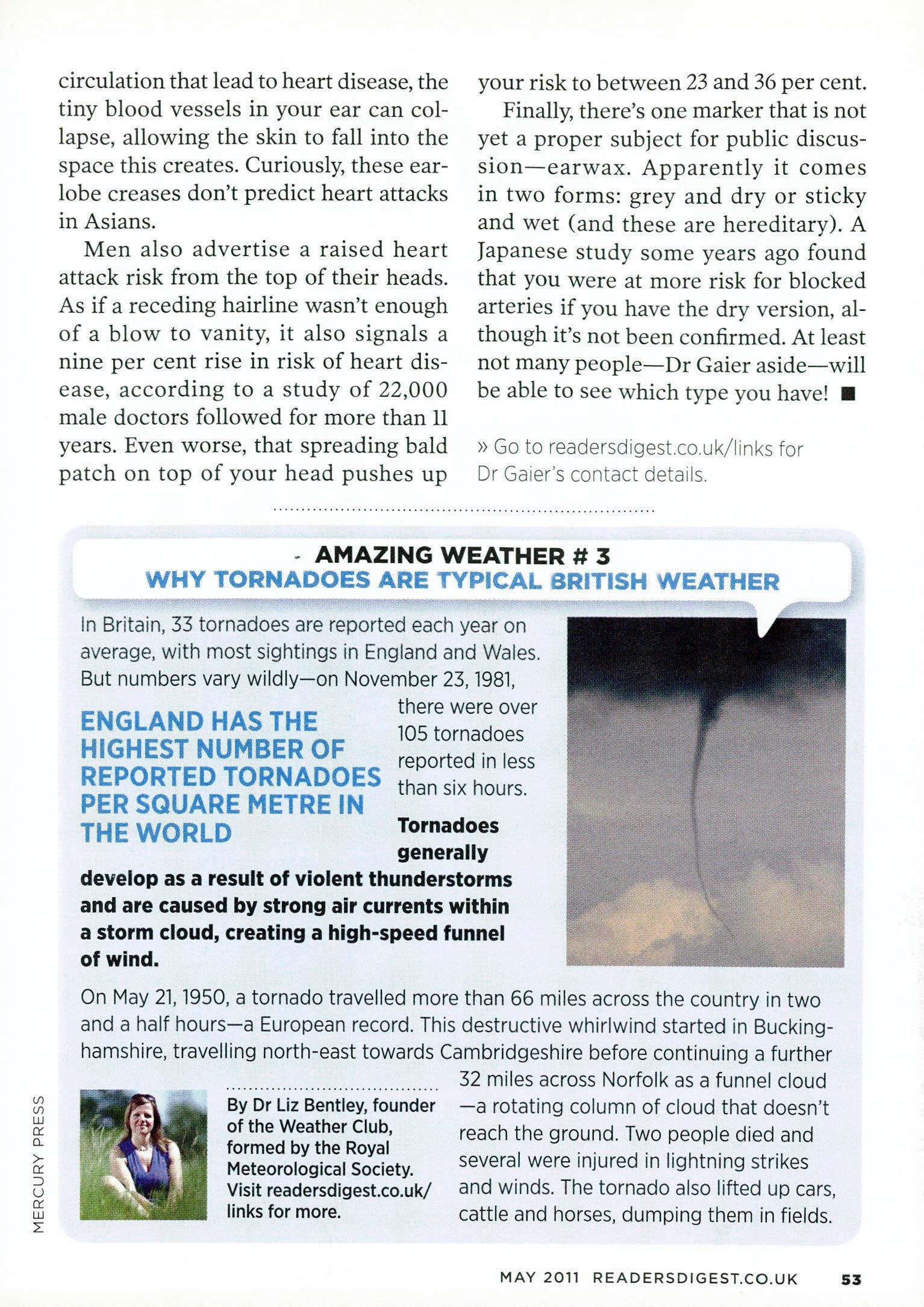
Tornadoes generally
develop as a result of violent thunderstorms and are caused by strong air currents within a storm cloud, creating a high-speed funnel of wind.
On May 21, 1950, a tornado travelled more than 66 miles across the country in two and a half hours—a European record. This destructive whirlwind started in Buckinghamshire, travelling north-east towards Cambridgeshire before continuing a further 32 miles across Norfolk as a funnel cloud —a rotating column of cloud that doesn't reach the ground. Two people died and several were injured in lightning strikes and winds. The tornado also lifted up cars, cattle and horses, dumping them in fields.
By Dr Liz Bentley, founder of the Weather Club, formed by the Royal Meteorological Society.As part of our exclusive annual survey to identify Britain's most trusted brands (more results next month), Reader's Digest conducted a nationwide poll of 2,357 adults in February and March this year to find out who's got the nation's trust—and whether that's changed over the years.
The timing is particularly appropriate given that British politics could be set for a mini-revolution this month. The referendum on a new Alternative Vote (AV) electoral system may, in theory, lead to more fringe party MPs, put safe seats up for grabs, and stop votes being "wasted". The hope among AV supporters is that, if adopted, people will become more engaged in politics, with more respect and trust for the main players.
But with elections on May 5 for the Scottish Parliament, Welsh and Northern Irish assemblies and English councils, British politics has a long way to go to gain the public's confidence—as our poll reveals...

POLITICIANS How many of us trust these individuals a "great deal" or "fair amount"?
How many of us trust the following a "great deal" or "fair" amount?
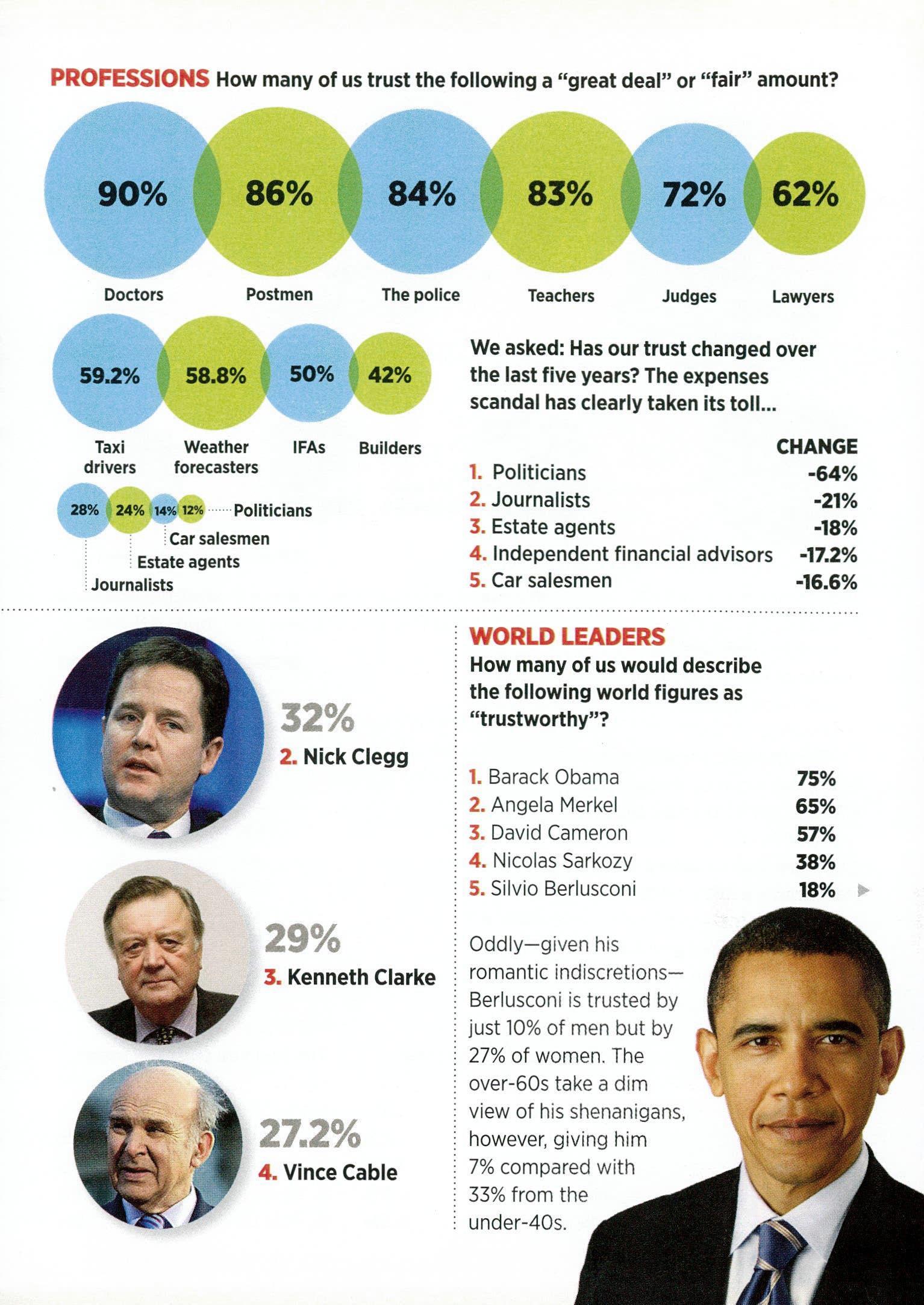
We asked: Has our trust changed over
the last five years? The expenses scandal has clearly taken its toll...
How many of us would describe the following world figures as "trustworthy"?
Oddly—given his romantic indiscretionsBerlusconi is trusted by just 10% of men but by 27% of women. The over-60s take a dim view of his shenanigans, however, giving him 7% compared with 33% from the under-40s.
INSTITUTIONS How many of us trust the following a "great deal" or "fair amount"?
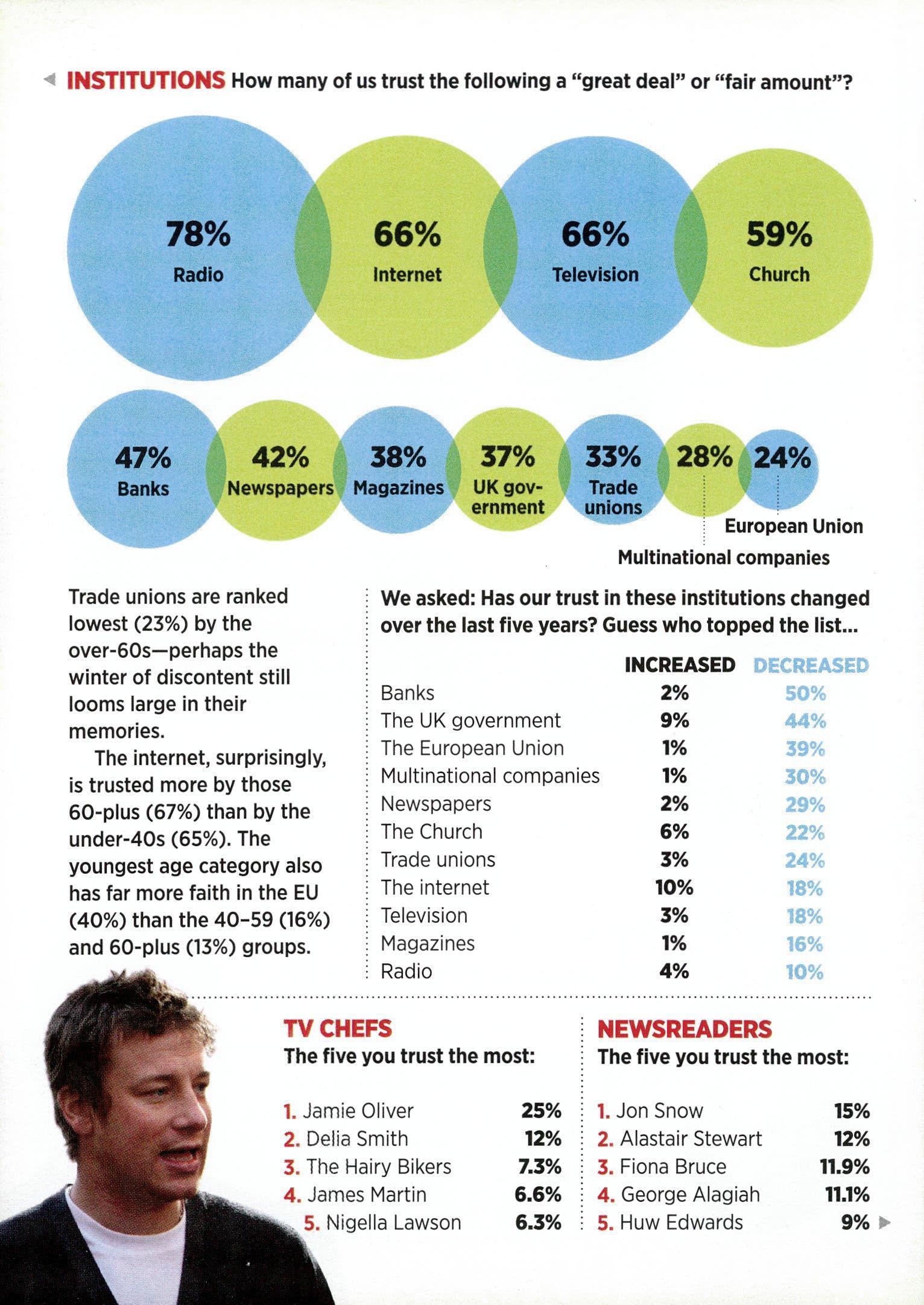
Trade unions are ranked lowest (23%) by the over-60s—perhaps the winter of discontent still looms large in their memories.
The internet, surprisingly, is trusted more by those 60-plus (67%) than by the under-40s (65%). The youngest age category also has far more faith in the EU (40%) than the 40-59 (16%) and 60-plus (13%) groups.
We asked: Has our trust in these institutions changed over the last five years? Guess who topped the list...
you trust the most:
The five you trust the most:

How many of us consider/ed the following "completely trustworthy" or "fairly trustworthy"?

2. The Queen
1. Prince William
We asked: How many regular readers of these publications would give them eight or more out of ten for "trustworthiness"?
3.The Queen Mother
How many of us trust these sites "a great deal" or a "fair amount"?
4.Princess Anne
5.Kate Middleton
6.Prince Harry
7.Princess Diana
8.Prince Charles
9.Prince Edward
10.Prince Philip
11.Camilla, Duchess of Cornwall
12.Prince Andrew
Incredibly, the Queen Mother-no longer with us-scores higher than most of the rest of the family. And Princess Diana, almost 14 years after her death, still manages to score higher than her ex-husband.
Sun 5% Facebook scores 52% with the under-40s, but only 23% with the over-60s. And 1 its score of 44% among women drops to just 29% among men. ■ t;


A
sudden death made Helen Spencer realise how precious memories are. Her idea could preserve them for ever. Digitally.
BY DANNY SCOTT
When Helen Spencer found out she was going to be interviewed by Reader's Digest, the first person she wanted to tell was her mum Jean.
"I automatically picked up the phone and started to dial the number," explains 43-yearold Helen from Harrogate. "It was an instinctive reaction, Ooh, wait until Mum hears about this! I can always remember the magazine sitting on her coffee table."
Sadly, Jean died five years ago, aged 71, from a heart attack.
41 "Good news, bad news, anything... I always wanted to share it with Mum," Helen says. "We'd been through so much together. About six years ago, I got divorced and she was there for me every step of the way. Just before that, Mum had her first heart attack. She was in a coma for a month. Those intensely emotional experiences automatically bring a family even closer together."
To compound Helen's sadness, just days after Jean died Helen found out she was pregnant with her second son, Oliver. 'After all the pain of the divorce, I'd been lucky enough to meet Bob, and becoming pregnant completed the picture. I was overjoyed but also devastated that Mum wasn't there to share it with me.
"I thought about some sort of memorial to her, but I didn't want it to be about death. I'm sure those Facebook RIP pages work wonders for some people, but Mum would have been horrified if I encouraged people to write about how sad they were. I didn't just want to commemorate her life; I wanted to celebrate it."
Looking through a box of old photos at her parents' house in Birmingham, Helen began to build a picture of her mother's life, but was surprised by how little she actually knew. "I found myself wondering things like: Did you enjoy your childhood? Did you like school?My dad could answer some questions, but there were so many things I would never know.
"The biggest gap, of course, was in the here and now Mum hadn't been able to meet her new grandson and 011y didn't know anything about his nan. When I died, would my children and grandchildren be left trying to fill the gaps in my

The death of Helen's mum sparked the idea of a digital scrapbook that included photos and letters from her mother's life
life, too? I realised that I needed to tell my story while I was still here."
Many of us are used to sharing thoughts and photos on Twitter and Facebook, but Helen wanted to go further. She decided to set up a website that would be part-scrapbook, part-photo album, partfamily tree and part-diary, all arranged along a chronological timeline. It could start on the day you were born and be updated as often as you liked.
"I was thinking less Facebook and more Who Do You Think You Are?" she says. "A chance to tell your children about your first day at school, about joining the Brownies, getting married, being a mother... " The idea for the website,
which she called Save Every Step*, was the easy bit, but it took Helen a while to make the concept a reality.
"I'd given birth to Oliver, I had a job, a career...commitments," explains Helen, who at the time was director of customer services at Nottingham City Council.
"Exactly how do you set up a website? How much does it cost? I had no idea! If anything went wrong with my computer, I called our IT department."
So for two years, it looked as if Save Every Step would remain little more than an idea.
That changed in October 2009. "Out of the blue, I was made redundant. Our family income halved. But losing my job gave me a tremendous sense of freedom. I knew that if I started looking for a new position, I'd have to stick Save Every Step on the shelf. It was now or never. I thought about Mum. Like so many people of her generation, she was used to getting on with life. So I jumped in with both feet!"
who'd listen. Even if they weren't listening, I'd carry on talking. I'm sure some people agreed to get involved just to shut me up!"
Finally, in July last year, the website was launched. That moment—captured with a picture of clinking champagne glasses and fond written recollections of Jean—became part of Helen's timeline, the first to feature on the site. Some of it can be viewed by anyone who registers but much is locked behind a private security setting.
Ever ybody think s their sto ry is ordi nary.
Bu t to thos e who care about you, i t's not
The couple worked out they could just about survive on 48-year-old Bob's wages as a financial-fraud expert, and Helen concentrated all her efforts on Save Every Step. She also set aside a big chunk of their savings—"If you said ten grand, you wouldn't be that far off the mark," she says.
"There was no marketing budget," she laughs. "It was just me...on the phone, emailing, holding meeting after meeting, talking to web designers and anyone
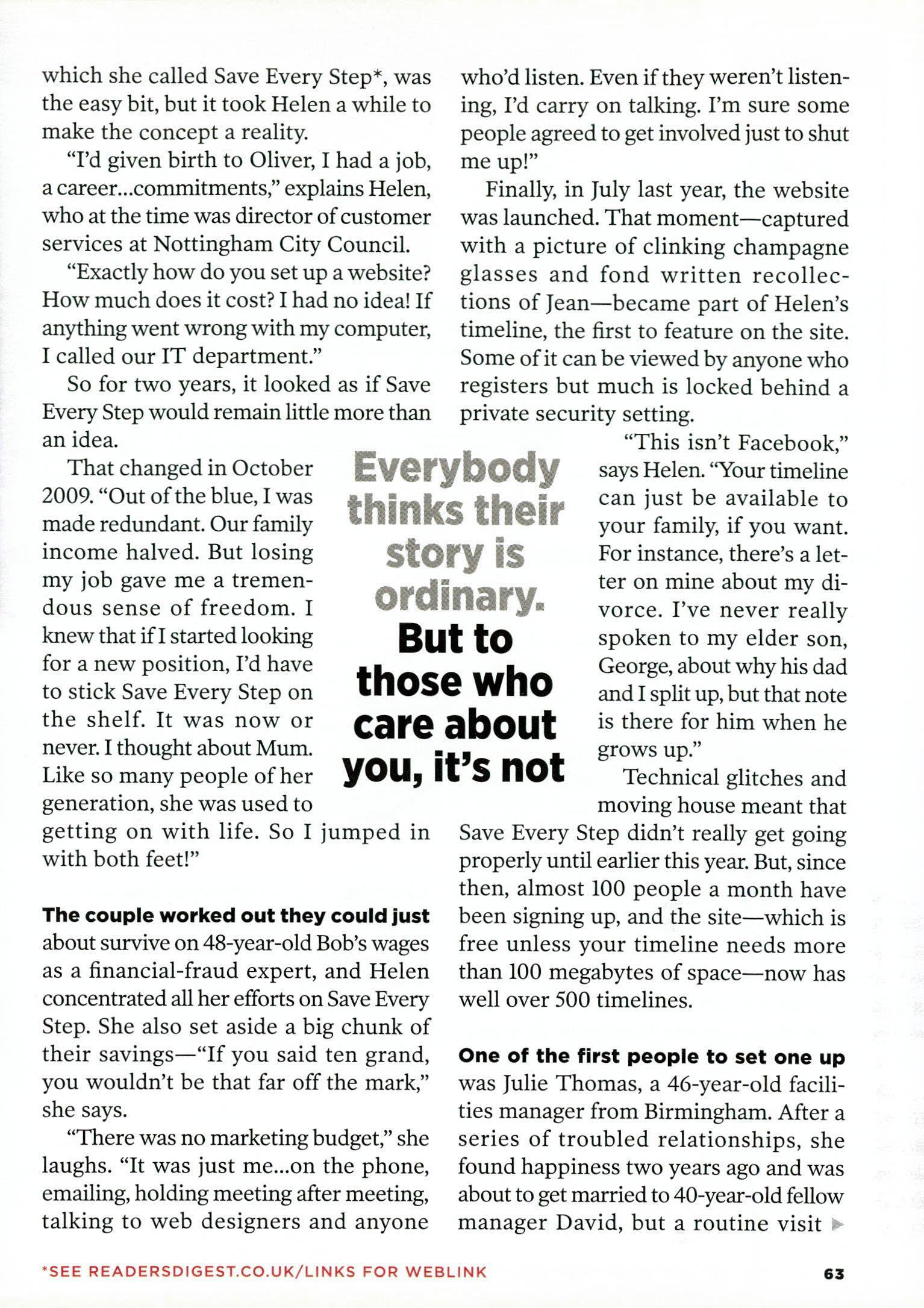
"This isn't Facebook," says Helen. "Your timeline can just be available to your family, if you want. For instance, there's a letter on mine about my divorce. I've never really spoken to my elder son, George, about why his dad and I split up, but that note is there for him when he grows up."
Technical glitches and moving house meant that Save Every Step didn't really get going properly until earlier this year. But, since then, almost 100 people a month have been signing up, and the site—which is free unless your timeline needs more than 100 megabytes of space—now has well over 500 timelines.
One of the first people to set one up was Julie Thomas, a 46-year-old facilities manager from Birmingham. After a series of troubled relationships, she found happiness two years ago and was about to get married to 40-year-old fellow manager David, but a routine visit
4 to the doctor for a niggling sore throat revealed that she had throat cancer.
`After starting treatment, I found it difficult to talk to people about what I was going through," she says. "There were counsellors there for me. But I didn't know what to say.
"I'd kept a diary of appointments and treatments and I transferred that to Save Every Step. Then I started to add my thoughts and feelings and it really helped me get what was happening straight in my mind. In some ways, the website became my counsellor."
Julie's timeline—which is only accessible to her family—features pictures of her during treatment and also something a little more special. "When doctors first told me I had cancer, I really didn't think the wedding would happen. But as I began to fight the illness, I became determined that it would. I got married last
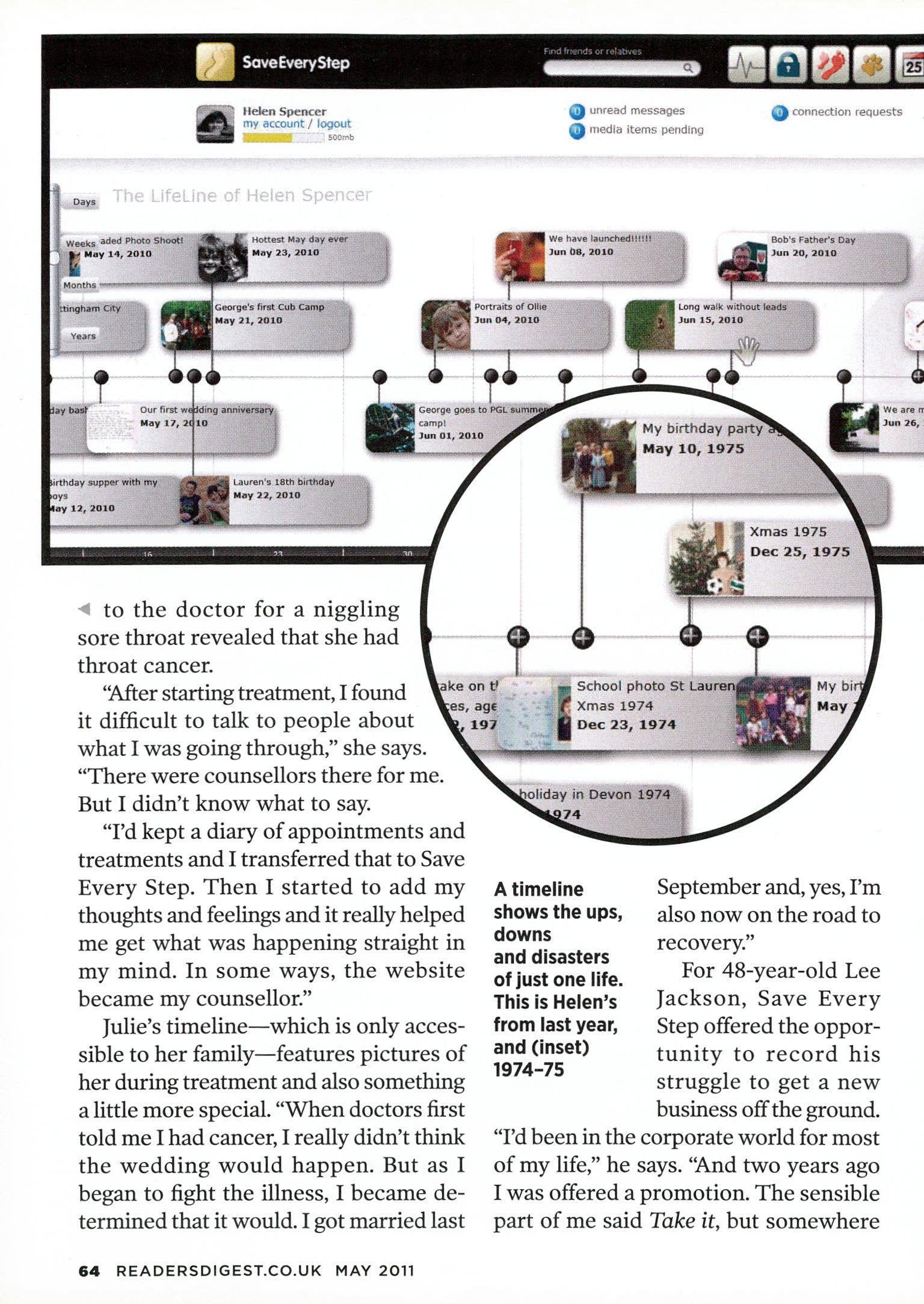
A timeline shows the ups, downs and disasters of just one life. This is Helen's from last year, and (inset) 1974-75
September and, yes, I'm also now on the road to recovery."
For 48-year-old Lee Jackson, Save Every Step offered the opportunity to record his struggle to get a new business off the ground. "I'd been in the corporate world for most of my life," he says. "And two years ago I was offered a promotion. The sensible part of me said Take it, but somewhere

inside was a voice asking if I was happy. I wasn't! On the other hand, just thinking about running a restaurant made me happy, so I decided to upset the apple cart."
Lee's timeline recalls the moment in June last year when he told his boss he was resigning. "I'd reached a crossroads in life and, for the first time, I felt I'd picked the right road. I wanted to capture it—to be able look back in 30 years' time and say, `Wow'."
Lee had no experience in the catering trade, but reckoned there was a gap for a restaurant mixing British and Mediterranean food in his hometown of Bawtry, South Yorkshire. Bliss Food opened last October.
"I might succeed; I might fail and lose everything...house, business, the lot. We had two customers for the first evening sitting... But anyone can view my timeline and I'm sure it will be interesting reading for those in a similar position.
You don't get many chances in life. Don't let fear stop you taking them!"
When Helen reads stories such as Julie's and Lee's, she realises just what an impact the website has already had.
"Everybody thinks their personal story is very ordinary, but to your family and those who care about you, it's extraordinary. Why are we all so interested in family trees? We want to know where we fit into the great picture of life.
"Admittedly, it would be nice if I could make a living from it, but I'm doing it because I passionately believe in the idea. We live in a very disposable age. But losing Mum made me realise there are some things—and people!—that will always matter. I suppose Save Every Step is a depository for those things and those people. It's your own personal, digital safety deposit box.
"I'm putting my mum's timeline on the website, but it will always be incomplete. There are gaps only she could fill. I just wish she'd had the chance to put her own story on Save Every Step. Right now, I'd give anything to read it..."■
In Germany, a sociable new app called frinXX allows you to buy your friends a drink without even being in the pub. Simply log onto the frinXX website, choose the venue and how much you want to spend, then send them the gift code—this serves as payment. Job done! You've boosted your popularity without having to deal with drunken hugs.
Less sexy, but more practical, is Australia's new eco-friendly fertiliser —the coffee bean. Espressogrow uses 100% waste coffee grounds; it's nitrogen-rich and deters pests—they just don't like the aroma.
Our landscape would be utterly bleak if they didn't exist, but we often fail even to notice them. "People don't look at trees unless they're pointed out," says Tony Kirkham, head of the arboretum at Kew Gardens. But at least in Britain you don't have to step far to see an iconic tree. "Wherever you go, if there's a big old tree, it's there for a reason," he says. "And usually it ,has an interesting history." Such as...
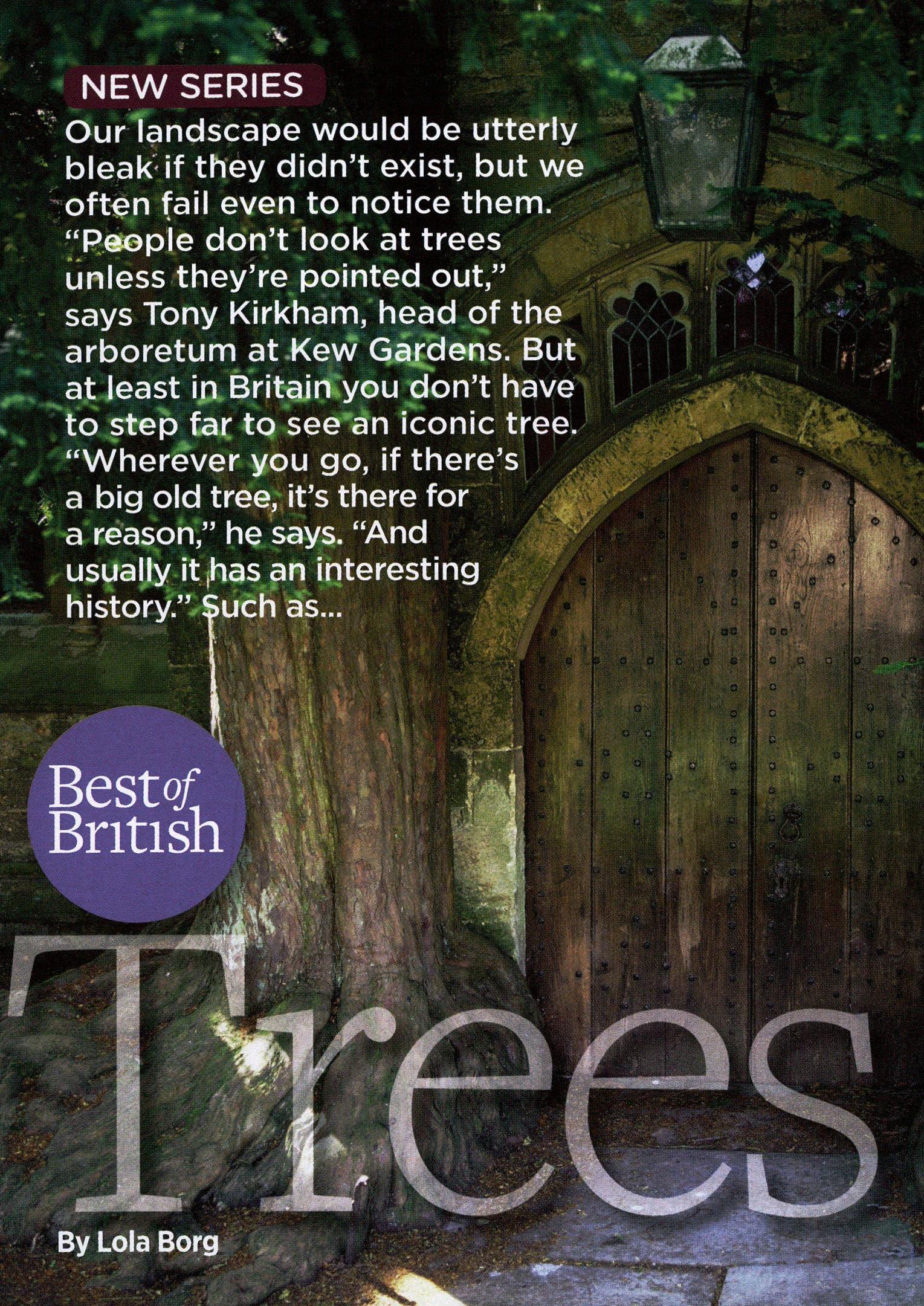 By Lola Borg
By Lola Borg
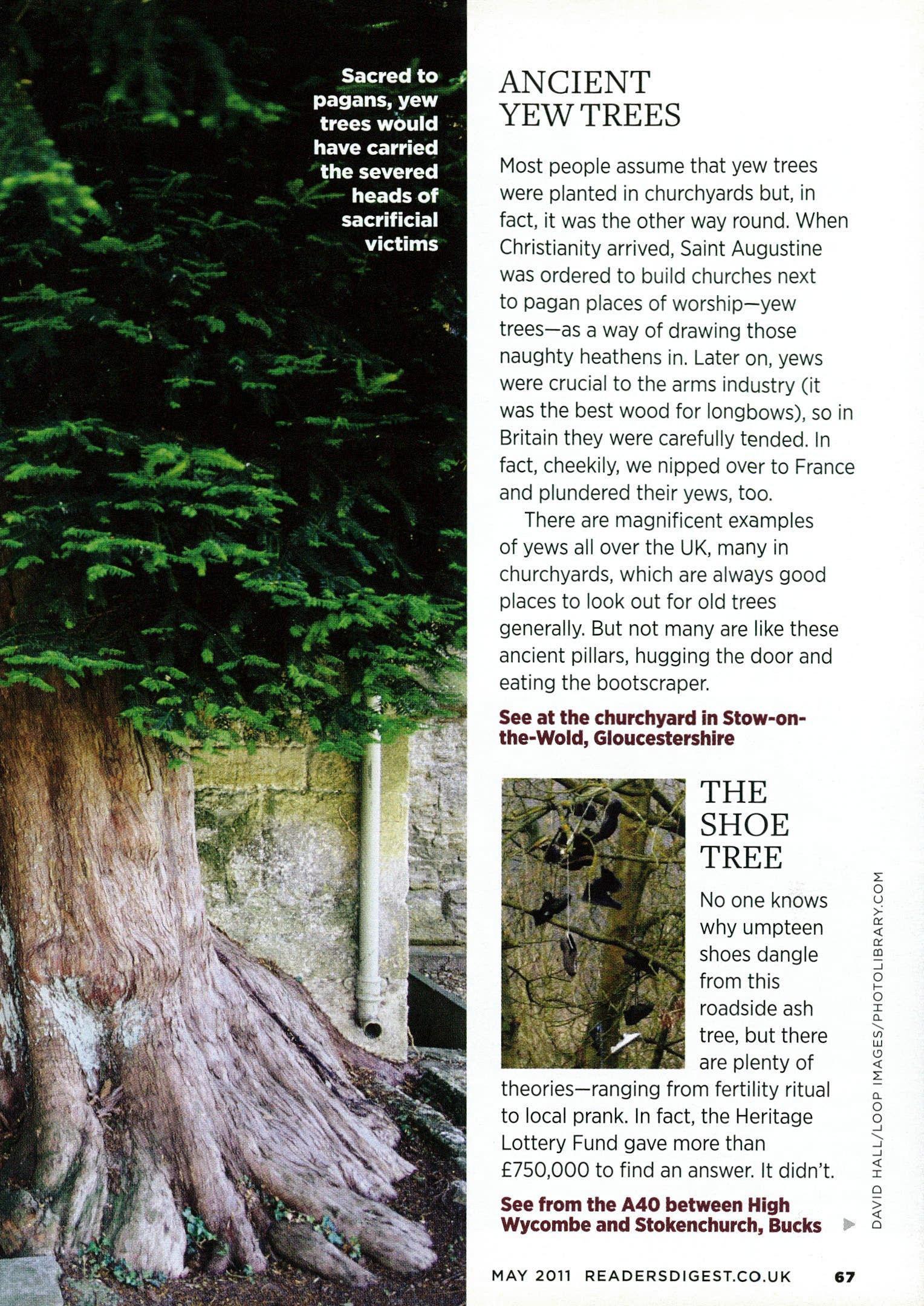
Sacred to pagans, yew trees would have carried the severed heads of sacrificial victims
Most people assume that yew trees were planted in churchyards but, in fact, it was the other way round. When Christianity arrived, Saint Augustine was ordered to build churches next to pagan places of worship—yew trees—as a way of drawing those naughty heathens in. Later on, yews were crucial to the arms industry (it was the best wood for longbows), so in Britain they were carefully tended. In fact, cheekily, we nipped over to France and plundered their yews, too.
There are magnificent examples of yews all over the UK, many in churchyards, which are always good places to look out for old trees generally. But not many are like these ancient pillars, hugging the door and eating the bootscraper.
See at the churchyard in Stow-onthe-Wold, Gloucestershire
No one knows why umpteen shoes dangle from this roadside ash tree, but there are plenty of theories—ranging from fertility ritual to local prank. In fact, the Heritage Lottery Fund gave more than £750,000 to find an answer. It didn't.
See from the A40 between High Wycombe and Stokenchurch, Bucks ►
A UK market of £50 million per year started life as a single minuscule pip in a back garden in Nottinghamshire. When the local butcher bought the house, he sold cuttings, provided the seedlings bore his name—Bramley. Despite the tree being blown over in a violent storm in 1900, it survived and for the last 50 years has been tended by Nancy Harrison, who now owns the garden.
See at Sandmen, Nottinghamshire, by appointment only. Contact the Tree Council•

The very first Bramley apple tree in Britain, in the garden of Nancy Harrison
When they were first brought to the UK, cedars of Lebanon were the equivalent of having a Porsche parked in the drive—a way of letting the world know of your impressive wealth. Wildly fashionable, they were also rare and exotic— they have more mentions in the Bible than any other tree. This enormous specimen, Childray, was planted in 1646 by Dr Edward Pococke, a scholar of Arabic at Oxford who was known to have taken several trips to Syria. It's now the oldest surviving cedar in the UK.
See at Childray, Oxfordshire, by appointment only. Contact the Tree Council*
A solitary rowan tree, at an altitude of over 1,000 feet, has somehow survived on Rannoch Moor in Scotland

By clinging on to a lichen-covered boulder for dear life, this rowan tree has survived the cold, wind, sheep and deer. Rowans are native to Scotland and, like the locals, this tree is hardy. Set in the otherwise tree-free expanse of Rannoch Moor, the secret of its survival is that it's too high on its boulder to have been nibbled by the wildlife. A local landmark—and you don't even have to get out of your car to see it.
See from the A82 heading towards Glencoe and Orchy, Perthshire
In 1844, one Joseph Tubbs took two weeks to carve a 21-line poem into a young beech tree. Nothing else seems to be known about this Victorian vandal. The tree died in 1990 (beeches have l' notoriously shallow roots), but the trunk remains. Just. The poem, stretched and distorted, is legible only in places, but contains the last lines: "Such is the course of time, the wreck which fate/ And awful doom award the earthly great.' A nearby plaque contains the entire, wistful verse.
See at the south-west end of Castle Clump, Wittingham Clumps, Oxfordshire. See the full poem at readersdigest.co.uk/magazine
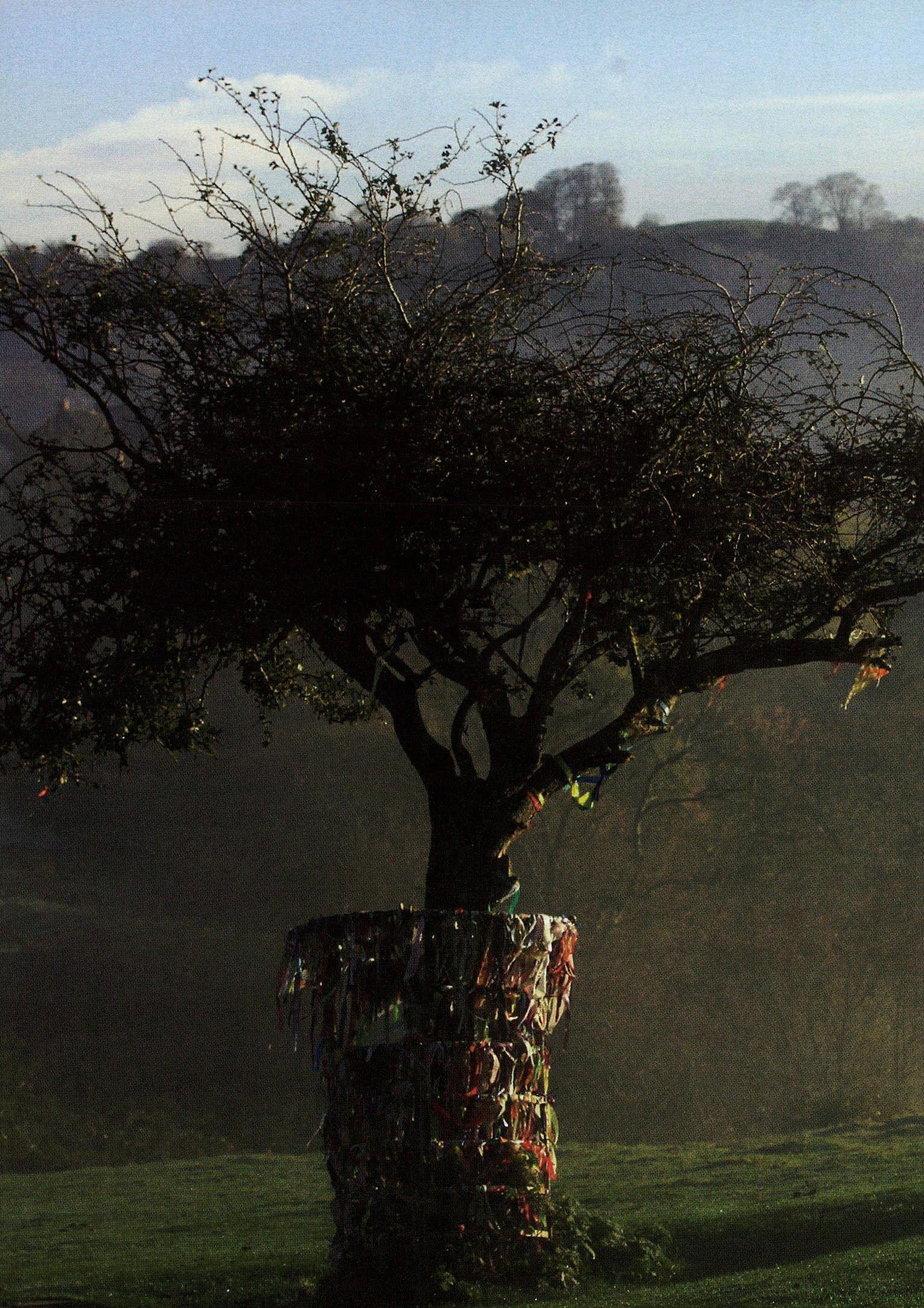

The Holy Thorn (before it was vandalised) festooned with good-luck charms. And, yes, that's Glastonbury Tor in the distance
Legend says that this thorn tree grew from the staff of Joseph of Arimathea. It has, though, had significance for pilgrims and hippies alike. The former have made pilgrimages over the centuries to Wearyall Hill, Glastonbury, where the tree overlooks the Tor. For the latter, it's the symbol of the nearby legendary summer festival, and a place to festoon with talismans and charms.
In fact, this particular tree is not the original Glastonbury or Holy Thorn, but one of a number of cuttings from the original—others are dotted around the town. Last December the tree was vandalised and its branches were hacked off. It's been savagely chopped down before though, by Cromwell's army, but canny locals had taken a cutting. Signs are—so far— the surviving trunk is continuing to grow, so it may witness Beyonce and U2 at this year's festival yet.
See on Wearyall Hill, Glastonbury, Somerset ►
The Victorians loved an avenue of lime trees. This one at Clumber Park wins the title of the longest in the UK— almost two miles and consisting of over a thousand lime trees. You can cycle through it to get to Sherwood Forest.
See the Lime Tree Avenue at Elkesley, Nottinghamshire
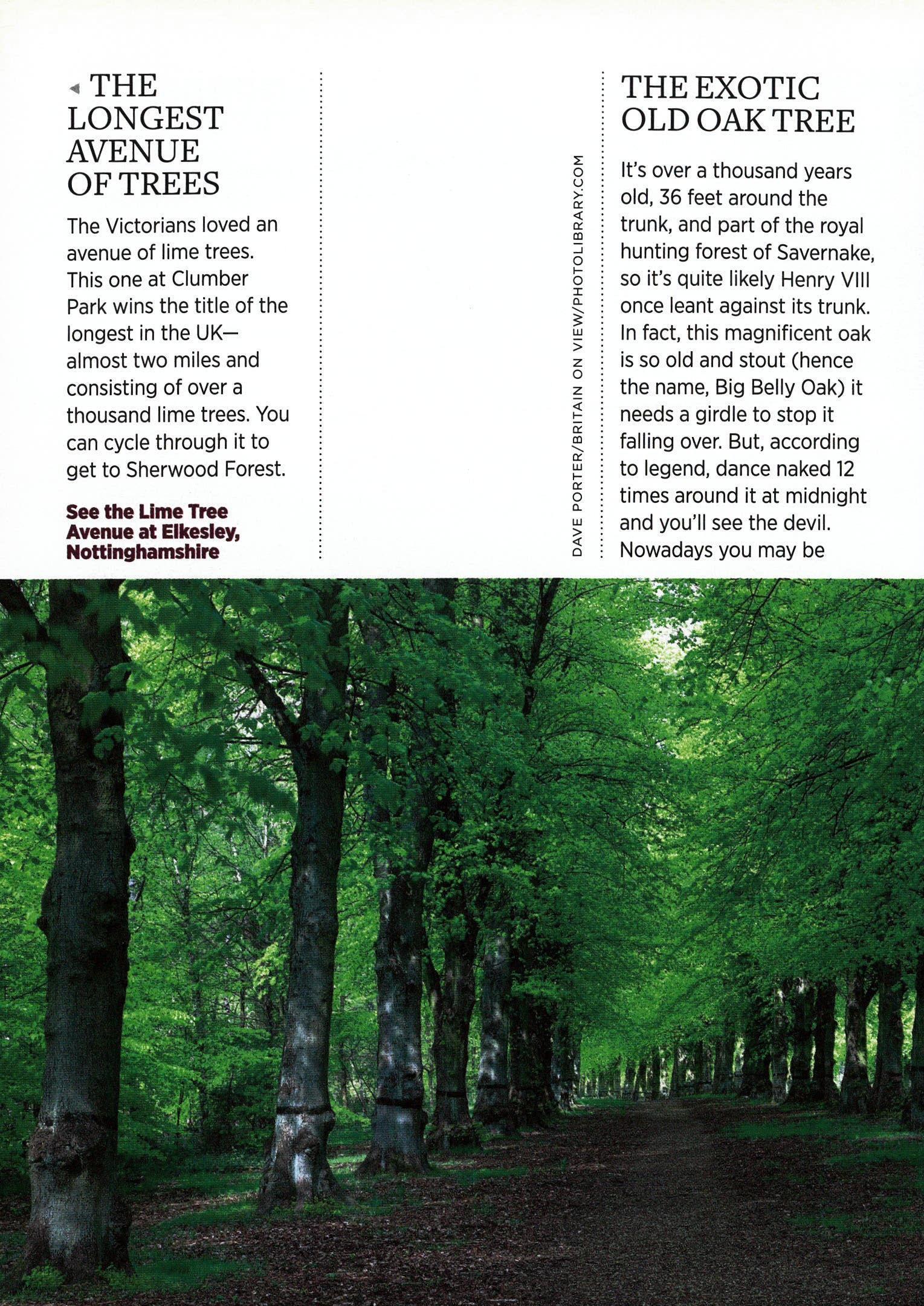
It's over a thousand years old, 36 feet around the trunk, and part of the royal hunting forest of Savernake, so it's quite likely Henry VIII once leant against its trunk.
In fact, this magnificent oak is so old and stout (hence the name, Big Belly Oak) it needs a girdle to stop it falling over. But, according to legend, dance naked 12 times around it at midnight and you'll see the devil. Nowadays you may be
more likely to see a police patrol as it's on a main road, ti but it's an interesting idea.
`1 See from the A346 between Marlborough a and Salisbury in Wiltshire
Aptly named: the Big Belly Oak
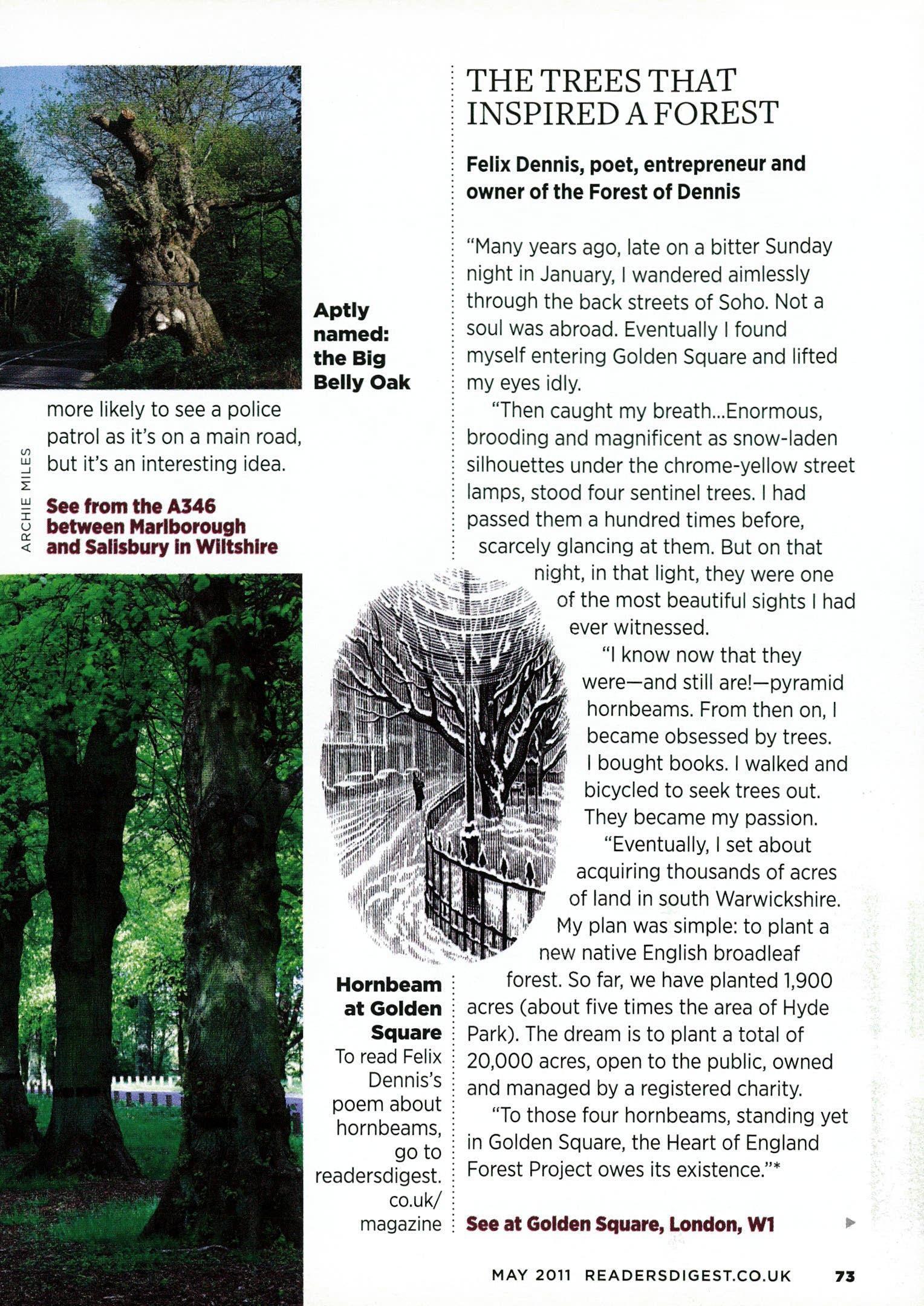
Hornbeam at Golden Square
To read Felix Dennis's poem about hornbeams, go to readersdigest. co.uk/ magazine
Dennis, poet, entrepreneur and owner of the Forest of Dennis
"Many years ago, late on a bitter Sunday night in January, I wandered aimlessly through the back streets of Soho. Not a soul was abroad. Eventually I found myself entering Golden Square and lifted my eyes idly.
"Then caught my breath...Enormous, brooding and magnificent as snow-laden silhouettes under the chrome-yellow street lamps, stood four sentinel trees. I had passed them a hundred times before, scarcely glancing at them. But on that night, in that light, they were one of the most beautiful sights I had ever witnessed.
"I know now that they were—and still are!—pyramid hornbeams. From then on, I became obsessed by trees. I bought books. I walked and bicycled to seek trees out. They became my passion.
"Eventually, I set about acquiring thousands of acres of land in south Warwickshire.
My plan was simple: to plant a new native English broadleaf forest. So far, we have planted 1,900 acres (about five times the area of Hyde Park). The dream is to plant a total of 20,000 acres, open to the public, owned and managed by a registered charity.
"To those four hornbeams, standing yet in Golden Square, the Heart of England Forest Project owes its existence*
See at Golden Square, London, V1/1
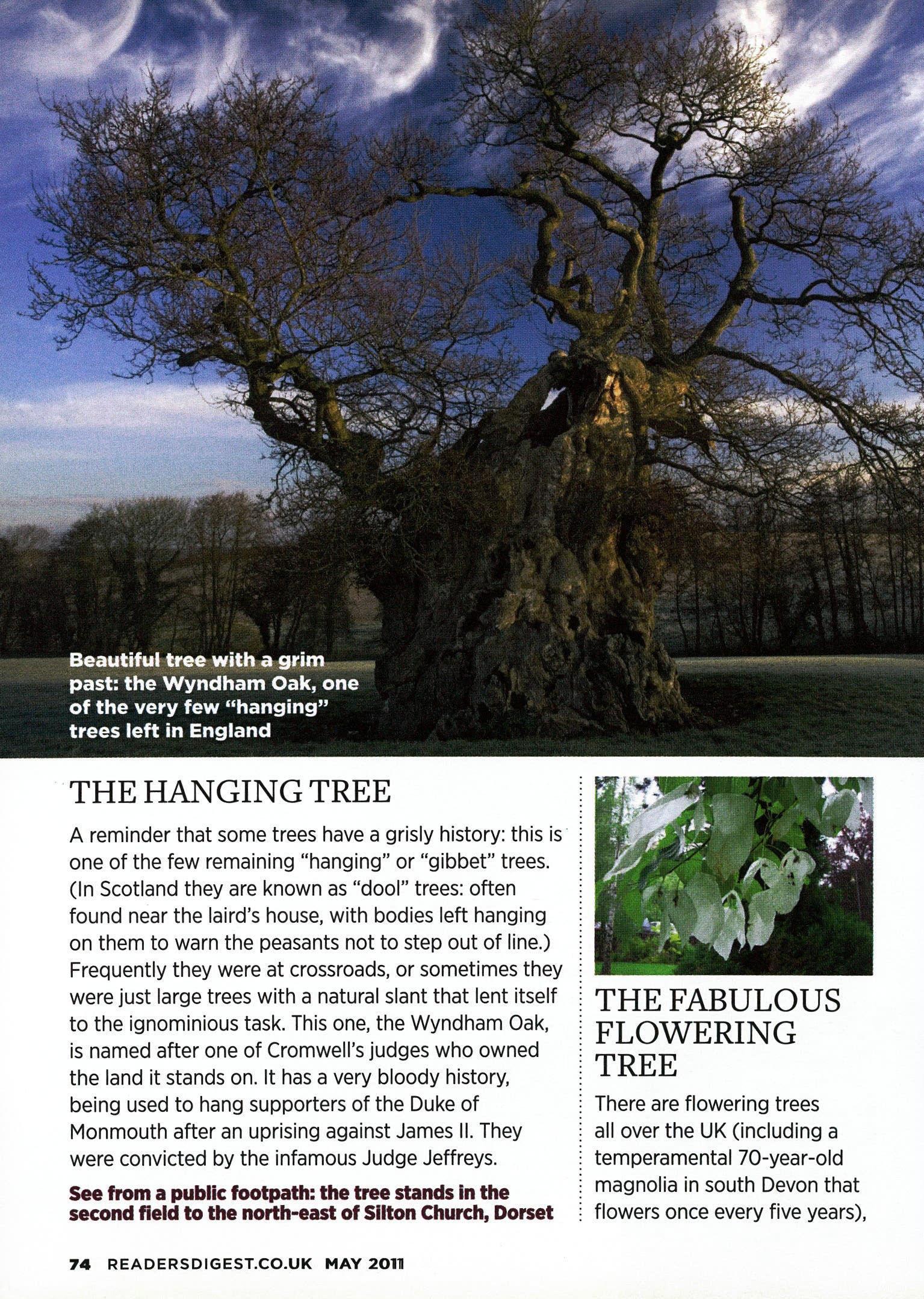
Beautiful tree with a grim past: the Wyndham Oak, one of the very few "hanging" trees left in England
A reminder that some trees have a grisly history: this is one of the few remaining "hanging" or "gibbet" trees. (In Scotland they are known as "dool" trees: often found near the laird's house, with bodies left hanging on them to warn the peasants not to step out of line.) Frequently they were at crossroads, or sometimes they were just large trees with a natural slant that lent itself to the ignominious task. This one, the Wyndham Oak, is named after one of Cromwell's judges who owned the land it stands on. It has a very bloody history, being used to hang supporters of the Duke of Monmouth after an uprising against James II. They were convicted by the infamous Judge Jeffreys.
See from a public footpath: the tree stands In the second field to the north-east of Silton Church, Dorset
There are flowering trees all over the UK (including a temperamental 70-year-old magnolia in south Devon that flowers once every five years),
but highly recommended is the Handkerchief or Dove Tree at Batsford Arboretum. Brought originally from China, it flowers in May—around about now, in fact. Imagine draping a huge, white Pavarotti-style handkerchief over every square foot of the tree and you'll have some idea of how magnificent it looks in full bloom.
See at Batsford Arboretum, Moreton-in-Marsh, Gloucestershire
The London plane in Berkeley Square is not the largest nor the most elegant plane (it's had a branch lopped off) but is certainly distinctive, having been given a value of £750,000.
Introduced in 1988, CAVAT (Capital Asset Value for Amenity Trees) assesses how much an urban tree is worth, according to size, health, historical significance and how many people enjoy it. The higher the value—and this one is in London's prime property location—the more proof insurers (quick to blame trees for subsidence) need before a tree can be massacred. As for this particular plane tree, it's larger than the 30 or so others in Berkeley Square, and there is a reason—because it was planted bang on the site of the ancient plague pit, which provided the fertiliser...
See at Berkeley Square, Mayfair, London W1
With thanks to: Pauline Buchanan Black, director general of the Tree Council; and Tony Kirkham, head of the Arboretum at Kew Gardens.
Do you have a favourite tree? Tell us why you like it and where it is. Email theeditor@ readersdigest. co.uk.
And for more on the Best of British trees, visit readersdigest. co.uk/magazine.
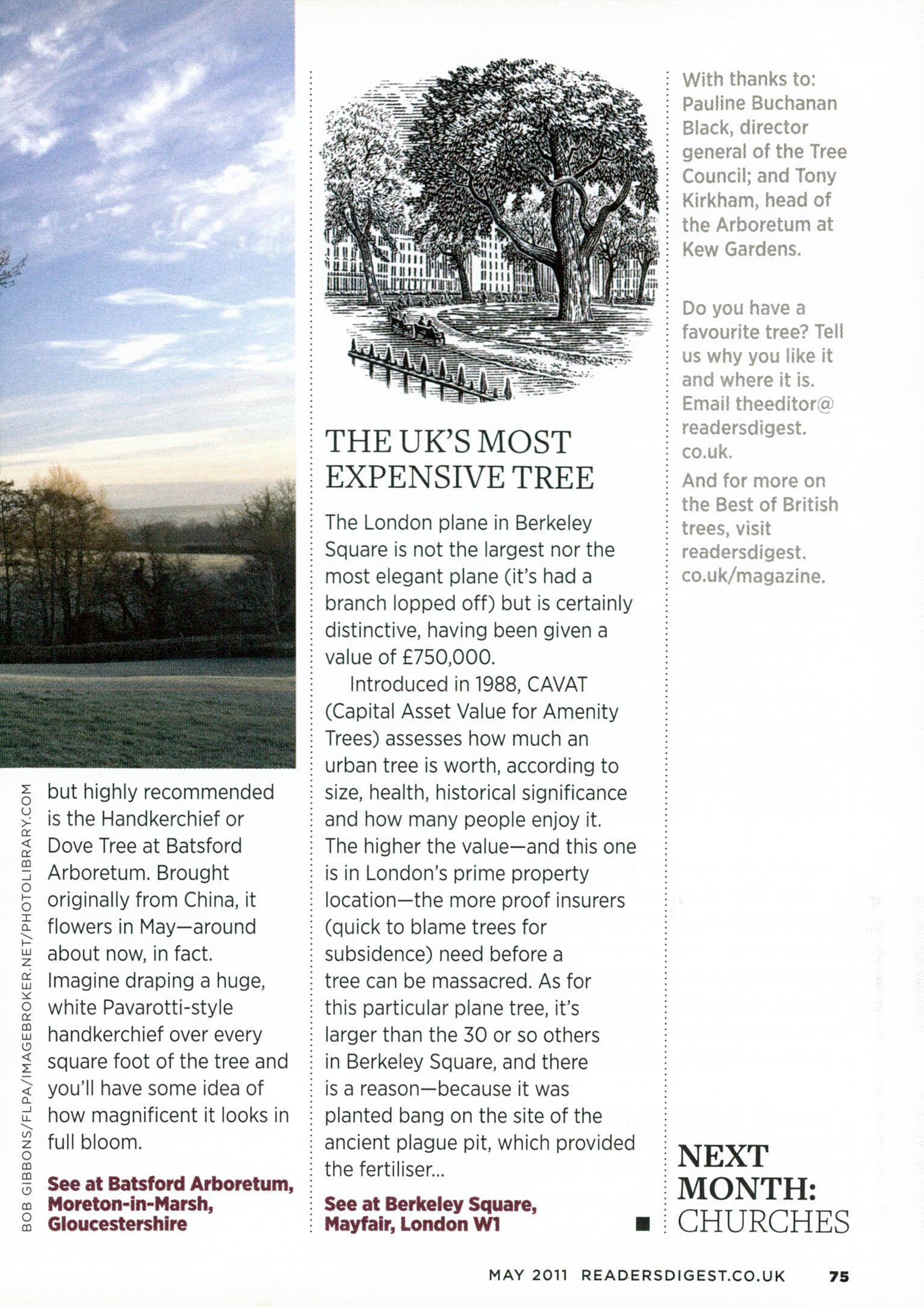
You've got a Polish plumber, a Spanish colleague and a French partner. So, asks Monica Porter, what use is a huge bureaucracy to tell us all we're European?

We British spend a lot of time disparaging the European Union. With all those perceived meddlesome laws and fat-cat MEPs, many of us yearn for the old days before we joined this pan-continental "club".
Almost everyone appreciates that the EU has had one genuinely important role: ensuring cooperation and harmony between its many member states, so we avoid another conflict like the Second World War. That's the main reason the organisation's antecedent, the European Economic Community, was formed in 1957. A close-knit group of states helps preserve our shared cultural and social values, too.
But that also means the EU has outlived its only real usefulness. It's individuals who are now creating harmony between France, Germany, Britain and the other countries. Not because we all grudgingly accept diktats from a bureaucratic behemoth, but because of something more organic—our ever-expanding, crossEuropean family, social and professional links.
Consider my own family. I'm of Hungarian origin, but my father and brother live in Germany. My two sons have Polish blood from their father's side and my daughter-in-law has a stepmother in Spain where lo.'
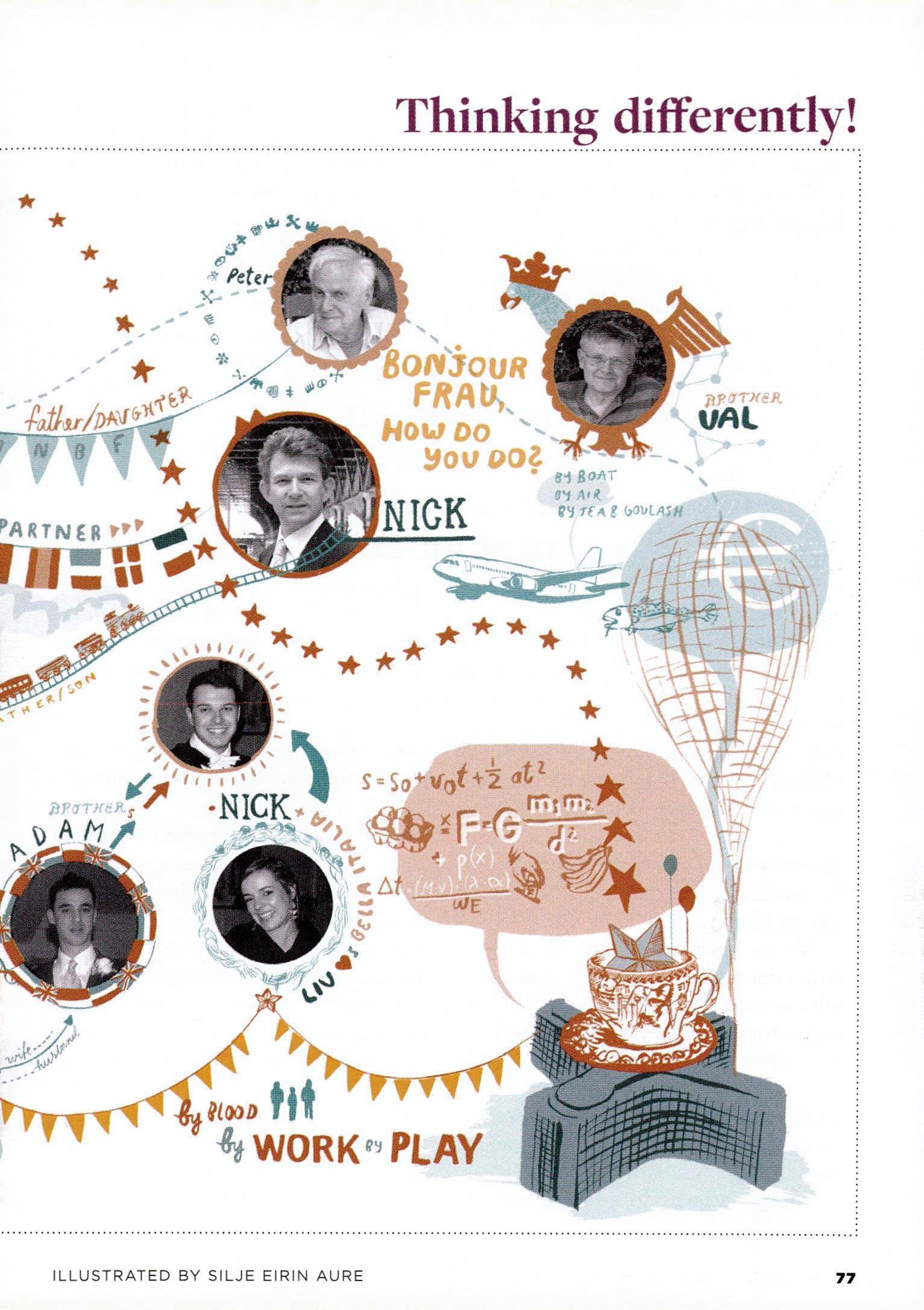
her father settled many years ago. My younger son's partner lived for years in Italy, has close friends there and is as fluent in Italian as in her native English.
My own partner Nick has a father who's English-born but comes from German stock, and his mother was Danish. Nick's sister
Barcelona, where Marion met her son's new in-laws and Spanish friends. His life is now bound up with these people, and she hasn't found a surly waiter or dodgy workman among them (not sure about the bullfighting).
Now Marion is longing for her first (half-Spanish) grandchild. She's even remarked that she spends part of each year in France, where she owns a second home and has close native friends.
It's a web of interwoven strands within a single family network, extending both east and west, into "new" and "old" Europe. But the most remarkable thing is how unremarkable it is. Mine is the epitome of the New British Family. This phenomenon— helped by cheaper foreign travel and, in fairness, the EU's introduction of the free movement of labour—is becoming as normal as the monocultural family unit of earlier times.
Most Brits now have regular contact with their continental neighbours in a way they never did in the post-war era
hopes for a little girl who's as "adorable" as her daughter-in-law. Another friend, Tony, recently found the love of his life— a Latvian girl. Tony is a professional chef from Hull, and when he returned from his first visit to her folks in Riga (a city he'd never even heard of before), he was full of vivid impressions. ("Do you know, they put dill into everything? Incredible.")

For instance, my neighbour Marion is a businesswoman in her sixties who used to refer to the Spanish—if she mentioned them at all—as a race of surly waiters, dodgy workmen and bullfighting aficionados. Then, two years ago, her son married a pretty young Spanish woman, a colleague at his international bank in the City of London. The wedding took place in
Of course, not everyone has European family members. But even if you aren't related to one, most Brits now have regular contact with their continental neighbours in a way they never did back in the post-war era. Whether you take your holidays in Spain or use a Polish builder, have a French work colleague, or even if you support a German in your local football team, we've all become far more interdependent.
It's not even an urban-versus-rural thing. That great British institution The Archers is a barometer of life in the
shires. I was delighted when, over the past few years, it introduced some exotic Magyar elements. First, there was the character of Chaba, a Hungarian agricultural student. And then the soap's stalwart Debbie Aldridge moved to Hungary, where she now runs a farm. Nobody, either in Ambridge or the real world, considers any of this the least bit remarkable.
Has th r...• LI had its Join the de facebook.com digestuk readers let readersdi co.uk e day bate at /readers r email ters gest.
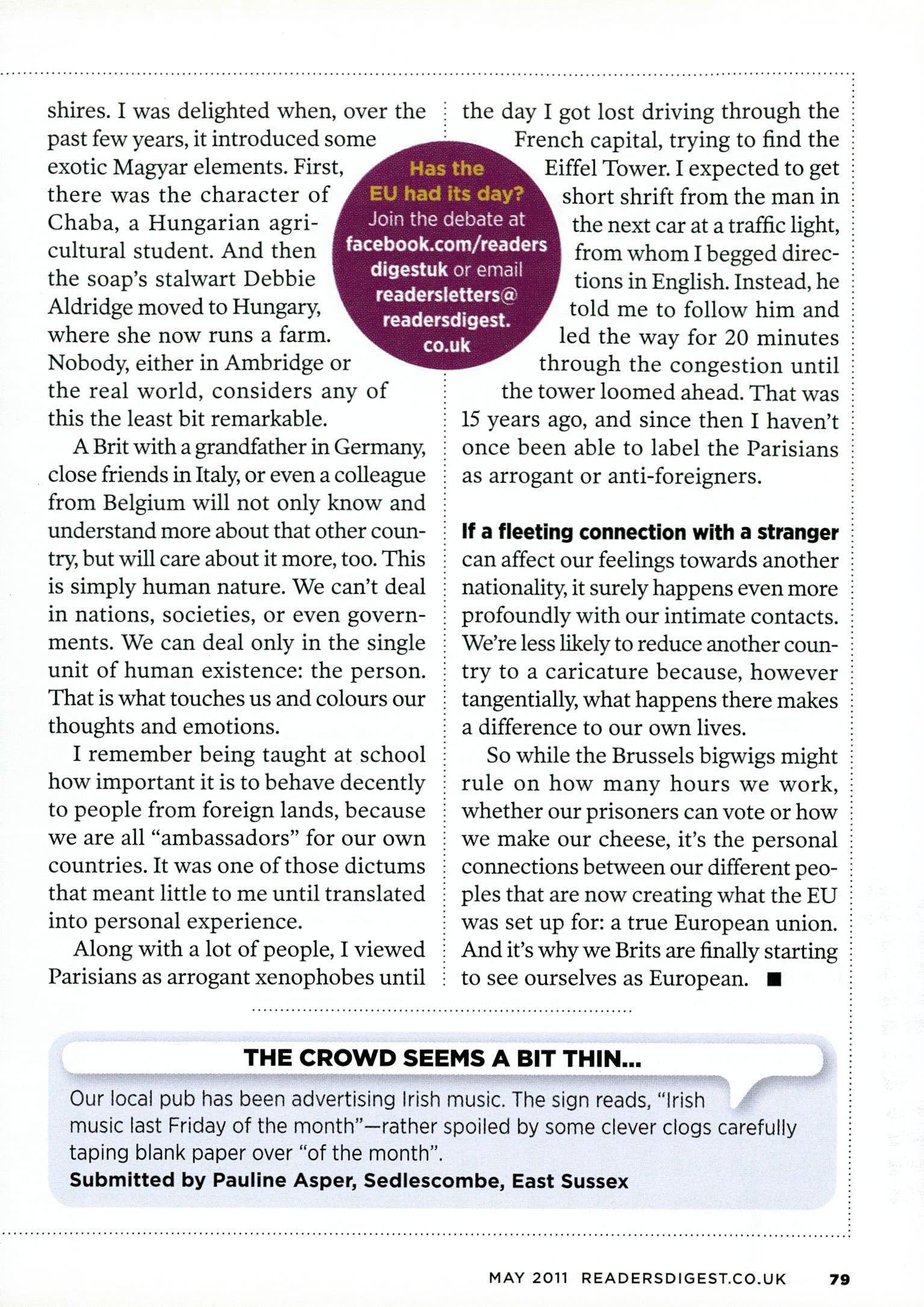
A Brit with a grandfather in Germany, close friends in Italy, or even a colleague from Belgium will not only know and understand more about that other country, but will care about it more, too. This is simply human nature. We can't deal in nations, societies, or even governments. We can deal only in the single unit of human existence: the person. That is what touches us and colours our thoughts and emotions.
I remember being taught at school how important it is to behave decently to people from foreign lands, because we are all "ambassadors" for our own countries. It was one of those dictums that meant little to me until translated into personal experience.
Along with a lot of people, I viewed Parisians as arrogant xenophobes until
the day I got lost driving through the French capital, trying to find the Eiffel Tower. I expected to get short shrift from the man in the next car at a traffic light, from whom I begged directions in English. Instead, he told me to follow him and led the way for 20 minutes through the congestion until the tower loomed ahead. That was 15 years ago, and since then I haven't once been able to label the Parisians as arrogant or anti-foreigners.
If a fleeting connection with a stranger can affect our feelings towards another nationality, it surely happens even more profoundly with our intimate contacts. We're less likely to reduce another country to a caricature because, however tangentially, what happens there makes a difference to our own lives.
So while the Brussels bigwigs might rule on how many hours we work, whether our prisoners can vote or how we make our cheese, it's the personal connections between our different peoples that are now creating what the EU was set up for: a true European union. And it's why we Brits are finally starting to see ourselves as European. •
Our local pub has been advertising Irish music. The sign reads, "Irish music last Friday of the month"—rather spoiled by some clever clogs carefully taping blank paper over "of the month".
Submitted by Pauline Asper, Sedlescombe, East Sussex
You came, you saw... and you entered our very-short-story contest in your thousands (around 8,000, in fact). Who took the prizes?
Look out for more of your 100-word stories in upcoming issues—we'll be running them throughout the year. If yours is one of them, you can choose either a cheque for £70 or our special goody bag worth up to £150! See readersdigest.co.uk/ magazine for details.

There was one thing our panel of judges agreed on from the start: the standard of entries to our 100-word story competition —launched in last October's issue—was incredibly high, so choosing the eventual winners was never going to be easy.
The most memorable were the stories with a twist at the end and a small-but-perfectlyformed narrative. Even within 100 words (and yes, we counted), it's possible to convey a story, or someone's history, that can pull the reader in. Less successful, on the whole, were the ones that, despite some very accomplished writing, merely described a scene rather than taking the reader on a journey.
But—we admit it—our favourite stories of all were from our younger entrants. The sheer inventiveness and quality made the ones in these categories a joy to read. For those who despair of declining literacy standards, all we can say is: despair no more! ►
Truss James Walton
Author and Books editor, journalist. Reader's Digest. A N Wilson Gill Hudson
Author and reviewer, Editor-in-chief, Reader's Digest. Reader's Digest.
Special thanks to writer and editor Eleni Kyriacou for helping whittle entries down to an initial longlist.
See the judges weighing up your stories and reading a selection at readersdigest. co.uk/magazine.
MOIRA MACDONALD, 48
Our £5,000 prize goes to Moira, a legal secretary from Edinburgh (UNTITLED)
I am looking at the old-fashioned, goldtrimmed card in my hand: an invitation to a girls' night in. I've thought long and hard about going; there will be gossip and food and drinks. And that's the trouble: there'll be drinks. Cocktails, champagne, white wine, red wine, rosé. By the bottle and by the glass. Phil doesn't like to smell drink when I come home. I'm going to the party, but I'll be sober. As usual. I hear a taxi pulling up out front. I pick up my coat. I'm going. My name is Caroline and my husband is an alcoholic.
THE JUDGES SAID: A whole back story is conveyed in very few words. That list of drinks is a knowing chant. And the twist gives a powerful emotional kick.
MOIRA: The inspiration was an article I read in a women's magazine years ago by a woman who was the wife of an alcoholic. It had never occurred to me that people

who were related to alcoholics would have problems of their own. So I'd had the story in my head for years, but I never actually wrote it down.
I've been writing for a little while— I belong to a writing group and I enter their competitions. Funnily enough, I haven't done much writing recently, so this has taken me by surprise!
MOIRA MACDONALD PHOTOGRAPHED BY GABOR SZABO/ GUZELIANRUNNER-UP
£100-worth of book tokens go to Denise, a former polymer chemist, but now a writer, from Waltham Abbey, Essex
She left the office with plenty of time to get there by six. She checked herself in the shop window and added a spring to her step. She counted the park benches lining the walkway as she passed: one, two, three. On the fourth sat a portly man picking his nose while reading a newspaper. Her hand moved to her collar, grabbing swiftly.
The village clock chimed six times as she passed. He shuffled his paper aside and adjusted a flower in his lapel. She walked on, head down, letting a red carnation fall to the ground as she went.
£100-worth of book tokens go to Cherry, a retired teaching assistant from Herne Bay, Kent
(UNTITLED)
The gang's lurking outside the shopping centre again. Pity they don't have jobs. That would keep them out of mischief. They're so intimidating. Always calling out and laughing every time I go past. I'd go another way if I could.
Nervously, I zip up my black jacket and pull my scarf over my face, hoping not to be spotted. "There he is!" The loud one with the woolly hat breaks away from the group and swaggers towards me, waving a stick. My heart sinks. "Aren't you going to give your gran a kiss then, Jamie?" she cackles, pursing her lips.
THE JUDGES SAID:
A beautifully paced story, with a great story arc and a perfectly judged, understated ending.
DENISE: I do spend quite a lot of time writing now. I have one short story that's going to be published and I've started writing a novel as well, but that's a longterm project.
I'm still learning —I'm very much a beginner. A novel seems like a huge undertaking, but I enjoyed the 100-word story. I wasn't sure whether I could do it and I liked the challenge. You've really got to pare it down to the very basics—the story has to be there, but you've only got a few words to put it over. I found that quite difficult, so it's brilliant to have won a prize!
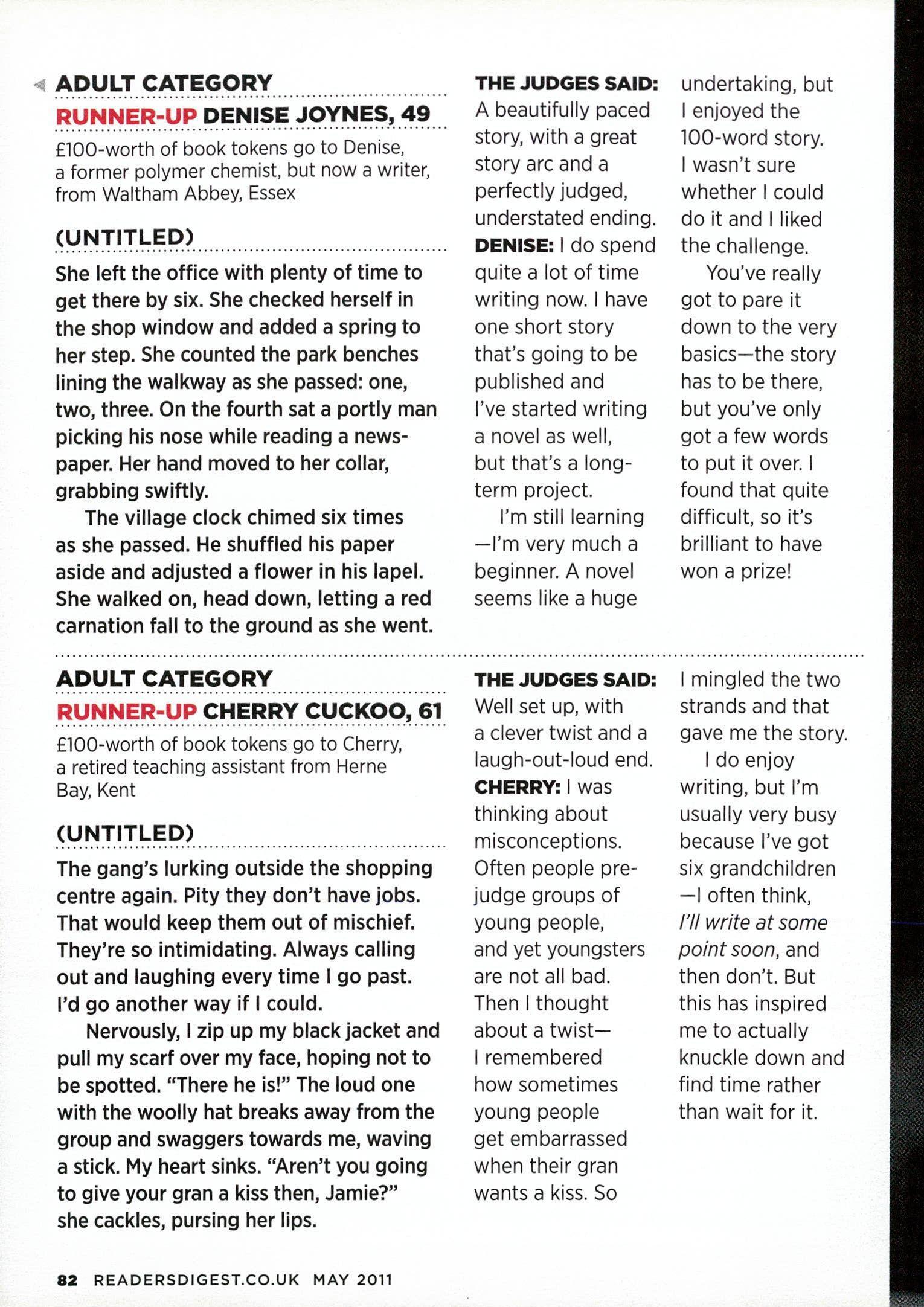
THE JUDGES SAID:
Well set up, with a clever twist and a laugh-out-loud end.
CHERRY: I was thinking about misconceptions. Often people prejudge groups of young people, and yet youngsters are not all bad. Then I thought about a twist— I remembered how sometimes young people get embarrassed when their gran wants a kiss. So
I mingled the two strands and that gave me the story. I do enjoy writing, but I'm usually very busy because I've got six grandchildren —I often think, I'll write at some point soon, and then don't. But this has inspired me to actually knuckle down and find time rather than wait for it.
£1,000-worth of high-street vouchers go to Amelia, plus £1,000 to her school, Withington Girls' School, in Manchester
If I were to tell you the story of my life it would span the last ten minutes. They were spent meeting my wife, called Wendy, I think. She held up a mirror and showed me that I am John. I look old.
I see lines on my face I don't remember forming, experiences that never happened.
I touch Wendy's face and her eyes fill with the sadness of a broken heart. I feel it, too.
AMELIA HAMILTON
PHOTOGRAPHED BY
GARY CALTON
I have a wife but I never married her. We are old together but I was never young. Apparently I loved her very much.
THE JUDGES SAID:A poignant piece of writing, with tremendous insight and maturity. That last line is perfect.
AMELIA: My English teacher told me about the competition. I thought, What could possibly tell a whole story in that space?
I felt by doing it in the way I have, it's telling the story of the character's entire life. I write all the time—I'm doing an OU course in creative writing at the moment as well. My ambition is to become a lecturer. I feel really excited and lucky to have won!
Ysgol Gyfun Gymraeg Glantaf School, Cardiff
Withington Girls' School, Manchester (UNTITLED)
Half-term is over. I have to return. It's the bullies. I've looked up the word. I quote: "A person who hurts, persecutes or intimidates weaker people." I'm quite tall; 5ft to be exact. But so many people tower over me. I try to stand firm. Somehow they can see inside me and fear comes from within.
I don't know what to do. We have the buddy system in operation. That can't help me. I could go straight to the top. Tell the headmaster. That could make matters worse. He might think it's my fault. Who says teaching is easy?
I stared at the portrait in the hallway, which I'd passed by so many times before. The withered face bruised by the cruelty of time, covered by a broken frame I'd promised to replace years ago. A pathetic smile as much a comfort for herself as for the viewer. She taught me everything I know; I relied on her for everything. Not that she had ever loved me. Frowned and criticised me all my life. Blamed me for my cheating husband, for my inability to have children, until I ended up hating her. I really should throw out that mirror.
11-AND-UNDER CATEGORY SPECIAL COMMENDATION AND £75 TO:
A TUMBLE IN THE GRASS
1916. Crackling gramophone noises in a red-brick house under fiery sky. A little patch of grass out the back. Daddy smart and stiff in olive uniform chasing me. I trip over bootlaces into roses. His head thrown back, laughs. I grab his ankle, he trips and falls down. We hurl autumn leaves, breathless as dusk. Crackling coughs in narrow trenches under fiery skies. A little patch of grass. Daddy smart and stiff in olive uniform. Tripping over black boots into blood-red poppies. His head thrown back, groans. He trips and falls down, into hurling bullets. He is breathless as dusk.

A man took trillions of cats and dogs to the moon to create a world record for animals on the moon. At first everything was fine and they all had plenty of room. As we all know, the moon starts off big and round, and then shrinks a little every night. You can see it happening in the sky.
As it shrank, they became more squashed and uncomfortable. The man wriggled and pushed a dog. All the animals began to push against one another and eventually fell off. The earth people were amazed to see it raining cats and dogs.
10 St Peter-in-Thanet Church of England Junior School, Kent (UNTITLED)
I turn the corner of the road, regretting each step. They'd be there; always were. Why was it always me? Queenie would pull back my hair and whisper in my ear, "We're not going to tell anyone about our little chats are we, Jacquie?" I'd say no and run away. Mum always has a go at me for shredding my knees. If only she knew. Queenie doesn't hurt you, she just says stuff. But I have a plan. I'm flying past them, praying Queenie will follow and won't cop on. Her legs are longer than mine. I see the truck.
£1,000-worth of high-street vouchers go to Harry, plus £1,000 to his school: Shebbear College, Beaworthy, Devon
One day my little sister was colouring with a large, green pen. She was happily colouring with her pen until she sneezed and scribbled all over her picture. She got so mad that she snapped her almost invincible pen and WHOOOSHHH!!
The next thing that happened was that I was sitting in neck-high green ink. It was rising. I had to stand up otherwise I would drown. My sister was actually swimming quite peacefully through the ink. Ding-dong! "Oh man," I said, "Dad's
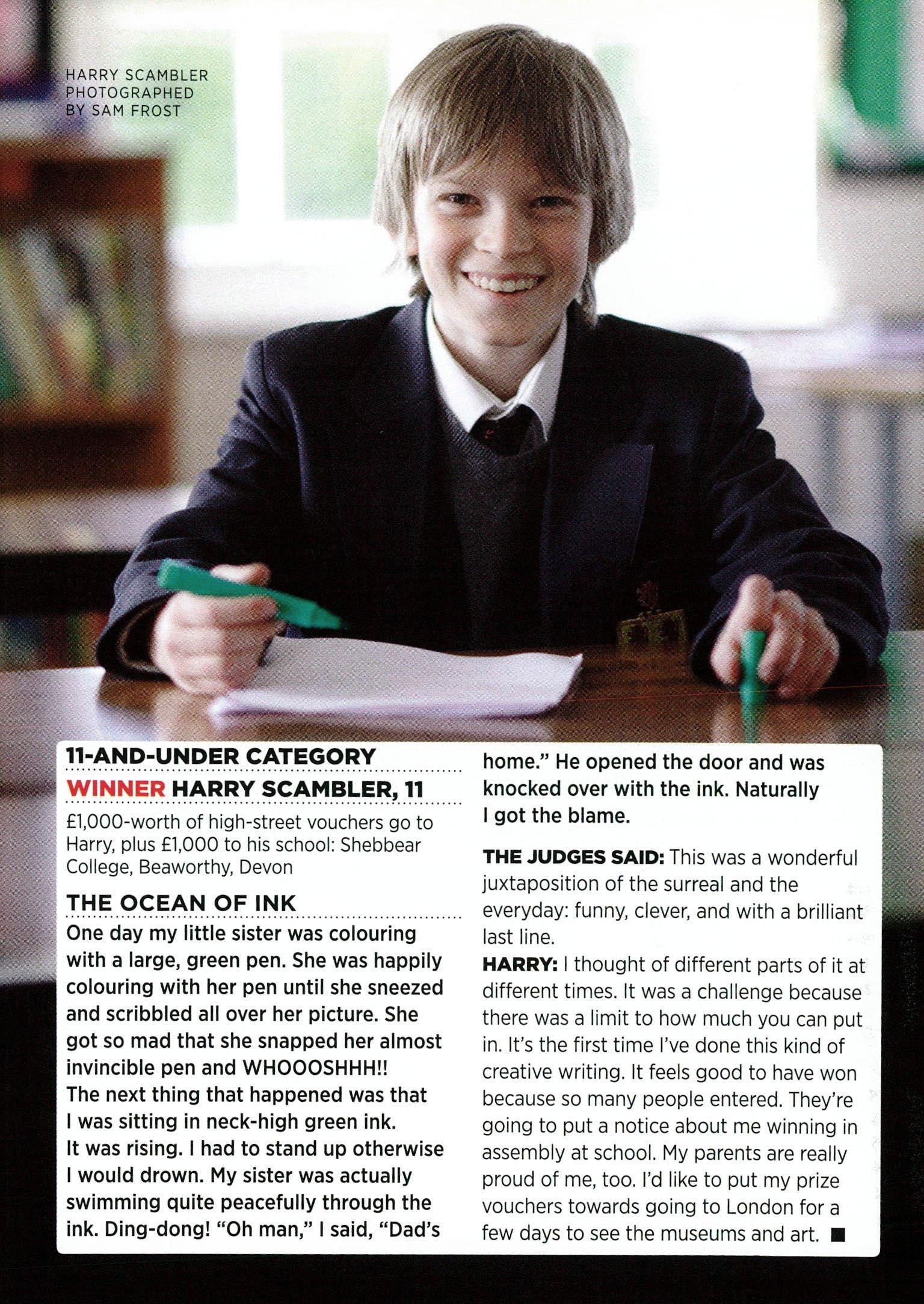
home." He opened the door and was knocked over with the ink. Naturally I got the blame.
THE JUDGES SAID: This was a wonderful juxtaposition of the surreal and the everyday: funny, clever, and with a brilliant last line.
HARRY: I thought of different parts of it at different times. It was a challenge because there was a limit to how much you can put in. It's the first time I've done this kind of creative writing. It feels good to have won because so many people entered. They're going to put a notice about me winning in assembly at school. My parents are really proud of me, too. I'd like to put my prize vouchers towards going to London for a few days to see the museums and art. ■

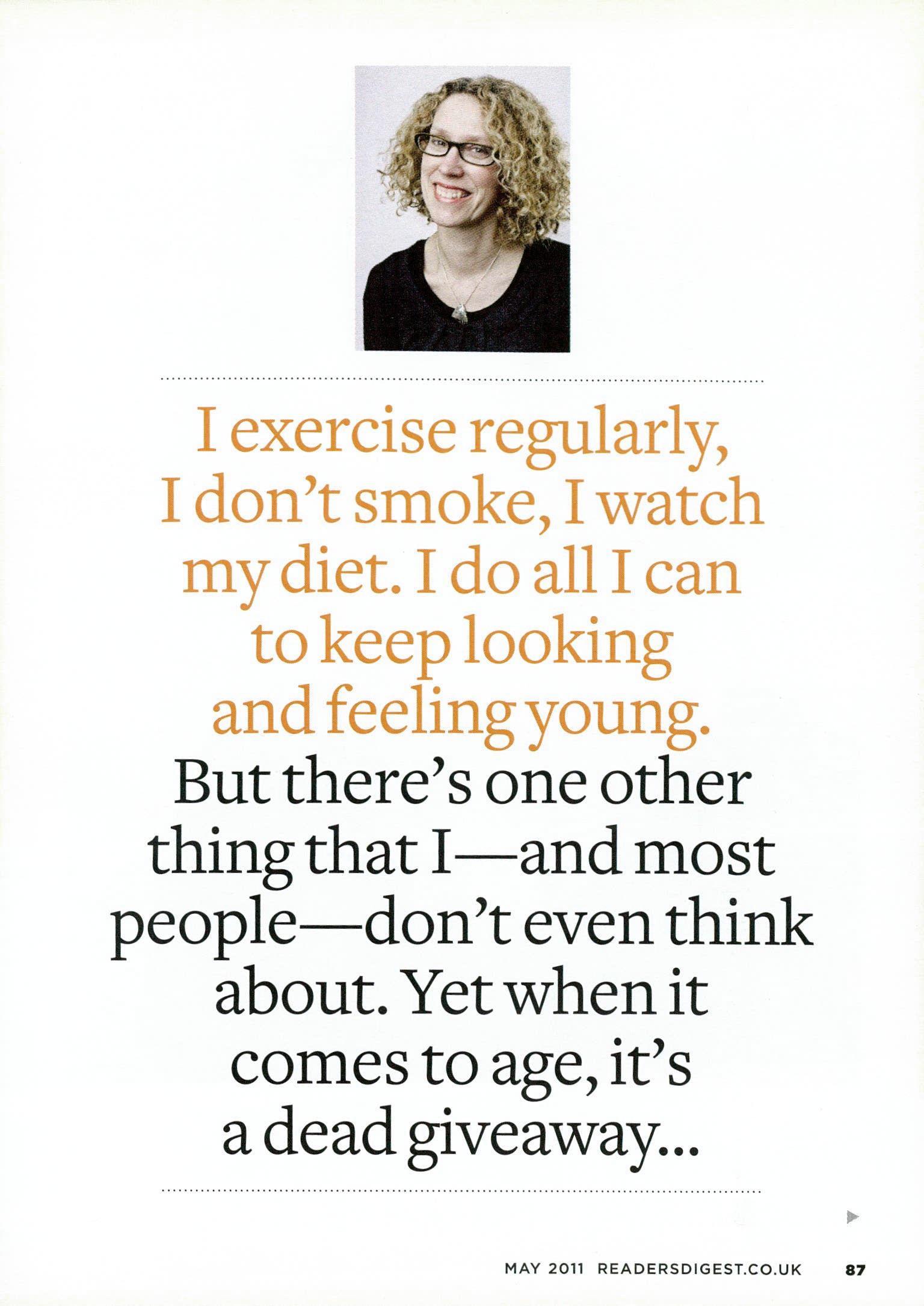
I exercise regularly, I don't smoke, I watch my diet. I do all I can to keep looking a (1 feeling you11Cr But there's one other thing that I—and most people—don't even think about. Yet when it comes to age, it's a dead giveaway...

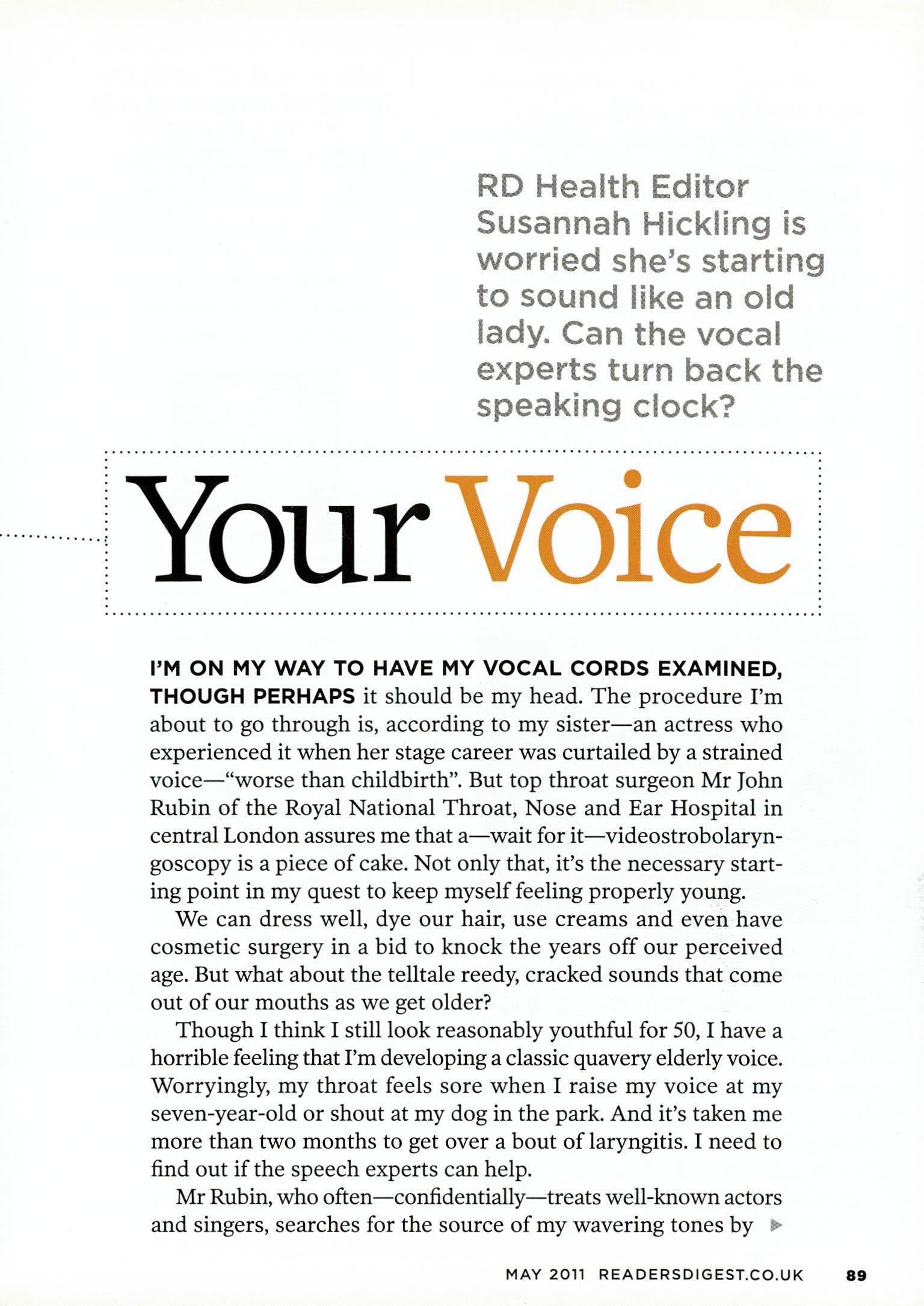
RD Health Editor Susannah Hickling is worried she's starting to sound like an old lady. Can the vocal experts turn back the speaking clock?
•
I'M ON MY WAY TO HAVE MY VOCAL CORDS EXAMINED, THOUGH PERHAPS it should be my head. The procedure I'm about to go through is, according to my sister—an actress who experienced it when her stage career was curtailed by a strained voice—"worse than childbirth". But top throat surgeon Mr John Rubin of the Royal National Throat, Nose and Ear Hospital in central London assures me that a—wait for it—videostrobolaryngoscopy is a piece of cake. Not only that, it's the necessary starting point in my quest to keep myself feeling properly young.
We can dress well, dye our hair, use creams and even have cosmetic surgery in a bid to knock the years off our perceived age. But what about the telltale reedy, cracked sounds that come out of our mouths as we get older?
Though I think I still look reasonably youthful for 50, I have a horrible feeling that I'm developing a classic quavery elderly voice. Worryingly, my throat feels sore when I raise my voice at my seven-year-old or shout at my dog in the park. And it's taken me more than two months to get over a bout of laryngitis. I need to find out if the speech experts can help.
Mr Rubin, who often—confidentially—treats well-known actors and singers, searches for the source of my wavering tones by t.
sticking a rigid scope with a camera on the end into my mouth.
Though this is slightly preferable to the flexible scope threaded through the nose that my sister had to endure, I struggle not to gag. But Mr Rubin gets a picture and lets me see it on screen.
I watch as the air I breathe out passes through my vocal cords—or "vocal folds". These control the voice's pitch by vibrating at certain frequencies (in a child it might be 260Hz; in a man, I25Hz). They appear on the screen as two gleaming white vertical strips but they're really part of a muscle on the side of the larynx. As I try to say "heeeee" (not easy when someone is poking a metal wand down your throat), they move back and forward in a distinctly floppy way.

Susannah's "gorgeous" vocal cords—see a video of them in action on our website*
"Gorgeous," says Mr Rubin. "Your vocal folds are lovely." I can't help but feel flattered. Common signs of ageing in the cords that can affect your voice include calluses (caused by friction damage where the cords meet most—teachers are particularly prone to them), polyps, calcium build-up and stiffening or thinning. But Mr Rubin says I have none of these problems. Phew! Still, he packs me off to his speech-
Dr Ruth Fnstein
Consultant speech and language therapist, Royal National Throat, Nose and Ear Hospital, London
Judi Dench, Rod Stewart and Bruce Springsteen. "Their voices are full of character. Dench's breathy edge is her vocal signature." David Cameron.
"We like a certain class."
therapist colleague Dr Ruth Epstein —who gives patients methods of preventing and recovering from voice damage— for more investigation.
Soon, she has me trying to hold the sound "oh" for as long as I can. I'm proud of my strong speaking voice, which was trained when I did drama in my younger days, but the results of Dr Epstein's computer voice-analysis are alarming.
"They demonstrate a raised level of jitter that we hear as harshness or vocal strain," she says. "There's also a slight element of shimmer that's
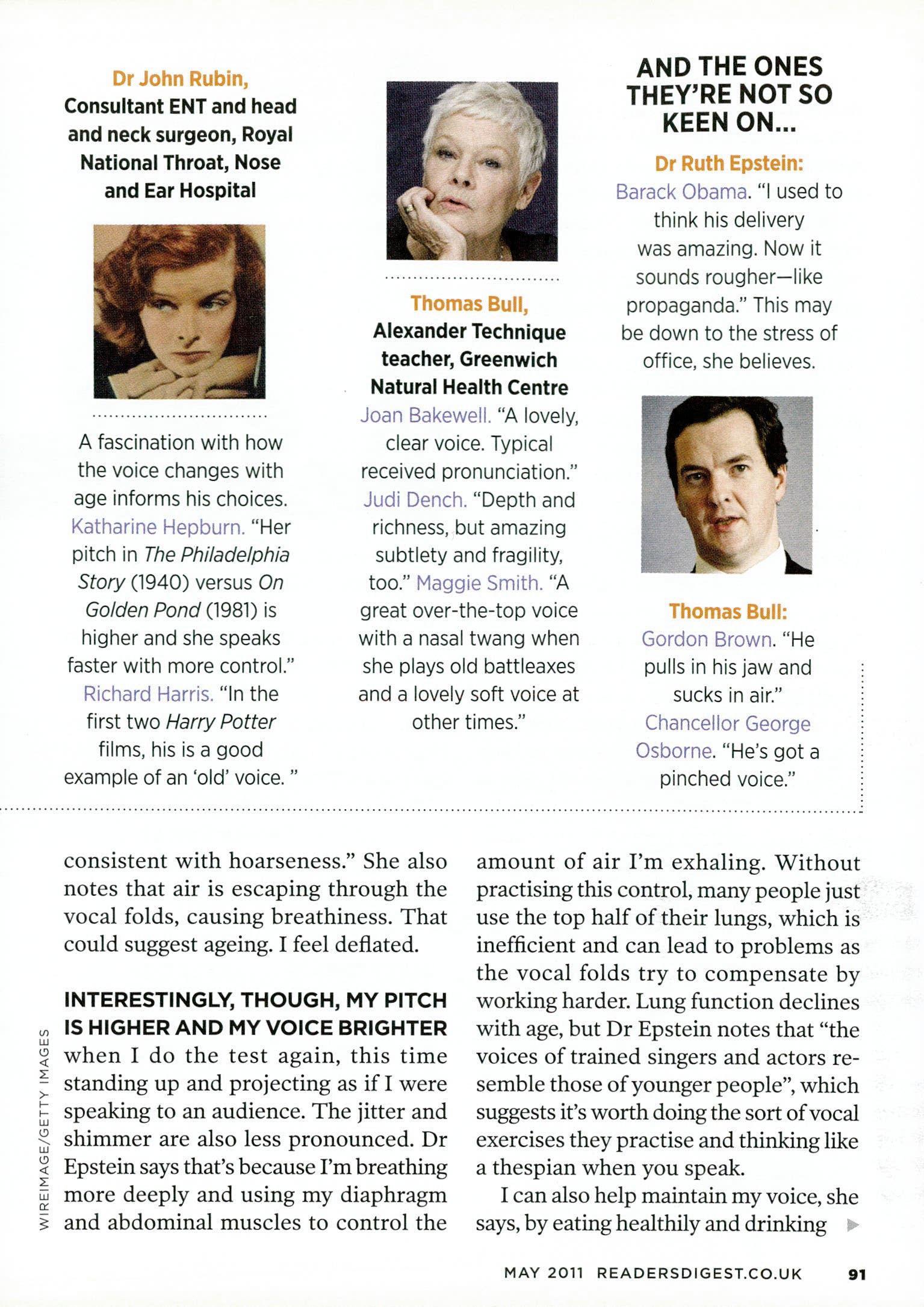
A fascination with how the voice changes with age informs his choices. Katharine Hepburn. "Her pitch in The Philadelphia Story (1940) versus On Golden Pond (1981) is higher and she speaks faster with more control."
Richard Harris. "In the first two Harry Potter films, his is a good example of an 'old' voice. "
Thomas Bull, Alexander Technique teacher, Greenwich Natural Health Centre Joan Bakewell. "A lovely, clear voice. Typical received pronunciation." Judi Dench. "Depth and richness, but amazing subtlety and fragility, too." Maggie Smith. "A great over-the-top voice with a nasal twang when she plays old battleaxes and a lovely soft voice at other times."
consistent with hoarseness." She also notes that air is escaping through the vocal folds, causing breathiness. That could suggest ageing. I feel deflated.
THOUGH, MY
IS HIGHER AND MY VOICE BRIGHTER when I do the test again, this time standing up and projecting as if I were speaking to an audience. The jitter and shimmer are also less pronounced. Dr Epstein says that's because I'm breathing more deeply and using my diaphragm and abdominal muscles to control the
AND THE ONES THEY'RE NOT SO KEEN ON...
Ur Ruth Epstein: Barack Obama. "I used to think his delivery was amazing. Now it sounds rougher—like propaganda." This may be down to the stress of office, she believes.
Thomas Bull: Gordon Brown. "He pulls in his jaw and sucks in air."
Chancellor George Osborne. "He's got a pinched voice."
amount of air I'm exhaling. Without practising this control, many people just use the top half of their lungs, which is inefficient and can lead to problems as the vocal folds try to compensate by working harder. Lung function declines with age, but Dr Epstein notes that "the voices of trained singers and actors resemble those of younger people", which suggests it's worth doing the sort of vocal exercises they practise and thinking like a thespian when you speak.
I can also help maintain my voice, she says, by eating healthily and drinking
• up to two litres of water a day to hydrate my vocal folds. But I should avoid too much caffeine or alcohol, especially white wine, which cause stomach-acid reflux that irritates the cords.
She approves of my 30 minutes of vigorous dog-walking twice a day but suggests I whistle rather than call back my errant pooch. She also suggests some basic breathing exercises, including lying on the floor breathing in as deeply I can through the nose, then fully exhaling to get used to filling my lungs completely.
The good news is that it's never too late to make these lifestyle adjustments to help your voice. "You should see a change in six to eight weeks," Dr Epstein says.
Of course, as with seemingly almost every part of the body these days, there is an artificial way of keeping your pitch youthful—a voice lift! The operation— available as a cosmetic procedure in the US—removes fat from your abdomen and injects it into your voice box to keep it plump and performing well. But it costs up to $25,000 and in the UK tends only to be used on people whose medical problems, such as cancer, have caused
decline from their thirties onwards due partly to thinning and drying of the vocal cords. That's why elderly men can sound highpitched and raspy. Male voices range in frequency from 80-130Hz.

serious vocal damage. So Dr Epstein's techniques are far preferable.
DR EPSTEIN ALSO SAYS THAT I COULD BENEFIT FROM practising the Alexander Technique, which I did use for a couple of years to help my drama. So my final port of call is Greenwich-based instructor Thomas Bull.
He soon has me lying on my back, head on a pile of books, knees bent and feet flat, while he moves my limbs, head
DON'T SMOKE
SING IN THE SHOWER It exercises the voice while the steam hydrates the vocal folds. But don't strain (Ace of Spades is probably out). If in doubt, hum or trill instead.
Both put stress on the vocal cords. Rest your voice if you exert it or lose it. Avoid clearing your throat. Swallow hard or drink water instead.
EXERCISE YOUR BODY
Cardiovascular health helps lung function and the vocal folds muscle. Walk regularly, cycle, or join an exercise class or gym.
WOMEN'S VOICES deepen slightly after the menopause due to a lack of oestrogen, then get higher as they age further. Their pitch ranges from 170-250Hz, but the average has dropped from 240 to 220Hz in the last 30 years, perhaps reflecting women's more authoritative roles at work.

and shoulders into a special "semisupine" resting position. This is one of several improved ways of standing, sitting, moving and breathing that form part of the technique. They release tension, free the head and widen the back, helping breathing and speaking. Many of our greatest actors and singers practise the technique, developed by Australian thespian F. Matthias Alexander around the turn of the last century. It can also reduce stress and may be more
Staying mentally active helps keeps the neurological messaging between your brain and your voice box up to speed.
effectiveat easing back pain than normal GP care, exercise or massage.
'Alexander is not a therapy, as such, but a skill to help you use yourself properly in all activities," says Bull.
Once you've got over the weirdness of having your teacher move you into the right position, you feel fantastic. I all but floated out of there, vowing to practise the semi-supine position for 15 minutes every day—though, if you're new to Alexander, you'll need around 24 lessons to master all the moves.
And so with the experts' advice ringing in my ears, I now stride out with the dog, whistling, not shouting. I'm also trying to breathe more deeply and—a tricky one, this—not shout at my son.
My lingering laryngitis quickly disappeared and I'm hoping that I can soon prove Dr Epstein's belief that, where the voice is concerned, "We can actually stop the ageing process."
If only all this could work for the rest of me... ■
Think you can tell a person's age by their voice? Go to readersdigest.co.uk/magazine and take our "Guess Their Age" test.
Speak to people. Join clubs, if necessary. The old adage "Use it or lose it" holds true for the voice.
Both cause cordirritating acid reflux.
One quick way to check you're standing properly is to drop your shoulders, position your back against a wall, then step forward.

TOMMY
RADIO. As a kid, music meant everything to me. Mum always had the radio on and I never missed TV programmes such as Ready Steady Go! and Juke Box Jury. The first guys that really stopped me in my tracks were Gene Vincent, Perry Como and Tommy Steele.
Tommy was wonderful—Britain's first rock 'n' roll star! After I became famous, I was offered the chance to have dinner with anyone I wanted, and I chose him. He bought me a steak at a London restaurant called Joe Allen. What struck me was how gracious he was—so well-known, yet so utterly down to earth.
My mum used to be Paul McCartney's cleaner—we lived around the corner from him in St John's Wood. I used to take Paul's sheepdog Martha [immortalised in the Beatles song "Martha My Dear"] for walks, and I can even remember peeping through a door to watch them working on their album
Sgt. Pepper's Lonely Hearts Club Band. Paul had the most amazing, perfect moustache, which is probably what convinced me to grow my own a couple of decades later.
Those Liverpool voices were so distinctive. Paul would say to my mum: "Hey, luv! Gerruz a bacon buttie, will ya!"
Walter Albany Smith (left) was a Romany gypsy, born in the back of a caravan in Oxford in 1898. He was a quiet man, but not the sort you'd want to mess with. He'd been in the navy, fought at the Battle of Jutland, and was a boxing champion.
Although he retired when I was a kid, he still worked on boats, sold newspapers and cleaned cars—anything to keep busy. He was a proud, working man and after school I used to go and help him. He instilled his work ethic in me from an early age, saying, "Work hard and you'll get somewhere—sit around on your backside and you'll amount to nothing."
 Fine and dandy: Adam today and (far left) with his mother Betty, who was Paul McCartney's cleaner
Fine and dandy: Adam today and (far left) with his mother Betty, who was Paul McCartney's cleaner
TO ADAM ANT. It was around 1976, I was in a band, and punk was beginning to take over London. I was convinced I was going to be a rock star, so I thought I'd better have a decent name. Stuart Goddard [Adam's real name] wasn't bad, but it wasn't Gene Vincent or Tommy Steele.
I looked at the other big stars at the time—David Bowie, Mick Jagger—and realised I didn't look like them. They were very feminine, but I was a real bloke— well-built and muscular after all those evenings with my grandad.
I saw a painting by Caravaggio of Adam in the Garden of Eden, and I thought, Blimey, he looks like me. Then I added the Ants bit as a nod to the Beatles —y'know, beetles and ants. Adam Ant—that was the new me.
Punk seems such a huge, worldwide thing these days, but in the early Seventies it was little more than 50 people in London, dressing up and playing music for fun.
Musicians and rock stars always had a particular image, but the Pistols changed all that. Their first ever gig was supporting Bazooka Joe, my band at the time, at St Martin's College in 1975.
They were dynamite—they just didn't care! Johnny Rotten was arguing with the audience, spitting toffees on the stage, and if anyone clapped, he told them to shut up. That show was like watching a firework go off on the streets of London. After that, girls in bondage gear were being arrested and blokes were being attacked just for having spiky hair! Punk was dangerous, and it changed music.
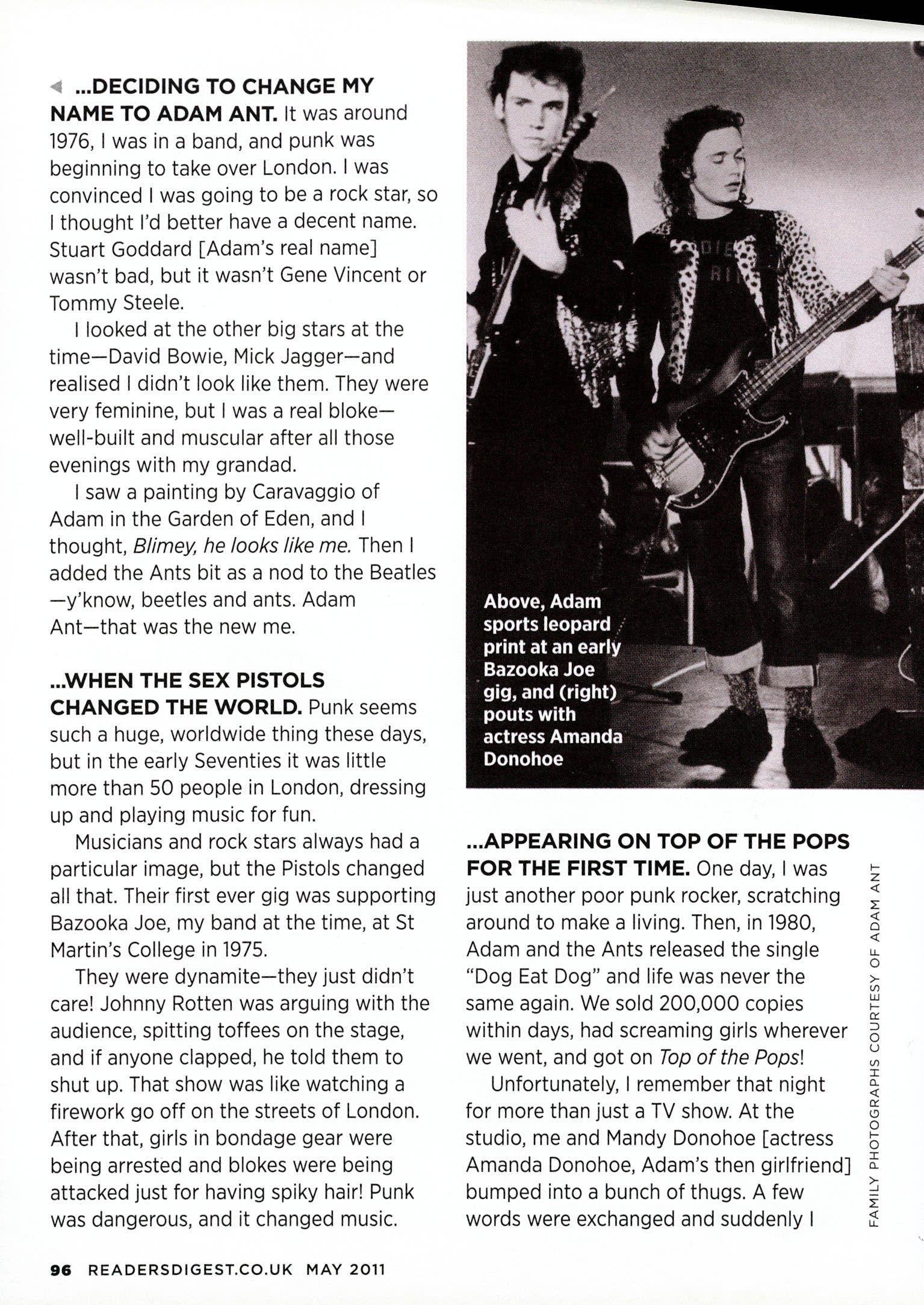
Above, Adam sports leopard print at an early Bazooka Joe gig, and (right) pouts with actress Amanda Donohoe
One day, I was just another poor punk rocker, scratching around to make a living. Then, in 1980, Adam and the Ants released the single "Dog Eat Dog" and life was never the same again. We sold 200,000 copies within days, had screaming girls wherever we went, and got on Top of the Pops!
Unfortunately, I remember that night for more than just a TV show. At the studio, me and Mandy Donohoe [actress Amanda Donohoe, Adam's then girlfriend] bumped into a bunch of thugs. A few words were exchanged and suddenly I
"A few words were exchan ed and suddenly I was on the oor, staring at elf,-Dlade of a knife"
Queen, Bowie and McCartney. I remember walking out onto that stage and seeing all those hands and all those faces. Once we started playing, I really went for it, wanting to make it the best show ever. It only seemed like seconds and our song finished, but I could have stood on stage looking at the crowd for ever. It was an amazing day.
...MEETING MUHAMMAD ALI. In a job like mine, you get a bit blasé about meeting famous people—Mickey Rourke, Robert De Niro, Bono... In fact, I can remember seeing Bono when he was still in flares, sporting a dodgy mullet! But meeting Ali was like nothing else.

was on the floor staring at the blade of a knife. Someone shouted, "Go on, stick him!" Then Mandy punched this guy full in the face. All I could think of was how unlucky it would be to die on the day I became a pop star—it would have been the shortest career in music history.
...PLAYING LIVE AID. Millions of people all over the world remember watching Live Aid, so you can imagine what it was like actually performing at the show. I was at Wembley Stadium, lining up alongside
I went to a book signing and queued up with everybody else to meet this great man. When I got to the desk, I started babbling about watching all his fights, but he just took hold of my face and gently pressed his cheek on mine. I was so happy I wanted to cry. All had taken every blow the world had thrown at him—he'd been pummelled by George Foreman, and had his crown stolen by the government—but there he was, an ocean of serenity... A man who made a living by fighting, but who could teach us all so much about how to live.
...BECOMING A FATHER. My beautiful daughter Lily Caitlin was born in 1998. Not only did I become a father, I also ►
became a man. Up until that point, I'd been a boy just playing at being an adult. After Lily was born, I realised it wasn't just about me—there was someone else in the world who needed me.
Like any father, I worry about my daughter—she'll soon be a teenager!—but Lily is a very smart, clued-up, traditional girl. Kids today can get carried away by technology, but Lily loves pen and paper, she loves books—I think she's slightly wary of the digital age. She's not one of these kids who spends their life on a computer or mobile phone.
Number-one records, money and fame don't mean a thing compared to my daughter. She's the thing I'm most proud of in this world.
ALL
MONEY HAD GONE. Don't get me wrong, I'm doing alright—I'm lucky enough to be able to afford the things that matter, like my daughter's education. She won't have to struggle like I did when I was a kid. I recently managed to get my single "Goody Two Shoes" on the soundtrack to Shrek the Third, and that one song more or less pays my rent. But I sometimes look back on the

Left: Ant-ics in the studio while recording Kings of the Wild Frontier in 1980.
Above: He's talkin' to him—Adam meets Robert De Niro
success we had and think, My God! How much money did we make? We sold millions of albums, singles and concert tickets. By rights, I ought to be able to afford my own island, or my own street in London! Bands are still getting screwed—that's the nature of the music business.
I'm sure people have read all the sensational headlines: "Adam Ant is crazy! Nutty as a fruitcake!" The reality is that I have a condition called bipolar disorder—it's nothing to be ashamed of. Loads of people suffer from depression—even Winston Churchill had his "black dog". It upsets your emotions—you can be happy, sad or even suicidal.
The situation in 2002 involved an
imitation firearm, which made it all very complicated [Adam was arrested in Kentish Town, London, after smashing a pub window and threatening a group of men with a starting pistol]. Emotionally, I'll admit I was up and down like a bride's nightie, but that doesn't explain how I was treated by the authorities. In the end, I was only charged with affray, but I was sectioned. It was scary, like One Flew Over the Cuckoo's Nest. Mental illness and depression are often seen as dirty words— but I think it's time we took a closer look at how the law deals with them.
People are talking about it as a comeback [Adam's last studio album was released in 1995], but I've never really

stopped being Adam Ant. As well as the music, I've acted, I've written scripts and books, and I've painted. There's even talk of putting a new version of Adam and the Ants together and playing all the old hits. Who knows what's going to happen?
This album is just the next stage. I'm 56, but I'm in great shape. I smoke and drink a little, but I've never really been into drugs. I'm a survivor, a fighter.
It's not about the money—I don't make an album or go on tour for the pay. It's about art. This album is me squaring up to the world and putting on a show! ■
As told to Danny Scott
» Adam's Ant's greatest-hits tour starts later this month. Go to readersdigest.co. uk/links for dates.
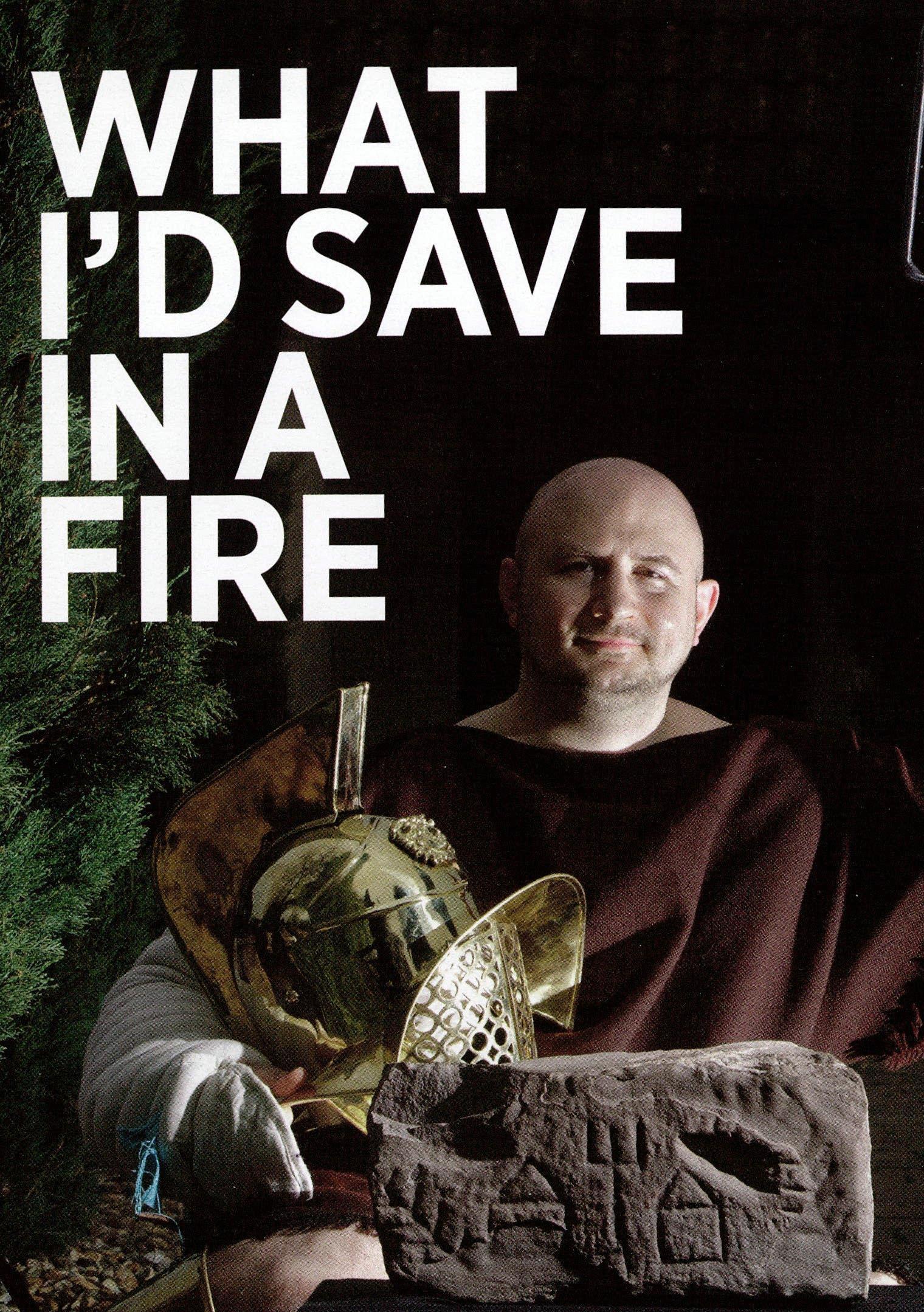

To mark International Museums Day we asked top curators and trustees which one item in their collections they would reach for in the event of a disaster. One even dressed up to prove his point...BY E JANE DICKSON
BY
"I love this carving because it's 'unofficial art', found in the fully excavated amphitheatre next to the museum. It wasn't part of the building's design and it's not done to a particularly high standard. As far as we can tell, it's just something someone has chosen to inscribe on one of the stones.
"It shows shoulder guards [with triangle on top] and a trident, and represents a 'retiarius' gladiator, who fought with a net. They were usually slaves, but gladiators were still the sporting superstars of their day and had huge followings. This graffiti may have been showing support for a fighter just as names of footballers appear on walls now.
"This object has particular resonance for me as I'm training to be a gladiator myself—hence the costume. We're staging gladiatorial contests and want to make them as real as possible, so I've been researching original training techniques and learning the skills and footwork. There's a certain choreography to our fighting, but I don't think that's a million miles from what was going on in Roman times.
OF
'vv Mail '1 riple-Screw Steamer
At BELFAST, Wednesday, 31st May, 1911, at 2-15 p.m.
Abmit i6tartr.
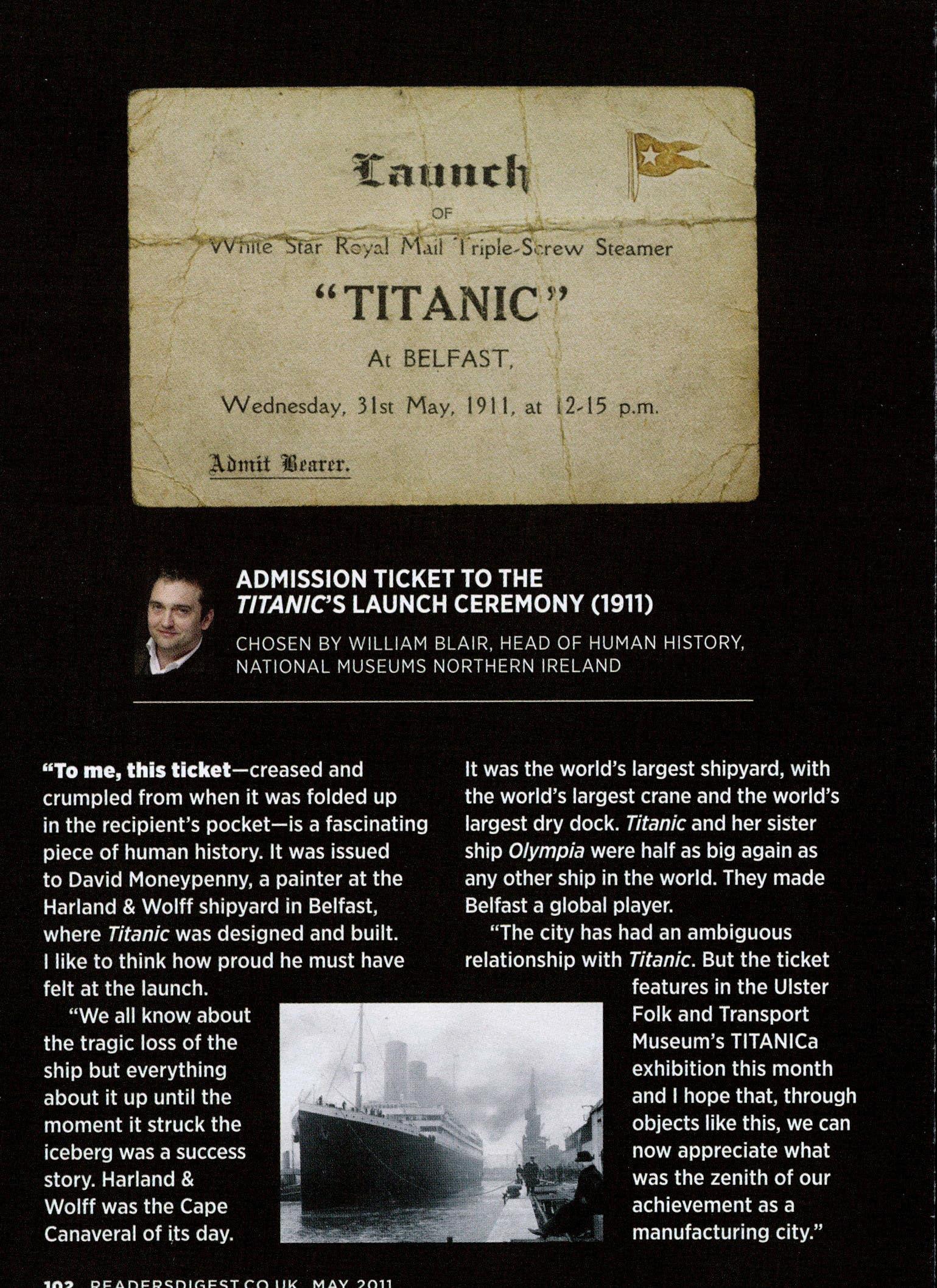
ADMISSION TICKET TO THE TITANIC'S LAUNCH CEREMONY (1911)
CHOSEN BY WILLIAM BLAIR, HEAD OF HUMAN HISTORY, NATIONAL MUSEUMS NORTHERN IRELAND
"To me, this ticket—creased and crumpled from when it was folded up in the recipient's pocket—is a fascinating piece of human history. It was issued to David Moneypenny, a painter at the Harland & Wolff shipyard in Belfast, where Titanic was designed and built. I like to think how proud he must have felt at the launch.
"We all know about the tragic loss of the ship but everything about it up until the moment it struck the iceberg was a success story. Harland & Wolff was the Cape Canaveral of its day.
•
It was the world's largest shipyard, with the world's largest crane and the world's largest dry dock. Titanic and her sister ship Olympia were half as big again as any other ship in the world. They made Belfast a global player.
"The city has had an ambiguous relationship with Titanic. But the ticket features in the Ulster Folk and Transport Museum's TITANICa exhibition this month and I hope that, through objects like this, we can now appreciate what was the zenith of our achievement as a manufacturing city."
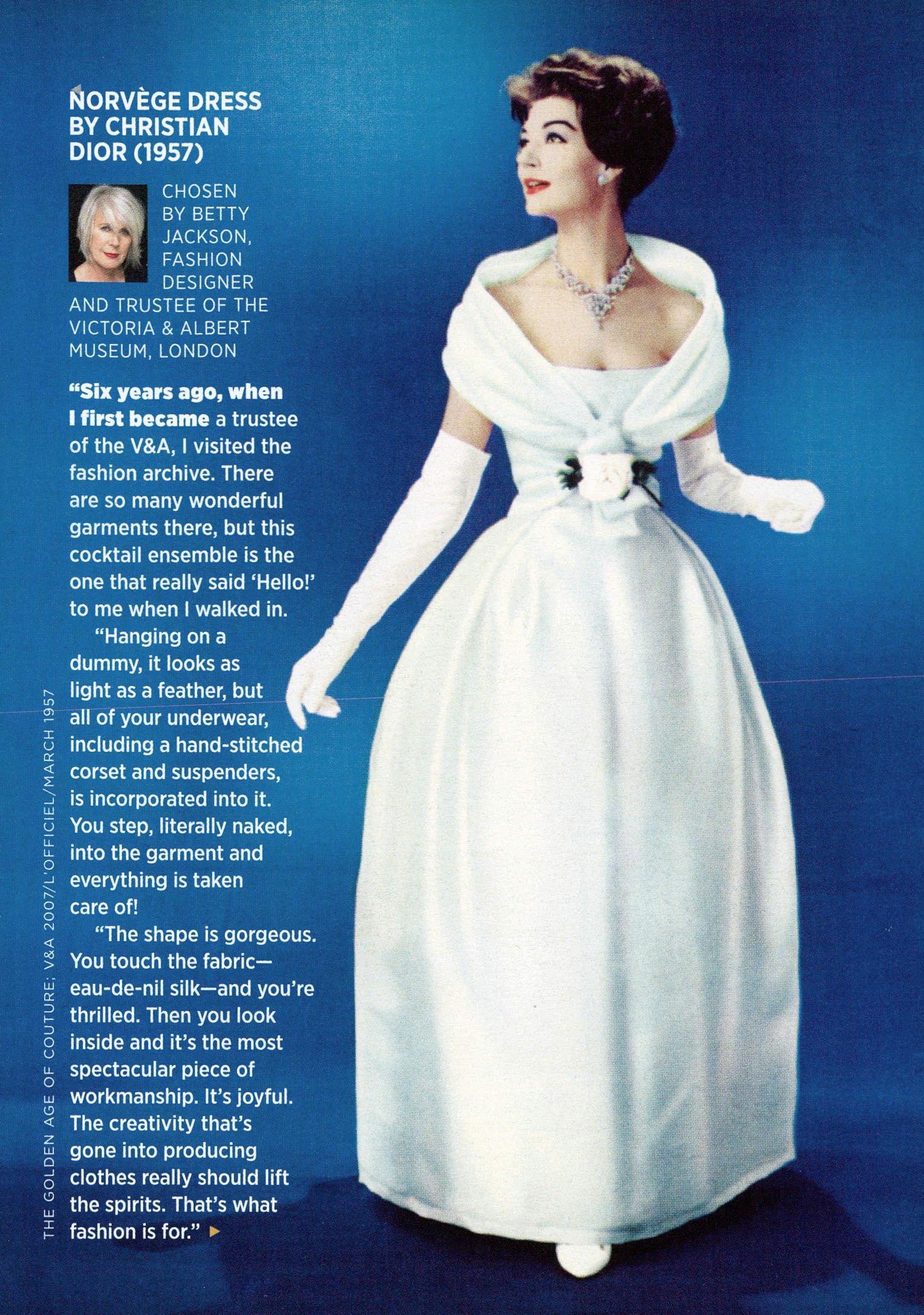
"Six years ago, when I first became a trustee of the V&A, I visited the fashion archive. There are so many wonderful garments there, but this cocktail ensemble is the one that really said 'Hello!' to me when I walked in.
"Hanging on a dummy, it looks as light as a feather, but all of your underwear, including a hand-stitched corset and suspenders, is incorporated into it. You step, literally naked, into the garment and everything is taken care of!
"The shape is gorgeous. You touch the fabriceau-de-nil silk—and you're thrilled. Then you look inside and it's the most spectacular piece of workmanship. It's joyful. The creativity that's gone into producing clothes really should lift the spirits. That's what fashion is for." P.
BY
SANDY NAIRNE, DIRECTOR, NATIONAL PORTRAIT GALLERY, LONDON"I have a personal reason for admiring this picture. I'm a member of the Fabric Advisory Committee of St Paul's Cathedral and a small but engaging part of my life is taken up with Wren's magnificent creation. But I love this picture because it's a portrait doing what portraits do best. They speak to us across time.
"It was painted after Wren had completed the extraordinary rebuilding of the City of London, the city churches and St Paul's Cathedral (the ground plan of St Paul's is pictured). But Wren faced difficulties with political patronage and this was painted at the time he was sacked as surveyor at the cathedral.
"But we can't tell this at all, because Wren realises that he's really facing into the future. It's a brilliant depiction of a stoical view of life."
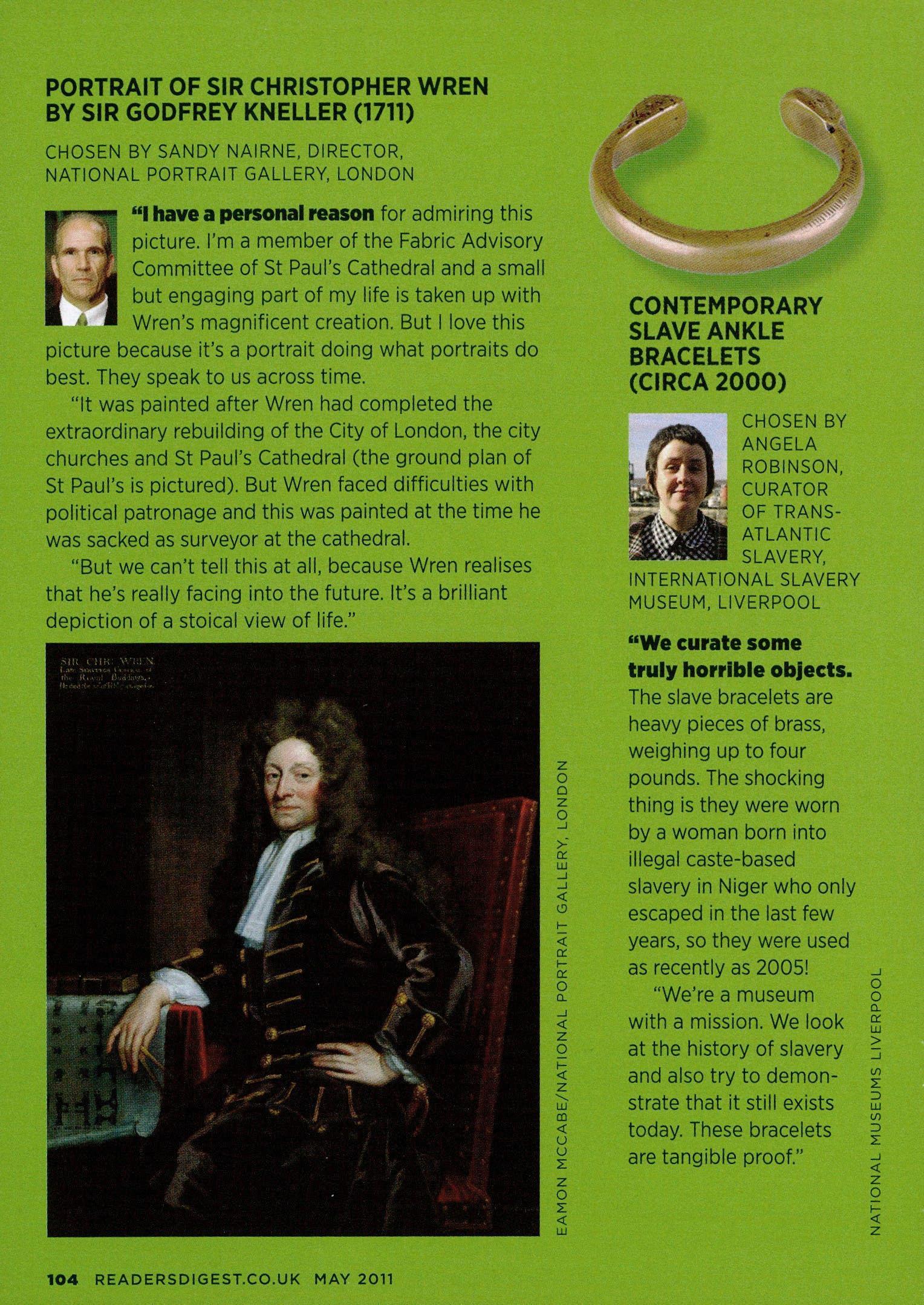
CHOSEN BY ANGELA ROBINSON, CURATOR OF TRANSATLANTIC SLAVERY, INTERNATIONAL SLAVERY MUSEUM, LIVERPOOL
"We curate some truly horrible objects. The slave bracelets are heavy pieces of brass, weighing up to four pounds. The shocking thing is they were worn by a woman born into illegal caste-based slavery in Niger who only escaped in the last few years, so they were used as recently as 2005!
"We're a museum with a mission. We look at the history of slavery and also try to demonstrate that it still exists today. These bracelets are tangible proof."
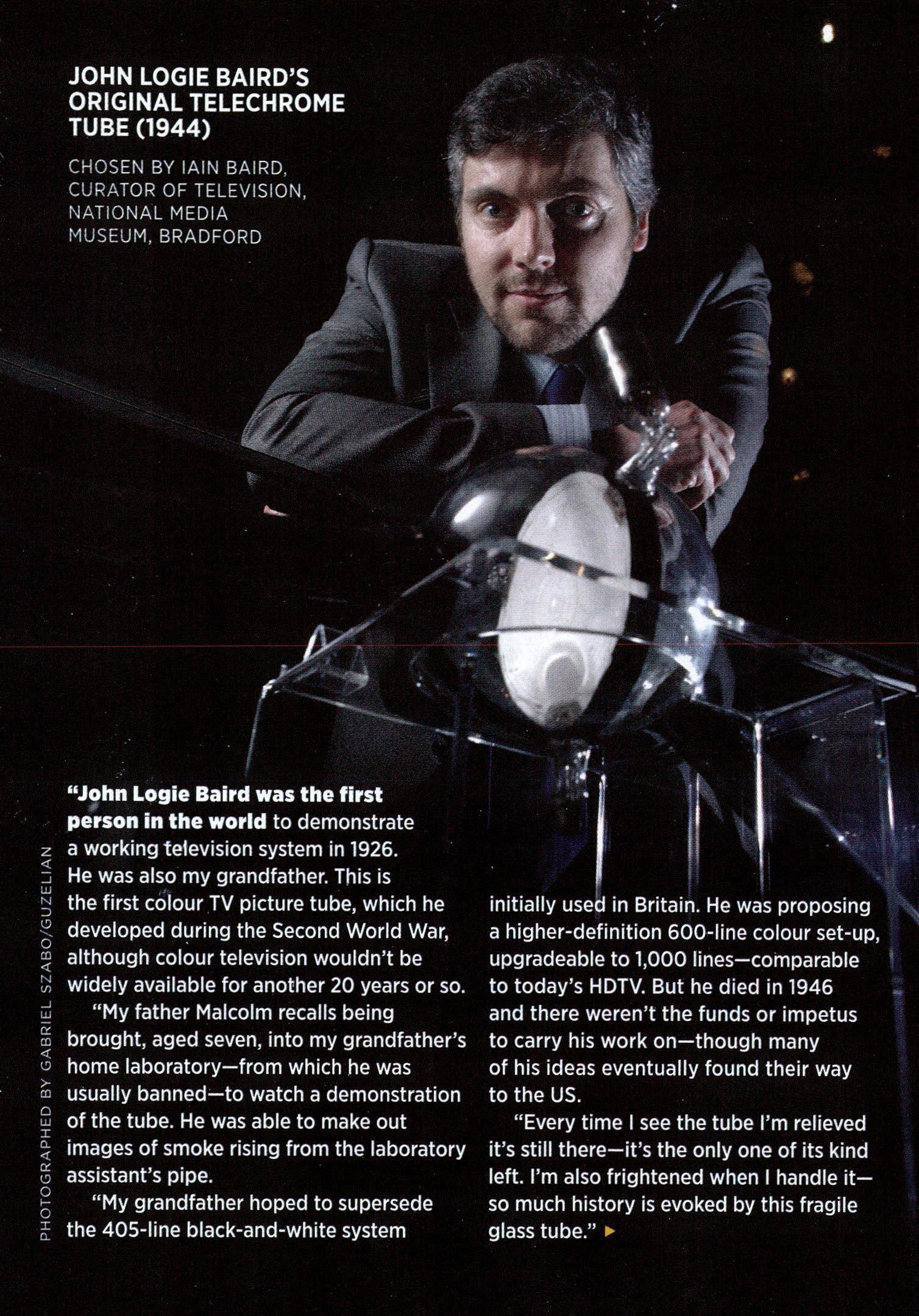
"John Logie Baird was the first person in the world to demonstrate a working television system in 1926. He was also my grandfather. This is the first colour TV picture tube, which he developed during the Second World War, although colour television wouldn't be widely available for another 20 years or so.
"My father Malcolm recalls being brought, aged seven, into my grandfather's home laboratory—from which he was usually banned—to watch a demonstration of the tube. He was able to make out images of smoke rising from the laboratory assistant's pipe.
"My grandfather hoped to supersede the 405-line black-and-white system
initially used in Britain. He was proposing a higher-definition 600-line colour set-up, upgradeable to 1,000 lines—comparable to today's HDTV. But he died in 1946 and there weren't the funds or impetus to carry his work on—though many of his ideas eventually found their way to the US.
"Every time I see the tube I'm relieved it's still there—it's the only one of its kind left. I'm also frightened when I handle it— so much history is evoked by this fragile glass tube."
CHOSEN BY LORD MACFARLANE OF BEARSDEN, INDUSTRIALIST AND CHAIRMAN OF THE KELVINGROVE ART GALLERY AND MUSEUM ADVISORY COMMITTEE, GLASGOW
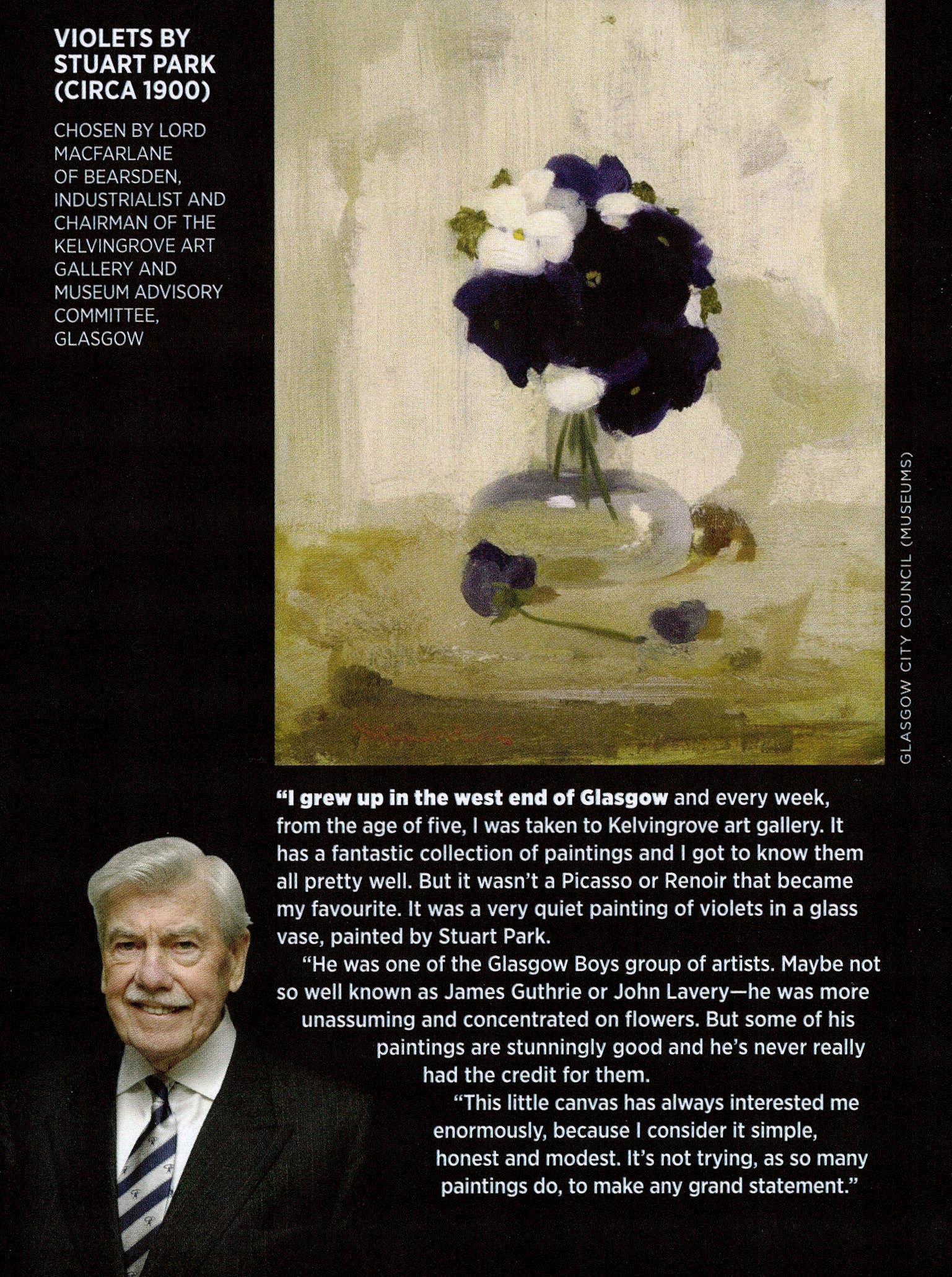
"I grew up in the west end of Glasgow and every week, from the age of five, I was taken to Kelvingrove art gallery. It has a fantastic collection of paintings and I got to know them all pretty well. But it wasn't a Picasso or Renoir that became my favourite. It was a very quiet painting of violets in a glass vase, painted by Stuart Park.
"He was one of the Glasgow Boys group of artists. Maybe not so well known as James Guthrie or John Lavery—he was more unassuming and concentrated on flowers. But some of his paintings are stunningly good and he's never really had the credit for them.
"This little canvas has always interested me enormously, because I consider it simple, honest and modest. It's not trying, as so many paintings do, to make any grand statement."

r "Tr,. "This shield was made by 4.... the Wahgi people in the highlands of Papua New
AGuinea, which is where I do anthropological fieldwork.
"The Wahgi was a stone-using community with no idea about the outside world until the country got caught up in the Second World War. In the development that followed, they started growing coffee as a cash crop, missionaries arrived and people became literate. The group took certain items from the West and recycled them within their own culture.
"Shields like this were used in inter-clan warfare, but traditionally featured basic, geometric designs. Fighting stopped in the Forties, then began again in the Eighties, and decorations reflected people's experiences since 'first contact'. So the 'Phantom' on this shield is an American cartoon superhero who appeared in a Papua New Guinea newspaper. The fact that he's a morally upstanding figure links to a belief that warriors should confess and be cleansed of their faults before going into battle.
"The design exemplifies people's capacity to harness change—this is one of the most interesting aspects of anthropology and a focus of our remarkable museum." ■

go online and play today!

Guaranteed cash jackpots every week
Over £2 million won every single day Someone wins every 2 seconds Games galore including bingo, slots and scratchcards Win FREE spins in our Daily Free Games* visit us online '1"1""I
 COMPILED
COMPILED
AND
WRITTEN BY LINDA GRAYr. i:RY01,.. 4..3,110 r
Welcome to the pages that help make life simpler, easier and—we hope—more fun!
WITH SO MANY SERVICES now under threat, even some otherwise staid citizens are considering waving a banner in protest. But it pays to tread carefully when taking to the streets.
Step 1: Hold a demo, not a march. A march is a procession, which is subject to tight controls and the police need to be notified six days in advance. But if you stay in one place you're an "assembly" and there's no need to inform the police. You can still be held to account for disorder though, so appoint stewards to make sure it runs smoothly.
Step 2: Publicise the campaign using posters, press, Twitter and Facebook, and call on local celebrities, councillors, PRs and designers
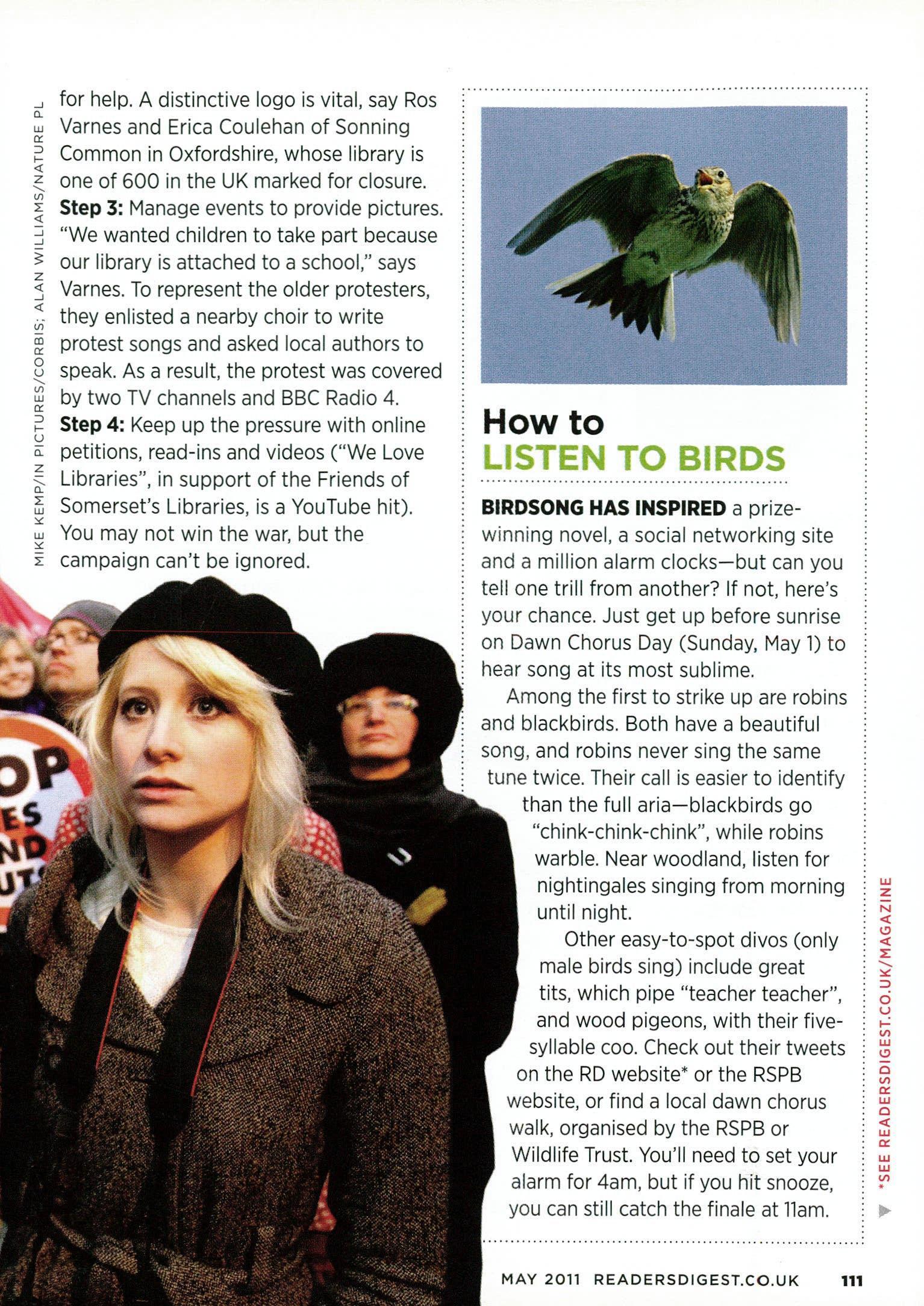
for help. A distinctive logo is vital, say Ros Varnes and Erica Coulehan of Sonning Common in Oxfordshire, whose library is one of 600 in the UK marked for closure.
Step 3: Manage events to provide pictures. "We wanted children to take part because our library is attached to a school," says Varnes. To represent the older protesters, they enlisted a nearby choir to write protest songs and asked local authors to speak. As a result, the protest was covered by two TV channels and BBC Radio 4.
Step 4: Keep up the pressure with online petitions, read-ins and videos ("We Love Libraries", in support of the Friends of Somerset's Libraries, is a YouTube hit). You may not win the war, but the campaign can't be ignored.
BIRDSONG HAS INSPIRED a prizewinning novel, a social networking site and a million alarm clocks—but can you tell one trill from another? If not, here's your chance. Just get up before sunrise on Dawn Chorus Day (Sunday, May 1) to hear song at its most sublime. Among the first to strike up are robins and blackbirds. Both have a beautiful song, and robins never sing the same tune twice. Their call is easier to identify than the full aria—blackbirds go "chink-chink-chink", while robins warble. Near woodland, listen for nightingales singing from morning until night.
Other easy-to-spot divos (only male birds sing) include great tits, which pipe "teacher teacher", and wood pigeons, with their fivesyllable coo. Check out their tweets on the RD website* or the RSPB website, or find a local dawn chorus walk, organised by the RSPB or Wildlife Trust. You'll need to set your alarm for 4am, but if you hit snooze, you can still catch the finale at 11am.
THERE'S A DOWNSIDE TO that high-street chandelier as a light fitting—wiping each crystal by hand to clean. To postpone that day, turn off the electricity and hang a light umbrella upside down from the base (check the weight first). Flick a
feather duster over the light, then cover bulbs and holders with plastic sandwich bags and secure them. Spray the chandelier with a mix of two teaspoons of surgical spirit in 500m1 of warm water, or HG Chandelier Spray (E7.09) and leave to dry—the umbrella will catch the drips.
Find more innovative tips in Extraordinary Uses for Ordinary Things (Reader's Digest, £12.99)
ASDOWNTON ABBEY SHOWS, plenty of people are still worried about which fork to use—and with good reason, says lifestyle consultant Matthew Gordon Lennox. "Niceties do matter," he insists. "Etiquette provides us with basic rules that allow us to face any situation with grace and style." Follow his guide to correct form.
LAY THE TABLE Forks should be placed on the left, prongs upward, knives (blades facing inwards) and spoons on the right. "The habit of placing the pudding (and it's 'pudding' not 'dessert'!) spoon and fork above is very 'nursery' and just plain wrong," says Lennox.
HIDE THE CRUET Salt is served in a salt cellar, a small dish placed in front of the

pepper pot. If mustard is provided, put the salt and pepper side by side with the mustard in front. All pots must be removed after the main course.
WATCH YOUR "PLTs" "'Pardon', 'lounge' and 'toilet' bring a shudder to the gracious ear," says Lennox. Despite what you may have been told, don't say pardon—"Sorry?" or "What?" are better. Next on the naff list is lounge—use drawing room or sitting room.
Finally, "The well-mannered person uses the loo or lavatory."
and Dispatches: A Cradle to Grave Guide to Correct Form by Matthew Gordon Lennox is published in July

How to TAKE A TIP FROM BURGLARS—when it comes to remembering
LoJOST the location of an open window, they don't miss a trick, says psychologist Professor Robert Logie of Edinburgh University. "We YOUR remember things linked to our area of expertise," he says. "Football MEMORY fans can always remember scores, though they're no better at memorising random numbers than anyone else."
Paying attention is important because a failure of memory is a failure of concentration. If your mind wanders, you can't take in requests or instructions, let alone the name of the party guest you're talking to. Ninety-five per cent of us forget names, mostly because we don't use them in conversation. Repeating the name out loud—"Nice to meet you, Steve," "What do you think, Steve?", "Thank you, Steve"—helps din it into your brain. Get plenty of sleep (going without trashes your memory for the next day) and pep up your life by doing things differently, to stop memories blurring. Misremembering, which caught out Hillary Clinton in the last US election (she claimed she was under sniper fire in Bosnia, but camera footage shows this was not the case) is not just an excuse. "A lot of recall is reconstruction—the brain just gives the best guess it can," says Logie.
Test how accurate your memory is by taking a simple online quiz from the BBC (see readersdigest.co.uk/links). And see if you can beat the burglars!
when you can upsize your income to the tune of £4,250, taxfree, by renting out a room?
This can also open your mind. "I had lodgers for six years and it enriched my life," says lawyer and landlady Tessa Shepperson, who gives advice in print (Taking in a Lodger, £9.99) and online.
Don't rush the selection process, she warns. Listen to your gut instinct and if you're unsure about a potential lodger, tell them the room has gone. Equally, don't be charmed into offering the room on the spot before checking out references, credit ratings and phone numbers. Then put it in writing—that goes for house rules about smoking and overnight guests, the contract, inventory and notice. If it all sounds brutally businesslike, that's because it is. In time, your lodger may become your best friend, but for now it's best to bite your lip.
Lodgers are entitled to share some living space (the hall doesn't count) and services such as cleaning, though fresh towels will do. What they can't demand is a lock on their door, says Shepperson. A bolt is fine, but having exclusive use of the room turns them into a tenant (harder to throw out). If they want a lock, ask for a key.

You don't really need to see me in six months. If your teeth and gums are healthy, you can wait up to two years between appointments, says the NHS.
• Decay can be catching. Tasting a baby's food can pass on the bacteria that cause it. If you don't want to set a child up for a lifetime of fillings, avoid sharing spoons, lollies and slobbery kisses.
•Flossing can save your life. It helps prevent stroke, chest infections, premature birth and maybe even breast cancer, all linked to bacteria in gum disease.
•Fizzy drinks vaporise teeth. It's not just that they're sugary— they contain acid
that weakens the enamel, so diet and sports drinks can be damaging, too. If you want fizz, use a straw or swap to sparkling water.
*Smoking is worse than sugar. It makes you six times more likely to get mouth cancer and increases the risk of gum disease, so you're more likely to lose your teeth. Implants aren't recommended for smokers, so if you require false teeth, they have to be the type of dentures you keep in a jar. *Clean your teeth with cheese. It's the best thing to eat between meals because it neutralises the acidity that causes erosion.
•Mercury could soon be banned.
Though the NHS is convinced amalgam fillings are safe, they're prohibited in Scandinavia and the EU looks set to phase them out. Everyone agrees that amalgam can
sometimes crack teeth (it expands and contracts).
• Don't brush straight after meals. Wait half an hour to let the enamel harden or you'll brush it away.
•Spit, don't rinse. If you swill your mouth out after brushing, you'll wash away the toothpaste ingredients that prevent decay.
•Teeth can heal themselves. Give them a little help by brushing with fluoride toothpaste (look for 1,3501,500 parts per million) to reverse the early stages of decay. You can use it even if the water's fluoridated --that's a bonus, not a substitute.
•
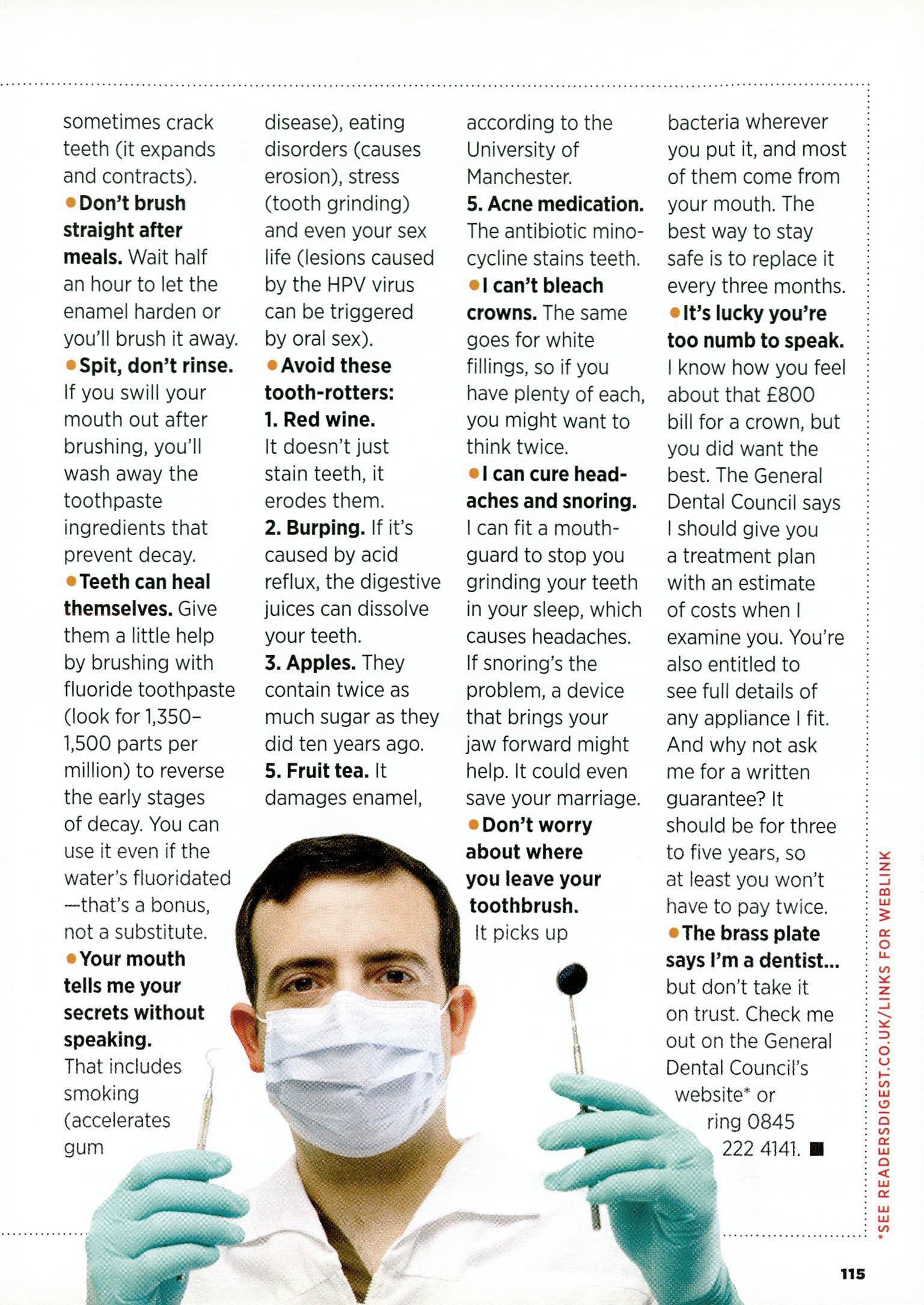
•Your mouth tells me your secrets without speaking. That includes , smoking (accelerates gum
disease), eating disorders (causes erosion), stress (tooth grinding) and even your sex life (lesions caused by the HPV virus can be triggered by oral sex).
• Avoid these tooth-rotters:
1.Red wine. It doesn't just stain teeth, it erodes them.
2. Burping. If it's caused by acid reflux, the digestive juices can dissolve your teeth.
3. Apples. They contain twice as much sugar as they did ten years ago.
5. Fruit tea. It damages enamel,
according to the University of Manchester.
5. Acne medication. The antibiotic minocycline stains teeth.
• I can't bleach crowns. The same goes for white fillings, so if you have plenty of each, you might want to think twice.
• I can cure headaches and snoring.
I can fit a mouthguard to stop you grinding your teeth in your sleep, which causes headaches. If snoring's the problem, a device that brings your jaw forward might help. It could even save your marriage.
• Don't worry about where you leave your toothbrush. It picks up
bacteria wherever you put it, and most of them come from your mouth. The best way to stay safe is to replace it every three months.
• It's lucky you're too numb to speak. I know how you feel about that £800 bill for a crown, but you did want the best. The General Dental Council says I should give you a treatment plan with an estimate of costs when I examine you. You're also entitled to see full details of any appliance I fit. And why not ask me for a written guarantee? It should be for three to five years, so at least you won't have to pay twice.
•The brass plate says I'm a dentist... but don't take it on trust. Check me out on the General Dental Council's website* or ring 0845 222 4141. ■
It's when you're vulnerable that you need help the most
No wonder surgeons act as if they're gods. After all, there's a definite air of the Messianic about what they do: "He was blind and now he can see," says the ophthalmic surgeon. "He was lame, and now he can walk," says the orthopaedic surgeon. But not all doctors can offer their patients miraculous cures. For conditions such as severe mental illness, sometimes the best doctors can hope for is to keep the symptoms under control.
But for these patients, one of the most important things a doctor can do is act as their advocate.
Sadly, the stigma attached to mentally ill patients doesn't necessarily end when they come into hospital with a physical illness. Perhaps this is because some doctors don't listen to them, or perhaps it's because they don't want to have them on their ward.
Mr Maggs was admitted to our ward after he'd fallen at home. He was

diagnosed with schizophrenia when he was 23 and is now in his early seventies. The way he was treated shocked me.
Shortly after he came into our care we found he'd broken his shoulder: it was fractured in three places. This had been missed when he was assessed in A&E because the doctors had assumed he was crying out because he was mad, when it was because he was in pain.
When I called the orthopaedic registrar to ask what could be done, there was a distinct feeling they wouldn't operate on Mr Maggs because they didn't want to—because he was mentally ill.
"We don't want him being disruptive on the ward," the registrar explained.
"He's not disruptive," I tried to reason—as if good behaviour were now a prerequisite for surgery.
"Someone like him will manage fine with limited movement anyway," he
The doctors had assumed he was crying out because he was mad, when it was because he was in pain
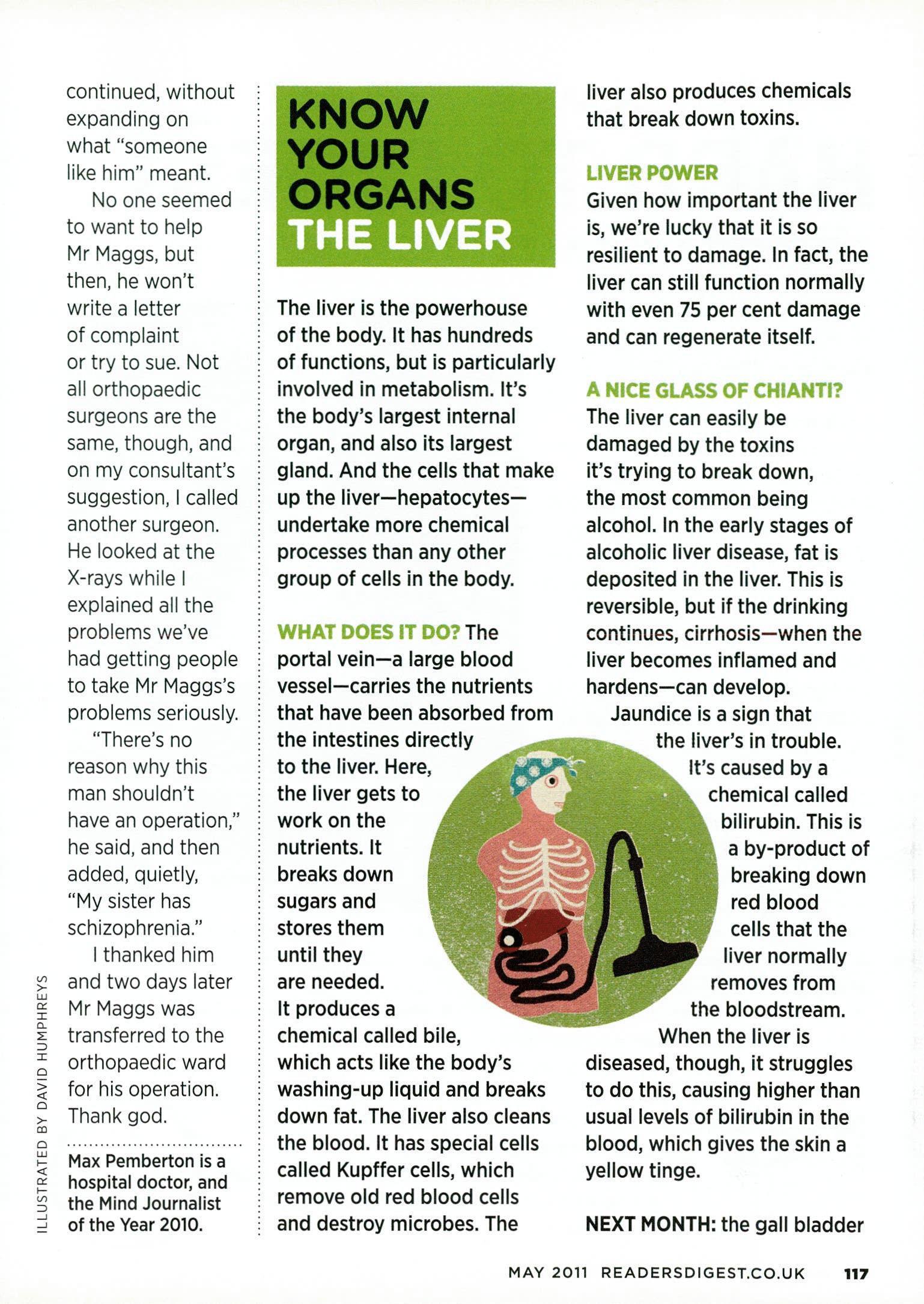
continued, without expanding on what "someone like him" meant.
No one seemed to want to help Mr Maggs, but then, he won't write a letter of complaint or try to sue. Not all orthopaedic surgeons are the same, though, and on my consultant's suggestion, I called another surgeon. He looked at the X-rays while I explained all the problems we've had getting people to take Mr Maggs's problems seriously.
"There's no reason why this man shouldn't have an operation," he said, and then added, quietly, "My sister has schizophrenia."
I thanked him and two days later Mr Maggs was transferred to the orthopaedic ward for his operation. Thank god.
Max Pemberton is a hospital doctor, and the Mind Journalist of the Year 2010.
The liver is the powerhouse of the body. It has hundreds of functions, but is particularly involved in metabolism. It's the body's largest internal organ, and also its largest gland. And the cells that make up the liver—hepatocytesundertake more chemical processes than any other group of cells in the body.
The portal vein—a large blood vessel—carries the nutrients that have been absorbed from the intestines directly to the liver. Here, the liver gets to work on the nutrients. It breaks down sugars and stores them until they are needed. It produces a chemical called bile, which acts like the body's washing-up liquid and breaks down fat. The liver also cleans the blood. It has special cells called Kupffer cells, which remove old red blood cells and destroy microbes. The
liver also produces chemicals that break down toxins.
Given how important the liver is, we're lucky that it is so resilient to damage. In fact, the liver can still function normally with even 75 per cent damage and can regenerate itself.
The liver can easily be damaged by the toxins it's trying to break down, the most common being alcohol. In the early stages of alcoholic liver disease, fat is deposited in the liver. This is reversible, but if the drinking continues, cirrhosis—when the liver becomes inflamed and hardens—can develop.
Jaundice is a sign that the liver's in trouble. It's caused by a chemical called bilirubin. This is a by-product of breaking down red blood cells that the liver normally removes from the bloodstream. When the liver is diseased, though, it struggles to do this, causing higher than usual levels of bilirubin in the blood, which gives the skin a yellow tinge.
If your stomach is tied up in knots, it could be coeliac disease
Coeliac Awareness Week starts on May 16. Would you recognise the disease if you had it?
1.It's not a food allergy. It's an autoimmune disease—the immune system attacks the body's own tissues. In coeliac disease (CD), this reaction is triggered in the gut by gluten—proteins found in the wheat, rye and barley used in breads, pasta and bakery products.
2. And It's not just gut disease. Although digestive symptoms— diarrhoea, tummy pain—are common, reactions against gluten can affect all of the body, including the nervous system.
3. It doesn't Just affect the thin. CD was once considered a "wasting" disease, since damage to the gut hampers the absorption of food, but now up to a third of newly diagnosed patients are overweight.
4. Gluten tolerance can be lost at any age. Until recently, it was thought that those cases discovered late in life must have been long-standing undiagnosed cases. Now, researchers have

found that CD can occur at any age, but it may be twice as common in those over 55.
5. Most coeliacs are undiagnosed. There are thought to be half a million in the UK. Studies suggest that four per cent of
• Soy sauce and stock cubes
• Deli meats and sausages
• Some brands of cola (those with barley malt)
• Chewing gum and crisps (with wheat flour)
• Chocolate
those diagnosed with Irritable Bowel Syndrome might actually have CD.
6. It's global. Because of its association with wheat-based diets, CD is considered to be a disease of the West, but in fact it's international, with high prevalence rates in Mexico, the Sahara, and northern India.
7.Don't change your diet—yet. Or at least not until you're diagnosed. Coeliac blood tests will only work accurately if you are consuming gluten. So If you think you may have CD, see a doctor first.
8. There was no Dr Coeliac. The word is derived from the Greek koiliakos, meaning "suffering in the bowels".
Alex Gazzola

Coeliac Disease: What You Need to Know by Alex Gazzola, (£7.99) is published on May 12.
A recent review of 40 studies over the past four years revealed that walking for just 30 minutes a day can cut your risk of about 25 different diseases. And the more you do, the greater the health benefits. You can:
Shed weight. A person weighing nine and a half stone could burn 150 calories with half an hour of brisk walking.
Halt bowel cancer. A new study in the British Journal of Cancer shows that those who take regular exercise are up to a third less likely to develop polyps, which can become malignant.
Slash your risk of heart disease. More than a third (37 per cent) of heart disease deaths are linked to inactivity. Walking to work decreases the risk, according to one study.
Improve your love life. As men get older, their risk of erectile dysfunction gets higher. Being physically active can halve the risk of impotence.
Strengthen bones. Walking helps guard against osteoporosis. All it takes is 180 minutes a week to maintain bone density. Keep your marbles. Just one mile a day might halve your chance of developing dementia. Amazingly, a US study found that walking increased grey matter in the elderly.
Protect against colds. Researchers have shown that you're less likely to pick up coughs and sneezes if you walk regularly because exercise boosts the immune system.
Want to make walking more fun? Then play music—there's proof it makes you walk faster, too. For a suggested playlist for your iPod or MP3 player, go to readersdigest.co.uk/links.
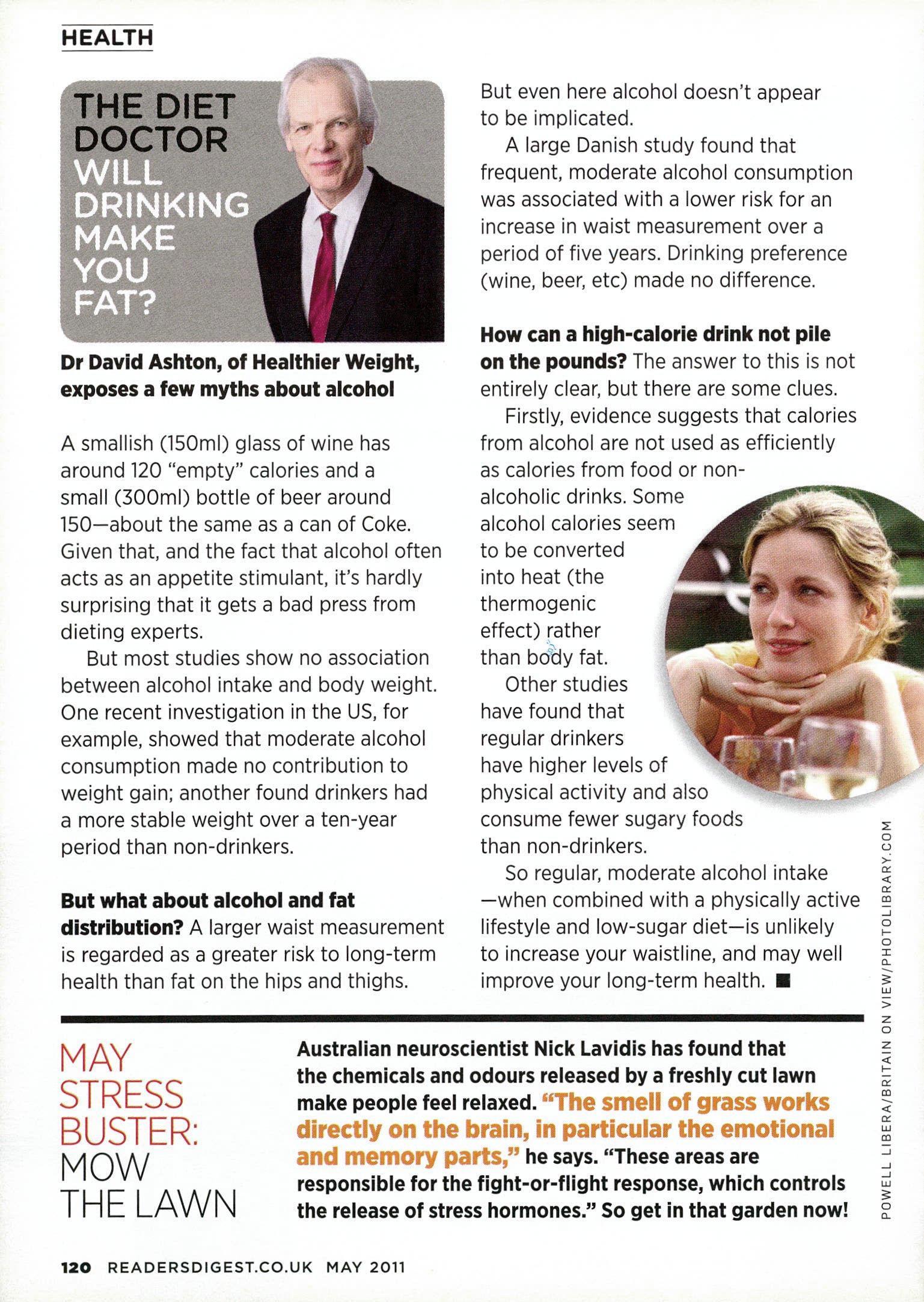
Dr David Ashton, of Healthier Weight, exposes a few myths about alcohol
A smallish (150m1) glass of wine has around 120 "empty" calories and a small (300m1) bottle of beer around 150—about the same as a can of Coke. Given that, and the fact that alcohol often acts as an appetite stimulant, it's hardly surprising that it gets a bad press from dieting experts.
But most studies show no association between alcohol intake and body weight. One recent investigation in the US, for example, showed that moderate alcohol consumption made no contribution to weight gain; another found drinkers had a more stable weight over a ten-year period than non-drinkers.
But what about alcohol and fat distribution? A larger waist measurement is regarded as a greater risk to long-term health than fat on the hips and thighs.
But even here alcohol doesn't appear to be implicated.
A large Danish study found that frequent, moderate alcohol consumption was associated with a lower risk for an increase in waist measurement over a period of five years. Drinking preference (wine, beer, etc) made no difference.
How can a high-calorie drink not pile on the pounds? The answer to this is not entirely clear, but there are some clues.
Firstly, evidence suggests that calories from alcohol are not used as efficiently as calories from food or nonalcoholic drinks. Some alcohol calories seem to be converted into heat (the thermogenic effect) rather than body fat.
Other studies have found that regular drinkers have higher levels of physical activity and also consume fewer sugary foods than non-drinkers.
So regular, moderate alcohol intake —when combined with a physically active lifestyle and low-sugar diet—is unlikely to increase your waistline, and may well improve your long-term health. ■
Australian neuroscientist Nick Lavidis has found that the chemicals and odours released by a freshly cut lawn make people feel relaxed."The smell of grass works directly on the brain, in particular the emotional and memory parts," he says. "These areas are responsible for the fight-or-flight response, which controls the release of stress hormones." So get in that garden now!
Don't let joint and muscle pain stop you with new Ibuleve Speed Relief Max Strength Gel - Ibuleve's strongest ever painkilling gel in healthcare aisles now. Keep moving to the Max with

PAIN RELIEF - WITHOUT PILLS Contains ibuprofen. Always read the label. * in the healthcare aisle
Yes, it's time for beauty products to switch from winter to spring
There comes a point every year when the black opaques and the knee-length boots look out of step with rising temperatures, and it feels right to slip on the sandals and bare the legs. Same goes for beauty products. There's a moment when it makes sense to switch from heavy foundations and moisturisers to lighter textures and brighter shades.
Try substituting rich, custard-thick cleansers for lotions and balms or even foaming wash-offs. For those with sensitive skin, try Dermalogica's new Ultracalming Cleanser, £25, a gel cream designed to soothe while de-griming (call 0800 591818 for stockists).
Complexions often look shinier in the heat because sebum spreads more easily over perspiration (in the same way that oil disperses over a puddle).
But you'll still need to moisturise, and serums can be a superb way to give your complexion a hit of hydration without overloading it

with greasiness. Try Dove Spa Waterfall Intelligent Moisturising Serum, £36.
Sunscreens with high SPFs and proven UVA protection are obvious must-buy, must-use products. I'm a huge fan of Vichy Laboratoires Capital Soleil range. Try the new SPF 30 Face Emulsion Dry Touch, £16. For your nearest stockist, go to readersdigest.co.uk/links.
I don't use full-on foundation in summer, but I'm never without a topnotch concealer, and one of the best is Christian Dior's Diorskin Nude, £19.50. You can apply it just to the areas that need it most. It covers brilliantly, blends almost imperceptibly, and lasts for ages.
Swap a traditional mascara for a waterproof or smudge-proof formula to avoid panda eyes in warmer weather. And lips will look better sheer. Dior comes up trumps again in the shape of new Dior Addict, £22. With 25 per cent less wax than a classic lipstick (it has instead an innovative gel) it has a wonderful modern transparency and shine.

Looking for an instant antiageing trick? Consider a fringe. On mature women (not all, admittedly, but many) soft horizontal lines tend to be kind to features, whereas severe partings can create unflattering downward lines. Want proof? Try a fringe on a 12-year-old, as I did, and she'll say she doesn't want to look like a baby!
Sainsbury's is currently the third largest UK beauty retailer and its customers see beauty products as an essential part of their weekly shop. Which is why it's introducing a new luxury range—Mandara Spa. It's exclusive to Sainsbury's, and to the first Mandara Spa in Europe (at the Park Plaza hotel, London). But with prices starting at a fiver, there are plenty of affordable treats to add to the trolley. Try Island Paradise Smooth Shower Scrub, £5; Honeymilk Dreams Pampering Bath, £12; or Citrus Spice Moisturising Body Lotion, £5.
While you're spring cleaning, revamp and recycle beauty products, too.
• Use facial moisturisers and masks as treats to lavish on your neck, décolletage and the backs of your hands.
• Clean and condition make-up brushes with unloved shampoos and treatments.
• Spritz rarely used fragrances around the home.
One to pop in the shopping basket—the new Mandara Spa range at Sainsbury's
Dry shampoos are great for reviving hair that's flagging. But if you find a whoosh of the white stuff can leave you looking a tinge grey, bestselling Batiste now offers three new coloured variants, £2.99 each, for blonde, medium brunette and dark brown shades. Also useful for blending regrowth until you can get your colour topped up.
• Have a swapsession with friends.
• Lipstick mistakes can be chopped up and squished into artist palettes. Then use a brush to customise your own shades (same goes with concealers). ■
I'm a terrible driver—it took me four attempts to pass my test, so I'd never be considered a petrol head. But with the political instability in the Middle East threatening to send oil prices through the roof, we might have to start thinking more like petrol heads do.
One of the smartest ways to reduce the cost of motoring is the free car-sharing website liftshare*, who say they can save an average of £800 a year for their 420,000 registered users. Members put in the details of their journey and their flexibility, and they are then matched up.
You can also save money simply by slowing down. A car cruising at 70mph uses 10% less fuel than at 80mph. It's beyond my skill, but smooth driving can save you a fortune as well, as can having the correct tyre pressure and removing unnecessary roof racks and junk from the boot. If you're a diesel-car owner and it's not a recent model, you could even
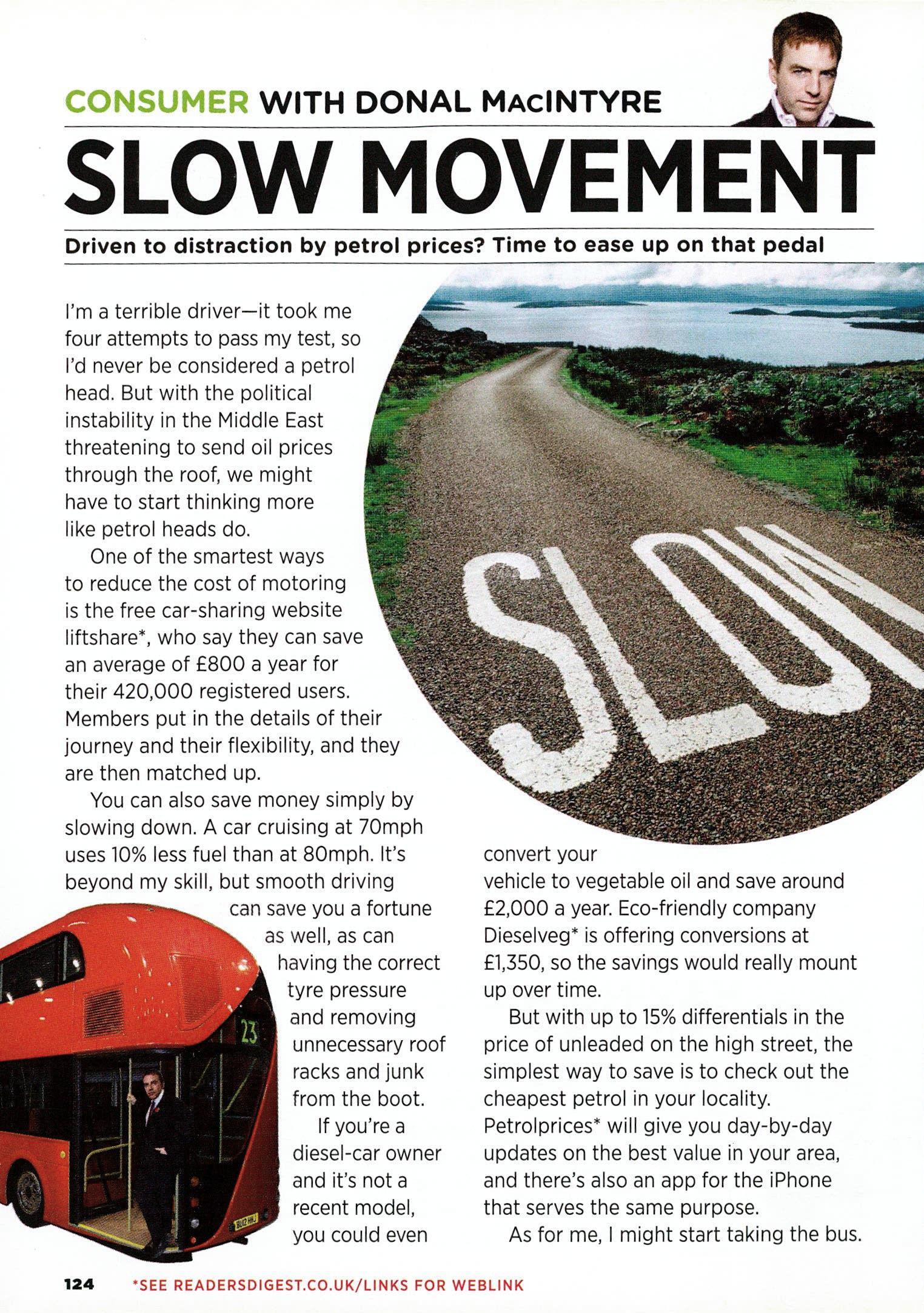
convert your vehicle to vegetable oil and save around £2,000 a year. Eco-friendly company
Dieselveg* is offering conversions at £1,350, so the savings would really mount up over time.
But with up to 15% differentials in the price of unleaded on the high street, the simplest way to save is to check out the cheapest petrol in your locality.
Petrolprices* will give you day-by-day updates on the best value in your area, and there's also an app for the iPhone that serves the same purpose.
As for me, I might start taking the bus.
Donal answers your questions. Please email queries to excerpts @readers digest. co.uk

Donal MacIntyre is an investigative journalist and a former presenter of ITV's London Tonight
et Can I demand Mg a free glass of tap water in a pub?
A From April 6
.MA last year, it became a criminal offence not to give free tap water to customers. Failure to comply can result in a fine or imprisonment. This new regulation was brought in to help people moderate their drinking, but the requirement has changed over the years. From 1964 to 2003, it was a condition of many licensed establishments, but the Licensing Act of 2003 removed it until last year.
QSuppose you buy a cuddly pooch from the pet shop and it dies
shortly after. I don't want to sound callous, but are you entitled to a refund?
AHarsh as it may sound, pets are treated as commodities—or "standard goods"— and if it can be demonstrated that the goods were faulty (say the dog or bird was sick or likely to have been ill at the time of purchase), you'd be entitled to a refund as with any other product.
QIf there are too many strings in your frozen bag of string beans, can you get a refund?
AIf the extra strings in your beans add undue extra weight to your frozen bag of beans, and you get fewer beans than you've been promised, you'll be entitled to a refund. The weights and measures team at Trading Standards have already come across a similar case and are ready and willing to count your strings upon request!
Don't give any information to cold callers, no matter how plausible they may sound. Never Invest in anything you don't know about If it looks too good to be true, it always is! Activate your defences Most computer operating systems and email providers have their own inbuilt firewall, spam blocker and security measures, but they are no good unless you activate them. Be imaginative with passwords Eight characters, please, with a mix of numbers, upperand lower-case letters and other symbols from $ to &. Pa eck vow htlp& When entering card details online, make sure the web-page address has changed from a "http" to a "https"—this means a secure connection.

...but what's the difference between one bond and another?
CORPORATE BONDS mean you're investing directly in a company, so the return, although fixed, is dependent on how the firm performs. But it's not like buying shares. You won't actually own part of the company— you're simply loaning the company money for a set time, and you won't have any voting rights.
You can trade many corporate bonds on the stock market if you want to sell sooner, but you could get less (or more) than what you originally paid for them.
Be warned—corporate bonds are not protected by the Financial Services Compensation Scheme (FSCS), as they're not a savings product. If the company goes under, you won't benefit from the FSCS's £85,000 guarantee. Check the company's "credit rating" carefully in order to assess the risk before investing. Tesco Bank and John Lewis have both launched brand-new corporate bonds this year.
GILTS, OR GOVERNMENT BONDS, are issued—as you'd expect—by the Government. They guarantee a fixed cash payment (coupon) twice a year until the bond matures, at which point you get a final payment and your original investment (nominal value of the bond) back.
A standard gilt will usually look something like this: "4% Treasury Gilt 2016". This shows how much interest you're earning, who owes you the money, and the maturity date. For example, if you hold the above bond with a nominal value of £1,000, you'll receive two £20 payments every year until 2016—when you'll get
your back as £1,00 well. Gilts are considered one of the safest types of investment, as the Government is highly unlikely to go bust or default on interest payments.
You can buy gilts through brokers, high-street banks or the Government's Debt Management Office. You can also trade them on the stock market, where their price can go up or down.
INDEX-LINKED BONDS, also known as inflation-linked bonds, are popular because they provide protection
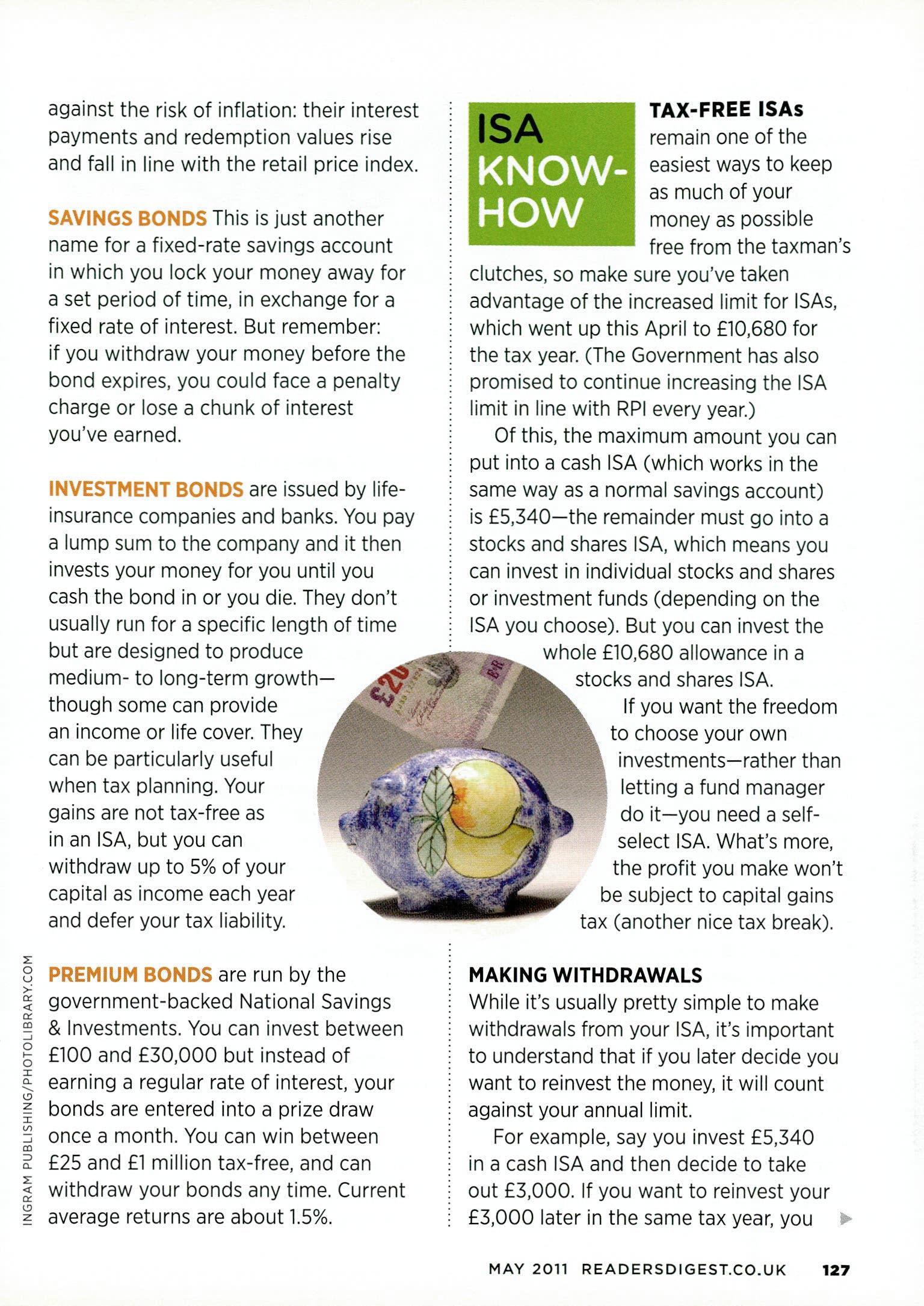
against the risk of inflation: their interest payments and redemption values rise and fall in line with the retail price index.
SAVINGS BONDS This is just another name for a fixed-rate savings account in which you lock your money away for a set period of time, in exchange for a fixed rate of interest. But remember: if you withdraw your money before the bond expires, you could face a penalty charge or lose a chunk of interest you've earned.
INVESTMENT BONDS are issued by lifeinsurance companies and banks. You pay a lump sum to the company and it then invests your money for you until you cash the bond in or you die. They don't usually run for a specific length of time but are designed to produce medium- to long-term growth— though some can provide an income or life cover. They can be particularly useful when tax planning. Your gains are not tax-free as in an ISA, but you can withdraw up to 5% of your capital as income each year and defer your tax liability.
PREMIUM BONDS are run by the government-backed National Savings & Investments. You can invest between £100 and £30,000 but instead of earning a regular rate of interest, your bonds are entered into a prize draw once a month. You can win between £25 and £1 million tax-free, and can withdraw your bonds any time. Current average returns are about 1.5%.
remain one of the easiest ways to keep as much of your money as possible free from the taxman's clutches, so make sure you've taken advantage of the increased limit for ISAs, which went up this April to £10,680 for the tax year. (The Government has also promised to continue increasing the ISA limit in line with RPI every year.)
Of this, the maximum amount you can put into a cash ISA (which works in the same way as a normal savings account) is £5,340—the remainder must go into a stocks and shares ISA, which means you can invest in individual stocks and shares or investment funds (depending on the ISA you choose). But you can invest the whole £10,680 allowance in a stocks and shares ISA.
If you want the freedom to choose your own investments—rather than letting a fund manager do it—you need a selfselect ISA. What's more, the profit you make won't be subject to capital gains tax (another nice tax break).
While it's usually pretty simple to make withdrawals from your ISA, it's important to understand that if you later decide you want to reinvest the money, it will count against your annual limit.
For example, say you invest £5,340 in a cash ISA and then decide to take out £3,000. If you want to reinvest your £3,000 later in the same tax year, you
won't be able to as you've already invested your yearly limit. You'll have to wait until the next tax year.
You can transfer money from one ISA to another, but there are rules. You can move money from a cash ISA into another cash ISA or a stocks and shares ISA, but you can only transfer from a stocks and shares ISA into another stocks and shares ISA. Never try to transfer your money by closing your account. If you do, you risk losing your tax benefits. Instead, ask your new provider to do the transfer for you (though be aware that not all ISAs accept transfers).
The earlier you start investing in the tax year, the longer your money accrues interest and the more you make!

Not sure how the new pension changes will affect you? Ask yourself these questions...
The state retirement age is currently 60 for women and 65 for men, but this is set to increase to 66 both for men and for women by 2020. So think very carefully about when to retire—you'll have to support yourself for longer before you can get your state pension.
The default retirement age is being scrapped from this October, so you can't be forced to retire because of your age. Remember your options when you reach the state pension age: stop working and claim your pension; carry on working and claim your pension as well; or carry on working and put off claiming your pension—if you do this, you may be able to get extra when you do start to claim it. The increase is 1% for every five weeks you put off claiming, and to get a oneoff lump-sum payment (and then your state pension at a normal rate) you need to put off claiming for 12 months.
New annuity and drawdown rules mean you now have more control over your

money when you retire. First of all, it's no longer compulsory to buy an annuity —a product that converts your pension into a guaranteed income for life—by the age of 75.
If you have a larger-than-average pension pot (the national average is around £30,000), are over 55 and can show you have a secured income of more than £20,000 a year meanwhile, you'll also be able to access unlimited amounts from a "flexible drawdown" pension pot.
If you don't have an income of £20,000 a year, the default option is capped drawdown where the maximum amount of income you can draw is 100% of a comparable annuity—based on government figures.
Most people, however, will continue to purchase an annuity when they retire, as drawdown is only really a viable option if your pension pot is at least £100,000. ,T]
As of 2012, workers will be auto-enrolled ng into a workplace pension scheme. You ■ a t can choose to opt out, but you have to actively do so. If your employer doesn't have a scheme or you're self-employed,
you'll be able to save in the National Employment Savings Trust. The Government has confirmed it will replace the complicated "top-up" pension schemes with a universal basic state pension—around £140 a week.
The amount you can save per year in your pension has been cut from £255,000 to £50,000. The maximum lifetime allowance has also been chopped from £1.8 million to £1.5 million. Any additional savings will be taxed. But you are able to roll over any unused allowance—for example, if you don't make any contributions for three tax years, in the fourth you can contribute up to £20,000.
To cut costs, the Government plans to change existing (and expensive) public-sector final-salary schemes— based on earnings
#at the end of / your career and length of / i service—to x , pensions based on average pay / / during your career, by 2015. This will mean lower payouts for most. The Government also wants to hike the normal pension age of the new schemes to the state pension age—so from 60 to 66. •
Victoria Bischoff is a personal finance reporter at Citywire Money, an independent website that helps people make the most of their money. See readersdigest.co.uk/links.
Succulent spring lamb is perfect for a simple, delicious supper with friends
Every now and again you read something about how the dinner party is dead. Frankly, I'm not surprised. The dinner party has never shown much sign of life in my household. I'm more of a supperparty type of person—you still have to make an effort, but you needn't feel that everyone is examining your cooking and making judgements accordingly.
Supper parties are all about getting a few friends round and enjoying good conversation, decent wine and simple food. Sparkling conversation means speaking your mind and arguing your case. In my neck of the woods, it works wonders— everyone says their bit and then has to agree with me!
May is the month for entertaining because there are so many freshly grown ingredients at your disposal. It's also the month of promise. We've been through a long, hard winter, and now is the moment to look forward, feel the sun on our faces and count our blessings.
Spring lamb oozes with symbolism. And this dish is easy. You can add as much Dijon mustard as you like—if I'm making this for a lunch party I tend to ease up on the Dijon, but in the evening I lash it on, ratcheting up the flavour. And remember that the roasting juices are crucial—don't let them out of your sight! ■
Marco Pierre White, the "godfather" of modern British cooking, is a celebrity chef, restaurateur and TV personality.
Extra-virgin oil (or clarified butter) Rump of lamb, about 700g Dijon mustard, to your taste
Two handfuls of fresh chives, diced Fresh herbs of your choice, to garnish
1.Preheat the oven to 180°C/350°F/ Gas Mark 4.
2. Heat the olive oil or butter in a non-stick

frying pan and caramelise the lamb on both sides. Transfer the Iamb to a roasting tin, skin-side down. Pop it in the oven and roast for 10-15 minutes or to taste.
3. Remove the lamb from the oven and allow the meat to rest for 5-10 minutes, but don't discard the roasting juices.
4. Cover the lamb with the mustard and garnish with the diced chives —they will stick to the Dijon. Give it a drizzle of olive oil. Serve the roasting juices separately.
Before cooking, put the Iamb on a chopping board and bash it on all four sides with the bottom of a heavy frying pan. You'll notice how much more tender this makes it.

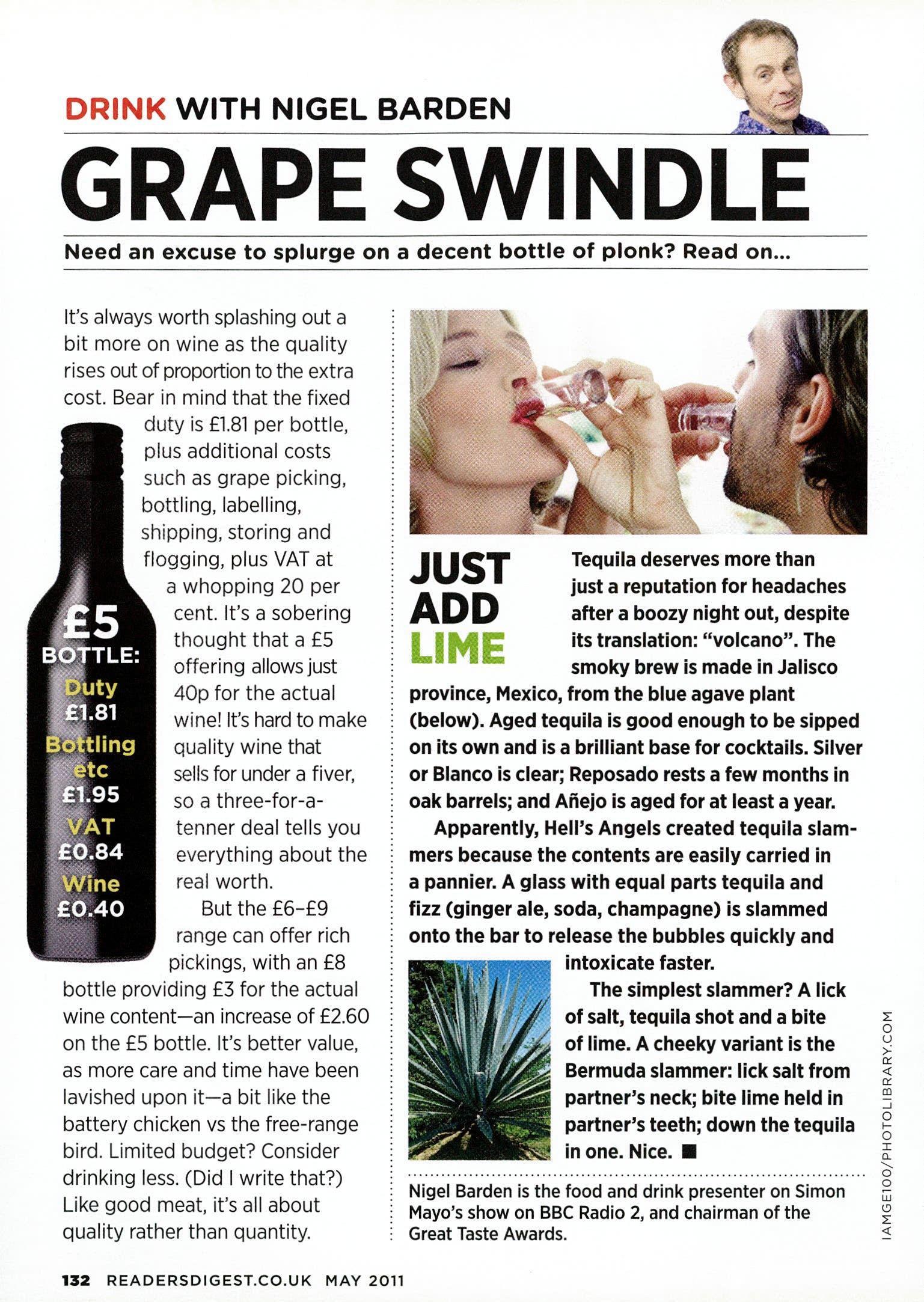
Need an excuse to splurge on a decent bottle of plonk? Read on...
It's always worth splashing out a bit more on wine as the quality rises out of proportion to the extra cost. Bear in mind that the fixed duty is £1.81 per bottle, plus additional costs such as grape picking, bottling, labelling, shipping, storing and flogging, plus VAT at a whopping 20 per cent. It's a sobering thought that a £5 offering allows just 40p for the actual wine! It's hard to make quality wine that sells for under a fiver, so a three-for-atenner deal tells you everything about the real worth.
But the £6-£9 range can offer rich pickings, with an £8 bottle providing £3 for the actual wine content—an increase of £2.60 on the £5 bottle. It's better value, as more care and time have been lavished upon it—a bit like the battery chicken vs the free-range bird. Limited budget? Consider drinking less. (Did I write that?) Like good meat, it's all about quality rather than quantity.
Tequila deserves more than just a reputation for headaches after a boozy night out, despite its translation: "volcano". The smoky brew is made in Jalisco province, Mexico, from the blue agave plant (below). Aged tequila is good enough to be sipped on its own and is a brilliant base for cocktails. Silver or Blanco is clear; Reposado rests a few months in oak barrels; and Ariejo is aged for at least a year. Apparently, Hell's Angels created tequila slammers because the contents are easily carried in a pannier. A glass with equal parts tequila and fizz (ginger ale, soda, champagne) is slammed onto the bar to release the bubbles quickly and intoxicate faster.
The simplest slammer? A lick of salt, tequila shot and a bite of lime. A cheeky variant is the Bermuda slammer: lick salt from partner's neck; bite lime held in partner's teeth; down the tequila in one. Nice. ■
❑ £150 towards surgery for one child
❑ £75 could cover half the cost of one surgery
Mr/Mrs/Ms

£30 towards medications for one surgery We'll gratefully accept any amount
Address Postcode

You pose the problems—Doctor Bob will come up with the remedies
I work in a large office with little natural light. My boss says we can have some plants to cheer it up, but what (cheap and durable) ones will do best?
AThe aspidistra is a classic choice because of its strong foliage. The "mother-in-law's tongue" (or sansevieria), has an excellent architectural shape and is pretty tough. The spider plant chlorophytum is robust and good for hanging or trailing from a shelf, with its decorative sprays of little plants. (Experiments by Nasa found it cleaned the air particularly well.)
Bilbergia nutans, or friendship plant, is a bombproof spray of thick, grass-like leaves and very pretty flowers (pink buds with irislike blue and yellow blooms). Cacti and succulents can be useful, although those with spines are probably unwelcome. Monstera deliciosa, or swiss cheese plant, is probably most reliable of all—very
(Left to right)
aspidistra, sansevieria and monstera deliciosa
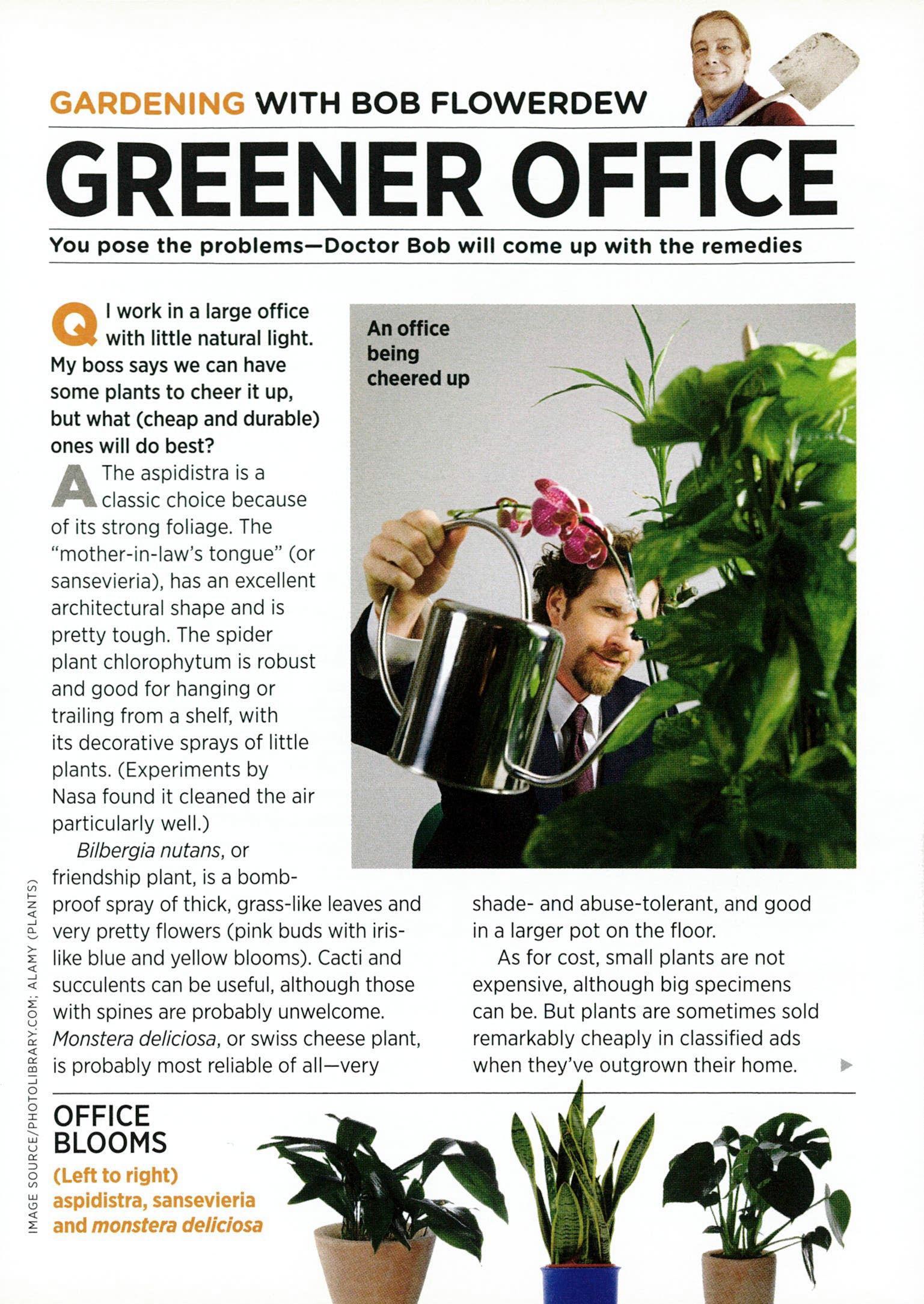
shade- and abuse-tolerant, and good in a larger pot on the floor.
As for cost, small plants are not expensive, although big specimens can be. But plants are sometimes sold remarkably cheaply in classified ads when they've outgrown their home.
CASSEN (man) SY2-12Y,

• ALLOVER PADDING
Avoids pinching and rubbing.
• SOFT-AIR MIDSOLE
Provides soft and supple walking comfort. Protects the spine, vertebrae and joints.
• COMFORTEMP LINING
Maintains a pleasant feeling of freshness inside the shoe.
• REMOVABLE FOOTBED
Minimizes the shock resulting from walking — can easily be replaced to accommodate custom orthotics.
Is it too late to plant? I have some gaps where plants died last winter.
AMake sure they are dead and there really are gaps. I wouldn't remove a dead plant just yet (unless it fell over or is easily pulled out) as it might come back from the roots. I'd advise sowing annuals or using bedding plants as a temporary measure, and choose replacements to be planted bare-rooted in autumn.
Or you could put in pot-grown plants right now, but you must weed, feed and water them all summer. Be warned—it's hard to get new plants to flourish among big established ones and especially among more of the same. Gaps in herbaceous borders are easier to fill than among shrubs. With the latter, hollies, spring bulbs or climbers are a better bet.
I want to make six raised vegetable beds, each about six feet by three feet, and a foot high. The commercial plastic containers, railway sleepers and planks of new wood are all too expensive —what do you suggest?
ASecond-hand scaffolding planks are good, preferably not those treated with preservative. Cover them with plastic sheet anyway. Broken paving slabs can sometimes be bought cheap and set on edge. Or do without edges—instead make the beds into mounds with sloping sides merging with the paths, which can be made from stepping stones of cheap, foot-square concrete slabs. This maximises the growing area and also means fewer places for pests to hide.
Bob Flowerdew is an organic gardener and a regular on BBC Radio 4's Gardeners' Question Time.
May is when the and sow straight grass grows like away! Tender topsy, so mow at plants can be least weekly. The planted out from weeds not only the middle of grow but spread, this month, and so also hoe every put citrus and week. And there's tough house still time to fill plants outside any gaps, so plant for the summer.
As the garden starts to blossom, so, unfortunately, do the pests. Thankfully, there's a way to deal with them without using harmful chemicals. Boil up some rhubarb leaves in water, add some old soap, allow to cool and then spray within a day. This organic

mixture (shown above) will kill any garden pest.
Submitted by John Weeks, Cardiff ■
» Email your gardening tips and ideas— with photos, if possible—to excerpts@ readersdigest.co.uk. We'll pay £70 if we use them on this page.
We care for brave Gurkha soldiers who face destitution or hardship in their twilight years. They have always stood by us. We will always stand by them. Did you know you can help repay our debt of honour to the Gurkhas with a gift in your Will?
Famed for their courage and loyalty, use the coupon to send for our FREE leaflet to discover more about the Gurkhas, and how a gift in your Will can help.
Please send me more information about the Gurkhas and how my Will helps.
Name Address
Postcode
This month brings the smell of sex—and the return of the otter!
"Cast ne'er a clout till May be out." You probably know one of the many versions of this saying. I thought it was something to do with planting potatoes (clods of earth?), but it turns out I'm quite wrong. "Clout" refers to clothing, so it means don't take off your warm clothing until "May be out"—this probably refers to May blossom, not the month of May.
"May" is the dazzling white blossom of hawthorn and one of the glories of spring. It's sometimes considered unlucky to bring May blossom into the house, but it's an essential part of many spring fertility festivities. There's a reason for these contrasting beliefs. May blossom contains triethylamine, one of the first chemicals produced when living tissue starts to decay—thus connecting the
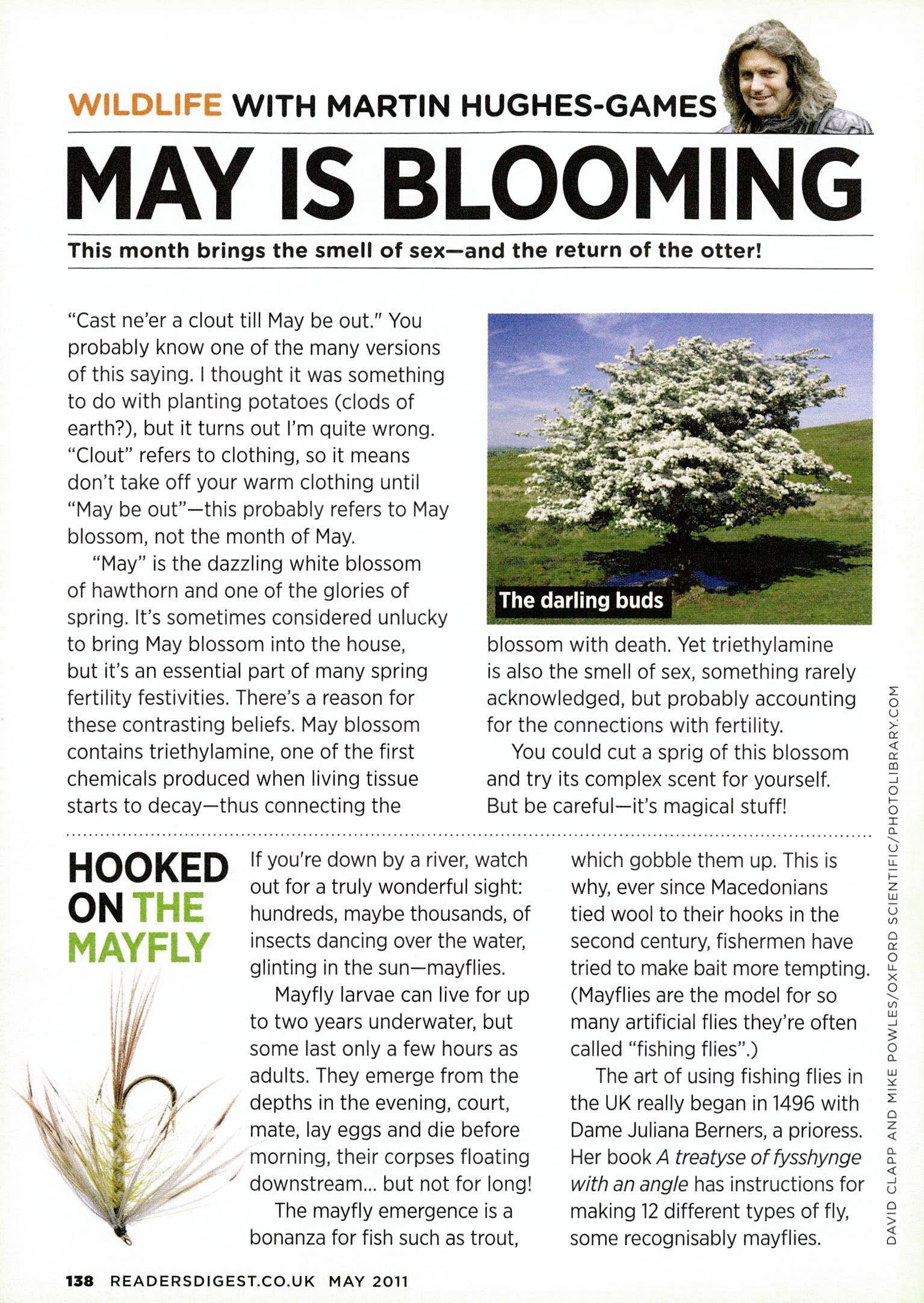
blossom with death. Yet triethylamine is also the smell of sex, something rarely acknowledged, but probably accounting for the connections with fertility. You could cut a sprig of this blossom and try its complex scent for yourself. But be careful—it's magical stuff!
If you're down by a river, watch out for a truly wonderful sight: hundreds, maybe thousands, of insects dancing over the water, glinting in the sun—mayflies.
Mayfly larvae can live for up to two years underwater, but some last only a few hours as adults. They emerge from the depths in the evening, court, mate, lay eggs and die before morning, their corpses floating downstream... but not for long!
The mayfly emergence is a bonanza for fish such as trout,
which gobble them up. This is why, ever since Macedonians tied wool to their hooks in the second century, fishermen have tried to make bait more tempting. (Mayflies are the model for so many artificial flies they're often called "fishing flies".)
The art of using fishing flies in the UK really began in 1496 with Dame Juliana Berners, a prioress. Her book A treatyse of fysshynge with an angle has instructions for making 12 different types of fly, some recognisably mayflies.
I've been noticing something fascinating on the banks of rivers, even quite small ones. It's the unmistakable signs of one of our most secretive creatures, the otter.This animal is returning to places it hasn't been seen in for decades, which is great news, so here's how to turn otter detective.
First, look out for the footprints, which show up well on muddy riverbanks: about two inches long, five toes
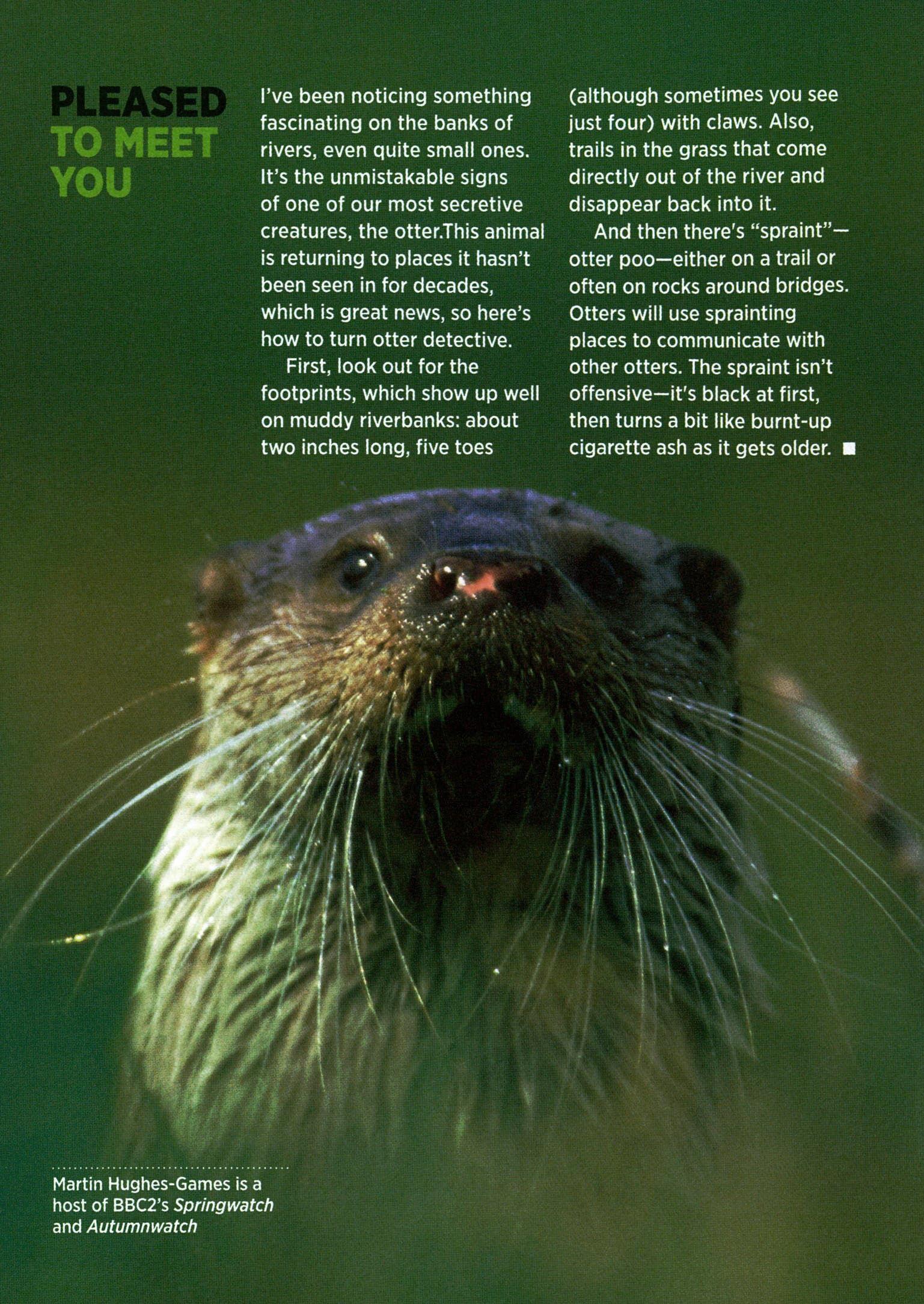
(although sometimes you see just four) with claws. Also, trails in the grass that come directly out of the river and disappear back into it.
And then there's "spraint"— otter poo—either on a trail or often on rocks around bridges. Otters will use sprainting places to communicate with other otters. The spraint isn't offensive—it's black at first, then turns a bit like burnt-up cigarette ash as it gets older. ■
If you think tweeting is the equivalent of the chocolate teapot, think again
Lots of otherwise techsavvy people are still baffled by Twitter, as it can seem like gobbledegook to the uninitiated. This is because when you log on to someone's Twitterfeed, you're seeing not just their posts to the world, but also their replies to tweeters who have asked them a direct question or made a comment—so what looks like gibberish is actually just one side of a conversation.
Stick with it. Unlike Facebook, where you have to be "approved" to read someone's updates, Twitter lets you have a window into the private thoughts of anyone, from your favourite celeb or friend to a total unknown. It's addictive. It only holds 140 characters per post, which means lots of textspeak abbreviations—"people" to "ppl", for example—so put your writing pedantry to one side!
SMART STUFF Type bit.ly into your web address bar to shrink long weblinks down to fit into these teeny text windows (bit.ly will also measure how many people are clicking on the links you share, so you

TOP TWEETERS: Actor Simon Pegg, songwriter Imogen Heap and national treasure Stephen Fry. They could be your new best friends. Online, that is can work out how interested people are in your recommendations).
TV TWEETS Another fun way in is to keep an eye on Twitter while you watch TV—you don't need to register to eavesdrop on the debate. Just type in the hashtag symbol (#), the name of the show, and then "Twitter" into the web and you'll see comments on the on-screen action.
#BBCQT, the debate that accompanies BBC1's Question Time, is always a particularly lively stream.
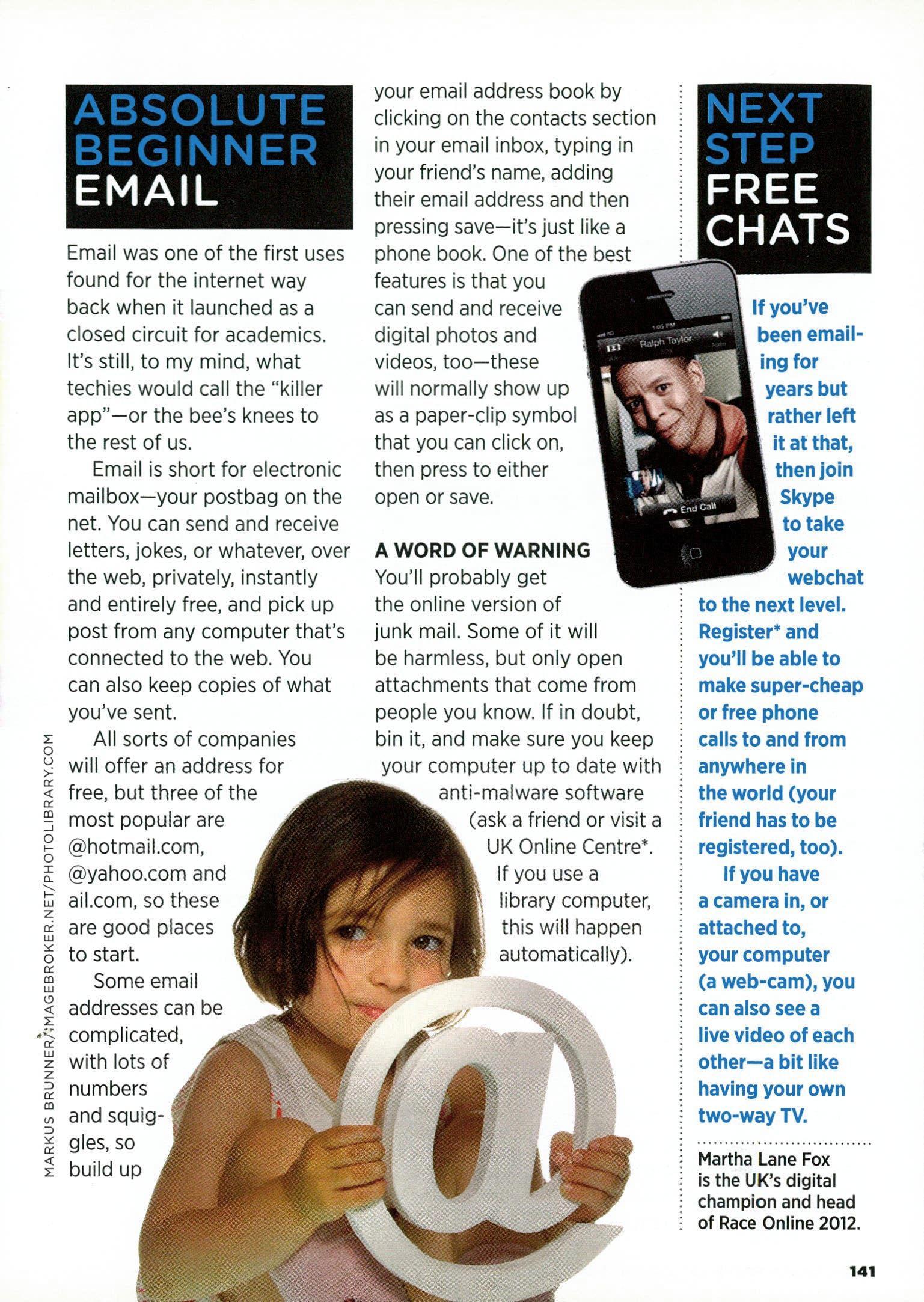
Email was one of the first uses found for the internet way back when it launched as a closed circuit for academics. It's still, to my mind, what techies would call the "killer app"—or the bee's knees to the rest of us.
Email is short for electronic mailbox—your postbag on the net. You can send and receive letters, jokes, or whatever, over the web, privately, instantly and entirely free, and pick up post from any computer that's connected to the web. You can also keep copies of what you've sent.
All sorts of companies will offer an address for free, but three of the most popular are @hotmail.com, @yahoo.com and ail.com, so these are good places to start.
Some email addresses can be complicated, with lots of numbers and squiggles, so build up
your email address book by clicking on the contacts section in your email inbox, typing in your friend's name, adding their email address and then pressing save—it's just like a phone book. One of the best features is that you can send and receive digital photos and videos, too—these will normally show up as a paper-clip symbol that you can click on, then press to either open or save.
You'll probably get the online version of junk mail. Some of it will be harmless, but only open attachments that come from people you know. If in doubt, bin it, and make sure you keep your computer up to date with anti-malware software (ask a friend or visit a UK Online Centre*.
If you use a library computer, this will happen automatically).
If you've been emailing for years but rather left it at that, then join Skype to take your webchat to the next level. Register* and you'll be able to make super-cheap or free phone calls to and from anywhere in the world (your friend has to be registered, too).
If you have a camera in, or attached to, your computer (a web-cam), you can also see a live video of each other—a bit like having your own two-way TV.
Martha Lane Fox is the UK's digital champion and head of Race Online 2012.
...but not as we know it. Has someone put it on a boilwash?
Look, blink, then look again. Yes, that's a tiny city car, and yes, that's an Aston Martin badge on the front.
Aston Martin—famed as James Bond's transport of choice, the quintessentially British maker of luxury cruisers and sports snorters—is putting out a small eco runabout. And if it looks a bit familiar, it's not surprising: underneath that badge it's a Toyota iQ city car with a stack of cosmetic surgery.
What would possess Aston Martin to make a car like this? The answer is EU legislation. From 2012, all European car companies must have an "average" CO2 emission of 130g/km across most of the cars in their range, and across all by 2015—a disaster if, like Aston, all you make are supercars such as the Vantage V12 or DBS pumping out a whopping 388g/km. Aston's response is the dinky Cygnet, a car putting out so little CO2 (113g/ km) that just by existing it reduces the average emissions and protects the company from huge fines. Which is all very smart,
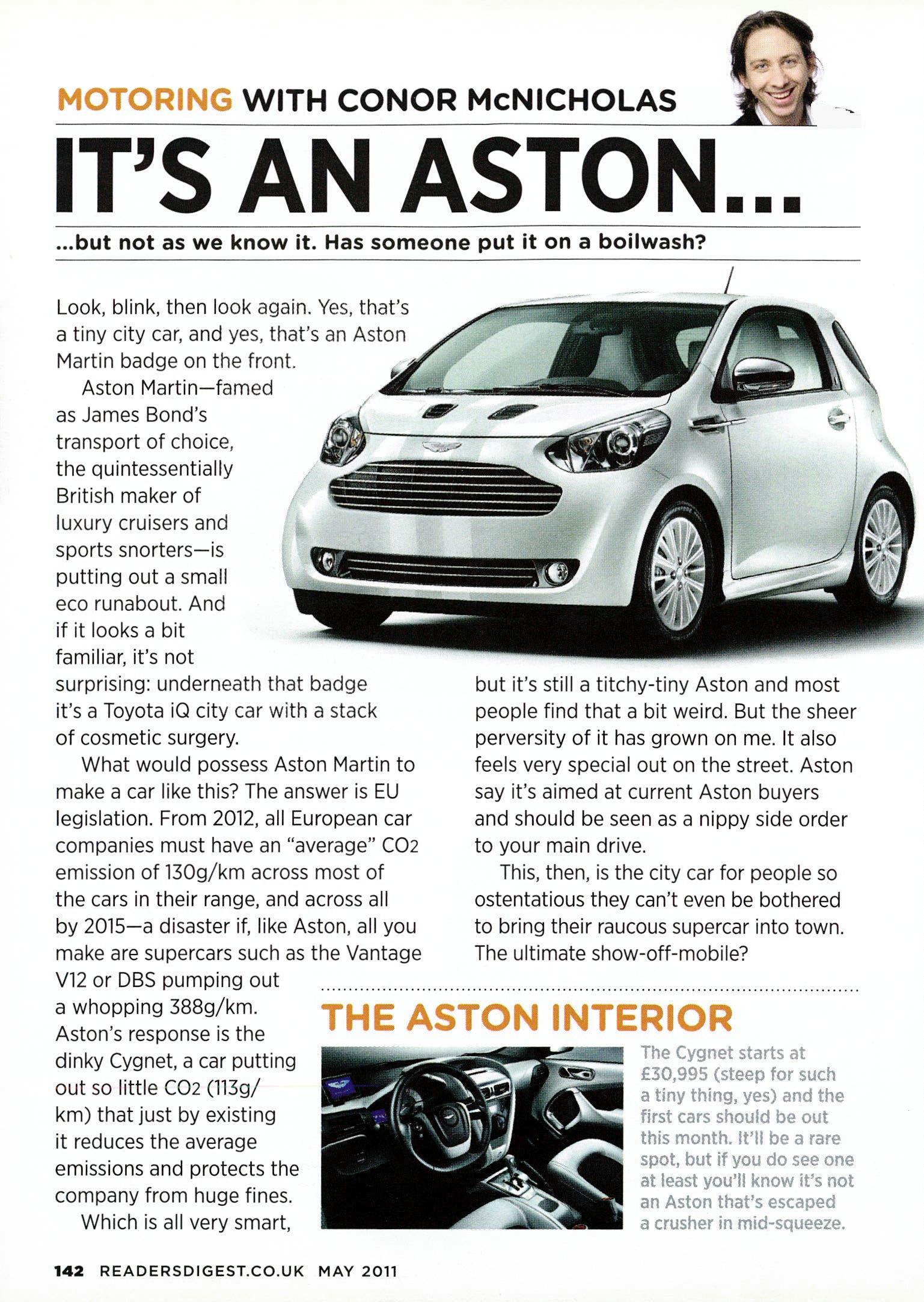
but it's still a titchy-tiny Aston and most people find that a bit weird. But the sheer perversity of it has grown on me. It also feels very special out on the street. Aston say it's aimed at current Aston buyers and should be seen as a nippy side order to your main drive.
This, then, is the city car for people so ostentatious they can't even be bothered to bring their raucous supercar into town. The ultimate show-off-mobile?
The Cygnet starts at f30,995 (steep for such a tiny thing, yes) and the first cars should be out this month. It'll be a rare spot, but if you do see one at least you'll know it's not an Aston that's escaped a crusher in mid-squeeze.

Skoda Yeti Greenline (E16,865) Skoda's brilliant Yeti has been around long enough to be almost a regular sight in towns across the country, but this new variant still deserves a tip. Clocking in at just 61.4mpg average and 119g/km CO2, it's the most frugal Yeti yet. For most real-world drivers that makes it the top choice for this top car. A green Yeti...it doesn't get much rarer than that.
Citroen DS3R (£23,100) Citroen's new small designer car, the DS3, has taken the fight to the Mini and won by being sprightly and gorgeous. This version is the fully pumped hot-hot-hatch, and it's a cracker. Just 200 will be hitting British shores, which makes them a super-rarity—so extra points for seeing one zipping
Ferrari FF (about £225,000) Well known for two-seater sports cars, Ferrari's new four-seater luxury tourer, the FF, is both surprising and desirable in equal measure. Breaking with tradition, it's Ferrari's first four-wheel-drive car and comes not as a big coupe but as a kind of sporty estate made famous in the UK by the Reliant Scimitar GTE in 1968.
They might feel like a modern luxury, but you have to go right back to 1940 to find the first powered windows in a car.
The American luxury-car company Packard (a favourite of Stalin, no less) introduced them that year, followed swiftly by Ford's luxury brand Lincoln just months later. Rather than electric motors, these were powered by hydraulic pumps. Cadillac had released the first motor-electric windows (driverside only) just before the Second World War, but they were obviously not a priority for the next few years... ■
Conor McNicholas is the former editor of BBC Top Gear Magazine.Reader June Elford takes to the water on the Canal de Bourgogne
When you're on holiday, there are any number of reasons for being late for dinner. My excuse? I was busy chatting up the lock keeper.
I love France, so my friend Mari and I chose a cruising holiday on a luxury hotel barge on the Canal de Bourgogne, Burgundy. I knew we had come to the right place when the captain and crew welcomed us on board with a glass of champagne.
Limpressionniste takes 12 passengers.
Converted from a Dutch cargo barge, the accommodation includes ensuite cabins, a saloon/dining room and two sundecks, perfect for soaking up the southern Burgundy scenery.
There was a definite pinch-me quality about the holiday, as the barge glided past pretty villages unchanged since the 17th and 18th centuries. Tootling along at five miles an hour meant we could hop off the boat and easily catch up later, or borrow a bicycle to work off the extra calories that being on holiday encourages.
On our week-long trip there were plenty of shore excursions to entertain us, too. We
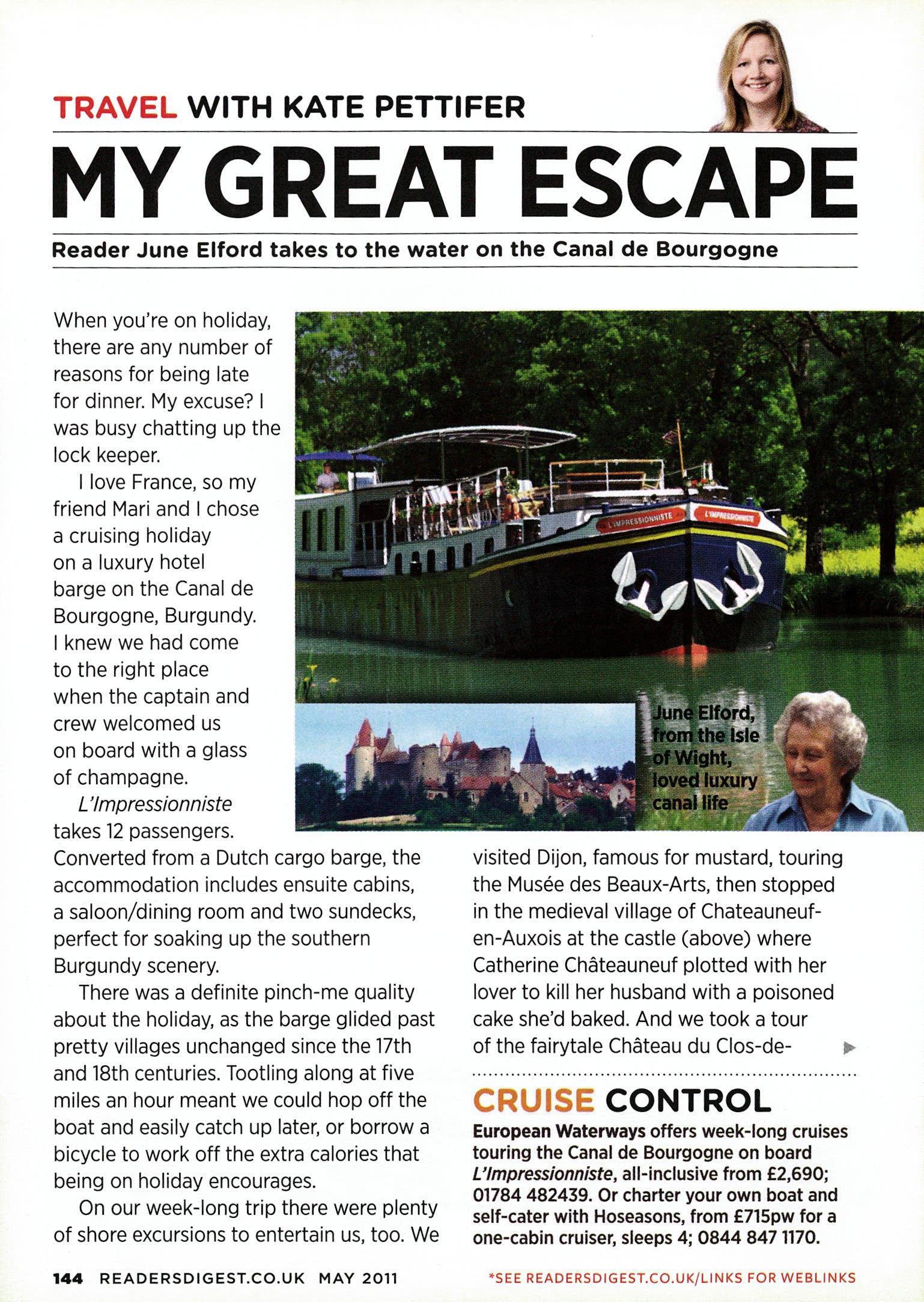
une Elford, m the Isle • Wight, ved luxury anal life
visited Dijon, famous for mustard, touring the Musee des Beaux-Arts, then stopped in the medieval village of Chateauneufen-Auxois at the castle (above) where Catherine Chateauneuf plotted with her lover to kill her husband with a poisoned cake she'd baked. And we took a tour of the fairytale Château du Clos-de-
European Waterways offers week-long cruises touring the Canal de Bourgogne on board Limpressionniste, all-inclusive from £2,690; 01784 482439. Or charter your own boat and self-cater with Hoseasons, from £715pw for a one-cabin cruiser, sleeps 4; 0844 847 1170.

Send fresh flowers in a personalised card... sent direct from Guernsey to arrive on the day you want
"We have sent over 250,000 flowercards to satisfied customers direct from our nurseries, right here in the lovely Channel Island of Guernsey...the home of the finest quality flowers"
•The flowers are freshly picked and wrapped in a sealed water oasis.
• A ray of sunshine in a bouquet! Make their day with a blast of orange and green, subtly framed in our beautiful card awaiting your personal greeting. Made to order by our professional florists.
• They don't need watering but if watered can last up to 2 weeks (a pipette is included for watering).
• Add a personalised message that will be printed on the front of the card.
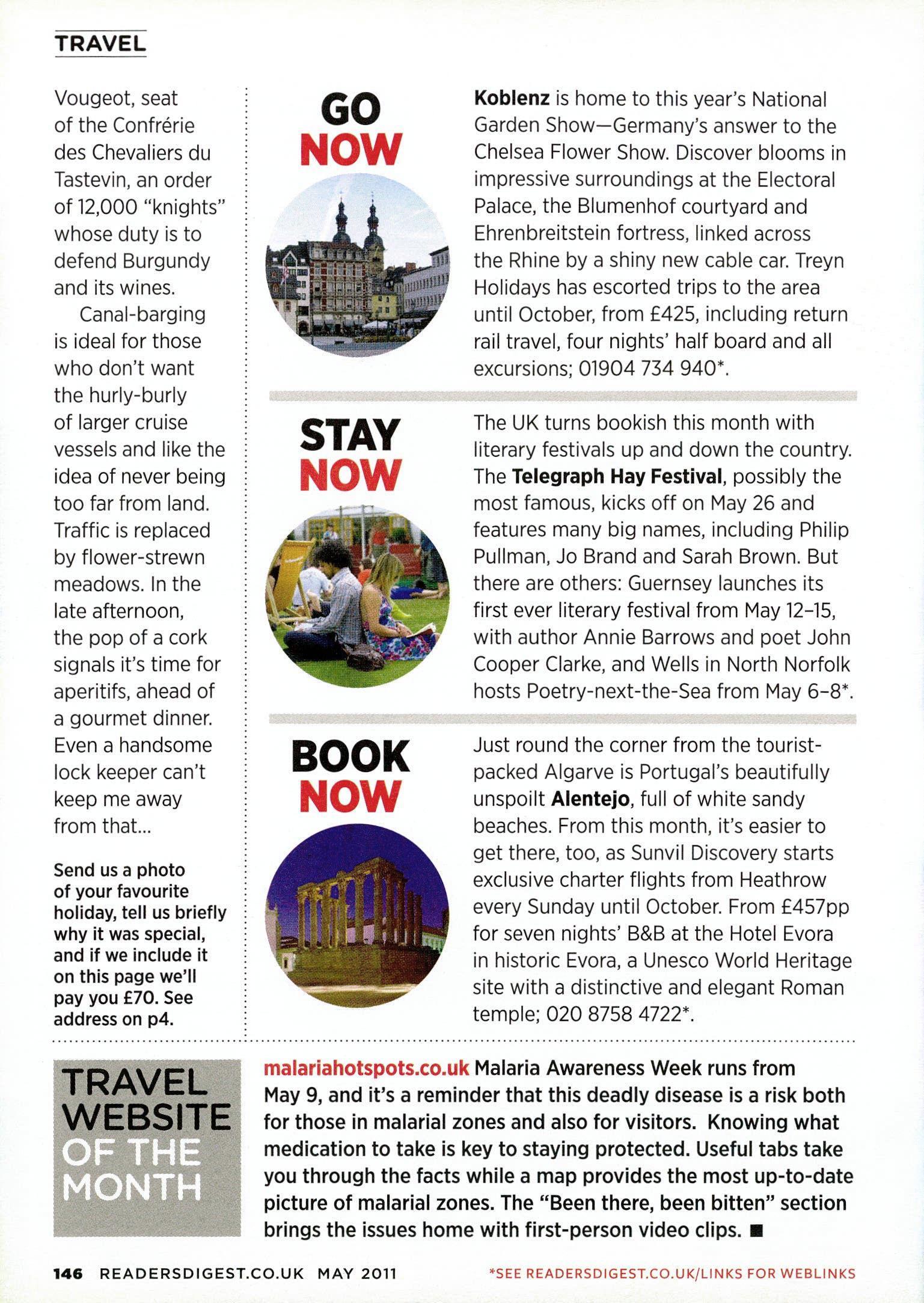
Vougeot, seat of the Confrerie des Chevaliers du Tastevin, an order of 12,000 "knights" whose duty is to defend Burgundy and its wines.
Canal-barging is ideal for those who don't want the hurly-burly of larger cruise vessels and like the idea of never being too far from land. Traffic is replaced by flower-strewn meadows. In the late afternoon, the pop of a cork signals it's time for aperitifs, ahead of a gourmet dinner. Even a handsome lock keeper can't keep me away from that...
Send us a photo of your favourite holiday, tell us briefly why it was special, and if we include it on this page we'll pay you £70. See address on p4.
Koblenz is home to this year's National Garden Show—Germany's answer to the Chelsea Flower Show. Discover blooms in impressive surroundings at the Electoral Palace, the Blumenhof courtyard and Ehrenbreitstein fortress, linked across the Rhine by a shiny new cable car. Treyn Holidays has escorted trips to the area until October, from £425, including return rail travel, four nights' half board and all excursions; 01904 734 940*.
The UK turns bookish this month with literary festivals up and down the country. The Telegraph Hay Festival, possibly the most famous, kicks off on May 26 and features many big names, including Philip Pullman, Jo Brand and Sarah Brown. But there are others: Guernsey launches its first ever literary festival from May 12-15, with author Annie Barrows and poet John Cooper Clarke, and Wells in North Norfolk hosts Poetry-next-the-Sea from May 6-8*.
Just round the corner from the touristpacked Algarve is Portugal's beautifully unspoilt Alentejo, full of white sandy beaches. From this month, it's easier to get there, too, as Sunvil Discovery starts exclusive charter flights from Heathrow every Sunday until October. From £457pp for seven nights' B&B at the Hotel Evora in historic Evora, a Unesco World Heritage site with a distinctive and elegant Roman temple; 020 8758 4722*.
,nalariahotspots.co.uk Malaria Awareness Week runs from May 9, and it's a reminder that this deadly disease is a risk both for those in malarial zones and also for visitors. Knowing what medication to take is key to staying protected. Useful tabs take you through the facts while a map provides the most up-to-date picture of malarial zones. The "Been there, been bitten" section brings the issues home with first-person video clips. ■

I thought I had really good health cover—until I looked at the small aa print. 77

"We're always being told how important it is to take out protection, to look after our family and our money. But when we try to do so, it can be confusing. There are just so many different choices out there, and if you make the wrong choice it's easy to find yourself paying far too much for too little cover. That's why here we've looked at ways in which you can call on the experts to make the choice easier."
Mr R took out Private Medical Insurance in the 1990s. On paper, it looked like really good cover— until we asked an expert from NDI Insurance Brokers to check it out. He saw right away that the policy did not include chemotherapy, cardiotherapy, radiotherapy or neurology. In other words, Mr R was paying an awful lot of money for not very much cover.
That's why qualified advice from a totally independent expert is essential.

Private Medical Insurance is important; it means that you can be sure of getting the treatment you need, when and where you want it. But the market is so complex that it's easy to end up paying too much or getting too little cover—or the wrong sort.
Over 6.2 people i are now c Private Insura D NOW... million n the UK overed by Medical nce'.
Another Reader's Digest customer, Mr S, had a £2,500 shared responsibility policy, which meant he would pay a percentage of his treatment up to a capped level of £2,500. But, again, it was only when NDI looked at his policy that he realised this was £2,500 for him and another £2,500 for his wife—a much more expensive proposition. NDI is fully independent, so they have access to every UK provider of Private Medical Insurance. That gives them the scope to find exactly the right policy to suit your particular needs.
"NDI Insurance Brokers have already saved Reader's Digest customers hundreds, and in some cases thousands, of pounds a year! No wonder we recommend expert advice when you are looking for the protection of Private Medical Insurance."
IT'S MORE THAN JUST A NASTY SHOCK TO find that your identity has been stolen—it may even affect your credit rating. Even if it's not your fault it may be a lengthy and stressful process to clear your name.
The best way to help protect your identity is to remain constantly alert, and be prepared to act instantly whenever you detect anything amiss. And that's where the experts come in.
PrivacyGuard will monitor your credit profile, providing monthly alerts should any changes be detected. So if, for instance, someone else tries to obtain credit in your name, you can act to limit any damage.
Plus you can see your own Credit Report, so you know exactly how banks and credit companies regard you, and how you compare to the rest of the country. This is essential
It wasn't me! I wasn't even in the country. But I'm still trying to sort out the mess.
DID YOU KNOW...
47% of all frauds recorded in 2010 involved identity theft'. Identity fraud affects more than 1.8m people every year, and costs over £2.7bn2.
information that helps you take control of your own credit rating. Apply for PrivacyGuard with a 30-day FREE trial and receive a free Credit Report and Score. PrivacyGuard will help you to protect your identity for as little as £6.99 a month.

"Identity theft is the fastest growing crime in the country', and if you're the victim, the effects can be devastating. That's why we're proud to offer Reader's Digest customers a 30-day FREE trial of the vital protection of PrivacyGuard."
MRS J RECEIVED AN UNEXPECTED legacy, and was worried that this extra money would mean that her two sons would face an overwhelming Inheritance Tax bill when she and her husband died.
When an expert from Ecclesiastical Financial Advisory Services examined the situation, he calculated that, if nothing was done, the sons would face a tax bill of £120,000. But by following his recommendations, Mrs J was able to reduce that liability by £80,000 right away, and could reduce it even more over the coming years.

`I've just cut the tax bill my sons will face by £80,000!
Inheritance Tax is paid on the things of value that you leave behind for your family. Under current legislation, the first £325,000 of your estate is free from Inheritance Tax, which seems like a lot, but, if you're leaving a property, that limit will soon be reached. And above that limit, 40% of everything you leave will go to the taxman. There are several different ways you can ensure that more of your estate goes to your heirs. But it takes an expert to identify which is the right strategy for your particular situation.
To contact Ecclesiastical for more information or to speak to one of their independent financial advisers, call 0800 107 0190 or visit www.ecclesiastical.com/protect
"I don't know about you, but I certainly want to see my money going to my children. Ecclesiastical Financial Advisory Services started out looking after the financial affairs of churchmen in 1919, so they have an extraordinary amount of experience. And experience is just what you need in these circumstances. Which is why we think they offer the particular help that Reader's Digest customers need."
How come

"Retirement can be hard if you don't have an adequate pension. So make sure you secure the highest possible income you are entitled to. Use your "open market option", which simply means shopping around annuity providers— and is really easy to do."
I'm having to get by on a smaller pension than my neighbour?
IT SHOULD ALL BE SO STRAIGHTFORWARD. You spend your working life building up a pension pot, and then when the time comes to retire you can use that pot to buy an annuity, which provides a secure and regular income throughout your life.
And yet research has shown that the difference between the best and worst annuity rates can be staggering. That makes a massive difference to the quality of your lifeinretirement. You can't usually change your annuity once you've arranged it. So make sure you're not being shortchanged by talking to the experts while you have the chance.
Before you reach your chosen retirement age, your pension provider will write to you with anoffer of a monthly income for life in exchange for your pension fund. That's the time to shop around!
Through our partner, Life Policies Direct, we can search the whole of the annuity market on your behalf to find the best available offer for you, as well as taking care of the paperwork involved.
To see how much shopping around could increase your pension income, call or visit
"You want to decide on dental treatment based on what you need. That's why AXA PPP healthcare are offering Reader's Digest customers cover that helps you manage your healthcare expenses while staying healthy."

more than just healthy teeth—it can reveal a lot about your general health, too.
Plaque and gum disease are bad enough, but in recent years gum disease has been worryingly connected with increased risk of heart disease, stroke and diabetes. Dr Nigel Carter, Chief Executive of the British Dental Health Foundation and a dentist for 30 years, has pointed out that persistent bad breath can be an indicator of gastro-oesophageal disease or, in rare cases, it can be due to an upper airway infection, diabetes, kidney or liver disease. And recurrent mouth ulcers can sometimes be a sign of Crohn's disease, anaemia or food intolerance.
So, keeping an eye on more than just our teeth while we brush, floss and rinse could, it seems, help us live longer as well as be healthier. These are all excellent reasons for making sure you see your dentist regularly. But those dental charges can soon add up.
CashBack, AXA PPP healthcare's affordable health cash plan, gives you money back towards your everyday dental expenses. With plans from just 40p per day you can help improve the long-term oral health of you and your family and also budget for your dental care.
Limited 0800 085 2150
0800 009 4256 (quote 33240)
www. www.privacyguard. 0800 107 0190
ndiinsurance.co.uk/ readers-digest co.uk/offerl www.ecclesiastical. com/protect

(quote

MAY'S BOOKS REVIEWED BY AN WILSON
TWO EXCLUSIVE EXCERPTS FROM OUR FAVOURITE NEW RELEASES LOST IN SHANGRI-LA AND AMORTALITY BOOKS THAT CHANGED MY LIFE: RICHARD HERRING
(Profile Books, £12)
Will future students of Alan Bennett's work conclude that he spent his later life trying desperately not to become "the nation's teddy bear"? That could certainly be one explanation for this accurately titled pair of stories.
In the first, a respectable 55-yearold widow enjoys watching the (graphically described) lovemaking of her twentysomething lodgers. In the second, while secretly gay Graham Forbes has sex
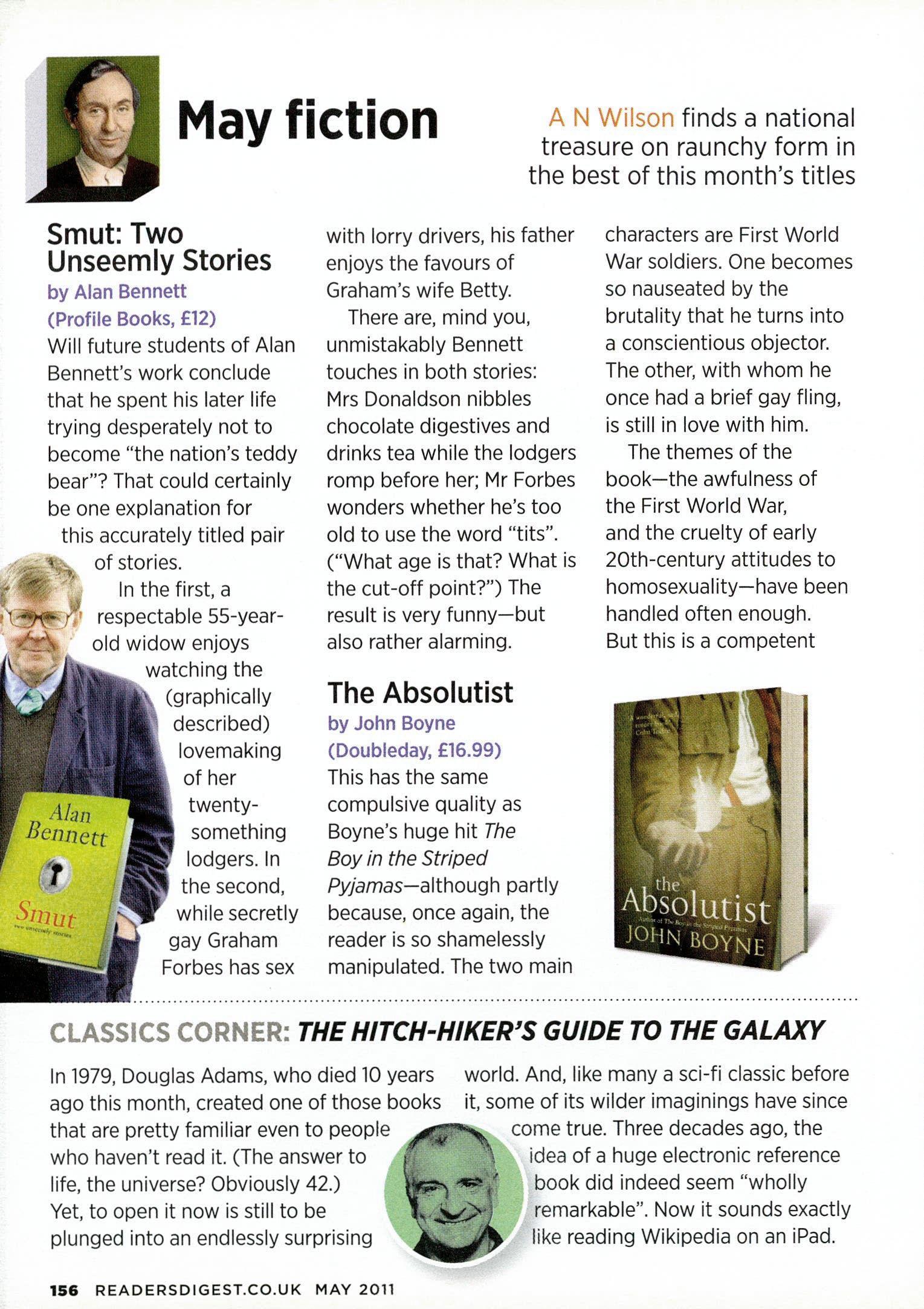
A N Wilson finds a national treasure on raunchy form in the best of this month's titles
with lorry drivers, his father enjoys the favours of Graham's wife Betty.
There are, mind you, unmistakably Bennett touches in both stories: Mrs Donaldson nibbles chocolate digestives and drinks tea while the lodgers romp before her; Mr Forbes wonders whether he's too old to use the word "tits". ("What age is that? What is the cut-off point?") The result is very funny—but also rather alarming.
(Doubleday, £16.99)
This has the same compulsive quality as Boyne's huge hit The Boy in the Striped Pyjamas—although partly because, once again, the reader is so shamelessly manipulated. The two main
characters are First World War soldiers. One becomes so nauseated by the brutality that he turns into a conscientious objector. The other, with whom he once had a brief gay fling, is still in love with him.
The themes of the book—the awfulness of the First World War, and the cruelty of early 20th-century attitudes to homosexuality—have been handled often enough. But this is a competent
CLASSICS CORNER: THE HITCH-HIKER'S GUIDE TO THE GALAXY
In 1979, Douglas Adams, who died 10 years ago this month, created one of those books that are pretty familiar even to people who haven't read it. (The answer to life, the universe? Obviously 42.) Yet, to open it now is still to be plunged into an endlessly surprising
world. And, like many a sci-fi classic before it, some of its wilder imaginings have since
come true. Three decades ago, the idea of a huge electronic reference ibook did indeed seem "wholly remarkable". Now it sounds exactly like reading Wikipedia on an iPad.
reheating of those old chestnuts, and the way Boyne tells the story is stylish as well as gripping.
£16.99)
The fifth and final novel in St Aubyn's acclaimed Me/rose series describes the funeral of an old lady, Eleanor. Half of her family were prodigiously rich Americans; the other half were upper-class English. The latter-day twigs of these two withered old trees are washed-up creatures, nearly all of them addicted to alcohol, cocaine, prescription drugs
or a mixture of the three. The book, like its predecessors, is seen largely through the eyes of Eleanor's son Patrick—and, in spite of all the sadness, cynicism and mental illness, it proves ultimately optimistic and even joyful. It's also a novel of immense sophistication: funny, beautifully crafted and deeply disturbing. Highly recommended.
As a medical student, Daniel accidentally over-prescribed morphine

to a child. Having inadvertently destroyed life, he was left with an obsessive need to create it, and after being expelled, he became a sperm donor. Twenty-odd years later, what has happened to the four lives he was responsible for?
Jewell has sold more than a million books in Britain alone, and from the ingenious plotting in this one you can see why. Admittedly, there are flaws: Daniel remains too shadowy to be properly interesting—while, elsewhere in the cast, junkies, the Welsh and students are a bit stereotyped. Above all, you have a distinct sense of the characters being used as puppets to fit the story.
Still, there's no denying that the story itself is a compelling page-turnerwhich should be enough to make for another Lisa Jewell bestseller.
Can you name the author here, of a memoir out in paperback on May 26?
"I never saw a guy so much affected by fame. The minute the girls started screaming, he seemed to go through a whole change, just when we didn't need it, when we needed to keep the whole thing tight and together. It went to his head , and over the next few years, in the mid-60s, we could not count on Brian at all. He thought he was an intellectual, a mystic philosopher. And he became a pain in the neck, a kind of rotting attachment..." Answer on page 160
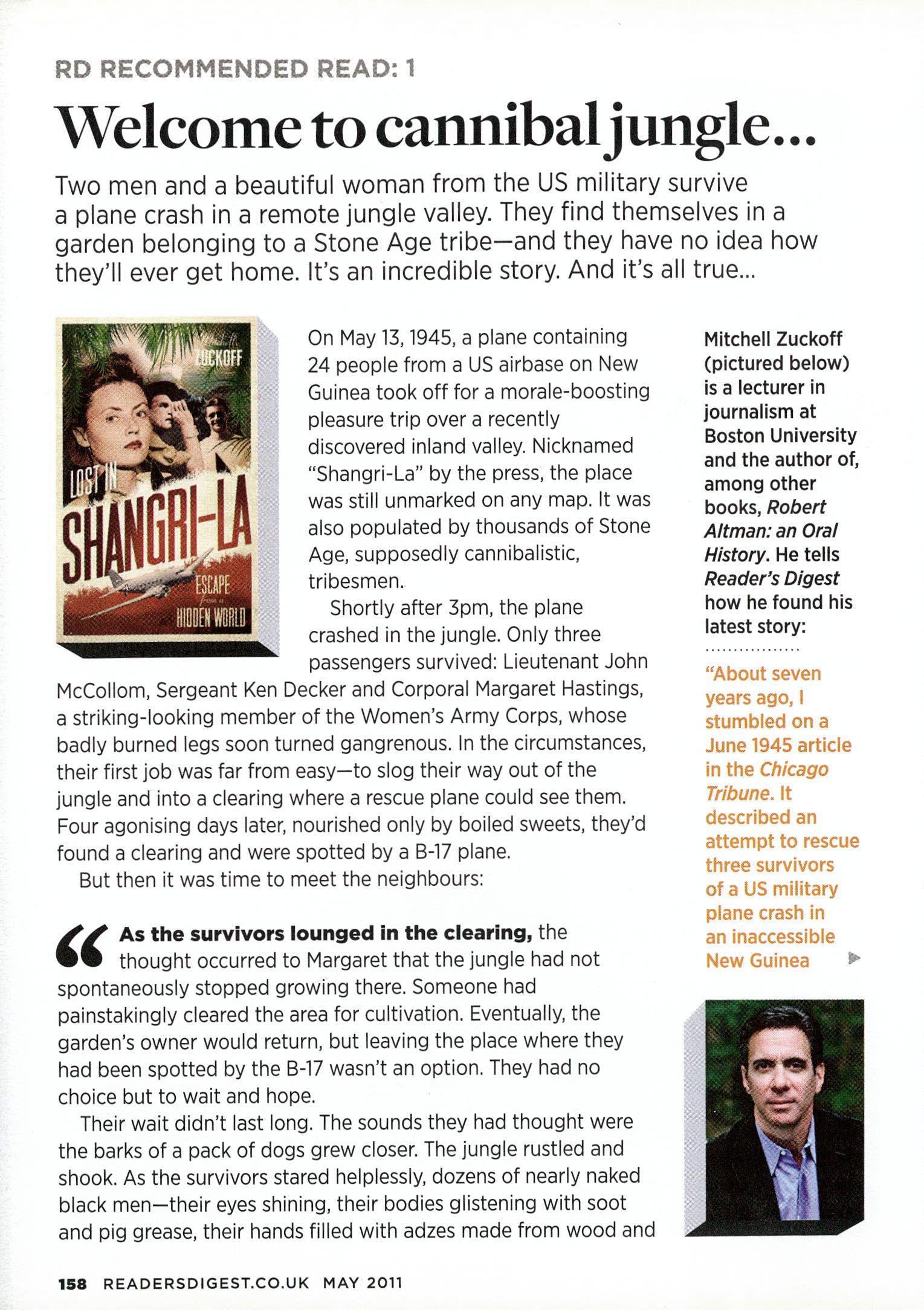
Two men and a beautiful woman from the US military survive a plane crash in a remote jungle valley. They find themselves in a garden belonging to a Stone Age tribe—and they have no idea how they'll ever get home. It's an incredible story. And it's all true...
On May 13, 1945, a plane containing 24 people from a US airbase on New Guinea took off for a morale-boosting pleasure trip over a recently discovered inland valley. Nicknamed "Shangri-La" by the press, the place was still unmarked on any map. It was also populated by thousands of Stone Age, supposedly cannibalistic, tribesmen.
Shortly after 3pm, the plane crashed in the jungle. Only three passengers survived: Lieutenant John McCollom, Sergeant Ken Decker and Corporal Margaret Hastings, a striking-looking member of the Women's Army Corps, whose badly burned legs soon turned gangrenous. In the circumstances, their first job was far from easy—to slog their way out of the jungle and into a clearing where a rescue plane could see them. Four agonising days later, nourished only by boiled sweets, they'd found a clearing and were spotted by a B-17 plane.
But then it was time to meet the neighbours:
As the survivors lounged in the clearing, the thought occurred to Margaret that the jungle had not spontaneously stopped growing there. Someone had painstakingly cleared the area for cultivation. Eventually, the garden's owner would return, but leaving the place where they had been spotted by the B-17 wasn't an option. They had no choice but to wait and hope.
Their wait didn't last long. The sounds they had thought were the barks of a pack of dogs grew closer. The jungle rustled and shook. As the survivors stared helplessly, dozens of nearly naked black men—their eyes shining, their bodies glistening with soot and pig grease, their hands filled with adzes made from wood and
Mitchell Zuckoff (pictured below) is a lecturer in journalism at Boston University and the author of, among other books, Robert Altman: an Oral History. He tells Reader's Digest how he found his latest story: "About seven years ago, I stumbled on a June 1945 article in the Chicago Tribune. It described an attempt to rescue three survivors of a US military plane crash in an inaccessible New Guinea ►
sharpened stone—emerged from behind a curtain of leaves...
Margaret felt her hand shaking, rattling the sweets like dice. 'The bottom dropped out of my stomach,' she wrote in her diary. ' "Smile, damn it!" rasped McCollom. We smiled. Oh, we smiled to high heaven. We smiled for our lives.'
An older man stepped forward. He was wiry and alert, naked except for a necklace and a long penis gourd that pointed towards the sky. After a brief discussion with his troops, he stepped alone onto the fallen tree that bridged the gully separating the survivors' clearing from the jungle. McCollom thought it wise to meet him halfway, man to man. As he inched forward, he demanded that Margaret and Decker keep smiling.
The two leaders edged closer. When they met in the middle, McCollom reached out and grasped the native's hand. The tension broke and now both groups were smiling at each other. Margaret described the moment in her diary: 'There on the knoll we held as fine a reception as any ever given by Mrs Vanderbilt,' she 51 wrote. 'The smiles had done it.'
What the survivors didn't know was that the locals thought they were the fair-skinned spirits that a tribal legend promised would one day come from the sky—and so should be left

Corporal Margaret Hastings photographed in the jungle with her new neighbours. (She cropped her hair to stop it catching on the jungle branches.)
Lost in Shangri-La: Escape from a Hidden World by Mitchell Zuckoff is published by Harper Press at £16.99
The Queen of Shangri-La: Margaret in 1945, in real life—and as a comic-book star

4 unharmed. But that still left one big problem. The air force would later drop supplies, medics, paratroopers and a drunken photographer— but no plane could land, and the air was too thin for helicopters. So, how on earth would everybody get back? (Non-spoiling clue: Margaret eventually returned to a heroine's welcome in the US, where she was dubbed "the Queen of Shangrila"—although for some reason the press was less interested in the men...) In a book full of astonishments, perhaps the most astonishing of all is that Mitchell Zuckoff
corroborates every aspect of his story with notes at the back. And in the valley itself—now part of Indonesia—he found that some of the older inhabitants, no longer cut off from the world, retain vivid memories of the time the spirits fell from the sky.
The writer is Keith Richards, speaking distinctly ill of the late Brian Jones in Life (£7.99), his hugely entertaining autobiography. Not only is Keith's memory excellent (who knew?), but his descriptions of how music is made and played are riveting.
favourite book? "At the moment, it's The Age Of Wonder by Richard Holmes. A book about science in the 1780s and 1790s... a golden age of British science that really did change the world."
4 valley— mentioning the cannibals who lived there, and the fact that one of the survivors was an especially beautiful woman.
"After a cartoon-like double-take, my first thought was, 'Why doesn't the whole world already know about this?' I then found out all I could about it from historical societies, military documents and ultimately the human sources who brought the book to life.
"As to why the story disappeared completely, I can only speculate. Certainly, none of those involved sought to capitalise on what happened. And perhaps because it wasn't quite a war story, military historians had overlooked it as an odd aberration. If so, I'm very grateful that they did."
Remember when anybody over 60 was a proper old person, often wearing a hat? When middle-aged men enjoyed nothing more than a pipe and a bit of a potter? When women over 30 left the whole business of female glamour to the young? If so, according to Catherine Mayer, you're remembering a vanished age...
C'Across the developed world the average lifetime has lengthened by 30 years since the beginning of the 20th century. You might have thought we'd use all that extra time to squeeze in a few extra stages of life. But here's the crazy, counter-intuitive thing: the ages of man are actually eliding. Youth used to be our last hurrah before the onset of maturity and eventual dotage; each milestone—childhood, adolescence, young adulthood, middle age, retirement, golden years, decline—benchmarked against a series of culturally determined expectations. Those expectations are now swirling and re-forming...
And in this new age of age confusion, one phenomenon blurs definitions of age more than any other: the significant—and burgeoning—numbers of people who live agelessly. They rarely ask themselves if their behaviour is age-appropriate because that concept has little meaning for them. They don't structure their lives around the inevitability of decline and death because they prefer to ignore it. They continue to chase aspirations, covet new products, marry, divorce, spawn, learn, work, assume all options are open, from youth into old age. These are the amortals and their defining characteristic is that they live in the same way, at the same pitch, doing and consuming much the same things, from late teens right up until death...
The roots of the phenomenon, Mayer suggests, lie in the decline of organised religion, with its strong sense of mortality. Alongside that has come "the erosion of received ideas about place and a-

Catherine Mayer was born in America but has lived most of her life in Britain. She's been a journalist for 25 years and is now the London bureau chief for Time magazine. Amortality is her first book
behaviour"—and just at the time when we're living healthier for longer. Her exploration of amortality is nothing if not wide-ranging, bringing in everything from cellular biology and therapy culture to Madonna and Simon Cowell ("an amortal archetype"). And one thing, she says, that's already been transformed is the family—with amortals being friendlier parents than their own usually were.
If, that is, they get round to parenthood at all...
dr, Amortals approach family-building with the same age-blindness they display in other areas of life. They don't have a strong sense of now is the right time to start a family, because from the amortal perspective any time seems as auspicious or inconvenient as any other. There's always so much to cram into life. For amortal men, parenthood is a potentially fulfilling activity that can be squeezed into the schedule at any chronological age and with little real discomfort. For amortal women, children often look like roadblocks to potentially more fulfilling activities. Deaf to the ticking of body clocks, they blithely delay starting a family to ages that make fertility experts blench.
Amortals don't have a strong sense of now is the right time to start a family
As reality dawns, insouciance can give way to cycles more predictable than ovulation: disbelief, anger, despair. Amortal marriages come under strain as the quest to have a baby takes priority over the rest of life, often more so for one partner than another. Those fortunate enough to carry a child to term are often unable to repeat the trick, contributing to the upsurge of single-child households. In Britain such households now II account for more than a quarter of all family units.
On the whole, mind you, Mayer thinks amortals are a good thing—and, at 49, is happy to be one herself. In fact, the only really bad news in her fascinating book is for anybody who thinks that science will soon help us to live for ever. In the final chapter, she gives this idea an elegant but thorough kicking. ■

Amortality: the Pleasures and Perils of Living Agelessly by Catherine Mayer is published by Vermilion at £12.99
Madonna and boy-child: Simon Cowell and Madonna are amortal archetypesRichard Herring is a British comedian and writer. He starred with Stewart Lee in the BBC2 series Fist Of Fun, and his TV writing includes Time Gentlemen Please (Sky One) and Little Britain. His stand-up tour Christ On A Bike runs until May 21.
When I was eight, I noticed a discrepancy on the first page of the Bible about the genealogy of Christ, which shows how he's related to David and Abraham via Joseph. I said to my mum that if Jesus's father was the Holy Spirit, then he couldn't be related to them. It was when I began to question if any of the things I'd been told in life were true! But there's some great stuff in the Bible. I think it has an enormous influence on you, even if it's to define yourself as an atheist. The Christian ethical system also provides good precepts to live your life by. So it opened new perspectives on the world for me, in a lot of positive ways, even if it was mainly in terms of losing a religion.
I discovered the Far Side when I was 18 and on my gap year. I was working at a summer camp in California, for kids from the more deprived areas of San Francisco. It's very Monty Python-esque, which I liked, with talking
by Jonathan Ames Frr4 When you're — young,
you worry about anyone
4,41,, 74„,,,i finding out 7 -7-1M1 stuff about you that might be considered perverse—any embarrassing sexual encounters, particularly! But Ames openly writes about very personal things, from his loneliness to getting off with transsexuals. The fact that he writes about these intimate details so honestly and funnily—and quite sweetly at times— made me realise that it's liberating to be honest. It gave me the confidence to be frank when I was writing my own book How Not to Grow Up, about the year I turned 40, and went off the rails a bit.
cows and anthropo-morphised animals. It's also very intelligent, surreal humour, and I hadn't seen anything like it before. I was already interested in becoming a comedian at that stage and suddenly this accidentally discovered thing had a big influence on my comedy. •

As told to Ellie Rose
po promote Spencer and Mayfair 1 Jewellery to readers of this publication we are delighted to have sourced our most prized item to date: Genuine Lucky FourLeaf Clover Emerald Brooches. This special piece of jewellery contains a genuine Emerald set in a Sterling Silver Plated Lucky Clover Brooch.
These genuine Emerald Brooches, dispatched in a luxurious dark green satin pouch are guaranteed to be received by all callers who register correct answers to the puzzle shown here, by Midnight Thursday 19th May. There is no more to it than that!
It seemed fitting that we awarded our Lucky Emerald Brooches to those with an ability to solve our Lucky Jewellery wordsearch. But strictly one entry per person please.
Should you solve the puzzle then call the number shown straight away. We will tell you whether you have the correct answers and are successful!
This Lucky Four-Leaf Clover Emerald Brooch may not be offered again in this publication, so call today to ensure you don't miss out on receiving yours. Good luck!
Contains genuine 1/4 carat unfaceted emerald
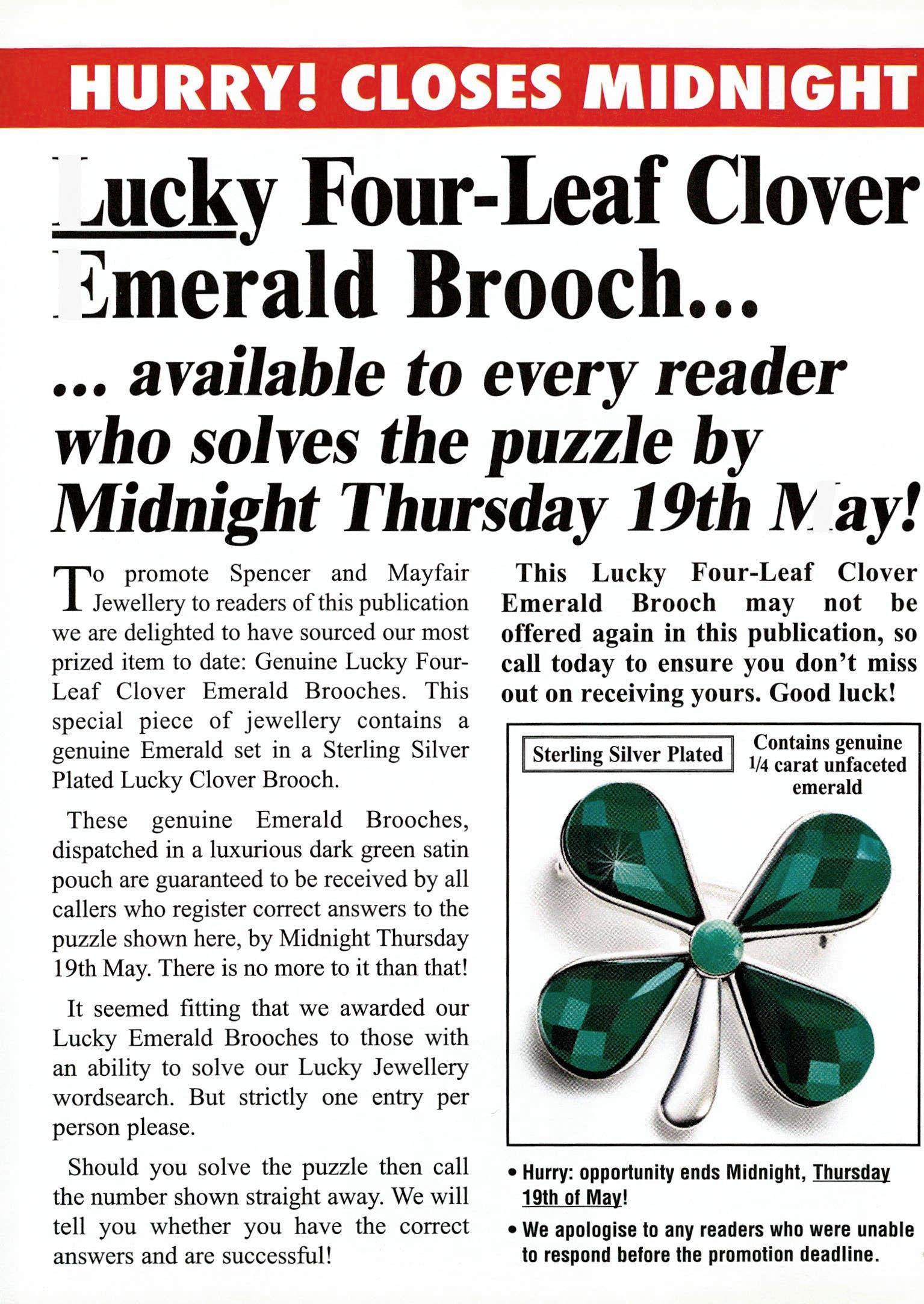
• Hurry: opportunity ends Midnight, Thursday 19th of May!
• We apologise to any readers who were unable to respond before the promotion deadline.
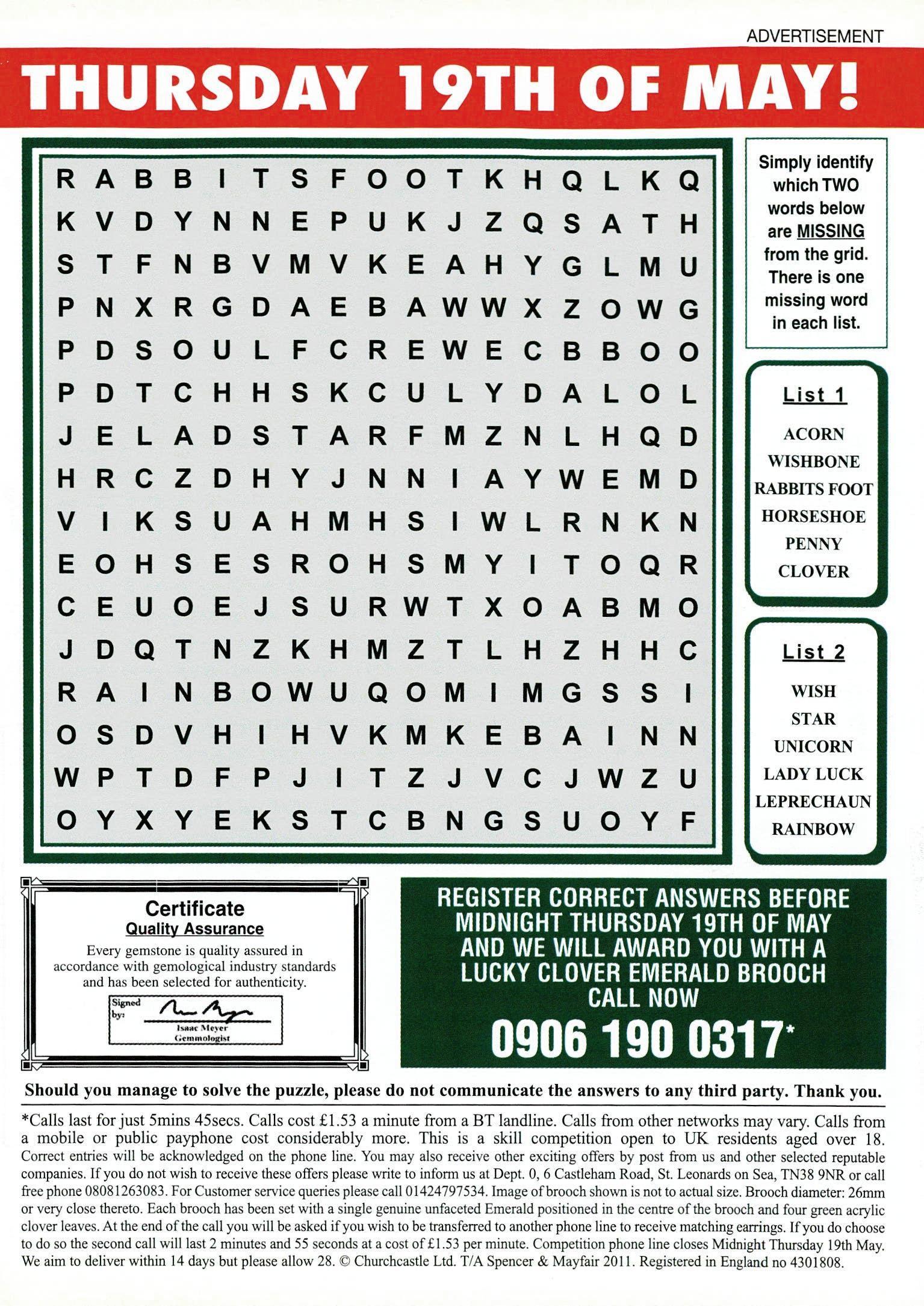
Correct entries will be acknowledged on the phone
companies. If you do not wish to receive these offers please write to inform us at Dept.
or call free phone 08081263083. For Customer service queries please call 01424797534. Image of brooch
Brooch diameter: 26mm or very close thereto. Each brooch has been set with a single genuine unfaceted Emerald
the centre of the brooch and four green acrylic clover leaves. At the end of the call you will be asked if you wish to be transferred to another phone line to receive matching earrings. If you do choose to do so the second call will last 2 minutes and 55 seconds at a cost of £1.53 per minute. Competition phone line closes Midnight Thursday 19th May. We aim to deliver within 14 days but please allow 28. © Churchcastle Ltd. T/A Spencer & Mayfair 2011. Registered in England no 4301808.
To advertise in this section please call Haley Willmott on 020 7878 2313
To celebrate the phenomenal success of The King's Speech, winner of seven BAFTAs and four Oscars, including Best Picture, Unique Coins are proud to present an exciting new special offer. We have made available a number of fine coins from 1937, for a limited period at the extraordinarily low prices our customers have come to expect from one of Britain's leading coin dealers.
Our Price - just £39.50 Limited to three per customer due to high demand
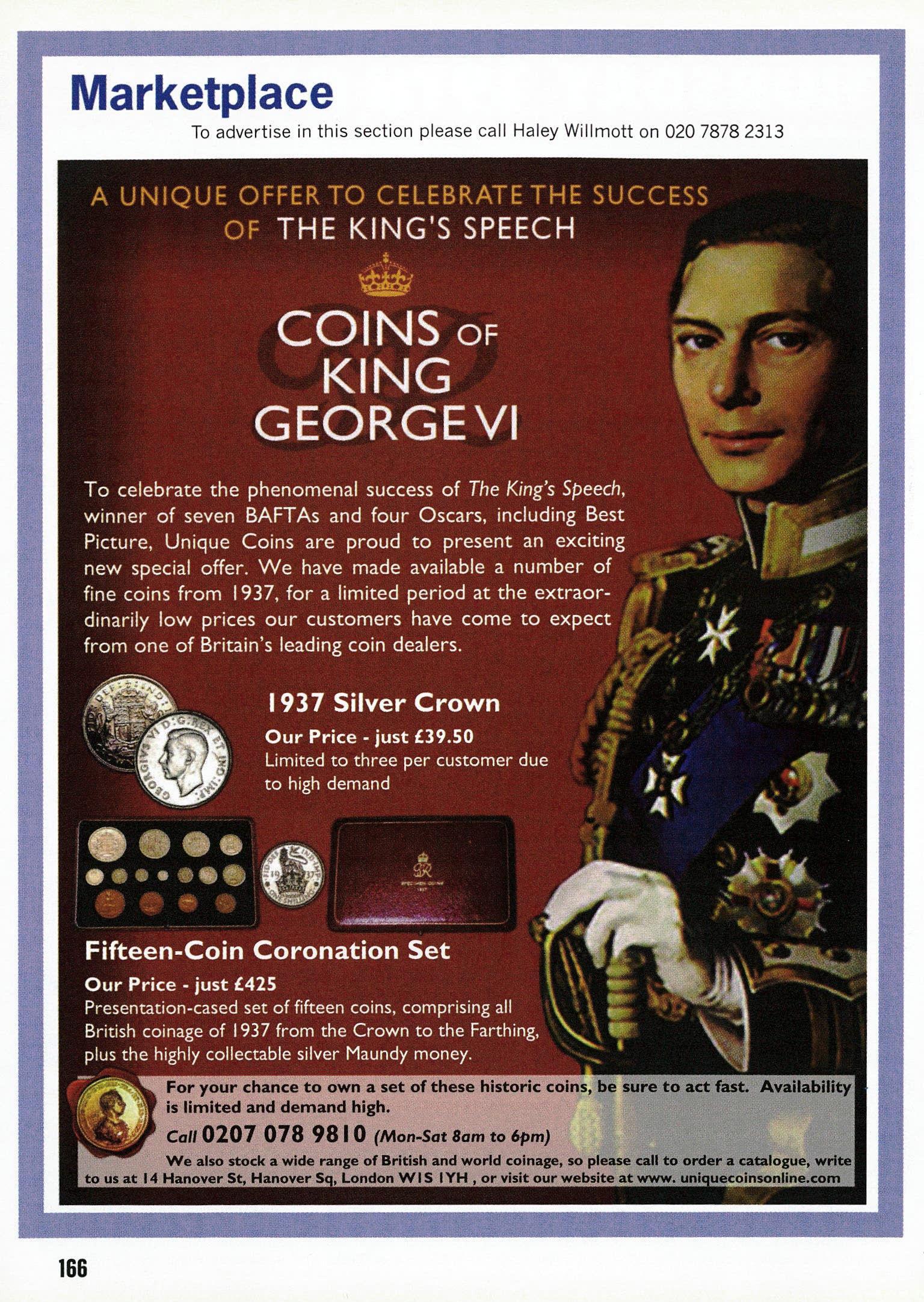
Our Price - just £425 Presentation-cased set of fifteen coins, comprising all British coinage of 1937 from the Crown to the Farthing, plus the highly collectable silver Maundy money.
For your chance to own a set of these historic coins, be sure to act fast. Availabih .4 is limited and demand high.
Call 0207 078 9810 (Mon-Sat 8am to 6pm)
We also stock a wide range of British and world coinage, so please call to order a catalogue, write to us at 14 Hanover St, Hanover S •, London WIS IYH , or visit our website at www. uni• uecoinsonline.com

& Macauley
CGC-33-01, 25 Canada Square, Canary Wharf, London, E14 5LQ 0207 0388212


he 1--,zzler can answk- 00 in just 20 minutes. Can you do better? Then get on with it—he's started counting...
1 What symbol should replace the question mark in the grid?
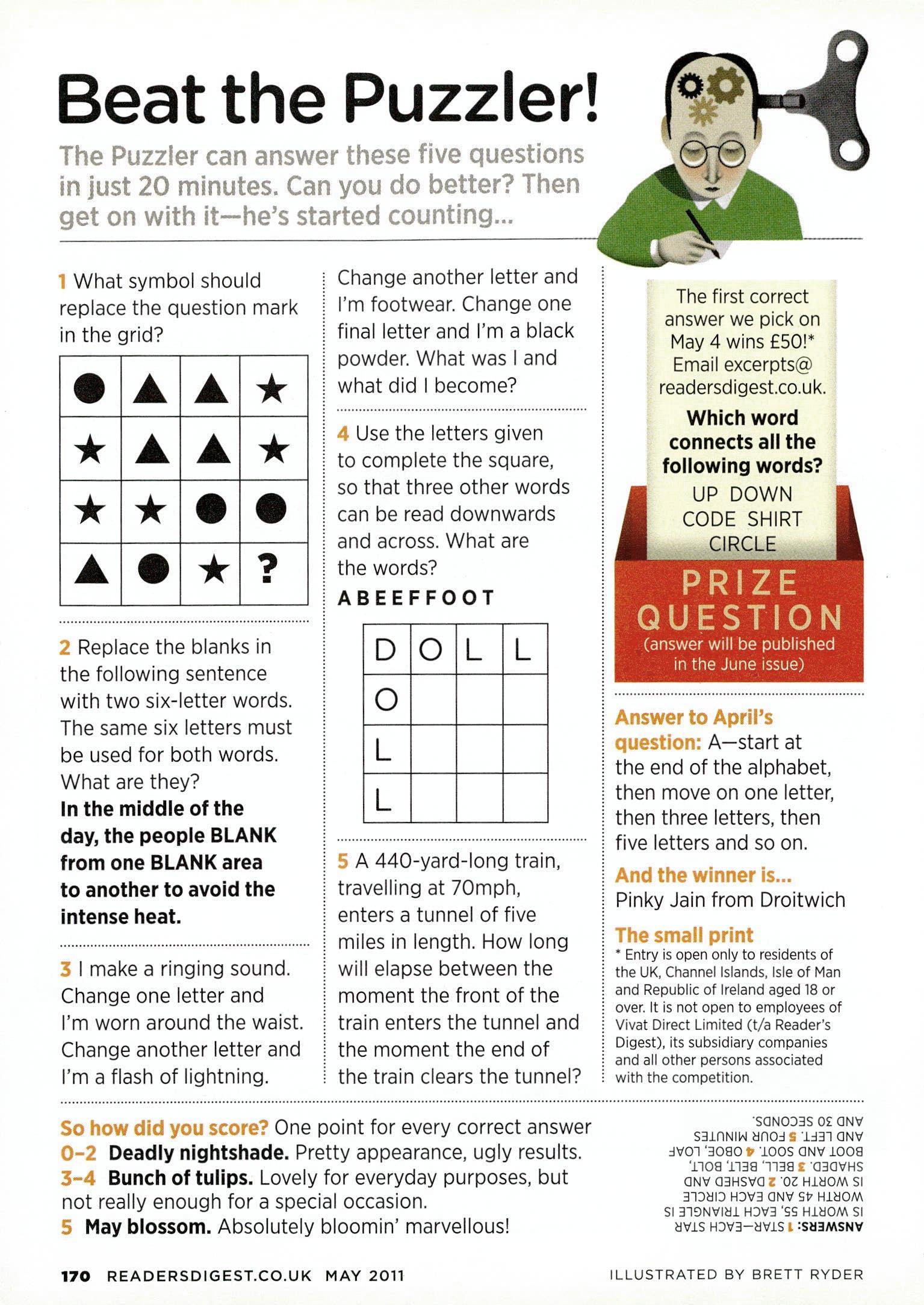
2 Replace the blanks in the following sentence with two six-letter words. The same six letters must be used for both words. What are they?
In the middle of the day, the people BLANK from one BLANK area to another to avoid the intense heat.
3 I make a ringing sound. Change one letter and I'm worn around the waist. Change another letter and I'm a flash of lightning.
Change another letter and I'm footwear. Change one final letter and I'm a black powder. What was I and what did I become?
4 Use the letters given to complete the square, so that three other words can be read downwards and across. What are the words?
5 A 440-yard-long train, travelling at 70mph, enters a tunnel of five miles in length. How long will elapse between the moment the front of the train enters the tunnel and the moment the end of the train clears the tunnel?
So ho' 'd you score? One point for every correct answer 0-' Deadly nightshade. Pretty appearance, ugly results.
3 Bunch of tulips. Lovely for everyday purposes, but not really enough for a special occasion.
5 May blossom. Absolutely bloomin' marvellous!
The first correct answer we pick on May 4 wins £50!* Email excerpts@ readersdigest.co.uk.
Which word connects all the following words? UP DOWN CODE SHIRT CIRCLE PRIZE QUESTION (answer will be published in the June issue)
Answer to April's question: A—start at the end of the alphabet, then move on one letter, then three letters, then five letters and so on.
And the winner is... Pinky Jain from Droitwich
The small print
• Entry is open only to residents of the UK, Channel Islands, Isle of Man and Republic of Ireland aged 18 or over. It is not open to employees of Vivat Direct Limited (t/a Reader's Digest), its subsidiary companies and all other persons associated with the competition.
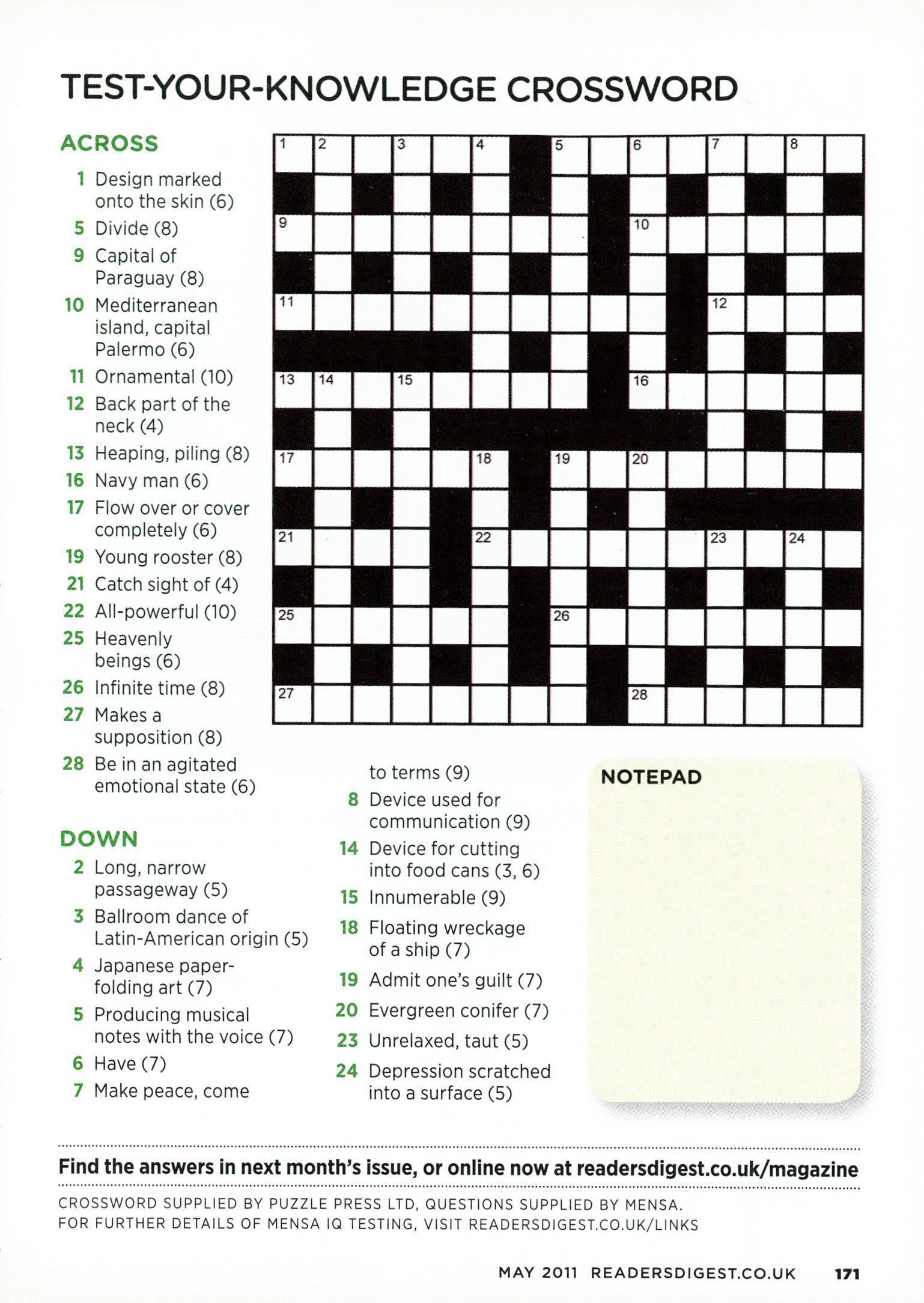
1 Design marked onto the skin (6)
5 Divide (8)
9 Capital of Paraguay (8)
10 Mediterranean island, capital Palermo (6)
11 Ornamental (10)
12 Back part of the neck (4)
13 Heaping, piling (8)
16 Navy man (6)
17 Flow over or cover completely (6)
19 Young rooster (8)
21 Catch sight of (4)
22 All-powerful (10)
25 Heavenly beings (6)
26 Infinite time (8)
27 Makes a supposition (8)
28 Be in an agitated emotional state (6)
DOWN
2 Long, narrow passageway (5)
3 Ballroom dance of Latin-American origin (5)
4 Japanese paperfolding art (7)
5 Producing musical notes with the voice (7)
6 Have (7)
7 Make peace, come to terms (9)
8 Device used for communication (9)
14 Device for cutting into food cans (3, 6)
15 Innumerable (9)
18 Floating wreckage of a ship (7)
19 Admit one's guilt (7)
20 Evergreen conifer (7)
23 Unrelaxed, taut (5)
24 Depression scratched into a surface (5)
SEND YOUR JOKES TO EXCERPTS@READERSDIGEST.CO.UK OR GO TO FACEBOOK.COM/READERSDIGESTUK
1 A woman's dishwasher broke down, so she called a repairman. She had to go out and told him, "Don't worry about the bulldog— he won't bother you. But whatever you do, don't talk to the parrot."
The man started work, wary of the biggest, meanest-looking bulldog he'd ever seen, but it just lay watching him.
The woman's pet parrot, however, was driving him crazy, squawking and swearing at him. Finally, his patience snapped and he shouted, "Shut up!"
The parrot replied, "Get him, Spike!"
Michael Spencer, Heanor, Derbyshire
I My favourite word is "pardon". It's a problem when people ask me what my favourite word is. S. lqbal, Cardiff
I I bought two 100m tickets for the 2012 Olympics. You should have seen the size of the envelope they came in. Seen on the Internet

"So when they see Beppo by his side, people will say, 'Hey, compared to that clown, Berlusconi looks really statesmanlike!' "
I I HATE THE QUESTION, "WHAT DO YOU DO FOR A LIVING?" Comedians have the only job in the world where people ask you that, you tell them, and they want something for free.
"What do you do for a living?"
"I'm a comedian."
"Tell us a joke!"
You never get that in any other walk of life.
"What do you do for a living?"
"I'm a cleaner."
"Empty my bins!" Comedian Andrew Lawrence
1 I got told off the other day for telling a joke about Tony Blair. It was a joke that involved him still being prime minister—and apparently that wasn't politically correct. Comedian Albion Gray
I Becoming aware of your character defects can help lead you to the next step in the healing process—blaming your parents. J. Truby, Barnet
Whoever coined the phrase "I slept like a baby" never had a baby
ComedianEd Byrne
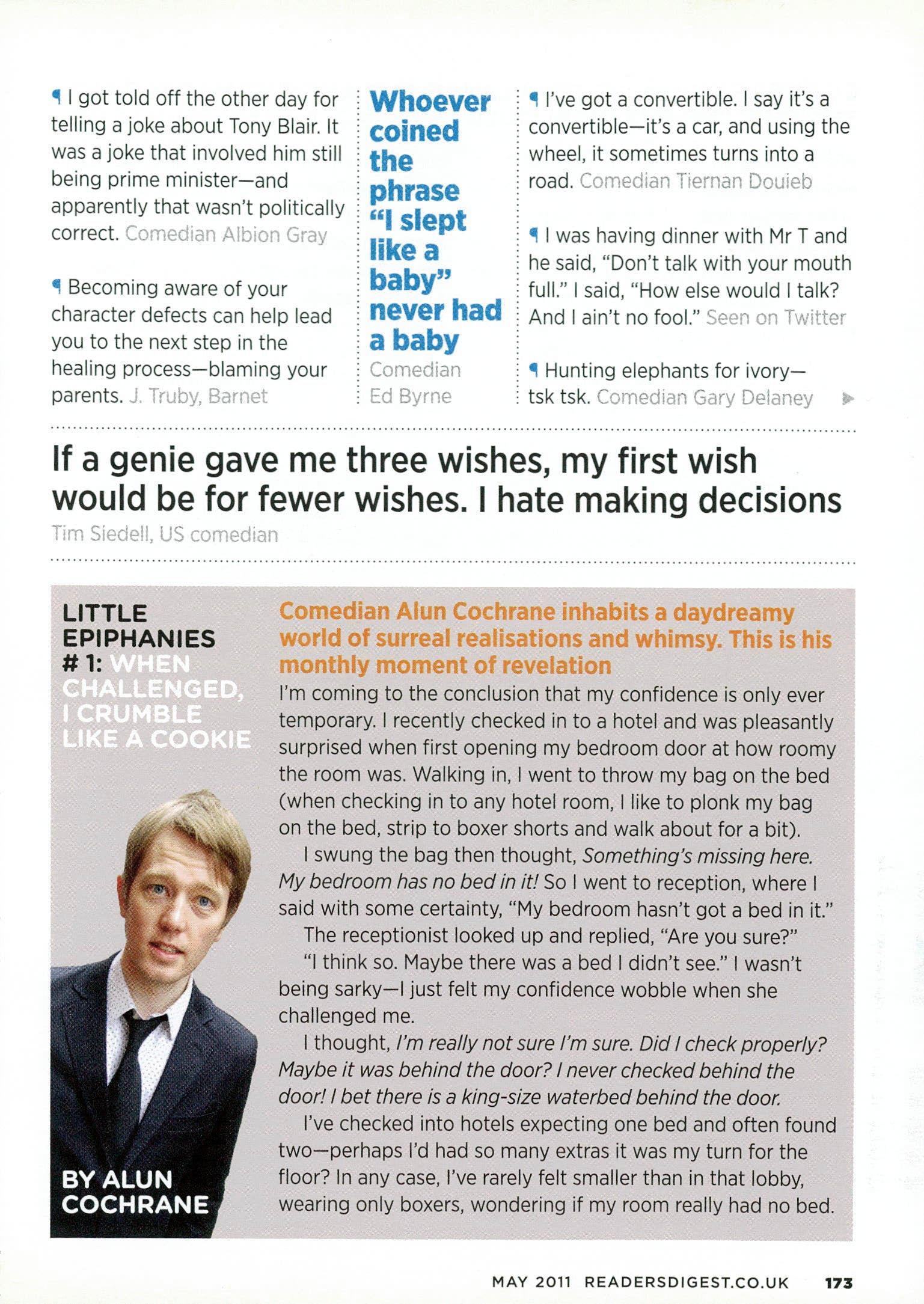
I I've got a convertible. I say it's a convertible—it's a car, and using the wheel, it sometimes turns into a road. Comedian Tiernan Douieb
I I was having dinner with Mr T and he said, "Don't talk with your mouth full." I said, "How else would I talk? And I ain't no fool." Seen on Twitter
I Hunting elephants for ivorytsk tsk. Comedian Gary Delaney o.
If a genie gave me three wishes, my first wish would be for fewer wishes. I hate making decisions
Tim Sie US comedian
LITTLE
EPIPHANIES
world of surreal realisations and whimsv. This is his #1:
I'm coming to the conclusion that my confidence is only ever temporary. I recently checked in to a hotel and was pleasantly surprised when first opening my bedroom door at how roomy the room was. Walking in, I went to throw my bag on the bed (when checking in to any hotel room, I like to plonk my bag on the bed, strip to boxer shorts and walk about for a bit).
I swung the bag then thought, Something's missing here. My bedroom has no bed in it! So I went to reception, where I said with some certainty, "My bedroom hasn't got a bed in it."
The receptionist looked up and replied, "Are you sure?"
"I think so. Maybe there was a bed I didn't see." I wasn't being sarky—I just felt my confidence wobble when she challenged me.
I thought, I'm really not sure I'm sure. Did I check properly? Maybe it was behind the door? I never checked behind the door! I bet there is a king-size waterbed behind the door.
I've checked into hotels expecting one bed and often found two—perhaps I'd had so many extras it was my turn for the floor? In any case, I've rarely felt smaller than in that lobby, wearing only boxers, wondering if my room really had no bed.
While selling an elderly woman a ticket for her first trip on a plane
Me "Would you prefer a window seat or an aisle seat?"
Customer "Oh, I think I'll take an aisle seat. I plan on getting my hair done before the trip and I don't want it blowing around."
In a coffee shop
Customer "I need something without coffee in it."
Me "Ok, what

would you like?"
Customer "Can I have a large mocha?"
Me "That has coffee in it, madam."
Customer "No it doesn't. It says espresso on the board."
Me "Espresso is coffee."
Customer "All this time I've been drinking coffee? No wonder I haven't been able to sleep!"
I was setting a customer up for a pre-authorised payment so her
current account would pay her credit card automatically on the due date. I went over the details
Me "If there aren't sufficient funds in the bank account at the time of payment, a fee will be charged."
Customer "What?! You mean I have to have money in my bank account?"
Working on the pizza counter of a supermarket
Customer "I'd like some jelly babies."
Me "Sorry, we don't put jelly babies on pizzas. What else could I get you?"
Customer Pause. "I'll have jelly babies, please."
Me "Sir, we do not serve jelly babies here."
This continues for quite a while.
Customer "I'd like some jelly babies."
Me "We do not sell jelly babies!"
The customer then angrily points to an ingredient on the counter menu.
Me "Sir, those are jalapenos."
HAIR TODAY, GONE TOMORROW
Warning: practical joker on the loose—armed with clippers. Seen on the DamnCoolPics blog
1 I was in a limbo competition and the music started. "How low can you go?"
I said, "I once stole a dialysis machine."
Comedian Matt Kirshen
1 At the end of the day, I was always going to end up bald—it's hereditary, it's in my genes. I'm bald, my father's bald, and my father's father may have been bald—we don't know. He wore a hat.
Comedian Pete Teckman
I I saw my all-time favourite poster in the window of a cafe. It just said, "Food that's good enough to eat."
Comedian Matt Green FOR EVERY READER'S JOKE WE PUBLISH, WIN EITHER £70 OR OUR SPECIAL GOODY BAG E, WORTH UP TO £150. SEE readersdigest. co.uk/magazine FOR DETAILS
Ladies and gentlemen, please welcome Milton Jones
FAVOURITE ONE-LINER?
It's
an Emo Philips joke—"I
ran three miles today. Finally I turned round and said, 'Lady, take your purse!"
BEST JOKE YOU'VE EVER WRITTEN?
Probably, "I was walking along the other day, and in the road I saw a small dead baby ghost. Although, thinking about it, it might have been a handkerchief."
FUNNIEST THING THAT'S EVER HAPPENED TO YOU?
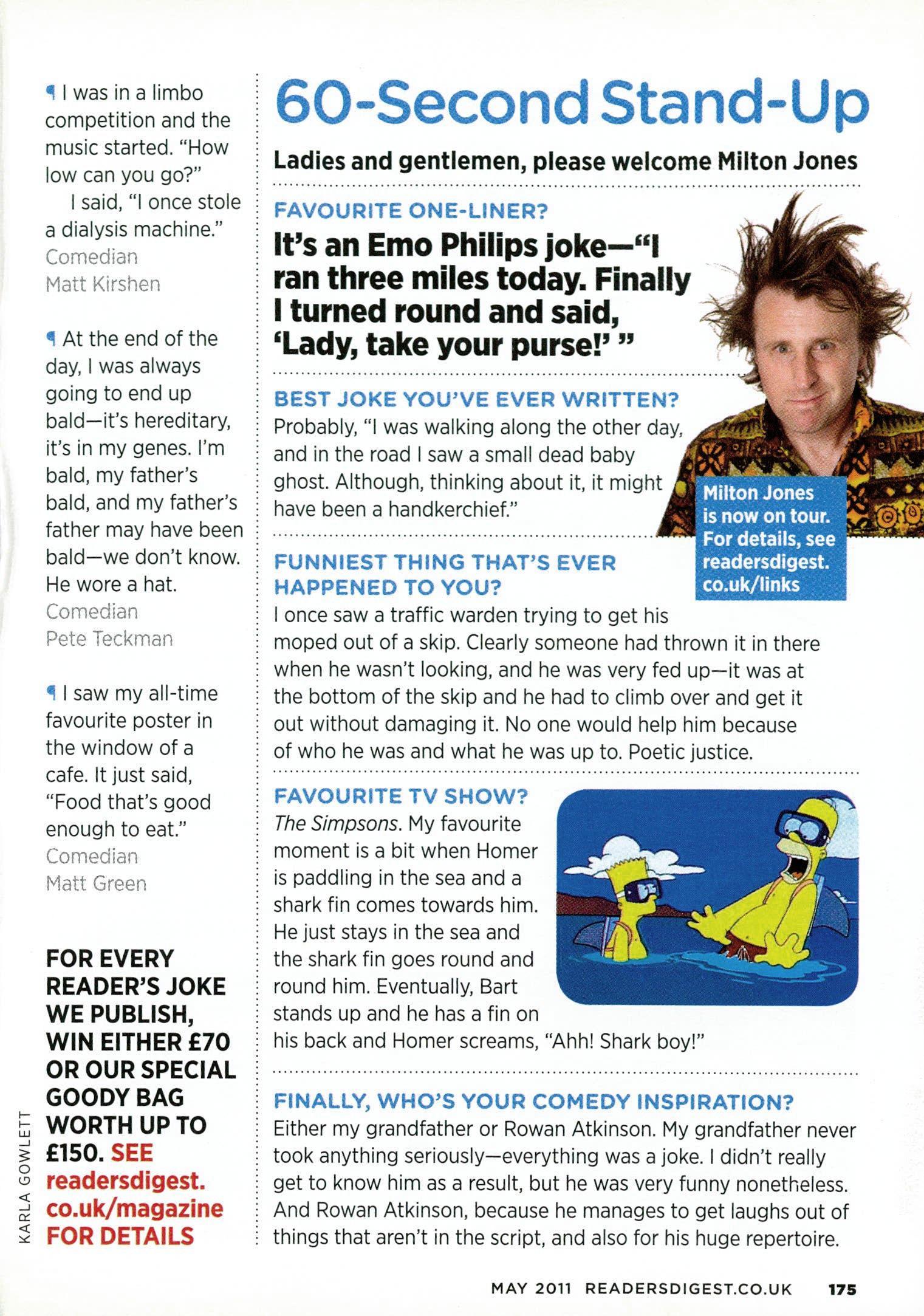
For details, see readersdigest. co.uk/links
I once saw a traffic warden trying to get his moped out of a skip. Clearly someone had thrown it in there when he wasn't looking, and he was very fed up—it was at the bottom of the skip and he had to climb over and get it out without damaging it. No one would help him because of who he was and what he was up to. Poetic justice.
FAVOURITE TV SHOW?
The Simpsons. My favourite moment is a bit when Homer is paddling in the sea and a shark fin comes towards him. He just stays in the sea and the shark fin goes round and round him. Eventually, Bart stands up and he has a fin on his back and Homer screams, "Ahh! Shark boy!"
FINALLY, WHO'S YOUR COMEDY INSPIRATION?
Either my grandfather or Rowan Atkinson. My grandfather never took anything seriously—everything was a joke. I didn't really get to know him as a result, but he was very funny nonetheless. And Rowan Atkinson, because he manages to get laughs out of things that aren't in the script, and also for his huge repertoire.

Think of a witty caption for this picture and you could beat the experts at their own game. The three best suggestions will be posted on our website in mid-May alongside an anonymous caption from our professional cartoonist. Visitors can choose their favourite—and if your entry gets the most votes, you'll receive £100 and the original, signed drawing. Submit to captions@ readersdigest.co.uk or the address on page 4 by May 10. Enter and vote online at readersdigest.co.uk/caption. We'll announce the winner in our July issue.
There are thousands of you and only one of them, so in recent issues it's fair to say that the cartoonists have been holding their own, winning roughly half the time. Cartoonist Gerard Wyman's triumphant caption on this outing was:"It all started with Arnold taking a few staples from work."

Live life on your terms with new Bimuno IBAID, a unique patented .formulation, specially developed by international experts in digestive health. Published scientific studies* have shown that some prebiotic Galacto-oligosaccharides, such as those provided by Bimuno, can help encourage and sustain a healthy level of your beneficial 'good' gut bacteria, helping you to maintain your intestinal comfort. Try Bimuno IBAID soft chewy pastilles and feel the difference for yourself.
Rich tones & highlights, now in a cro free foam

JUST 3 shakes FOAM it LOVE it Dimensional tones and highlights, now, in a delightful, drip-free FOAM! Permanent colour with 100% grey coverage. Our model is wearing shade 6.SG. Go on, be a shade braver.